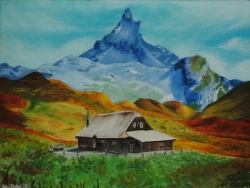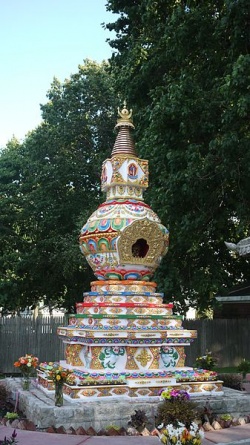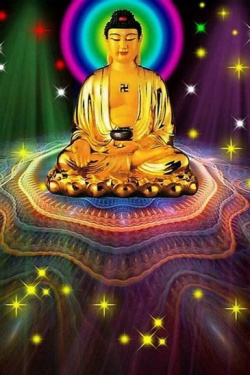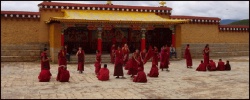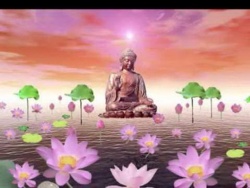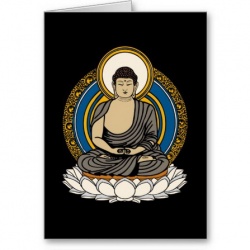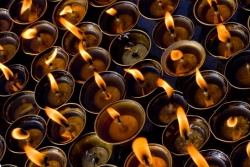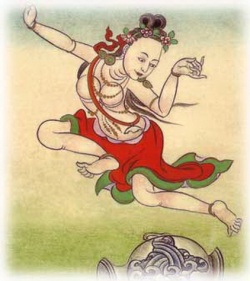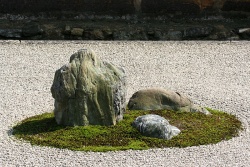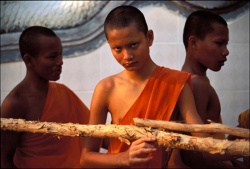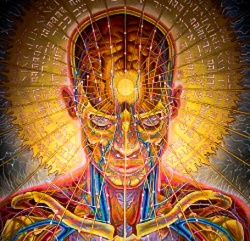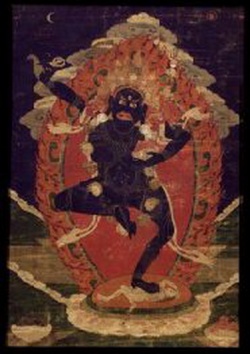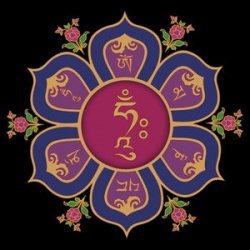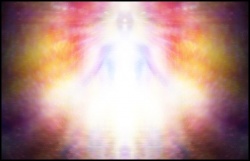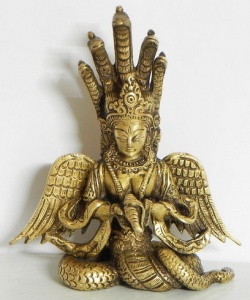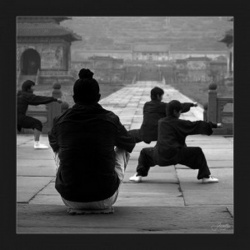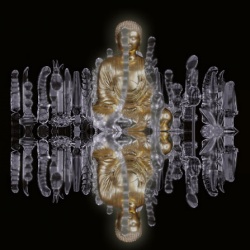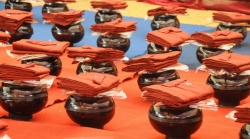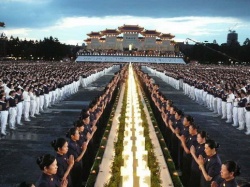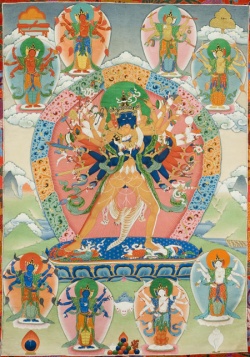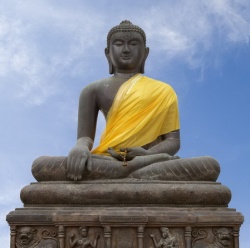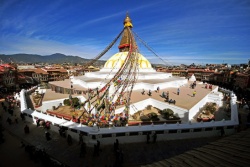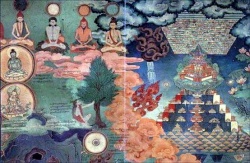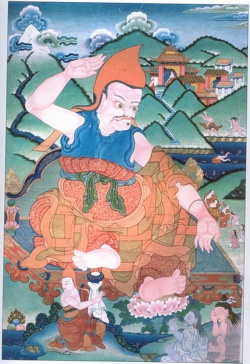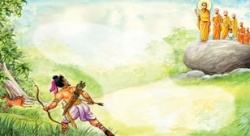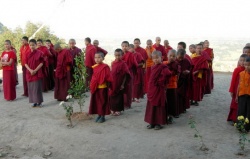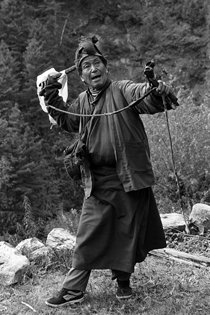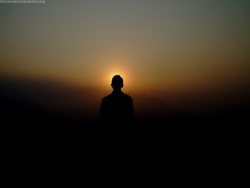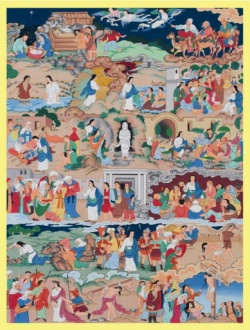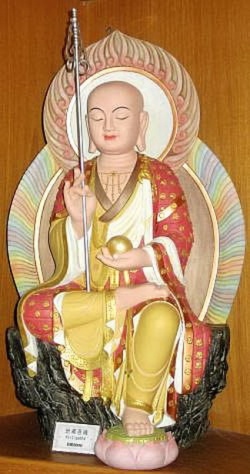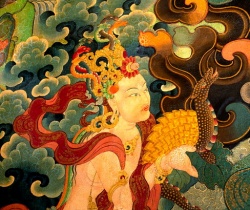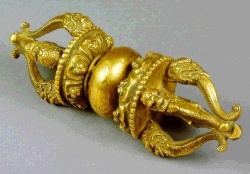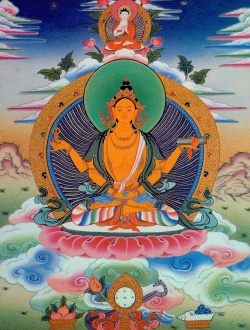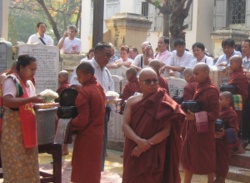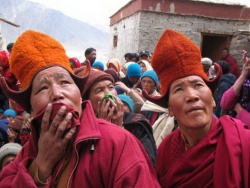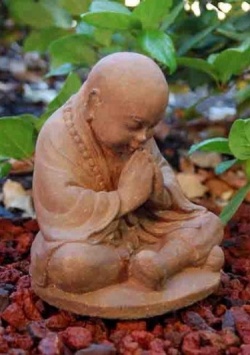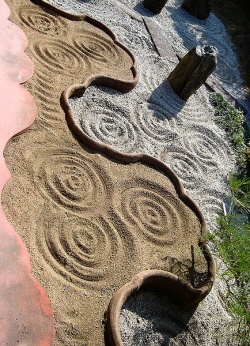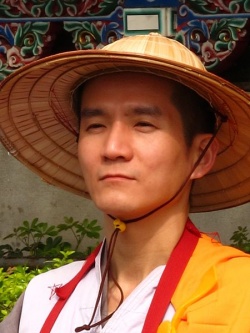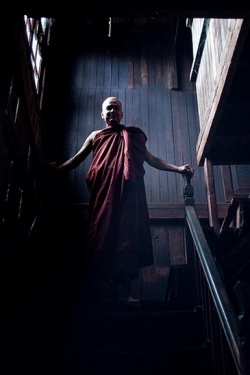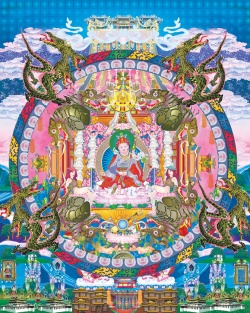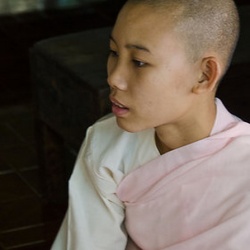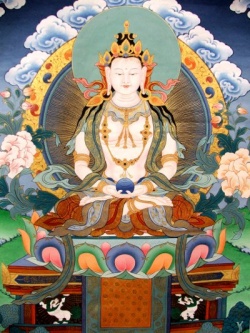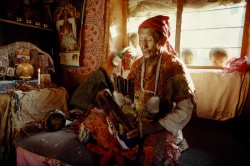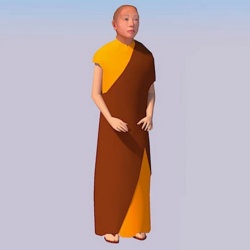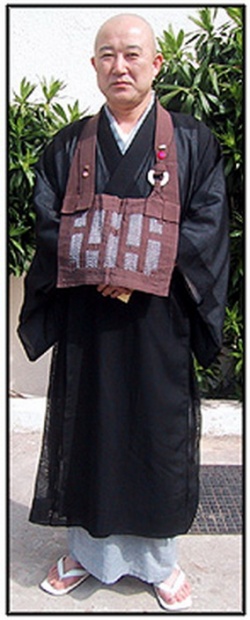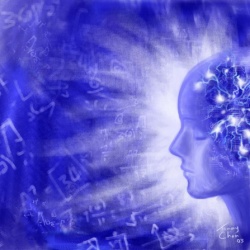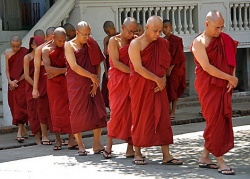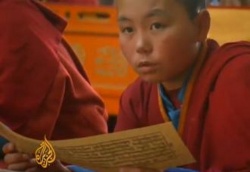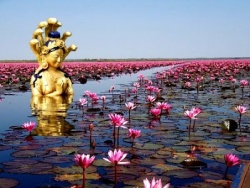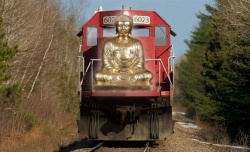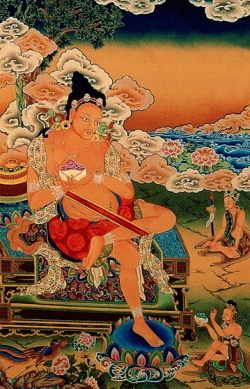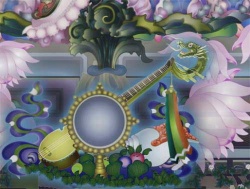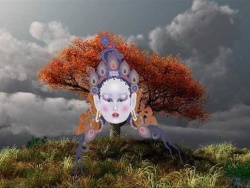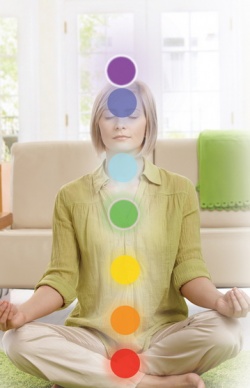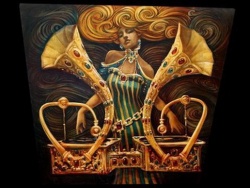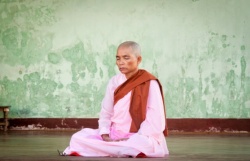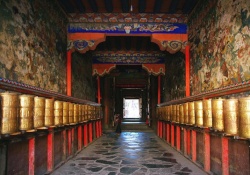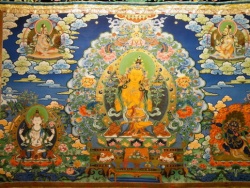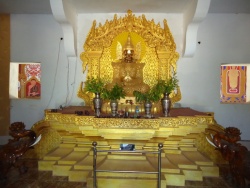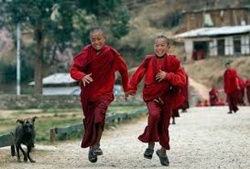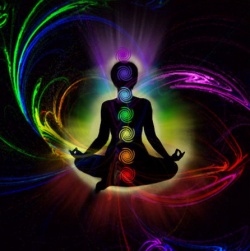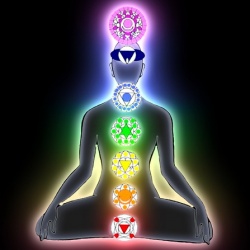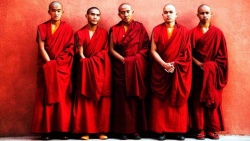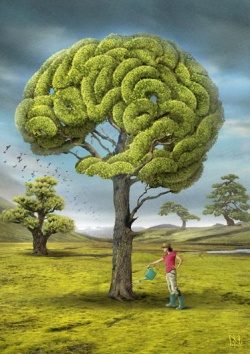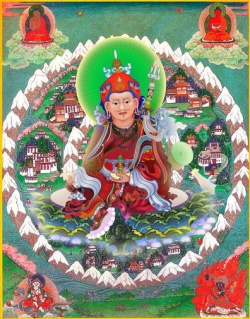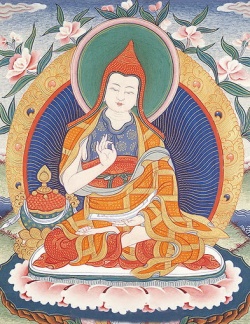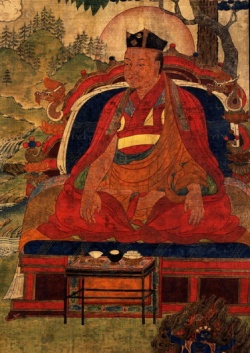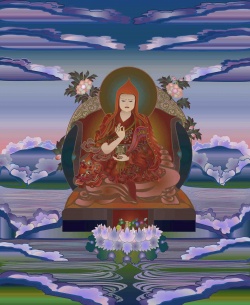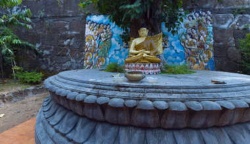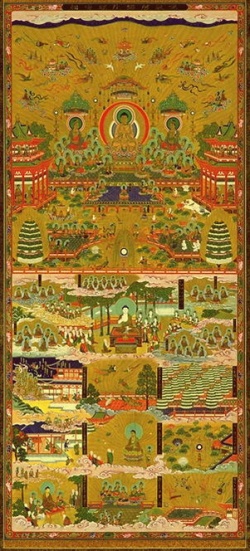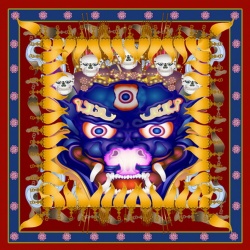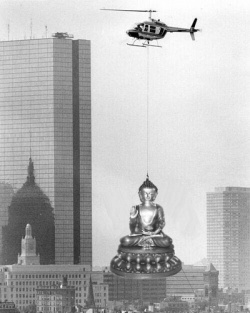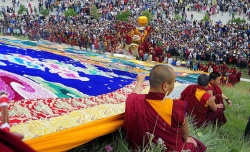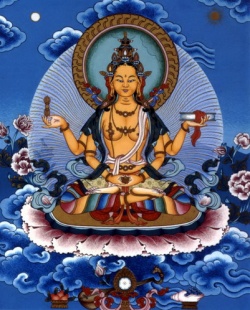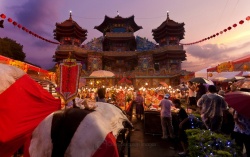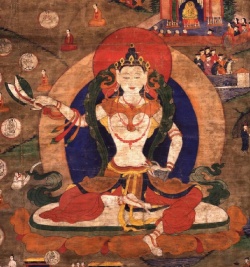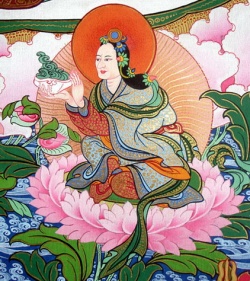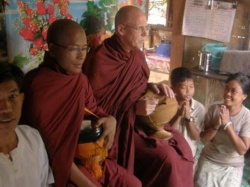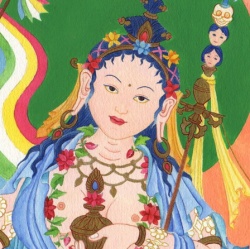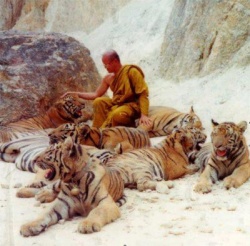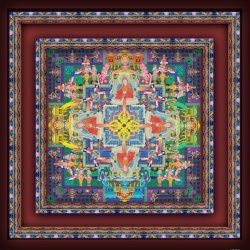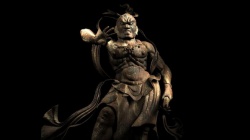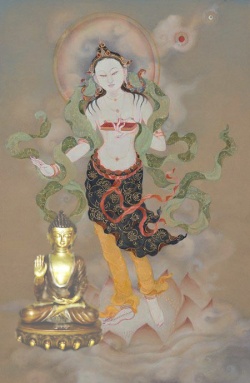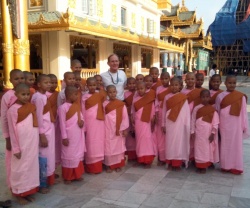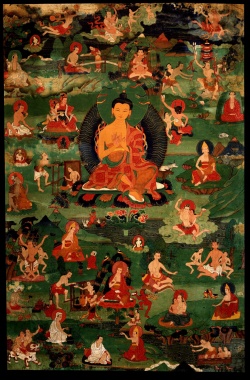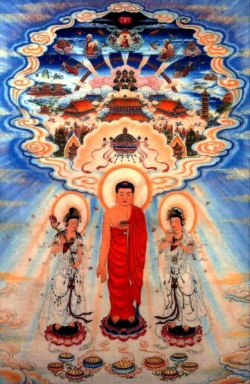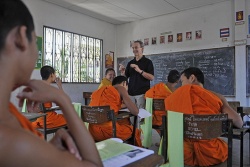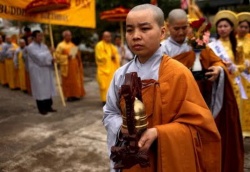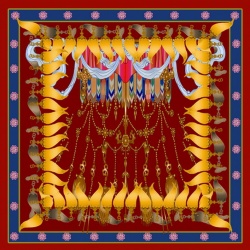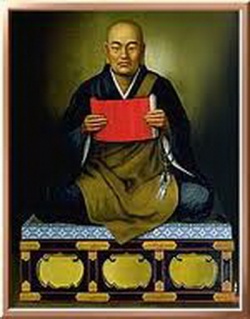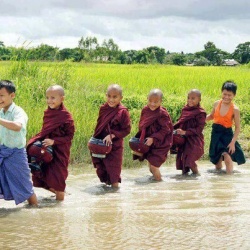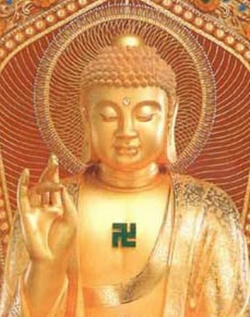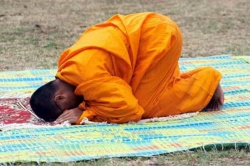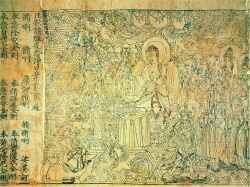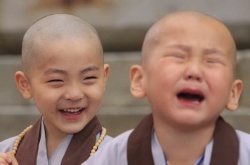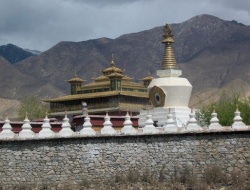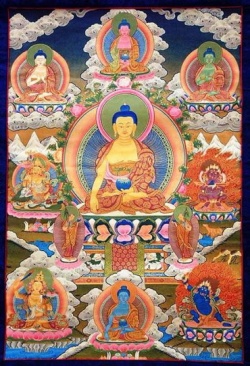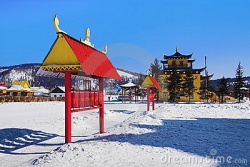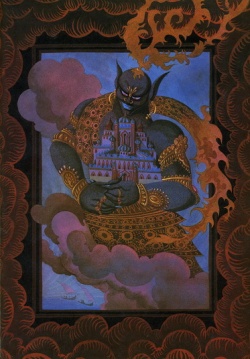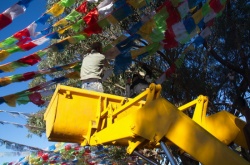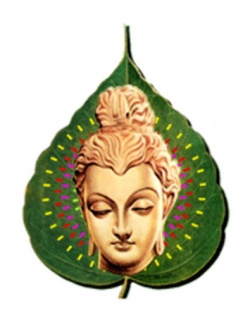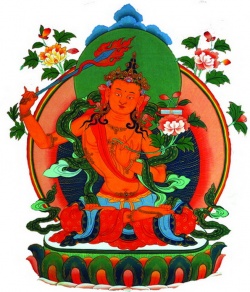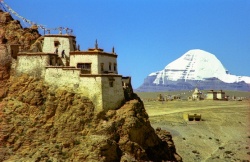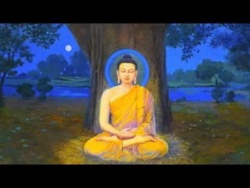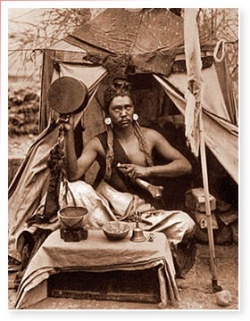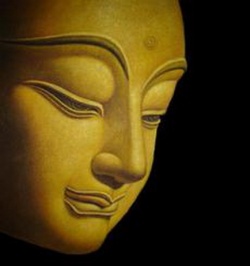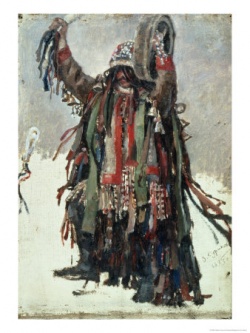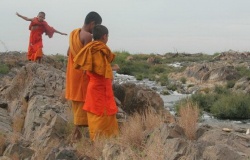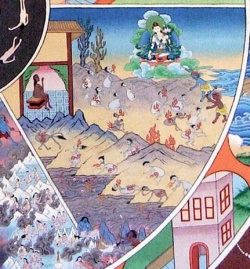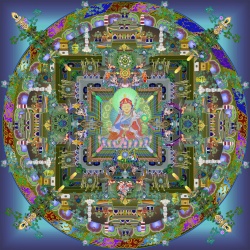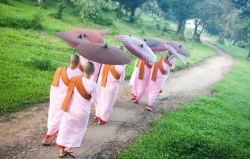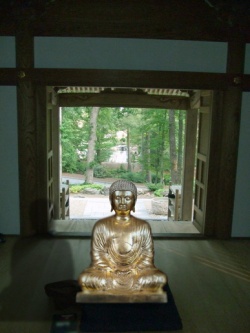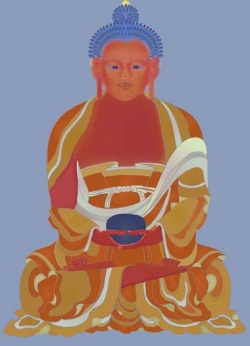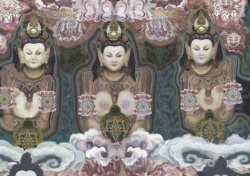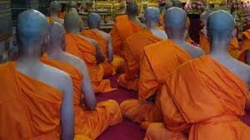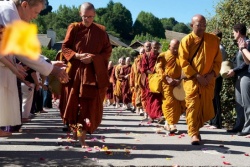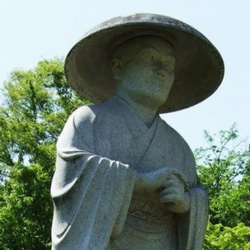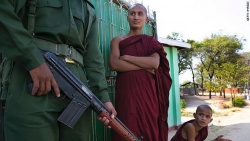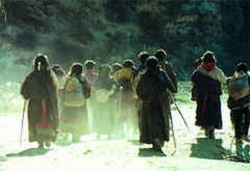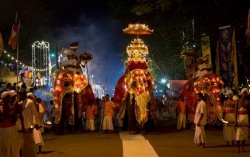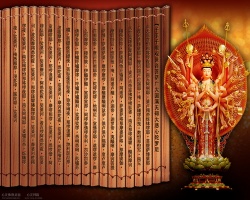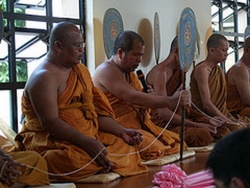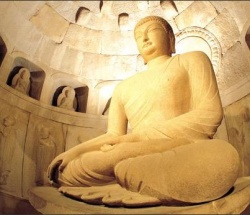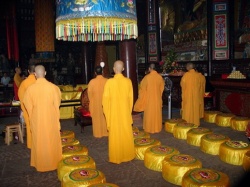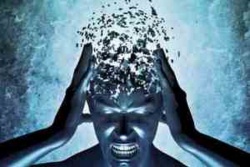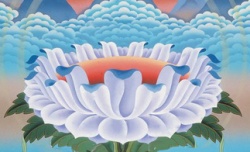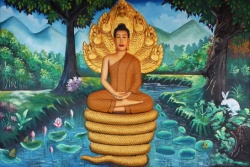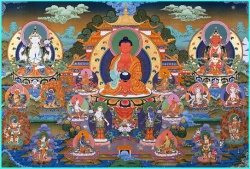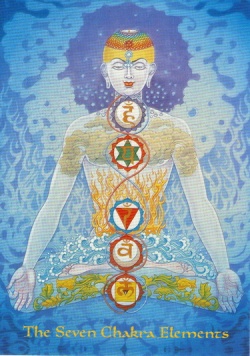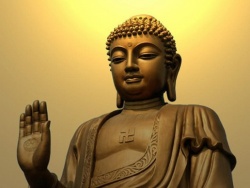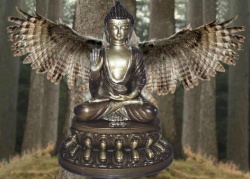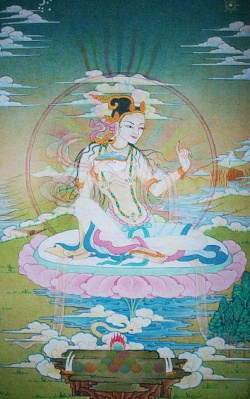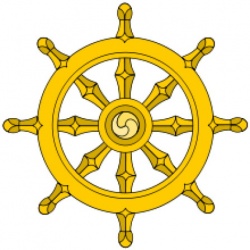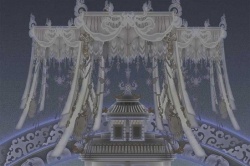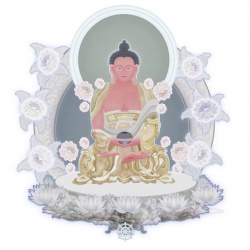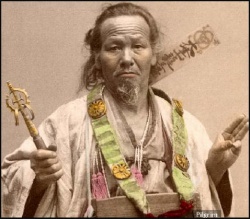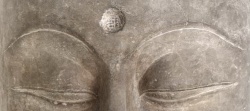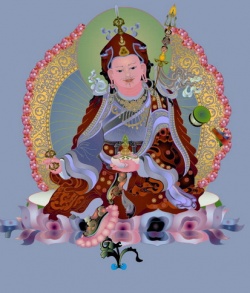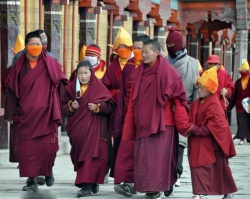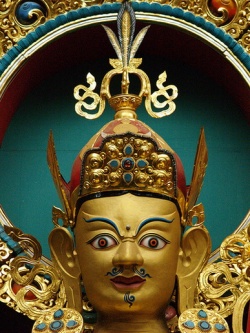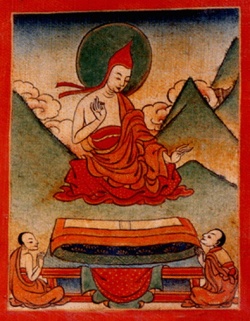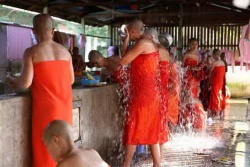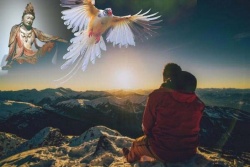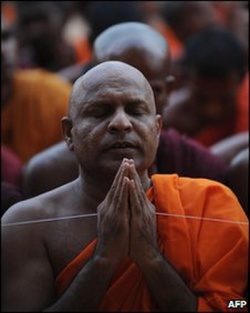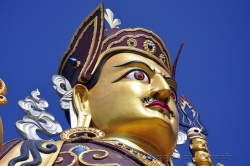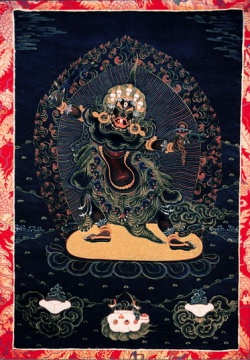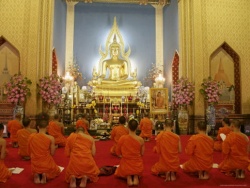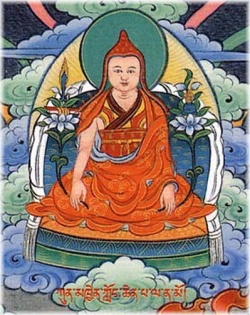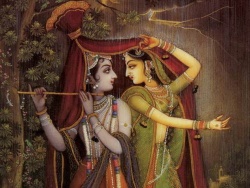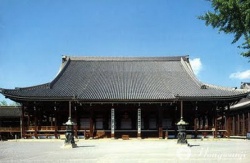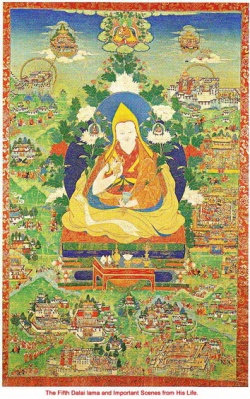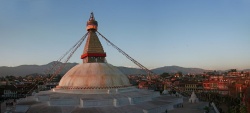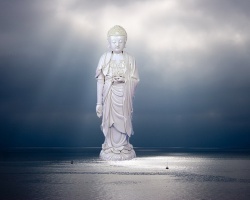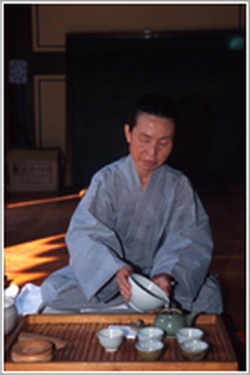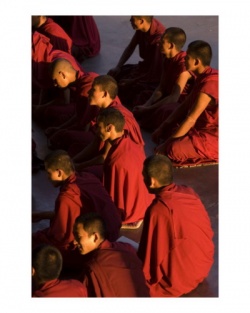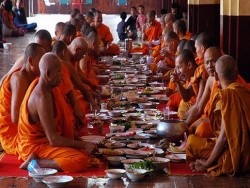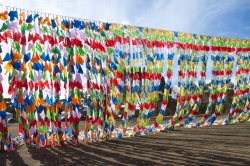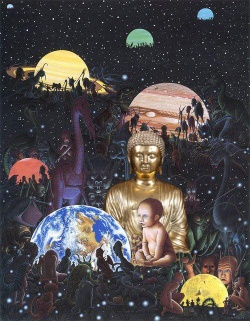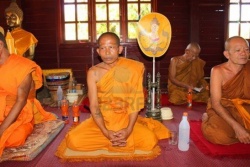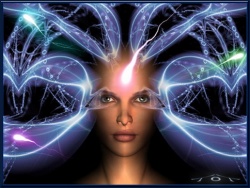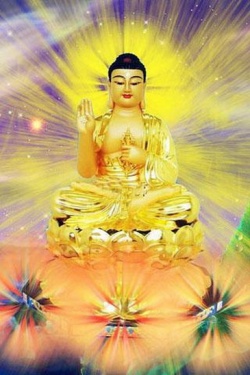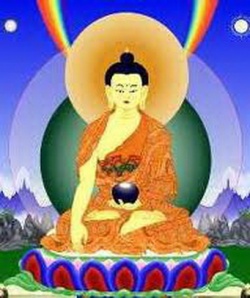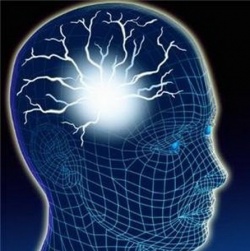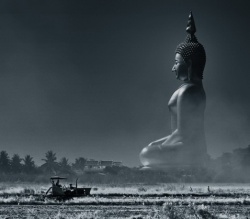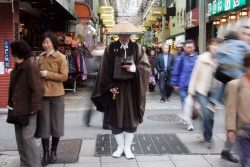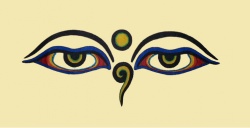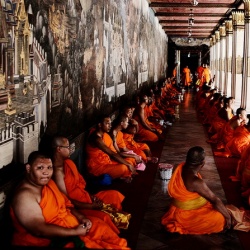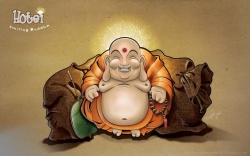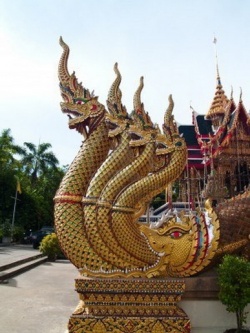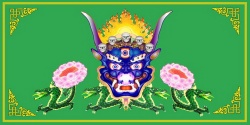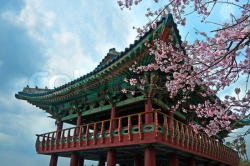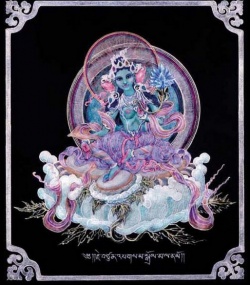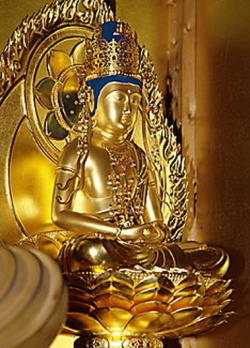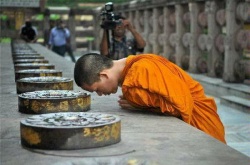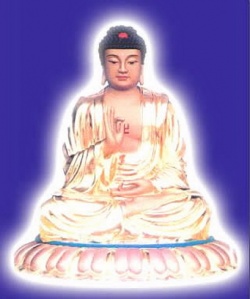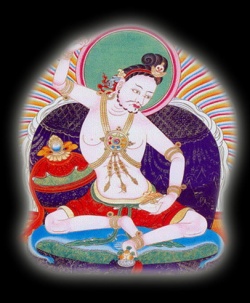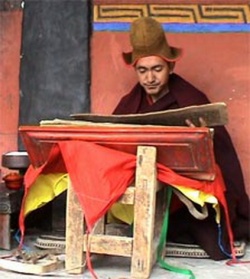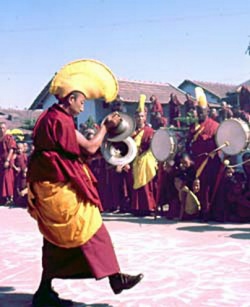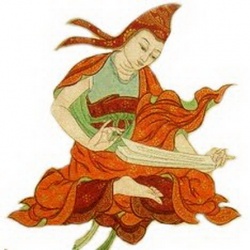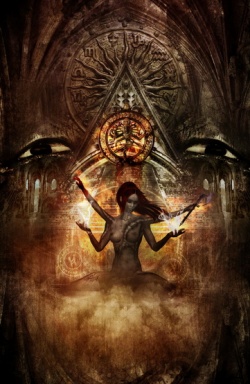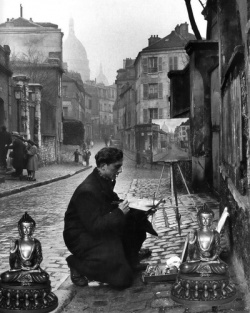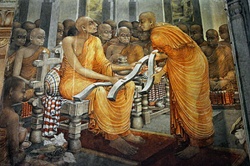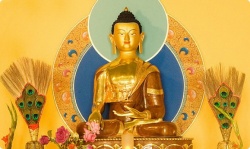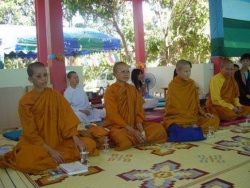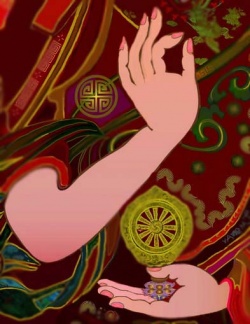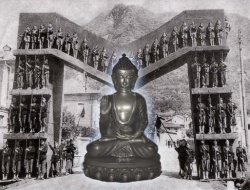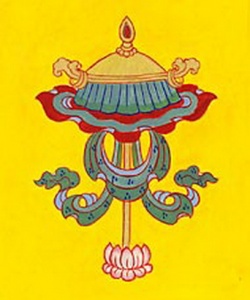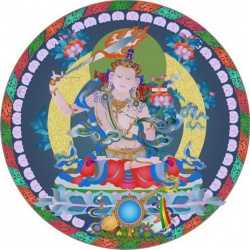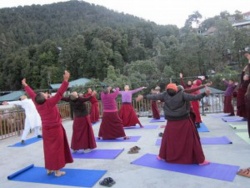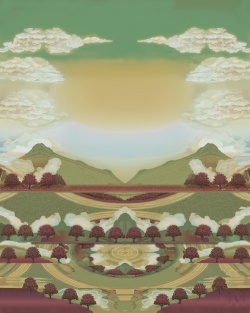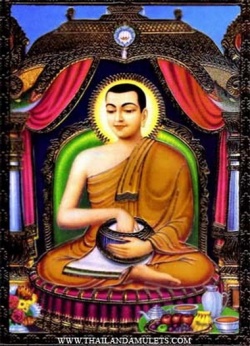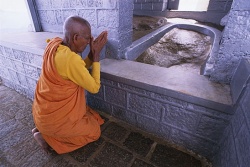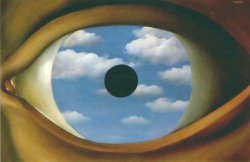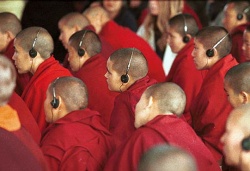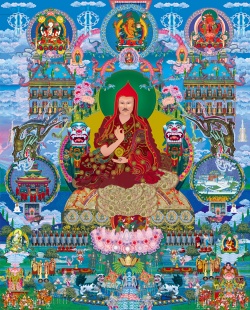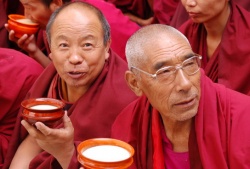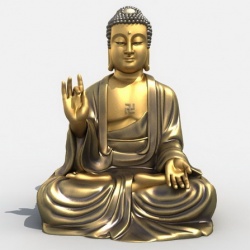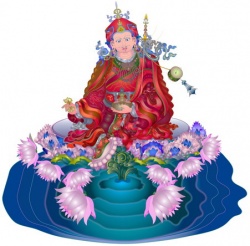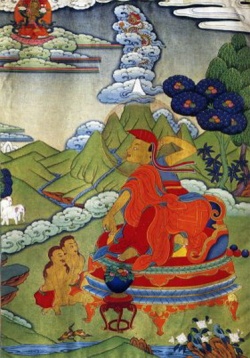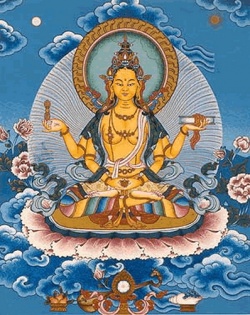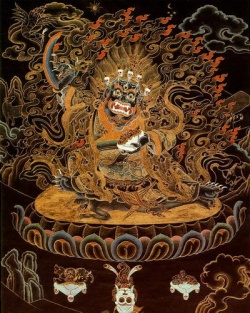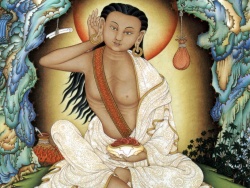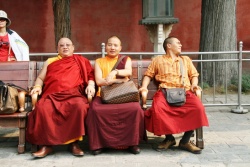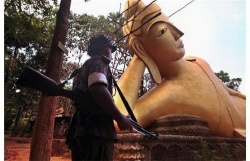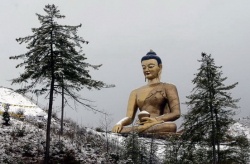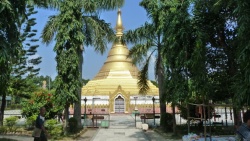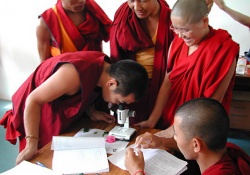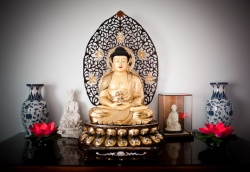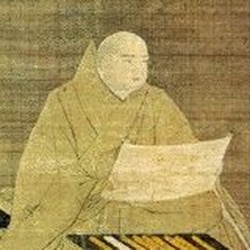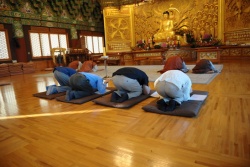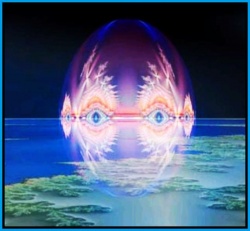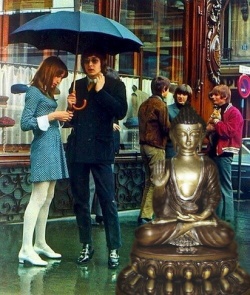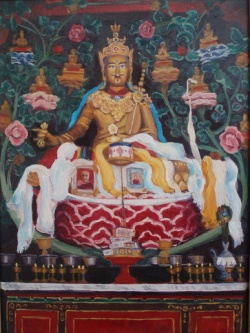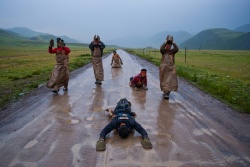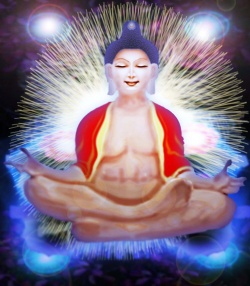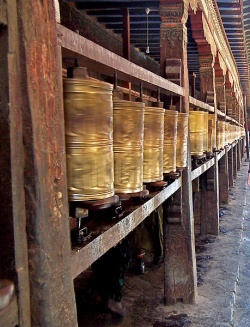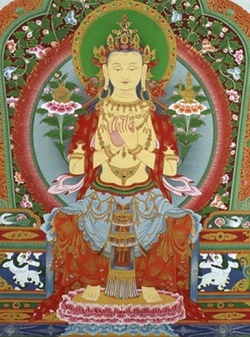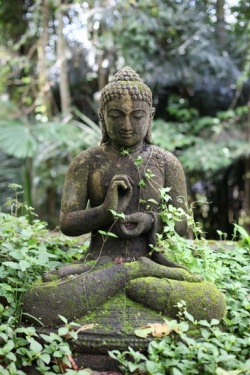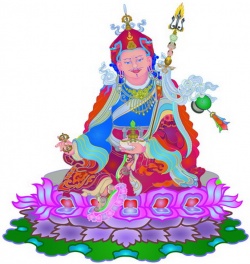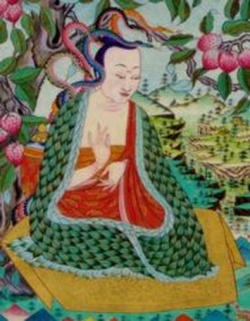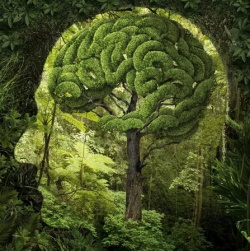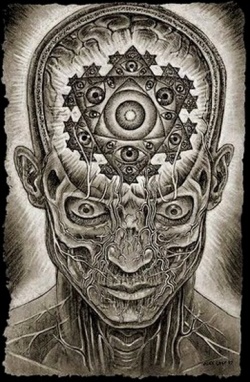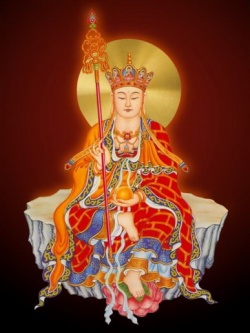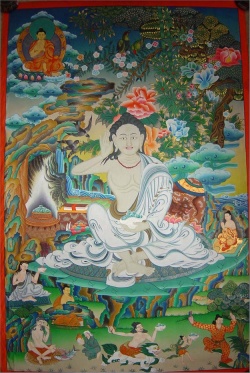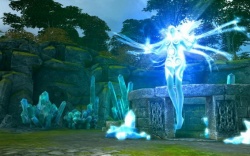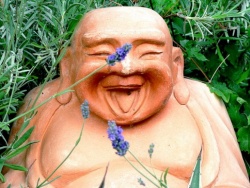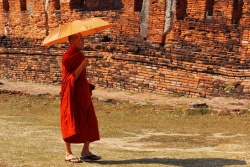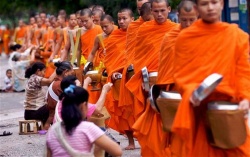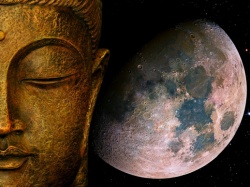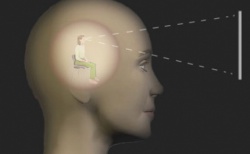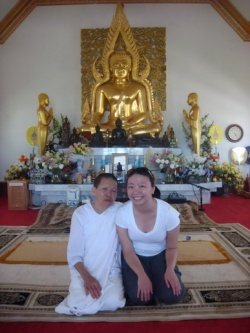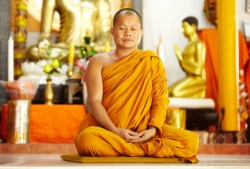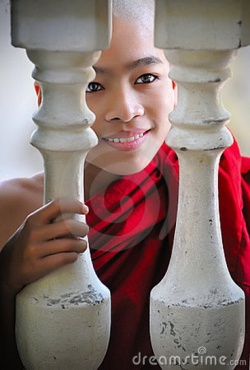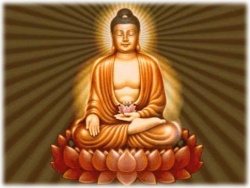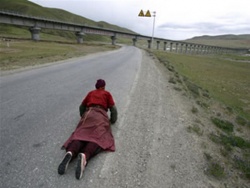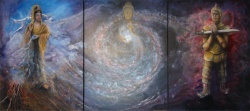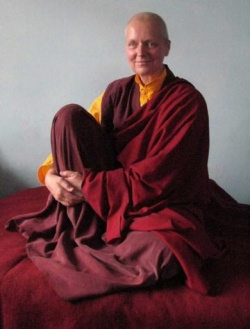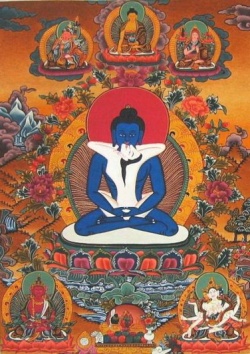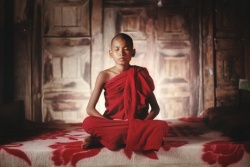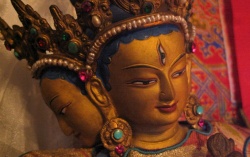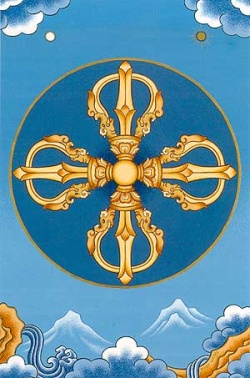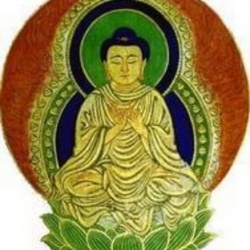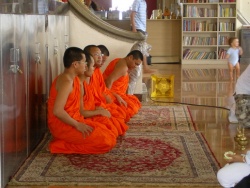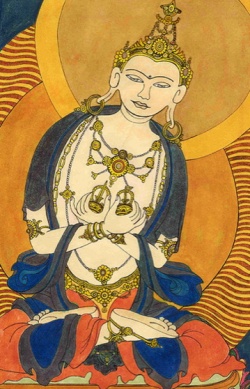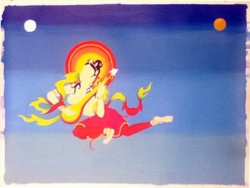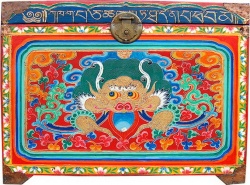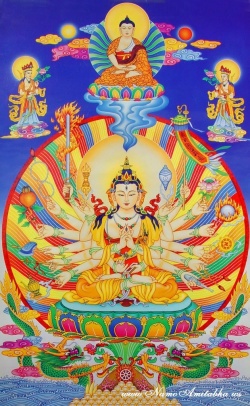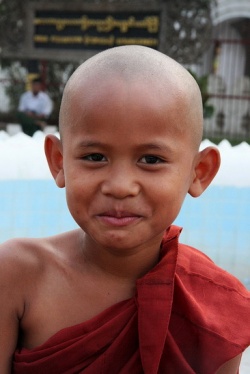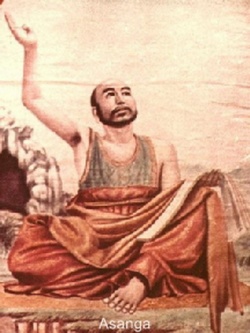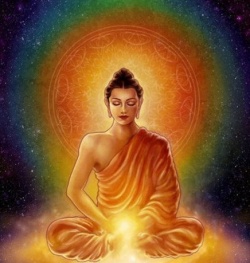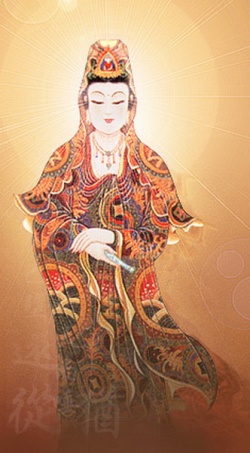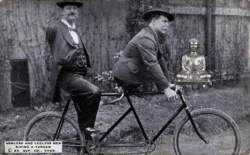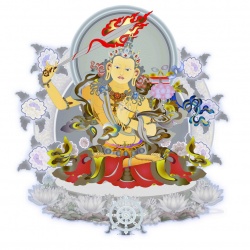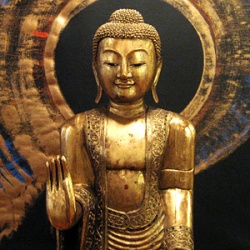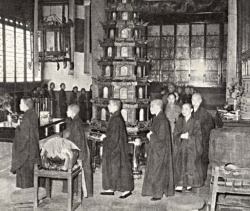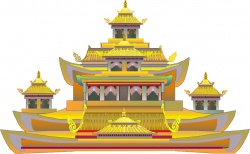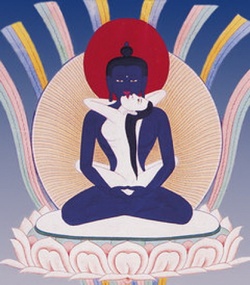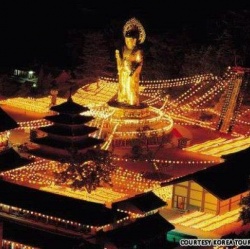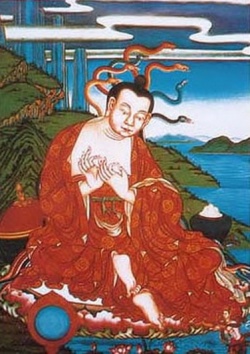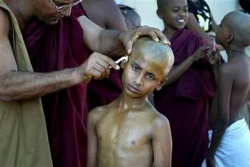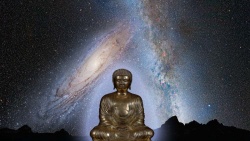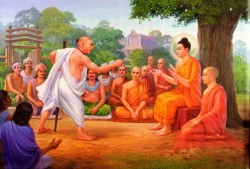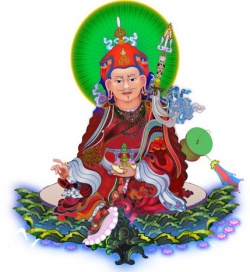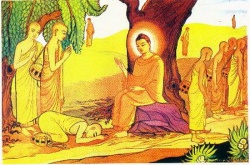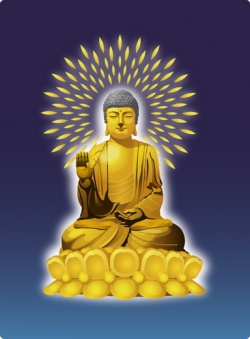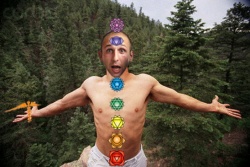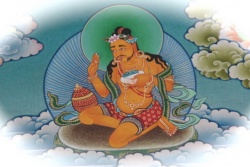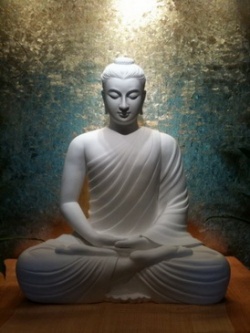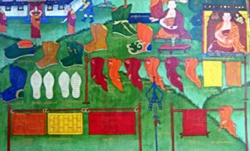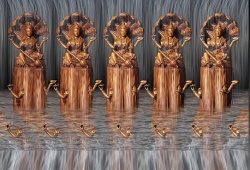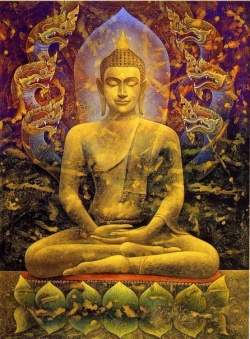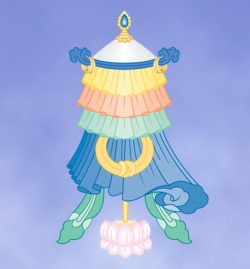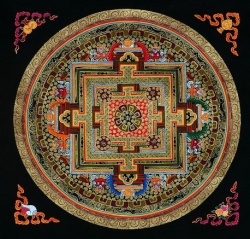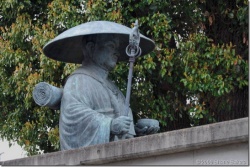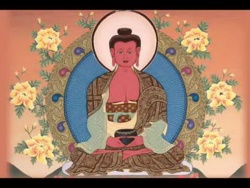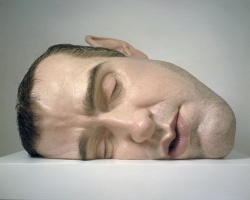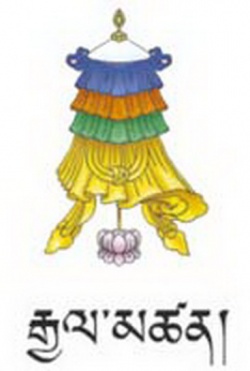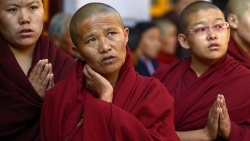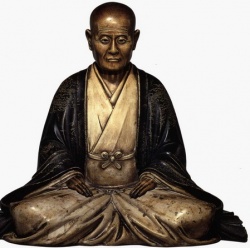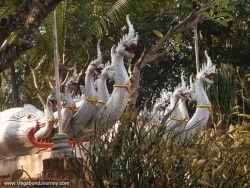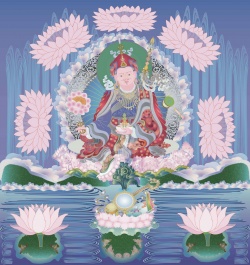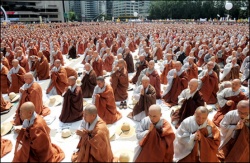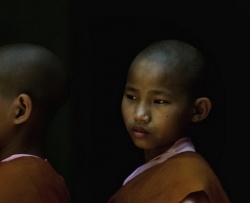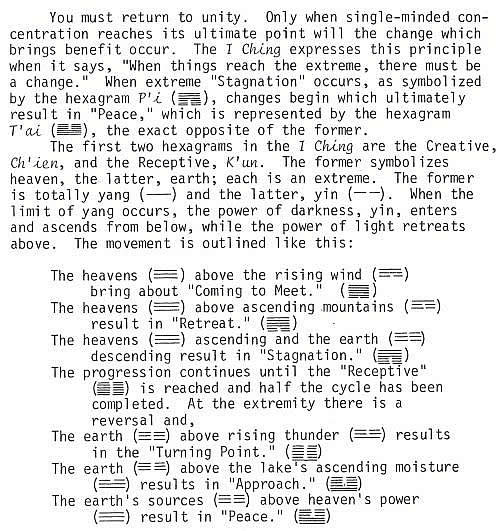Dharma talk: Listen to Yourself: Think Everything Over
Dharma Talk:
Listen to Yourself: Think Everything Over
Dharma Talks by the Venerable Master Hsuan Hua
Contents
- 1 Volume One
- 1.1 Introduction
- 1.2 Kuan Yin
- 1.3 Sweet Dew Hand and Eye
- 1.4 Kundi Hand and Eye
- 1.5 Willow Branch Hand and Eye
- 1.6 Vajra Pestle Hand and Eye
- 1.7 Tin Staff Hand and Eye
- 1.8 Jeweled Seal Hand and Eye
- 1.9 Blue Lotus Hand and Eye
- 1.10 Recitation Beads Hand and Eye
- 1.11 White Lotus Hand and Eye
- 1.12 Jeweled Bowl Hand and Eye
- 1.13 Ch’an
- 1.14 Joined Palms Hand and Eye
- 1.15 Non-retreating Gold Wheel Hand and Eye
- 1.16 Vajra Hand and Eye
- 1.17 Red Lotus Hand and Eye
- 1.18 Jeweled Conch Hand and Eye
- 1.19 Bestowing Fearlessness hand and Eye
- 1.20 Transformation Buddha Atop the Crown Hand and Eye
- 1.21 Transformation Palace Hand and Eye
- 1.22 White Whisk Hand and Eye
- 1.23 Jeweled Sutra Hand and Eye (Dharma Master Hsuan Tsang)
- 1.24 Grape Hand and Eye
- 1.25 Ax Hand and Eye
- 1.26 Jeweled Mirror Hand and Eye
- 1.27 Jeweled Arrow Hand and Eye
- 1.28 Jeweled Sword Hand and Eye
- 1.29 Five-colored Cloud Hand and Eye
- 1.30 Shield Hand and Eye
- 1.31 As You Will Pearl Hand and Eye
- 1.32 Transformation Buddha on the Palm Hand and Eye
- 1.33 Uniting and Holding Thousand Arms Hand and Eye
- 2 Volume Two
- 2.1 Short Biography of Dhyana Master Hsuan Hua
- 2.2 Wonderful Sound, Kuan Shih Yin
- 2.3 If You Just Keep Reciting
- 2.4 Endless Dharma Doors
- 2.5 Her Universal Door Rescues All
- 2.6 Patience and Vigor
- 2.7 The Story of the Venerable Hsu Yun's Enlightenment
- 2.8 Don't Push for Speed
- 2.9 The "Zero"
- 2.10 Dreaming Within a Dream
- 2.11 On Investigating the Hua T'ou (Word Head)
- 2.12 After A While It Comes Naturally
- 2.13 What No One Else Wants To Do
- 2.14 At the City of Ten Thousand Buddhas
- 2.15 When The Nature Is In Samadhi, The Demons Are Subdued, And One Is Peaceful Every Day
- 2.16 What is Ch'an Meditation? How Do I Do It?
- 2.17 The Method of Ch'an
- 2.18 Instructions to Participants in the Buddha Recitation Session
- 2.19 TALKS FROM AMITABHA RECITATION SESSION
- 2.20 Pure Land Dharma Talks
- 2.21 Ch'an Dharma Talks
- 3 Source
Volume One
Introduction
The sweet dew from the Bodhisattva’s willow branch
Can cause one drop to pervade the ten directions.
All filth and dirt are completely wiped away…
With these words, in June of 1970, the Kuan Yin recitation session was opened. It was the first such session ever held in the western world, and those attending, inspired by the Venerable Master Hua’s daily instructional talks, worked to their utmost reciting the name of the Bodhisattva.
In 1962 the Venerable Master Hua brought the banner of the Orthodox Dharma to the West. In 1968 a group of young Americans asked him to speak the Shurangama Sutra. The Master consented and the Sutra Study and Practice Session lasted for ninety-six days. From that time onwards, the Master has continued to lecture daily on the Dharma, expounding such Sutras as: The Lotus Sutra, The Sixth Patriarch’s Sutra, The Earth Store Sutra, The Vajra Sutra, The Heart Sutra, and many others. Currently, at the newly established City of Ten Thousand Buddhas, the Master continues to explain the King of Sutras, The Great Avatamsaka Sutra.
In our age of moral and spiritual decay, many bemoan the advent of the “Dharma-ending Age.” But the Venerable Master has made a vow that he will not allow the Dharma-ending Age to descend. Because he has taken the maintaining of the Orthodox Dharma as his personal responsibility, from the very beginning he has taught his students the fundamental importance of practicing what they learn. During the 1968 Study and Practice Session he spoke to his freedom-loving American disciples, telling them, “
It is absolutely essential for people who want to cultivate the Way to receive the precepts…From the lectures we derive understanding, and we practice by investigating Ch’an. Through the combination of practice and understanding we can stride forward…An example will help to illustrate the value of combining understanding with practice. A blind man and a cripple lived together in a house. One day it caught on fire. The blind man couldn’t see and had no way to get out. The cripple could see, but he didn’t have any legs. What a predicament! Then a wise advisor told them, ‘You two can get out of this burning house. How? Cripple, let the blind man use your eyes. Blind man, let the cripple use your legs.’ They followed his advice and made the best of their situation. The cripple climbed on the blind man’s back and told the blind man where to walk. Thanks to the timely advice, they managed to save themselves.”
From the Sutras and the teachings of the Buddha we gain understanding. From holding the precepts and through meditation we put that understanding into practice. As his students tackle the often elusive principles of the Doctrine the Master encourages them. “Do not be afraid of not understanding,” he will say. “Just be afraid that you will not practice what you know. If you do not practice, you are useless…”
As long as there are those who practice the teachings, the Orthodox Dharma remains. In the final analysis there is no Orthodox or Dharma-ending Age. Those who practice the Orthodox Dharma live in the Orthodox Dharma Age. Those who practice deviant dharmas live in the Dharma-ending age. Those who follow the Buddha’s precepts, study the teachings, and practice them, are certain to gain wisdom and eventually reach enlightenment, even now, in our “corrupt” age. On the other hand, those who do not follow the Buddha’s instructions could not be saved, even if they were face to face with Shakyamuni Buddha himself!
The present volume contains the Master’s lively and practical instructions given to a group of hard working cultivators of both recitation and Ch’an. As you find this volume in your hands, you can be assured of your affinities with the Dharma. In 1968 the Master said, “We have karmic connections with Shakyamuni Buddha and the Dharma which he proclaimed and which remains in the world. So now we have the opportunity to understand the doctrines. We are now in an advantageous position, even though we have been born after Shakyamuni Buddha spoke the Dharma.”
The Master has brought the Orthodox Dharma to the West. We now can hear, study and practice it. The house of the Triple World is on fire. Crippled and blinded as we may be by our degenerate age, we have been shown a way out. The world needs the light of Dharma and there is really no time to stand on the sidelines “bemoaning the descent of the Dharma-ending Age.” It is time we got down to the work at hand.
Bhikshuni Heng Yin
Buddhist Text Translation Society, July 1978
Kuan Yin
This seven-day intensive session devoted to mindfulness of Kuan Yin Bodhisattva was held in June of 1970 at the Buddhist Lecture Hall in San Francisco. Since it was the first session of its kind sponsored by the Sino-American Buddhist Association, the instruction given by Venerable Master Hsuan Hua was particularly detailed and informative, as young Americans discovered the wonder of this Dharma-door of Great Compassion.
During the week, participants practiced sitting and walking meditation while chanting aloud and silently “Na Mwo Kuan Shih Yin Pu Sa”—Namo to the Bodhisattva who Contemplates the Sounds of the World.
Sweet Dew Hand and Eye
“NAMO TO THE GREATLY COMPASSIONATE KUAN SHIH YIN”
Today is Sunday and this evening we will purify the boundaries. Tomorrow we will begin the Kuan Yin Recitation Session.
Among all the Bodhisattvas, Kuan Shih Yin has the most compassionate heart and so we say “Namo to the Greatly Compassionate Bodhisattva Kuan Shih Yin.” Namo is a Sanskrit word. Translated it means “to return the life and submit respectfully.” To return your life means to offer up your heart, mind, body, and nature to Kuan Shih Yin Bodhisattva. To submit respectfully is to bow reverently to the ground to Kuan Yin.
Great Compassion is great kindness and great sympathy. It is great kindness towards those for whom you don’t have an affinity, and great sympathy for those with whom you are of the same substance. You might also say there is an affinity even with those who have no affinity because there is not a single living being who does not have an affinity with Kuan Shih Yin Bodhisattva. Even those who have no affinity are recognized by Kuan Shih Yin as having an affinity. Most people say, “I can be compassionate towards the people I am close to.” This is not the compassion of Kuan Shih Yin.
The great compassion towards those of the same substance means that Kuan Shih Yin Bodhisattva is united with all living beings; there is no discrimination between this and that, no you and no me.
The word “compassion” includes the two concepts “kindness” and “sympathy.” What is kindness? Kindness bestows happiness on others. This is not to say, “You should invite me to lunch so I can get full and bliss out.” That’s not it at all! True kindness means that, even if you have to give your own lunch away and go hungry, you do it just to make someone else happy. Great kindness differs from the limited kindness of ordinary people. Kuan Shih Yin has no limits, no boundaries.
Sympathy is having pity on all people under heaven. The Compassionate Lord, Kuan Yin, pities all people and relieves their suffering. That which can get rid of all the suffering of living beings is great sympathy. So, in general, the two words “kindness” and “sympathy” combine to make up the word “compassion.”
In the name Kuan Shih Yin Bodhisattva, “Kuan” means “to contemplate.” It refers to a kind of wisdom which enables one to contemplate. Most people can contemplate, but they don’t have wisdom. Kuan Shih Yin Bodhisattva has contemplative Prajna wisdom.
The second word of the Bodhisattva’s name, “Shih” means “world.” Kuan Yin Bodhisattva contemplates all the sounds of the world. What sounds? All the sounds made by living beings – sounds of suffering, sounds of joy, sounds of right, sounds of wrong, good sounds, bad sounds, happy sounds, and sad sounds.
Kuan Shih Yin follows the sounds, seeking out the living beings who make them, in order to rescue them from their suffering. If you are undergoing suffering, Kuan Yin Bodhisattva will contemplate the causes and conditions and say, “Why is that person suffering? It’s because in the past he did not do good deeds. The retribution he must suffer has not yet ended, so I’ll have to wait a bit.” Then, after a while, when the suffering is just about to come to an end, if there’s not a lot left over, Kuan Shih Yin Bodhisattva will bring it to an end and pull that living being out of the sea of suffering.
Why are beings happy? It is because in the distant past they cultivated good roots, cultivated many blessings. So Kuan Shih Yin thinks, “I should go and cross him over and then he’ll be even happier. He will bring forth the resolve for Bodhi and eventually realized proper enlightenment.”
Kuan Shih Yin is a Bodhisattva; “Bodh” means “enlightenment,” and “sattva” means a “living being.” A Bodhisattva is an enlightened living being; a Bodhisattva is also one who enlightens living beings. If you are able to enlighten yourself then you will be able to enlighten others.
Among living beings, Bodhisattvas are enlightened. Basically, they are living beings, just like you and me, but they’ve chosen to cultivate the four infinite hearts: kindness, compassion, joy, and giving, and as a result they have become Bodhisattvas. If you and I and all living beings cultivate kindness, sympathy, joy, and giving, and if we practice the six perfections and the ten thousand conducts of a Bodhisattva, we, too, can become Bodhisattvas, and we will be the same as Kuan Yin Bodhisattva. Why haven’t we become Bodhisattvas? Simply because we do not cultivate. Today we cultivate, but tomorrow we don’t. The day after we want to cultivate again, but the following day, after lunch, we begin to retreat. We go forward a bit, then back a bit, forward a bit, then back a bit, back and forth, and we don’t become Bodhisattvas.
Kuan Shih Yin Bodhisattva is Amitabha Buddha’s foremost disciple. If you recite Kuan Shih Yin Bodhisattva’s name, the merit and virtue derived from the recitation is the same as if you had recited Amitabha Budddha’s name. If you recite Amitabha Buddha’s name you will be born in the Land of Ultimate Bliss; the same is true if you recite the name of Kuan Shih Yin Bodhisattva. Reciting Kuan Shih Yin Bodhisattva’s name for seven days is the same as reciting Amitabha Buddha’s name for seven days.
We now begin a Kuan Yin Bodhisattva recitation session and will recite the Bodhisattva’s name for seven days. In the Amitabha Sutra, it says, “If a good man or good woman hears spoken ‘Amitabha’ and holds the name, whether for one day, two days, three days, four days, five days, six days, as long as seven days, with one heart unconfused, when that person approaches the end of life, before him will appear Amitabha and all the assembly of Holy Ones. When the end comes, his heart is without inversion; in Amitabha’s land of Ultimate Bliss he will attain rebirth.” Reciting the name of Amitabha Buddha for seven days is the same as reciting the name of Kuan Yin Bodhisattva for seven days and both lead to rebirth in the Land of Ultimate Bliss.
Recently, one of the people attending the summer session asked me a question. I replied, “Don’t ask me. I’m not paying any attention to such matters. The Americans here can speak English and they know what’s going on. I have given my authority to them, just like Amitabha Buddha gives his authority to Kuan Yin Bodhisattva.” The summer session combines study and cultivation. If you cultivate but do not study, you are practicing blindly and you will never manage to cut off the “affliction obstacle.” If you study but do not cultivate, you will never cut off the “obstacle of what is known.”
If you can’t cut off the “affliction obstacle,” you still have a self, and if you can’t cut off the “obstacle of what is know,” you still have dharmas. If you have dharmas, then you have the dharma-attachment; if you have a self, you have the self-attachment and you have not realized that basically self and dharmas are empty. Therefore, you must combine study and practice. The understanding derived from study aids us in our practice and the practice aids us in our study. They harmonize. You shouldn’t cultivate your whole life away and then find that when someone asks you how to explain a sentence of Dharma, you don’t know what to say! On the other hand, you shouldn’t simply study and listen to a lot of lectures on the Sutras and then find that, when someone asks you how to cultivate, you’re speechless!
The Kuan Yin recitation Session will last for seven days. The Amitabha Sutra says, “…whether for one day, two days…” but we will change it slightly. The Chinese word for “whether” looks like this...We are going to move the middle line a bit to the right a bit it turns into the word “suffering” So the text now reads, “…suffering for one day, suffering for two days…”
If you don’t suffer for seven days, you’ll never be free from suffering. If you suffer through these seven days, you’ll be able to end it. If you’re afraid of suffering, you should say so right now. If you aren’t afraid, then don’t be lazy for even a second. Those who don’t want to suffer for seven days can back out and be happy for seven days. But if you are happy for seven days, in the future, you won’t be happy. On the other hand, if you suffer for seven days now, later you’ll be happy. Whether you want to be happy for seven days now and then be sad, or suffer for seven days now and then be happy, is all up to you. I won’t offer my opinion because we talk about true freedom here.
We’re going to suffer for seven days reciting the name of Kuan Shih Yin Bodhisattva. You may wonder, “What is the advantage of all this suffering?
I answer, suffering itself is an advantage. If before you couldn’t stand to suffer, but you learn to endure suffering, that, in itself, is an advantage. Some people say that when the suffering ends, the advantage is obtained, but I don’t agree. I say that suffering is itself an advantage. If you’re able to be patient and bear weariness and suffering, you’ll find it is a great help in your cultivation of the Way. When the weariness is over, the sweetness comes. During these seven days, perhaps you’ll be enlightened. I shouldn’t tell you this because if I do, on the one hand you’ll be greedy. If you are greedy, you won’t be sincere in your recitation and you won’t become enlightened. So I’m not going to talk about how many good points may be obtained. You should find them yourself. I don’t want to say too much because I don’t want you to get greedy.
In general, cultivate according to the Dharma and you will obtain a response. When you’re done reciting, Kuan Yin Bodhisattva will always protect you and say, “This American isn’t bad at all. He recited my name for seven days and so I will protect him because I protect the Proper Dharma.”
I’m telling you just a little bit. If I spoke in details, I’d never finish. I wouldn’t want you to get arrogant, either, and think, “I’ve recited for seven days and Kuan Yin Bodhisattva will certainly protect me. I’m not afraid of anything. I’m really fine,” If you indulge in that kind of pride, a demon will come to hassle you and Kuan Yin Bodhisattva won’t do anything but say, “he’s really worthless. Look how arrogant he is.”
People who cultivate must not be arrogant or self-satisfied. So it is said, “You can go ahead and eat too much. It’s not important. But if you talk too much you’re in for trouble.” If you eat too much, at the very most you’ll be uncomfortable and have to make arrangements to move the food. But if you talk too big, say you brag that you can lift five hundred pounds, you’ll go to lift it, strain something, and spit blood.
What I’m getting at here is, if you have not yet realized the karma of the Way, do not talk arrogantly, whatever you do. Don’t say, “I can do everything,” because as soon as you say it, a demon will come to test you. The demon, however, is really an aid to your progress in the Way. As soon as you say that you have put everything down, the very thing that you can’t put down will arrive to test you; it will come to see what you will do. At that time, if you’ve really put it down, you will know. If you haven’t put it down, you’ll be pretty clear about that too.
Once I said a very arrogant thing. I said, “I’m not afraid of demons. Cultivators fear demons, but I don’t . I don’t fear any demons at all – earth demons, heavenly demons, human demons, or ghostly demons.’” As soon as I said it, a sickness demon got me so sick that I didn’t know anything at all. After that, I understood that you have to be careful in everything that you do never to boast.
Now, I have something to say that’s very arrogant, but I don’t pay attention to how arrogant it is; I just go ahead and say it: “Everything’s okay.” Good and bad, birth and death – I see them all as the same. They are no problem at all. Whether people believe in me or not makes no difference. Even sickness and death is no problem. I just don’t see them as problems. I’ve said this many times, and have run into no difficulty.
Tonight we will begin the session. This is the first time a Kuan Yin Session has been held in America and the participants must all be number one. No one can be number two. Everything I do has to be tops, with no runners-up. And I don’t want anyone else to trail behind either.
You may think, “You just like to be No. 1!”
Of course I do! If I didn’t like to come out on top, how could I teach all of you to be Number Ones, too?
Now, let’s begin the session!
Kundi Hand and Eye
The Summer Sutra Study and Recitation Session is a method of cultivation for the summer months. This winter we will begin a period of fourteen Ch’an weeks—ninety-eight days, two days short of a hundred days. It will be much harder than the Summer Session, which is merely an entrance exam for the big meditation session. How can you pass? You should not even want your own life; just insist on cultivating.
“isn’t this insanity?” you may ask, “cultivating to the point of going nuts, cultivating until you don’t even want to live anymore? Wanting to do nothing but cultivate?”
Maybe it is; maybe it isn’t. Everyone is crazy these days. If you’re not crazy, they think you are. Maybe it is true and maybe it isn’t. although practically everyone is crazy, they just don’t realize they’re crazy.
Some people accuse me of being crazy, and I say, “Maybe I am and maybe I’m not,” because there are no fixed dharmas. Everything is made from the mind. If there is craziness in your mind, you’re crazy; if there is no craziness in your mind, you’re not. All dharmas arise from the mind. When the mind arises all dharmas arise; and when the mind does not arise all dharmas perish. Now, during the session, the mind will not arise and dharmas will not arise. The state of non-production and non-extinction will manifest.
We just completed a ceremony which is called “sprinkling clean.” Those who have studied Buddhadharma know what “sprinkling clean” means, but those who have not studied Buddhadharma don’t know what we are doing—muttering
“Na mwo Na mwo, Mwo la Mwo la,”
taking a bowl of water and sprinkling it all over. Someone says, “I know. You were getting ready to sweep the floor and so you sprinkled water on the ground so the dust would not fly around.”
No. It’s not to keep the dust down, but rather to keep the demons from flying around, because there are demons everywhere. Whenever one convenes a Dharma assembly in a Bodhimandala, one should sprinkle it clean. Otherwise demons may come to disturb the Bodhimandala and cause a lot of trouble. “Sprinkling clean” keeps them away.
The water is called “sweet dew,” Kuan Yin Bodhisattva’s sweet dew. It chases out all demons and ghosts so that the Bodhimanda says,
The sweet dew from the Bodhisattva’s willow branch
Can cause one drop to pervade the ten directions.
All filth and dirt are completely wiped away.
Causing the platform to be totally clean and pure.
Although we are sprinkling clean, it is not that we are actually using water. This is the verse that we recite when “sprinkling clean.” Now that I have explained it, you understand what we are doing.
Willow Branch Hand and Eye
You have already suffered for one day. If you think it’s suffering, it’s suffering. If you think it isn’t suffering, then it isn’t. Reciting Kuan Yin Bodhisattva’s name is not really suffering, for it plants many good roots and the seed of Bodhi.
You should not only not think of it as suffering, but you should be very happy. Why? Because in a hundred thousand ten-thousand aeons, it is difficult to encounter this Dharma door. How many times have you gone around on the wheel of rebirth, spinning in the six paths, and never encountered this Dharma door? Confused, we have passed through aeons as many as the number of dust motes in the Ganges River. Now, having met the Buddhadharma, we should be happy.
The power of the function of reciting Kuan Shih Yin Bodhisattva’s name is inconceivable. If someone has a demonic obstruction and recites Kuan Yin Bodhisattva’s name, the demons will run away. If someone seeks anything at all, and continually recites Kuan Yin Bodhisattva’s name, he will succeed. In the Universal Door Chapter of the Lotus Sutra it is said that those who have a lot of desire and constantly recite Kuan Shih Yin Bodhisattva’s name will be able to separate from their desire.
Desire is greed—greed for wealth, sex, fame, food, or sleep. Whether or not greed is good is a matter you must decide. If you think it is good and I tell you it is not, you will want to argue with me and will thereby waste a lot of energy. In the end, you’ll still think greed is good. There is no way that I can convince you it is not good. If you think it is not good, and if you want to put it down, you have already found a way.
What is the way? Recite
“Namo Kuan Shih Yin Bodhisattva,”
and you’ll be able to put down your thoughts of greed and desire, your defiled thoughts, and your ignorant thoughts. Recite Kuan Shih Yin Bodhisattva’s name and you will be able to break through ignorance and realize genuine wisdom. If you would prefer wisdom to your present state, you should recite “Namo Kuan Shih Yin Bodhisattva” and bow to Kuan Shih Yin Bodhisattva.
Constantly reciting,
“Namo Kuan Shih Yin Bodhisattva,”
your thoughts of greed and desire will gradually melt away and you won’t even know how it happened.
Right now you have many greedy thoughts, but you are not aware of them. In the same way, you won’t be aware of them as they lessen. Although you won’t be aware of them, the lack of greed is actual proof of the efficacy of recitation. Rid of greed and desire, your thoughts of hate will also disappear. It is said, “If someone has much hatred and continually recites “Namo Kuan Shih Yin Bodhisattva,” thoughts of hate will disappear.
Just recite. You don’t have to pay a fee to do it, and you don’t have to do any work. Just repeat, “Namo Kuan Shih Yin Bodhisattva,” very, very respectfully with all your attention focused on it. You will feel as if Kuan Shih Yin Bodhisattva is right on top of your head, on your right and on your left, in front of you and behind you. Kuan Yin will give you a prediction of Buddhahood and manifest before you saying, “Good woman, good man, your thoughts of greed and hatred are gone. You’ve brought forth the Bodhi-Mind, and in the future you’ll certainly obtain the Bodhi-Way.” If you truly concentrate and are mindful, Kuan Yin will come to you and say this.
Everybody has a temper. If you’re not mad at this person, then you are mad at that situation. Anger can upset you to the point that you can’t even eat or sleep. This is just punishing yourself. You recite Kuan Yin and yet think you suffer, whereas people who suffer from anger don’t feel like they are suffering. Getting angry is much more suffering than reciting.
If you recite Kuan Shih Yin Bodhisattva’s name, all you have to lose is your stupidity. Stupidity is taking what is right as wrong and what is wrong as right, taking the deviant as proper and the proper as deviant. This happens because you don’t understand, because you are too stupid. Stupidity obstructs wisdom, and anger obstructs compassion. In one thought of stupidity, prajna is cut off. In one thought of wisdom, prajna manifests. If we want to have wisdom we should not be stupid. What is stupidity? It is just whatever you don’t understand.
“What don’t I understand?” you may ask.
How should I know what you don’t understand? Ask yourself. If you don’t know I will give you a little news. You don’t understand how to cultivate. You don’t understand how to let go of your hate and greed. You don’t understand how to let go of your stupidity. Right? If you really understood, you would have let it go long ago. You wouldn’t have had to wait to recite “Kuan Shih Yin Bodhisattva” in order to let it go. I think that you probably agree with what I have said.
Further, you don’t understand what ghosts are. Many people say that there are no ghosts. Some religions spray poisons in people’s minds, doctrines which seem to be reputable but which in fact are not. They say there are no ghosts. They are able to poison people’s minds with these ideas, because many people are taken in by the persuasiveness of their arguments. And so most people don’t understand about ghosts.
We don’t even need to speak of ghosts—they don’t even know about animals. How did they get here anyway? How did animals get to be animals? They don’t know that either.
But let’s not even consider animals, after all, they are only animals. But they don’t even know how they got to be people. They don’t know where people came from or where they are going. They don’t know about ghosts, they don’t know about animals, they know nothing about people and even less about asuras and gods.
“Oh, yes,” they argue, “I know about heaven. Heaven is up there and God is in it.”
Have you ever been there? If so, what did you see? If not, what proof do you have that there are heavenly gardens and God up there?
Do you know about Sound Hearers or the Conditionally Enlightened Ones? Do you know about the Bodhisattvas? How much the less do you know the Buddha. Is that anything but stupidity?
“Dharma Master,” you ask, “do you know about them?” Don’t ask me. I’m me and you are you. Why should you care about what I know? Isn’t that really just going too far?
“Well,” you say, “you brought it up.”
Yes, but you don’t have to listen.
If you’re stupid, does that mean you will be stupid till the end of time? Must you hold on to your stupidity like it was a treasure? I believe that no matter how stupid someone is, if he realized what he was doing he no longer would hold on to his stupidity like a treasure, but would want to get rid of it. So, those who want to cut off relations with stupidity, anger, and greed now have the opportunity to do so.
Now, your good roots are deep and thick. They were in the past, they are now, and they will be in the future, when they will certainly mature. Having met the wonderful Dharma, recite Kuan Shih Yin Bodhisattva’s name. In this way your wisdom will open and your stupidity will disappear.
Kuan Shih Yin Bodhisattva will help increase our wisdom, our compassion, and our heart of Bodhi.
Not only that, but through our recitation of the name of Kuan Shih Yin Bodhisattva, the people in the four directions can benefit from his kindness and wisdom. When people recite Kuan Shih Yin Bodhisattva, know that for a space of forty yojanas, 3,200 miles, there will be peace and no calamities. I don’t want to keep this treasure to myself and so now I wish to transmit it to all who have gathered here to recite.
Vajra Pestle Hand and Eye
Good Knowing Advisors: Why do I call you Good Knowing advisors? If you weren’t Good Knowing advisors you wouldn’t be able to recite Kuan Yin Bodhisattva’s name. Since you have come to recite, you must be Good Knowing Advisors.
Where did you Good Knowing advisors come from? In past lives, you created an affinity with the Buddha, the Dharma, and the Sangha. Think it over: previously in America there weren’t any left-home people, and there was nowhere to go to attend a Kuan Yin Session. Now, here you are.
We say we “strike up” a session, and that means that we do battle with our false thinking. Our false thinking is continuous from morning to night; there’s just no way you could count all your false thoughts which are as many as specks of dust in empty space. See the dust on the window? We have just that many false thoughts.
“Well,” you say, “I didn’t know that.”
Of course not. When everything is black and the sunlight isn’t streaming in, you cannot see the motes of dust. Your recitation of Kuan Yin Bodhisattva’s name has given you the sunlight of wisdom with which to reveal your false thoughts.
“My mind is running wild. I’m sitting here reciting Kuan Yin bodhisattva’s name and at the same time I’m having false thoughts about going out for a beer. I recite a bit more and then I have a false thought to go have a steak. I recite a little more and then I think I would like to go out and get stoned.”
Now that you know you have false thoughts, where do these thoughts come from? The sun of wisdom shines on your dusty false thoughts so that all of you now know you have them and since you are determined to bring them to a stop, I call you all, “Good Knowing Advisors.” Do you all consider yourselves Good Knowing Advisors?
Someone is thinking, “I am not a Good Knowing Advisor.”
It doesn’t really matter whether you consider yourself as one, because you already are one. Not only can you consider yourself a Good Knowing Advisor, but you can also become a Buddha. But don’t consider yourself a Buddha already. Don’t be like those stupid people who say, “Hey, everyone is a Buddha. We are all Buddhas.”
What kind of Buddha are you? You are a meat Buddha, a bone Buddha. You are a Buddha whose belly is full of hate. You are a Buddha whose belly is full of greed. You are a Buddha whose belly is full of stupidity. If you are greedy, you are a greedy Buddha. If you do not want other people to be Buddhas, then you are a hateful Buddha. If you think everyone is not as good as you and that you are number one, then you are a stupid Buddha. Take a look at yourself. Are you one of those kinds of Buddhas? Take a look at the Buddha: he is not angry, greedy, or stupid. You can scold him and he is still happy; he does not lose his temper. You can hit the Buddha and he still does not get angry.
You say, “I think I’ll take a slug at the Buddha.”
You have to see him first! If you cannot see him, how can you hit him? Besides, you cannot hit a Buddha. Just thinking about hitting a Buddha is an offense. So don’t follow the demon kings. Don’t be like those faceless people who say, “Everybody is a Buddha.”
When I spoke at Redwood City I said that the word Buddha means “BU DA.” “not big.” Don’t think you are as big as Mount Sumeru. If you think that way you certainly are not a Buddha. The Buddha does not have any big status, and he does not have any special style. Although he has thirty-two marks and eighty minor characteristics, that is from the point of view of living beings.
It is living beings who think that the Buddha is either present or not present. In actuality, the Buddha is not big or small, he is not inside or outside, he is not produced or destroyed, he does not come or go, and he is not defiled or pure. So, if you say that you are a Buddha, and yet when I scold you you cannot take it, when I hit you you get angry just the same, then you’d better not say that you are a Buddha. When you have become a Buddha you won’t have to say that you are a Buddha. To say that you are a Buddha before you have realized Buddhahood is like an old farmer who goes around saying, “I am the emperor.”
Really? Who is going to look out for you? If you don’t have any subjects what is the use of being an emperor?
I call you all Good Knowing Advisors because in the first thought you had to attend the Kuan Yin Session you were already Good Knowing Advisors. You have now been here for two days and have been extremely reverent and respectful in reciting Kuan Shih Yin Bodhisattva’s name.
You’re probably thinking. “How does the Master know my thoughts? Can he read my mind? Someone was thinking about drinking and the Dharma Master knew. Someone also wanted to go get stoned and the Dharma Master knew. The Dharma Master is probably not an ordinary person, not ordinary at all!”
You’re wrong, If you think that, that is a false thought. I’ll tell you some more about your thoughts. I don’t have to wait for you to have your false thoughts, I know them before you even think them! Why? Because in the past I was just like you, and I had false thoughts, too. Now I know your false thoughts without having to read your mind. I don’t need the penetration of others’ thoughts,
I just listen to you recite,
“Namo Kuan Shih Yin Pu Sa,”
and it sounds very sincere. This means that in the past you created an affinity with the Sangha.
Now, there are genuine left-home people in America who only eat one meal a day. Do they wait until you are not looking and then steal food? I don’t think so. Why? Because in America everything is very democratic. No one forced them to eat one meal a day. They decided to do it on their own. It is very rare for Westerners to be able to cultivate this way. You shouldn’t think that I’m exaggerating. I’m not at all. Also, at night they sleep sitting up. This is very uncomfortable. I have tried this myself and it is not easy.
You have an affinity with the Sangha and you have an affinity with the Dharma. Reciting Kuan Shih Yin Bodhisattva’s name is a dharma, a method for cultivation. Seeking rebirth in the Pure Land and reciting Kuan Shih Yin Bodhisattva’s name to get rid of your sickness and pain is also a dharma. You also have an affinity with the Buddha. Understanding the Dharma, you will certainly be able to become a Buddha. So I’m very happy. You have an affinity with the Buddha, the Dharma, and the Sangha. You will certainly be able to cultivate morality, samadhi, and wisdom. Reciting Kuan Shih Yin’s name is called “cultivating the precepts of no-precepts.”
In other words, “the maintaining of no-maintaining.” Although you have false thinking, you are still sitting here and being very respectful. You are respecting the Bodhisattva and so are in accord with the precepts. The precepts are: no killing, no stealing, no sexual misconduct, no lying and no taking of intoxicants. Since you are sitting here, you’re not going out to kill anyone, and so you are holding the precept against killing. You might think, “I’d like to go to the store and rip off a bottle of beer, a pack of cigarettes, a piece of fruit, or some candy,” but although you might think about it, you’re not going to do it and so you are holding the precept against stealing.
Reciting, you don’t have sexual desire, and all day long you don’t even talk, so how could you lie? There is no wine here. Although we have a little milk, it’s not going to get you drunk, and the apples haven’t been made into wine, so you are not breaking precepts. Not breaking the precepts is the same as holding the five precepts. Although you haven’t formally received the five precepts, you are cultivating them all the same. If you do not break the five precepts, you will be able to develop samadhi.
In the past two days some of you may have seen flowers or have smelled a rare fragrance. Although we are all in the same hall, everyone’s state is different. Some people see light and some don’t. Some people see flowers and others do not. Some people may see a big lotus flower in the hall. In the future they will have an opportunity to sit in one of them. Some may see Bodhisattvas; some may see Buddhas.
But whatever you see, don’t be afraid. It comes from your holding of the precepts. It’s a kind of auspicious state which purifies your body and mind. Kuan Yin Bodhisattva may pour an entire bottle of sweet dew water over your head, and you will be so clean that you won’t know where your false thinking ran off to, but it will disappear. Is that wonderful or not? Some people experience such states and others don’t. If you do, don’t be afraid. If you don’t understand you can come and see me. It’s not for sure that I’ll know, but I may know a little more about it than you—not a whole lot more, just a little bit—and I’ll be able to answer your questions. Then you’ll really be Good Knowing Advisors.
Why can you be called Good Knowing Advisors?
It is because of holding precepts that you have given rise to samadhi; from samadhi, wisdom has arisen. This is genuine wisdom, not the kind of false, unreal states stupid people obtain from dope. What you have is real. You don’t have to take dope. All you have to do is recite the name of Kuan Yin Bodhisattva, hold the precepts, give rise to samadhi, and open your wisdom. The wisdom is genuinely yours; it is inherently yours. To depend upon the strength of a drug is to turn yourself upside down so that you even think to kill yourself in order to get reborn in the Western Land of Ultimate Bliss, and is extremely perverted. So you young people should become truly wise. The young people in this country have an affinity with me. When I talk, many of them believe me. Not only do they believe me, but they come along with me to undergo bitterness.
You may say, “Not me. I’m leaving tomorrow. I’m not going to suffer with this Dharma Master.”
If you don’t want to undergo suffering, I’m certainly not going to force you to do so. But you should know that if you undergo suffering you will be able to put an end to suffering. If you don’t enjoy your blessings you will not destroy your blessings. If you understand what this means, you will follow me. Now we should recite Kuan Shih Yin Bodhisattva’s name and do the Great Transference of Merit.
Tin Staff Hand and Eye
To recite the name of Kuan Shih Yin Bodhisattva once can eradicate limitless kalpas of karma of birth and death. But you must recite with a sincere heart. Why? To recite the name of Kuan Shih Yin Bodhisattva without a heart of faith is just the same as not reciting. The Buddhadharma is like the waters of a Great Sea, but in order to enter it, you must have a heart of faith. Without faith you will be unable to enter the waters of the Buddhadharma.
Once you have faith, you then make vows.
What vows?
LIVING BEINGS ARE BOUNDLESS; I VOW TO SAVE THEM.
Ask yourself, “Have I saved them or not? If I’ve already saved some, I should save some more. If I haven’t saved any, I vow to save some.”
AFFLICTIONS ARE INEXHAUSTIBLE; I VOW TO CUT THEM OFF.
Ask yourself, “Have I cut them off? Do my afflictions get less day by day? If that’s the case, then I vow to cut them off more and more day by day.” Do not treat your afflictions as you would eating some very good food, eating too much of it. If you eat too many afflictions they will make you very uncomfortable.
DHARMA DOORS ARE LIMITLESS; I VOW TO STUDY THEM.
The Buddhadharma-doors are limitless and boundless. I vow to study them all. There are eighty-four thousand Dharma-doors. Some people say there are forty-eight thousand but this is incorrect. There are eighty-four thousand Dharma-doors, not forty-eight thousand.
THE BUDDHA WAY IS UNSURPASSED; I VOW TO ACCOMPLISH IT.
Now, we recite Kuan Shih Yin Bodhisattva’s name and Kuan Shih Yin Bodhisattva has even greater spiritual powers than Master Chih Kung and is even more inconceivable.
How is Kuan Shih Yin Bodhisttva inconceivable?
Kuan Yin follows the sounds beings make when they are suffering, and wipes their suffering away. We recite Kuan Shih Yin Bodhisattva’s name in order to get rid of all our problems.
Among Chinese people husbands and wives must strictly adhere to social mores. If they don’t, they are breaking the law and no one will speak to them. Once, there was a businessman who went out on business trips and left his wife alone. Often he was gone for three or even five months. His wife finally could not bear the loneliness. In China it is not permissible, but she got herself a lover because she was so lonely. The two of them decided that when her husband returned, her lover would murder her husband and then they could get married.
It so happened that the businessman sincerely believed in Kuan Shih Yin Bodhisattva. He made offerings to Kuan Shih Yin Bodhisattva and kept an oil lamp burning in front of the Bodhisattva’s image in his home. When he returned he travelled by ship and on the voyage he had a dream. In the dream Kuan Shih Yin Bodhisattva came to him and said, “Good man, you’re very sincere. I’m going to tell you a couple of sentences and you should remember them and when the time comes to use them they will be effective.
When you meet the bridge, don’t anchor the boat.
Encountering the oil, smear it on your head.
A peck of grain yields three cups of raw rice.
The houseflies gather on the end of the brush.
And then he woke up.
The next day they ran into a heavy rainstorm and the captain anchored the boat beneath a bridge to avoid the downpour. Sitting there, the merchant suddenly remembered the poem: “When you meet the bridge don’t anchor the boat.” He finally convinced the captain to continue, and the moment the boat pulled out from under the bridge, it collapsed. Had they been under it the people and cargo would have all been crushed. “Oh!” he cried, “Kuan Shih Yin Bodhisattva, you are really something! Really magic! If you hadn’t told me not to anchor the boat under the bridge the boat would have been sunk and we all would have been killed and the wealth lost.” He bowed to Kuan Shih Yin Bodhisattva most respectfully.
When he arrived home, he told his wife, “I just about lost my life today. I had a dream in which Kuan Shih Yin Bodhisattva said, ‘When you meet the bridge, don’t anchor the boat,’ so when the captain anchored the boat under a bridge I made him move it and then the bridge collapsed. So, because of Kuan Yin, I am able to come back and see you.” He said congenially to his wife.
His wife thought, “If he had been smashed beneath the bridge that would have suited me just fine. I’d hoped he wouldn’t come back at all. If he had been killed then I wouldn’t have had to do it now…”
Then they had dinner and she managed to get him slightly drunk. However, before the meal he had gone before Kuan Yin’s image to bow and had knocked over the oil lamp. He remembered the second line of the verse. “When you meet the oil, smear it on your head,” and so he did. In those days the men wore their hair in long neat plaits. The women, however, sometimes wore cream dressings on their hair. After dinner and a lot of wine, he dozed off. That night his wife’s lover snuck in carrying a knife. He patted the man’s head and feeling the oil smeared on it, figured it must be the woman. Convinced that the other person in the bed was the husband, he deftly performed the decapitation.
The next day he found out that he had killed his lover and not her husband. He wrote a letter to his girlfriend’s parents saying that her husband had returned that night and killed their daughter. The parents had the husband arrested. Although he denied it, the evidence was stacked heavily against him. “You must have killed her,” they said. “Why else did the murder take place on the very day you returned?” He couldn’t talk his way out of it, and they gave him the death penalty. He continued to deny it, but they all said, “If you didn’t kill her, who did?”
In ancient times they wrote out the death sentences with a brush, saying when the person was going to be beheaded. Just as this was being written out, however, a swarm of flies gathered on the tip of the brush, making it impossible to write. They brushed the flies away but they kept coming back. Seeing this, the businessman laughed and laughed, and thought, “Kuan Shih Yin Bodhisattva, you’re really magical.” The jailor said, “What are you laughing about? We are going to cut your head off, and you’re laughing. You’ve killed your wife and even as you die for it you are self-satisfied!”
“No, that’s not why I’m laughing,” said the man. “I’m laughing because I had a very efficacious dream in which I heard four sentences, and the first two sentences have already turned out very auspiciously.
The jailor said, “What two sentences?”
He replied, “I believe in Kuan Shih Yin Bodhisattva. Two days ago I had a dream in which Kuan Yin told me:
When you meet the bridge, don’t anchor the boat.
Encountering the oil, smear it on your head.
A peck of grain yields three cups of raw rice.
The houseflies gather on the end of the brush.
The next day when we stopped under the bridge to wait out the storm, I told the captain to move on. As soon as we pulled out, the bridge collapsed. We barely escaped with our lives! That first sentence was magic.
“When I got home, I bowed to Kuan Shih Yin Bodhisattva and the oil lamp got broken. Remembering the second sentence, I rubbed oil on my head. So when the murderer felt my head he figured I was a woman. Instead of murdering me, he killed my wife, who was lying beside me, figuring she was me. Now, I can’t keep from laughing because Kuan Shih Yin Bodhisattva is just too magical. See! The flies are gathered on the brush-tip, just like the last sentence says. However, I still haven’t figured out the third line.
“What was it again?”
“ ‘a peck of grain yields three cups of raw rice,’” said the man.
“Oh!” said the jailor, “I know who did it,” and he ordered the sheriff to go find out if there was anyone name K’ang Ch’i (“seven parts chaff”) living in the county. They did in fact find one such man and arrested him. He turned out to be the dead woman’s lover.
The police questioned him and said, “We know that you killed this woman.”
“Since you arrested me,” he said, “I might as well admit it. I didn’t want to kill the woman. I wanted to kill the man. But I made a mistake. My conscience has suddenly got the best of me, so I’ll plead guilty. But tell me, how did you know it was me?”
The man related his dream and the jailor said, “The sentence ‘a peck of grain yields three cups of rice’ gave me the murderer’s name. Peck is ten cups: subtract three cups raw rice and that leaves ‘seven parts of chaff!—Ch’i K’ang.”
So we know that Kuan Yin Bodhisattva’s realm is truly inconceivable and the response evoked is also inconceivable—too vast to narrate in detail. This is just an inkling. We should now perform the Great Transference of Merit and ask Kuan Shih Yin Bodhisattva to help us eradicate our karmic obstructions.
Jeweled Seal Hand and Eye
“In this region the true substance of the teaching is purely found within sound. Return the hearing to hear the self-nature and the nature realizes the supreme Way.” This is the Dharma-door which Kuan Yin Bodhisattva cultivated, the Dharma-door of returning the hearing to hear the self-nature.
Do not seek outside. Most living beings listen outwardly to the sounds around them and are unable to return the hearing within. Now we cultivate to return the hearing, and not seek outside. So it is said, “Return the hearing to hear the self-nature and the nature realizes the supreme path.” Kuan Yin Bodhisattva certified to perfect penetration of the ear organ by entering the stream and forgetting the place of entry. “Entering the stream and forgetting the place of entry” refers to entering the Dharma nature stream of the sage. This involves moving against the stream of common people, which consists of the flow of sense impressions.
Entering the Dharma nature stream of the sage is called “entering the stream.” Going against the stream of the common person, which consists of the six sense objects, is what is meant by “forgetting the place.” This is entering the stream and forgetting the place. “Forgetting the place” also means coming from nowhere and going nowhere. In your cultivation you should imitate Kuan yin Bodhisattva. Imitating Kuan Yin Bodhisattva is to enter the stream and forget the place.
Now as we recite Kuan Yin Bodhisattva, our mouths recite, clearly and distinctly “Kuan Shih Yin Bodhisattva.” In our hearts we think very clearly and distinctly of Kuan Yin Bodhisattva, and our ears hear very clearly. If your mouth recites, your heart recollects, and your ears listen with careful attention, you will be unable to have false thinking. When you don’t have false thinking you will not feel tired, you will not feel weary.
During the past two days, I’ve heard the sound of your recitation of Kuan Yin Bodhisattva. You are reciting but you are not as sincere as you were the first two days. How so? I’ve listened to each of you recite, and you sound like you are about ready to doze off, weak and tired. This means that you are being turned by states. Turned by what states? Turned by the sate of fatigue. You feel, “I have recited one day, two days, three days, four days, recited so many days and I think it is unbearable suffering. I’ve suffered for three days, suffered for four days. It’s a lot of suffering.” Your sound says you are tired.
When you recite, you shouldn’t do it too loudly or too softly. If it’s too loud, you waste a lot of energy; if it is too soft, it’s very easy to nod off and go to sleep. Another problem arises when it’s as if you are reciting but you aren’t. You don’t even hear yourself clearly. Why not? There are two reasons. First, you’re doing a lot of false thinking and so you don’t know whether in fact you are reciting Kuan Yin Bodhisattva’s name. What false thinking? You know that yourself. I don’t need to tell you in detail. Second, you want to sleep. When you sleep, when you nod off, you plunge into one of the eight great following afflictions.
There are three days left, and in these three days everyone should obtain the aid of Kuan Yin Bodhisattva. To do so, you must recite sincerely. You can’t be sloppy about it, and you can’t be lax or lazy. In cultivation, the harder you work, the more response you will obtain. If you are sincere, there will be a response and the more true-hearted you are, the more of a response you will obtain. You must have a true heart and a true will.
True, not false. You must have nothing false, nothing phony. Use a true heart to recite, and recite to the level where the wind blows with the sound of Kuan Yin Bodhisattva, the rain falls with the sound of Kuan Yin Bodhisattva too. The wind blowing, the grasses waving, and even the door when it rattles—what are they doing? They are saying, “Kuan Yin Bodhisattva.”
The pigeons walking around, “Teng, teng, teng!” What are they doing? They’re reciting, “Kuan Yin Bodhisattva.” If you can, at all times, in all places, and in all states of mind, hear the sound of the recitation of kuan Yin Bodhisattva, then you will have attained the Kuan Yin Recitation Samadhi. You won’t know whether or not you’ve eaten. You won’t know whether or not you’re wearing clothes. You won’t think of anything at all, and you won’t know anything at all. Your true heart will then manifest, and your nature will realize the supreme Way.
Now we are reciting Kuan Yin Bodhisattva together in this hall. Those who are reciting in accord with Dharma will be able to attain a response. Those who are not reciting in accord with Dharma, in accord with the rules of cultivation, may recite for any length of time, but it will be useless.
What is meant by reciting in accord with Dharma? It’s what I just said. Your mouth recites clearly, clearly and distinctly. Your mind thinks of it clearly and distinctly. Your ears listen clearly and distinctly. No other false thoughts are entertained. Your sound is neither loud nor soft. Then you are reciting in accord with Dharma. If you recite in accord with Dharma, your heart will be clear and pure, and not a single thought will be produced. When one thought is not produced, you’ll be able to see your original self-nature. If you produce a thought, a cloud appears in empty space covering the sun. and so it is said,
When the six roots suddenly move
There is a covering of clouds.
When one thought is not produced,
The complete substance manifests.
When the six roots move, there is suddenly a covering of clouds. The six roots are the eyes, ears, nose, tongue, body, and mind. When the eyes see forms, they follow the forms and run off after them. When the ears hear sounds and are unable to return the hearing to the self-nature, they run outside after them. When your eyes see something, you should return the light and reverse the illumination. When your ears hear something, you should return the hearing to hear the self-nature.
When your nose smells, you should know where the objects of smell come from. When your tongue tastes, you should know where the tastes come from and how they arise. You should return the light, reverse the illumination, return the hearing to the self-nature, and seek it within yourself. Ask yourself, “Why does my body crave touch and smoothness? Why? What’s the reason for this?” If you don’t understand, ask. Ask your self-nature.
Your mind conceptualizes dharmas and runs off after ideas. Use the wisdom sword of your enlightenment to cut through them. If, at the gates of the six organs, you can apply effort, then the gates of the six sense organs will emit light, and the earth will shake. This light will illuminate the peak of existence, and below will illuminate the unspaced hells. What is meant by the peak of existence? It refers to the Heaven of Neither Perception nor Non-Perception. And so you illumine the heavens, and illumine the avici hells. If you can cultivate to this level, you won’t have wasted your time. So when working, don’t start getting lazy after only a little time has passed. The harder you work, the harder you should want to work and the more vigorous you should be. You should work every day. This is not just something you can accomplish in a single day and night.
The Kuan Yin session is just a battle. We are battling with karmic obstacles which have come with us from limitless kalpas in the past. We don’t know how many karmic obstacles we have. They goad us saying, “Don’t cultivate! Don’t recite Kuan Yin Bodhisattva’s name. Come on, rest a little bit, sleep a little more. Sleep is a real tangible comfort!” If you go through so much bitterness to recite Kuan Yin Bodhisattva’s name, your karmic obstacles will have a meeting with you. You will have to object to them because they will tell you not to cultivate. You will have to say, “You don’t want me to cultivate? Fine, I’ll cultivate even harder! I will work a little harder just to show you. You don’t want me to cultivate, but I’m telling you I’m going to cultivate.”
There was once a gluttonous old cultivator who had quite a bit of skill. One day he had a false thought. He said, “Vegetable dumplings are really good to eat. I must eat a meal of vegetable dumplings and then my stomach will be satisfied,” so he made some. What did he do? He had a good method. He chopped up the vegetables and he used rice husks to make the wrappers for the dumplings. He wrapped them up and cooked them. When they were ready he said to himself, “Okay, come on and eat these vegetable dumplings. Come here, come on over here,” the old cultivator said to himself, “Come and eat.” And he ate them.
And ugh! The more he ate of the chaff-skin dumplings the worse they were. But he said, “Ugh! They’re terrible, but I have to eat them. Even if I don’t want to, I have to eat them. I must eat them. I wanted them and now I’ve got them. I’m not going to be polite about this. There they are, vegetable dumplings! Go on! Eat them!” He ate them and then he never wanted to eat vegetable dumplings again. He realized that basically, originally the vegetable dumplings were just like that. And he never wanted to eat them again.
This is called, “curing your own sicknesses.” But not only did he not like these vegetable dumplings, I don’t think anybody would have wanted to eat such vegetable dumplings. This is also called the skill of being able to discipline yourself. Cultivation has to be that way. Whatever false thought you may have, you should not follow it. If you want to follow your false thinking you should find a way to cure it. Be like the old cultivator, who, for some unknown reason, got greedy for vegetable dumplings and used husks to make the wrappers. He cured himself of his own false thinking.
You say, “He was really stupid.”
Of course he wasn’t as smart as you are. If he had been as smart as you, he wouldn’t have eaten those vegetable dumplings. But although the old cultivator was very stupid, he still knew how to cultivate. Consequently, he realized his Way karma and became greatly enlightened. On the other hand, you’re so intelligent, but you still haven’t gotten enlightened. You’re still a common ordinary person and you haven’t obtained the sagely fruit. Stupidity may be true intelligence and intelligent people can sometimes be really stupid.
You say, “What is stupidity and what is intelligence? What is wisdom?”
Stupidity is just stupidity and wisdom is just wisdom. Wisdom is just stupidity. Stupidity is also just wisdom.
You say, “This is entirely too illogical. It’s not in accord with either philosophy or psychology. This is a dharma I most certainly do not believe.”
Of course you don’t believe it. If you believed this dharma, you would be able to be perfectly fused without obstruction. If you don’t believe in this dharma, you must study it. All dharmas must be studied. If you believed in this dharma, you wouldn’t have to study any dharma at all because they would all be yours. But you don’t recognize this dharma, and so now all I can do is recite the names for you and let you listen to them. I don’t care whether you disagree or agree with them. In the future when you become enlightened you’ll know that it is truly that way—no problem. Now, you have a whole lot of problems and I can’t solve them. When the time comes when you have no problems, you will need me even less to solve them. Is this right or not? Okay, now we’ll do the Great Transference of Merit and work hard at our cultivation.
Blue Lotus Hand and Eye
Reciting Kuan yin Bodhisattva’s name is a Dharma-door which is perfectly fused without obstruction. If you can recite Kuan Yin Bodhisattva’s name, you will enlarge your Bodhi-heart. In the future you can be reborn in the Land of Ultimate Bliss. Some people say, “Kuan Yin Bodhisattva is just you, yourself.” Other people say, “Kuan Yin Bodhisattva is simply Kuan Yin Bodhisattva. There is a Bodhisattva with that name.” If you recognize that you, yourself are Kuan Yin Bodhisattva, then your attachment to self has not been emptied. If you recognize that outwardly there is a Kuan Yin Bodhisattva, then your attachment to dharmas has not been emptied. Since you have an attachment to self and an attachment to dharmas, then “people” have not been emptied and dharmas have not been emptied.
When people and dharmas have not been emptied, your recitation plants good roots and develops your Bodhi-heart, but it is still not genuine recitation of Kuan Yin Bodhisattva. With true recitation of Kuan Yin Bodhisattva, inside you view no self and outside you view no Bodhisattva; there’s no self, and there’s no Bodhisattva. You say, “If there’s no Bodhisattva then how can I recite the Bodhisattva’s name?” There doesn’t necessarily have to be a Bodhisattva in order for you to recite a Bodhisattva’s name. If you can arrive at the state where you recite and yet do not recite, then you can recite Kuan Yin Bodhisattva’s name without even realizing that you are reciting Kuan Yin Bodhisattva’s name. And when you are not reciting Kuan Yin Bodhisattva’s name, it recites itself. You may want to stop, but you can’t.
It’s like flowing water; you can’t stop it even if you want to. So, you recite, and yet do not recite; you do not recite, and yet you recite. This is genuine recitation of Kuan Yin Bodhisattva’s name. By not reciting and yet reciting, you get rid of the attachment to self. By reciting and yet not reciting, you get rid of the attachment to dharmas. Thus, people are empty, and dharmas are also empty. People empty, dharmas empty. When you get to this state then you are truly, genuinely reciting Kuan Yin Bodhisattva. You are not saying, “I, myself, recite Kuan Yin Bodhisattva.” Where is this “self?” Didn’t I say to you a few days ago, “If you search over your entire body you won’t find a single thing that is, “I.”
Why do you insist on having an “I”, a self? If you have an “I”, you have a lot of trouble, a lot of problems. Without a self, an “I”, there’s no trouble. Pigeons think about eating all day long because they can’t put down the self, the “I.” If they had put down the self, the “I”, then why would they run around looking for food? Have you put it down? Not necessarily. If you wait a while, it will return. Why will it return? Because the self hasn’t really been renounced. If you put down the self, the “I,” then it’s all the same thing whether you eat or not.
In reciting Kuan Yin Bodhisattva, you recite to “people empty and dharmas empty” and, at that point, you fuse into a unity with the whole universe. And so you can say it is great, since there’s nothing greater than it. Or, you can say it is tiny, since there is nothing smaller than it. This is the genuine state of reciting Kuan Yin Bodhisattva. What can’t we put down? We can’t put down the false. What can we not pick up? We can not pick up what is true. What is false? Your body, which is a combination of the four elements, is false. People say, “My body is what is real at present.
How can you say it’s false?” On the other hand, what is true? Your inherent Buddha nature is true, but people say, “ The Buddha nature is just something you talk about. How can you say it’s true? If it’s true, then I should be able to see it. Why can’t I see my Buddha nature? You say that my body is false, but every day I can see it, at any time. How can you say it is false?”
I’ll tell you something very straight-forwardly now. Your body is a false combination of the four elements. What are the four elements? Earth, water, fire, and air. Our bodies have flesh, muscles, and bones. These are the solid parts, and are composed of the element earth. The temperature of our bodies is the element of fire. Our breath is the element air. The sweat on our bodies and all the liquids that flow out of it belong to the element water. When it’s time for you to die, the four elements all go back to where they came from. The water goes back to the water, the fire returns to the fire, the air returns to the air, and the solid earth parts return to the earth. They all return to where they came from, but your Buddha nature has no “where” that it goes back to. So it says, “The Buddha nature is true.” "
Our body is just like a house:
Our human body is like a house.
The mouth is the door, and the eyes are like windows.
The four limbs are like the pillars;
The hair is like the thatch on top.
In the morning and evening keep it in good repair.
Don’t wait until it falls apart,
And then run around and busily try to fix it.
Our bodies are like houses. You can only say that the house is “my house.” You can’t say that the house is “me.” For example, if you visit a house and someone asks you, “Whose house is it? Do you rent it or do you own it?” even if you own the house, you can’t say, “The house is me.” If you said that the house is you, would you be smart or stupid? You can only say that the house is “mine.” Our bodies are the same way. You can only say that the body is “mine,” it’s your body. You can’t say that the body is “me.” So this is a point that you should understand clearly. If you understand this clearly, then you won’t simply do the bidding of your house. We shouldn’t freeze our bodies to death, or starve them to death. If we can keep our bodies, our houses, from falling apart, then that is sufficient.
What is it we should be doing? We should be cultivating the Way. This is the number one most important thing. Secondly, we should be establishing merit, establishing virtue, and establishing literature. These are the three important responsibilities in human life. Establishing merit. How does one do this? For example, if there is something you can do which will benefit everyone, your accomplishment of this task will accrue merit for you. When this extends even to giving up your own money to do good things without any hope of gaining any recompense, then you have a virtuous nature. Establishing literature means that your words are so valuable that they cause everyone in the world who hears your words or reads your writings to wake up. Once they wake up they won’t be able to do muddled things. For people in the world, establishing writing is very important.
You can’t live as if drunk and die in a dream, thinking, “If I have wine today, tonight I’ll get drunk,” paying no attention to whether or not it will be right or wrong tomorrow. “Today I have wine, and I’ll drink till I get drunk and don’t know anything at all; let tomorrow take care of itself.” This is a mistaken way of thinking. People in the world must be of benefit to other people. One must benefit oneself and benefit others to practice the Bodhisattva path. This is our responsibility as people. Therefore, in his life every person should go down a road that is meaningful and not walk a road which has no meaning. This is also to say that we should walk down the brightly lit road, and not go down the dark and twisted path.
The brightly lit, proper path means following the regulations, doing things in accord with the rules. The black road, the dark road means not following the rules. Not following the rules means doing anything at all with a total lack of concern for the consequences, such as committing arson and theft or using drugs. All those improper things are the black, twisted path. Students of the Buddhadharma must recognize these two roads clearly; one is proper and one is deviant. Be careful not to have stupid thoughts about doing deviant actions. To go down the proper path you have to follow the rules, so many people think, “I’d like to go down that wrong path.” It’s blissful for a while—there are no hindrances, nothing to tie you down, and you don’t have to follow the rules, but in the future it will be extremely painful.
For people who go down the right road, although for a while it’s a bit difficult and not quite so blissful, in the future there will be eternal happiness. Just as I have said, if you want to undergo suffering, then during this week you can have seven days of suffering. This is going down the proper road. In the future you will obtain the brightness of your self-nature and be without suffering. If, on the other hand, you don’t go down the proper road in these seven days, perhaps you will take some drugs, drink some wine, or casually waste your precious time. This is all considered to be going down the improper path. Although for a while you may feel very free and independent, you won’t be able to end your suffering and stupidity. You won’t be able to leave your ignorance behind.
If you recite Kuan Yin Bodhisattva’s name, and continue reciting until you recite even when not reciting and are as if not reciting when you recite, then your recitation accomplishes the samadhi of reciting Kuan Yin’s name. This samadhi is the attainment of genuine concentration. It is the absence of stupidity and the birth of wisdom.
Now as we recite Kuan Yin Bodhisattva we are travelling down the great, bright, upright path. We are running down the great, bright, upright path. All day we circumambulate the Buddha, and for every step we take a large, brilliant lotus flower blossoms forth. As you sit there you are sitting on the lotus blossom which you have created from your recitation of Kuan Yin Bodhisattva’s name. When you walk around you are walking on the lotus blossom too. However, do not get arrogant and think, “I am a Bodhisattva,” because the time has not come yet. Slowly, slowly.
Yesterday I said that there were three days left, and that within these three days everyone should recite Kuan Yin Bodhisattva until light comes forth to illumine them. If you have good experience, don’t be overly happy about them. If you don’t have those experiences don’t worry about it. The only think to worry about is that you won’t believe in this Dharma-door. If you have a heart of faith, Kuan Yin Bodhisattva will always be right above you, right in front of you, right behind you, as well as on your left and on your right, helping you. And the day will certainly come when you will personally see Kuan Yin Bodhisattva’s original face. All you have to do is cultivate, make vigorous progress, and not be lazy, and you will obtain a response.
Time is very precious. There are two days left and we must certainly have some accomplishment in these two days. Then we will not have wasted our time. This is my hope for all of you, and I believe that each one of you also has this hope; that is why you have come to attend this Kuan Yin session. You may not know what benefits or how much advantage you have gained from this session. After this your thinking will be altered, your behavior will be different from what it was before. You will use genuine wisdom in whatever you do, and you won’t be able to do muddled things ever again. This is the very least advantage you will obtain. You will not have any more upside-down, dream-like fantasies and thoughts. You will leave behind upside-down dream-thinking, and in the future you will be able to obtain Ultimate Nirvana.
Recitation Beads Hand and Eye
We have already come to the final day of the Kuan Yin Session, and, on this last day, have we who are attending this Kuan Yin Session put to rest the mad heart? If you can put the mad heart to rest, then the Bodhi heart grows big. If you have not put to rest the mad heart, you must continue to apply effort. Now, all of you are in the Buddhist Lecture Hall learn how to recite Kuan Yin Bodhisattva’s name. And after this you should always, always recite Kuan Yin Bodhisattva’s name. By reciting Kuan Yin Bodhisattva’s name, on the one hand you obtain the protection of Kuan Yin Bodhisattva. On the other hand, you cure yourself of your false thinking. The mad heart, the greed heart, the hate heart, the stupid heart can all be counteracted.
You shouldn’t consider this very simple and of no use, because if you use effort for a long time you will naturally be able to attain good points. For example, you recite Kuan Yin Bodhisattva’s name. You recite continually until you feel that a light is coming forth from within your heart. The heart’s light illumines the entire Dharma Realm, and after that your stupidity vanishes. Sometimes you recite Kuan Yin Bodhisattva’s name until the inside of your mouth becomes even sweeter than if you were eating sugar.
It can also happen that Kuan Yin Bodhisattva pours sweet dew-water upon the top of your head. When your head has been anointed in this way with dew-water, your karmic obstacles which have accumulated for limitless kalpas are eradicated. At other times you may recite Kuan Yin Bodhisattva’s name and come to know in advance something that’s going to happen tomorrow. You’ll know, for example, “Tomorrow somebody is going to come and visit me. This person may be someone I knew before or perhaps it is someone I don’t know.”
You will know something that is going to happen the next day. However, when you know something like that, you shouldn’t consider it stupendous. It’s just a small-scale experience. Then what’s a large-scale experience? A large-scale experience is knowledge of ten thousand ages past; and ten thousand ages hence. You have knowledge of the eighty-four thousand great eaons that lie before you and knowledge of the eighty-four thousand great aeons past. You could say there is nothing you don’t know. There is nothing you are not aware of. Yet even that is not counted as a large-scale experience when compared to the state you experience after attaining that which is the very greatest.
And so now that you have learned the Dharma-door of reciting Kuan Yin Bodhisattva’s name, you should always recite it. After this, wherever a Kuan Yin Session Dharma Assembly is being held, you should go and take part, lending support to the Dharma Assembly, because to support the Dharma Assembly is just to revere Kuan Yin Bodhisattva. Wherever there is a Buddha recitation or a Kuan Yin Recitation Session, you should go there to follow and rejoice in merit and virtue, and recite along with everyone.You may say, “I already know how to recite, so why do I still have to go and recite?”
You should go to be part of the influential assembly. You should influence those who don’t know how to recite by going there and reciting Kuan Yin Bodhistattva’s and Amitabha Buddha’s names. Because you already know how to recite, you can cultivate, and you also can help other people to cultivate. That is called being part of the influential assembly. In that way, bit by bit, Buddhism will flourish and everyone will come to understand the genuine Buddhadharma.
This does not just mean “intellectual zen” like those who understand whatever you say to them, but if you tell them to apply it, they can’t do anything at all. They understand with their heads and mouths, but if you tell them to apply it, they can’t. That is called head-mouth samadhi, and it’s useless. We should reliably, actually, truly understand the Dharma and really learn to apply effort, and then there will be a way.
Now, what aspect of this world causes the most suffering? What aspect brings the most bliss? Can any of you answer this question for me? No one answers? You’ve recited Kuan Yin Bodhisattva’s name for six days so you should have some wisdom. You should understand what causes the most suffering and what brings the most bliss. Now I’m giving you a test, and whoever can answer the test question will pass. Whoever can’t answer has to continue with the session. If you can’t answer, you will have to keep up this Kuan Yin Session forever. When this Kuan Yin Session is over, another one will come along, and when that Kuan Yin Session is over another one will follow it. We’ll just continue having them without any interruption and nobody will be allowed to leave.
If you want to leave, you are going to have to answer my question first. What about it? Don’t be afraid, I’m not going to force you. If you want to go you can go, if you don’t want to go you don’t have to go, since the Buddhadharma is not bound, fettered, or blocked up. I say I’m not going to let you go, but if you want to go, you can go ahead and go. Besides, no one is answering the question, so I will tell you: What causes the most suffering is not to understand the Buddhadharma, and what brings the most bliss is just to understand the Buddhadharma. You say, “No, Dharma Master, previously I heard you say the happiest thing was not that but something else.” Well, now I’m saying it this way. Before was before and now is now. You can’t take the past and drag it into the future for the same explanation. Why not? Because there are no fixed dharmas. If you think about it, what I said before was probably not exactly perfect. So I’ll tell you once more.
What I was talking about before was Confucius and how when Confucius was stopped by Kuei Lien, he had nothing to eat. Therefore he told Tzu Lu to go to Fan Dan to borrow rice. Now Tzu Lu was very coarse. All he knew how to do was kung fu, at which he was very good. So Tzu Lu was told to go borrow rice from Fan Dan who asked him, “Where do you come from?”
He said, “I’m Old Confucius’ disciple and my teacher now has no food to eat. He’s in between Ch’en and Ts’ai countries, right in the middle, and he has no food to eat, no rice. There’s also an assembly of over three thousand with nothing to eat. This is a very dangerous situation, so I’ve come to borrow a bit of rice from you.”
Fan Dan said, “Okay, you can borrow rice, but I have a question I want to test you on. You’re Confucius’ disciple and Old Confucius is very learned so naturally since you have been studying with him, you must be learned too. So I will ask you a question, and if you can answer it I will lend you the rice, and if you can’t then I’m afraid I won’t lend it to you.”
Tzu Lu said, “Okay, what is it?”
Fan Dan asked, “In the world, what is the most and what is the least? What is pleasant and what is a bother?” That’s the way he put it.
Tze Lu thought about it and he just brashly stepped right up and said, “There is absolutely nothing difficult about a question like that. It’s very easy to answer.”
Fan Dan said, “Well, then, answer it.”
Tzu Lu said, “Yes, I’ll answer it. It’s that stars are the most and the moon is the least. Marriage is pleasant and death is a bother.”
Fan Dan said, “You’re wrong. You answered wrong.”
Tze Lu said, “But no, I’m absolutely right. Can you say that there are few stars and more moons? Can you say that people like death and find marriage a bother? My doctrines are the most correct!”
“You ask your teacher whether they are correct or not.”
So Tzu Lu—was he ever displeased!—said, “You’re too unreasonable. I’m talking very much in accord with principle, but you say I’m wrong.”
Tze Lu then went back to Confucius who asked, “How did you do borrowing the rice?”
To which the disciple replied, “That Fan Dan is totally unreasonable. I went there to borrow rice and first he had to give me a question to test me out, and I answered it very well. I wrote my essay just very much in accord with principle, and he said I was wrong. He said I answered the question wrong. Ha! He just didn’t want to give me the rice.” That’s what Tzu Lu said to Confucius.
The Old Master replied, “Well, what was the question and how did you answer it?”
Tzu Lu reiterated the question and his answer to which Confucius replied, “Oh! You were really wrong. You did do it all wrong.”
Now when Fan Dan said he was wrong, that was one thing, but for his teacher to tell him he was wrong…So Tzu Lu asked, “Well, if that’s wrong, how should I have answered it?”
Confucius said, “You go right back and ask him for the rice again and if he asks the question again tell him this: In this world there are a lot of petty people and few superior ones. If I borrow the rice I’m pleased. If I have to beg it’s a bother.”
Tzu Lu thought, “How can an answer like that be correct?” He still didn’t believe it would work. He didn’t believe his own teacher, but he said, “Well I’ll go try it out and see what happens.”
Tzu Lu went back to Fan Dan to borrow rice again and Fan Dan said, “If you answer my question right, then I’ll give it to you.”
Tzu Lu said, “My teacher told me how to answer your question. He said to say this: ‘In this world there are lots of petty people and few superior ones. If I borrow the rice I’m pleased, if I have to beg it’s a bother.’”
Fan Dan said, “Fine. I will lend the rice to your teacher. No wonder he’s a teacher, he’s very learned. I’ll lend it to you now, and no doubt in the future when you pay me back it’s not going to be a bother.”
“No, it’s not.” Tzu Lu said.
Now, in this world, I’ll ask you again, “Who are the most stupid people and who are the most intelligent?” No one is going to answer my question. I don’t have any rice to lend you anyway. I’ll tell you, the stupidest people are those who do not study the Buddhadharma, who do not believe in the Buddhadharma. The most intelligent people are their opposites. They are the ones who like to study the Buddhadharma, who like to believe in the Buddhadharma. These are the most intelligent people.
That is the reason why a few days ago I called you all Good Knowing Advisors, and afterwards, when I certify you, you will be genuine Good Knowing Advisors. This is not merely casually giving you a good name, calling you Good Knowing Advisors. It’s because you want to study the Buddhadharma, because you have faith, that I can call you all Good Knowing Advisors.
In the Sixth Patriarch Sutra, the Sixth Patriarch called everyone who sat beneath his Dharma seat to hear the Dharma, a Good Knowing Advisor. He considered everyone a Good Knowing Advisor. And it’s just because of that, that everyone considered the Great Master, the Sixth Patriarch, a Good Knowing Advisor. You say, “Now I understand. You’re calling us all Good Knowing Advisors so we’ll call you one, right?” If you think it’s that way, that’s the way it is. If you don’t think it’s that way, then it’s not that way. That’s because I don’t actually think that way. It’s just what you, on your part, are thinking.
Rather, it’s like the Buddha. The Buddha said, “All living beings have the Buddha Nature; all are able to become Buddhas.” Consequently he became a Buddha himself. So if you call me a Good Knowing Advisor, then I can call you a Good Knowing Advisor too. If you are all Good Knowing Advisors, then how can I fail to be one, because we’re all the same, aren’t we, anyway? This Dharma is level and equal with nothing above or below it, and so you Good Knowing Advisors are born from me, this Good Knowing Advisor. Therefore, I’m an Old Good Knowing Advisor, and you are young Good Knowing Advisors, we’re all the same. This Dharma is level and equal with nothing above or below. Didn’t I tell you not only you can be Good Knowing Advisors, but in the future you can all become Buddhas. Thus I’m just like you, and you are not different from me; so we are all equal.
However, don’t go out and say, “Our Good Knowing Advisor is an enlightened Good Knowing Advisor, and I am just the way he is.” That’s because so doing is showing yourself off as enlightened. But I apologize, I’m very ashamed, that I myself am not really enlightened. Because I’m not enlightened, I’m the same as all of you who are not enlightened. And if you say that I’m enlightened and you’re the same as I am, then you’re lying. Why? Because it’s not fixed: you don’t know for sure that I’m enlightened. And anyway, if you truly were enlightened, you wouldn’t say you were enlightened. So I know, really, truly, actually, for certain it’s a lie. If you said it to a genuine Good Knowing Advisor, he’d laugh his teeth out.
Think about it. People who are enlightened who tell other people that they’re enlightened, saying, “Do you know me, I am enlightened?” What meaning is there to that? If you’re enlightened, you’re enlightened yourself. What are you doing telling other people about it? Do you do it so that when you tell people you’re enlightened then those people will immediately become enlightened too? Do you think that if you go up to someone and say, “Do you know what, I’m enlightened!” that they will immediately become enlightened? If that’s the case, then it’s okay. But if you’re enlightened and tell someone else you’re enlightened and they don’t become enlightened, how are they going to know whether or not you’re enlightened? For how can people who are not enlightened know whether or not you are truly enlightened or falsely enlightened?
An example of this is a person who sells medicinal plasters, who tells people, “My plasters cost me so much money, and they can cure such and such illnesses. Take them with you and, if people are dead they will come back to life.” If that’s really the case then okay, you can sell them for ten thousand dollars each. If your plasters applied to dead people do not bring them back to life, you take the money. But does the person who buys the plaster know whether or not the plaster has the power to do what you say or not? He has no way of knowing.
That is the same as your saying you’re enlightened, telling someone that. That’s like selling plasters: whether it’s true or false, nobody knows. However, the person who sells the plasters of course knows that they are phony. But no one else knows. This is like your saying you’re enlightened. You tell people you’re enlightened, and they don’t know whether you’re enlightened or not. But do you know yourself? If you get enlightened, then you don’t need to tell people that you’re enlightened. If you aren’t enlightened, and you tell people that you’re enlightened, then you are just a phony. Do you understand? Therefore, talking around and around, talk is useless. What is useful is doing, not just talking. To speak a foot is not as good as to practice an inch, and so we should all do the Great Transference of Merit.
White Lotus Hand and Eye
EXPLANATION OF THE GREAT TRANSFERENCE OF MERIT
This text is called a text for contemplating, the same “contemplate” as in Contemplator of the World’s Sounds, that is Kuan Yin. It means that you contemplate the meaning contained within the text. It says, WE DISCIPLES OF THE ASSEMBLY We call ourselves disciples because we are disciples of the Buddha. Who are the disciples? There is not just one disciple, but very many. An entire assembly together, so it says, “We, disciples of the assembly.” NOW MANIFEST AS COMMON PEOPLE IN BIRTH AND DEATH We, disciples of the assembly, now, at present, have not accomplished our Way karma. We are born and then die; die and are reborn; we are common people who have not certified to the attainment of the Sagely Fruit.
Why are common people common people? It is because WITH KARMIC OBSTACLES EXTREMELY HEAVY Our karmic obstacles are at the same time both deep and heavy, and because they are deep and heavy WE REVOLVE IN THE SIX PATHS In the path of the gods, in the path of humans, in the path of asuras, in the path of the hells, in the path of hungry ghosts, and in the path of animals. In the six paths we turn around and around, revolving without cease. AND THE SUFFERING IS UNSPEAKABLE In the six paths, if one is a hungry ghost, there is nothing to eat. For animals, there is food, but the stuff they eat is very filthy. And dogs eat manure, pigs eat stinking things, and birds, though they can fly, eat raw food. They don’t eat cooked food and that’s not really too good. So it says it is unspeakable suffering. As a person, sometimes one eats well and dresses well and everything is fine, but one is still subject to all kinds of very unfortunate circumstances, so it says the suffering is unspeakable. Suffering can’t be talked about to the end.
NOW WE’VE MET A GOOD ADVISORIt is not easy to meet a Good Knowing Advisor. For many lives, in many kalpas, we’ve planted a lot of good roots and so we have been able to meet a Good Learned Advisor who understands the Buddhadharma. AND GET TO HEAR THE NAME OF AMITABHA BUDDHA The Good Knowing Advisor teaches us, transforms us, leads us to recite Kuan Yin Bodhisattva, to recite Amitabha Buddha, to hear Amitabha Buddha’s name; Kuan Yin Bodhisattva’s name. AND THE MERIT AND VIRTUE OF THEIR BASIC VOWS Amitabha Buddha’s basic vows are forty-eight in number. Kuan Yin Bodhisattva also made great vows. This is merit and virtue. AND WITH ONE HEART WE RECITE
Because we call on the name of Kuan Yin Bodhisattva we can lessen our greed, decrease our hatred, and diminish our stupidity. So with one heart we recite the name of Kuan Shih Yin Bodhisattva. AND SEEK TO GO OFF TO BE REBORN We earnestly seek to make the vow to go off to rebirth in the Land of Ultimate Bliss in the West. WE PRAY THAT THE BUDDHA, OUT OF COMPASSION, WILL NOT CAST US ASIDE We hope that Amitabha Buddha will be greatly compassionate and not cast us aside. We pray that Kuan Yin Bodhisattva will be greatly compassionate and not cast us aside, but will take pity on us and receive us. BUT WILL MERCIFULLY RECEIVE US We hope that they will pity us, will have mercy on us, will receive and gather in all of us who are assembled as disciples here.
WE, DISCIPLES OF THE ASSEMBLY Again it says, all of us here in the assembly DID NOT RECOGNIZE THE BUDDHA’S BODY We didn’t recognize the Buddha’s body WITH ITS BRIGHT LIGHT AND FINE MARKS. The Buddha has thirty-two fine marks and eighty minor characteristics, and this light, and we didn’t recognize it. WE PRAY THAT THE BUDDHA WILL MANIFEST We hope that the Buddha Amitabha and the Bodhisattva Kuan Shih Yin will cause their wonderful marks and their bright light to appear AND ENABLE US TO VIEW let us be able to see the fine marks and light of the Buddha and those of the Bodhisattva. AND TO SEE KUAN YIN AND SHIH CHIH Not only do we want to see Amitabha Buddha, but we want to see Kuan Yin Bodhisattva and the Bodhisattva Ta Shih Chih. AND THE ASSEMBLY OF BODHISATTVAS and also the entire assembly of the pure, great, ocean-wide assembly of Bodhisattvas.
AND IN THAT LAND In that Land of Ultimate Bliss, THE PURE ADORNMENTS THERE in the land of Ultimate Bliss, the pure adornments, wonderfully fine appearance THE BRIGHT LIGHT, THE WONDERFUL MARKS AND SO FORTH The bright light, the wonderful marks and so forth refers to the seven tiers of railings, the seven layers of netting, the seven rows of trees, and all the other things CAUSE US TO CLEARLY UNDERSTAND. Cause all of us disciples to very clearly and distinctly understand. Clearly understand means to understand and then understand again, very, very clearly. AND GET TO SEE AMITABHA BUDDHA And get to view those fine marks, the dharma body.
The second contemplation text goes: I VOW AT THE END OF LIFE TO BE WITHOUT OBSTRUCTION. AMITABHA WILL WELCOME ME FROM AFAR. We who cultivate the Way—why do we cultivate the Way? It’s just because we want the end of our lives to be without obstruction. I vow at the end of life…The end of life is just the time when one’s life draws to a close—the time of death. When people are born it’s like a live turtle having its shell ripped off. Like taking a live turtle and ripping off its shell. And the time of death is just like a cow having its skin ripped off, that painful. A live cow which you don’t kill first, but just rip its skin off. How painful do you think that is? It’s agonizing; and the time of death is that way.
When the seventh consciousness has already departed, the eighth consciousness, the alaya consciousness, is the last to leave. And as the last to go it can’t just take off easily. There are a lot of obstacles, and as to these obstacles, how many are there? In general you can say there are eighty-four thousand kinds—that many. If it’s not a human obstacle, it’s a material obstacle. Wealth presents the obstacle of wealth, and people present the obstacle of people. When you have human obstacles at the time of death you think, “I have relatives and I’m so fond of them, I can’t let them go.” Or, “I have a child who hasn’t left home and set up his own business yet, his own work, so I can’t put him down.”
Or else you have friends that you can’t part with. Your not being able to part with them is just pain, is just obstruction. The obstruction of people. There are many kinds of obstructions like this. Men can’t put down women, women can’t put down men. Most ordinary stupid people find this is the hardest fault not to have. They think it’s real. People have human obstacles, and also material obstacles. Maybe at the time of death you really can’t put down your car. Or you can’t put down your plane, or you can’t put down your big beautiful house, you big building, or maybe you can’t put down your business. You say, “I’ve opened up so many companies. If I die, what’s going to happen to them?” This is an obstruction. In general there are too many of them. So now, we make a vow to be without obstructions, to get rid of these obstructions, and when the time comes we will see all these things as an illusion, a magical transformation. They present no problem, they’re just like a dream.
Cultivating the Way is very difficult for people. When you’re very clear and aware you say, “I see everything as empty. I’ve put everything down. No problem. Nothing matters to me.” You’re very nonchalant. But when you dream, you can’t put it down. You have a dream and then it isn’t so that nothing matters. A woman comes and you like the woman; wine comes and you like the wine; things come and you want to steal them; drugs come and you want to take them. And you think in your dream, “Oh, not bad.” And you can’t keep in control. You say, “Yes, I can, and in dreams it’s no problem either.
When I see a woman I’m not lustful, when I see wealth I’m not greedy, when I see wine I don’t drink it. No matter what I see, I’m not moved. In my center I do not move.” Don’t think you’re so fine and outstanding, because this is still just a tiny, minute state. Don’t be self-satisfied and say, “Look at me. Ha. I have taken over Mount Sumeru’s position. I stand where Mount Sumeru used to stand. See, in cultivating the Way, I am number one. In cultivating the Way I’m first.” That’s being arrogant. Even if you have control in your dreams, when you’re sick you won’t have control. When you’re sick, your legs hurt. You can’t stand it. You say, “My legs, how can they hurt like this? Oh!” Or, “My back hurts an awful lot.
I can’t stand it. My stomach hurts even worse. And my head. Oh, oh!” Everybody has headaches. Everybody knows what headaches are. But this headache is very bad and you can’t stand it. And when you can’t stand it, then you scream for your teacher. You say, “Teacher, help me, I can’t stand it.” And in your heart you just call for your Teacher. Those are people who have taken refuge with the Triple Jewel. Those who haven’t taken refuge with the Triple Jewel and who are at home and don’t have a Teacher, call for their mothers. They cry, “Mommy, Mommy,” and they can’t stand it. At that time they are turned by the state, and they can’t break through this obstacles.
If you can have control in dreams, and sickness is also not too much for you to cope with, then you think your endurance is very great, and you say, “Go ahead and hurt. Hurt all you want. It doesn’t matter. Go ahead and hurt. I’m not going to pay any attention. That’s just the way it is. What problem could there be?” Then you have samadhi power, and sickness is not a problem. Well, don’t think you’re out-of-sight and get self-satisfied, because when the time comes for you to die, I’m afraid you won’t be in control then. This is because all the debts of resentment and evil which you have incurred over many aeons come to collect.
They will say, “You borrowed so much money. Give it back now.” Someone else will say, “You gave me this karmic obstacle. Here it is right back again. You should receive this retribution.” And at that time your body of six organs, your eye, ear, nose, tongue, body and mind, is without a lord. Your thoughts won’t be in control. Your eighth consciousness will not be in control. And it’s very dangerous at that time. So now we vow at the end of life to cut off obstruction, to get rid of all these impediments.
AMITABHA COMES FROM AFAR TO WELCOME US When we are without obstructions, Amitabha Buddha comes from one hundred thousand million Buddhalands with his hand outstretched to receive us. Why does he want to receive us? Because he made a vow. He said, “If all living beings who recite my name are not reborn in my land, I vow not to attain the Right Enlightenment.” All living beings, if they recite Namo Amitabha Buddha, my name, my Buddha name, and are not reborn in my country, I also will not realize the Right Enlightenment. Enlightenment is not just getting enlightened.
You don’t explain it that way. It means becoming a Buddha. Right Enlightenment is the status of Buddhahood. I vow not to attain Buddhahood. I vow not to realize the Utmost Right and Perfect Enlightenment. It’s not just getting enlightened. That is a small matter. You’re not properly enlightened if you don’t say “Right Enlightenment,” but just translate it, “Get enlightened.” That is not sufficient because there are also evil enlightenment. For instance, demons have a kind of enlightenment, but it’s an enlightenment to all evil. They have an enlightenment to think improper things. Now we want to have Proper Enlightenment, Right Enlightenment, Proper, Equal and Right Enlightenment, so if you just say, “enlightenment,” you don’t specify whether it is proper Enlightenment or Improper Enlightenment.
As before, when I told you this story which you probably all remember—at New Year’s I wrote this on a piece of paper—I was writing characters, and I wrote some very cursive scripts that said, “wisdom like the sea.” And the script looked like a dragon—it was really wonderful. I wrote it with my eyes shut. I wrote, “wisdom like the sea,” those four words. And because someone knew I’d written it with my eyes closed, the more he looked at it the better he liked it. And he kept saying, “wisdom like the sea, wisdom like the sea, wisdom like the sea.” He recited it about twenty or thirty times and I just detested it. I said, “How can you do that?” I really didn’t like it. I said, “I see that your karma power is like the sea.”
Then that person blew his top. “How can you say my karma power is like the sea?” He wanted to fight on the spot.
I said, “Don’t get mad. Wait a minute, calm down. I said your karma power was like the sea, but as to your karma power, I haven’t told you clearly. When I tell you, I guarantee you’ll be happy, you’ll like it. You won’t be like you are now, so angry.”
He said, “You said my karma power is like the sea. How can I be happy? What in the heck!” and he really got mad.
I said, “Come here, and I’ll tell you,” and in a very low whisper I said, right in his ear, “Your karma power—there’s good karma and there’s bad karma. I was talking about your good karma being like the sea. Don’t you like that?”
Then he said, “Ohhh, how can you say that? Oh well, that’s all right.”
See? Just one word. Just the difference of one word. I said, “Karma power like the sea,” and when he heard it, he was not happy. When I said it was his good karma power that was like the sea, then he was delighted. And I said, “I didn’t say your evil karma power was like the sea, so don’t get mad. If you get mad, then it will turn into evil karma power like the sea.” So he didn’t dare get angry with me.
KUAN YIN’S SWEET DEW IS SPRINKLED ON MY HEAD Kuan Yin is Kuan Yin Bodhisattva. Kuan Yin has a pure bottle and also a willow branch. Kuan Yin puts the willow branch in the pure water bottle and then sprinkles the water on top of our heads. Last night didn’t I say that if you have a sweet taste in your mouth that’s Kuan Yin Bodhisattva sprinkling sweet dew on your head? And SHIH CHIH’S GOLD PAVILION IS BENEATH OUR FEET. Bodhisattva Great Strength has a gold lotus platform which will be lent to you so that you can ride upon it to the Land of Ultimate Bliss. AND IN THE SPACE OF KSHANA WE LEAVE THE FIVE TURBIDITIES. A Kshana is a very short space of time, even less than a second. You leave the five turbidities, the world of five turbidities—the turbidity of time, the turbidity of views, the turbidity of afflictions, the turbidity of living beings and the turbidity of life.
These are the five turbidities. They are spoken of in the Amitabha Sutra. AND IN THE FLICK OF A WRIST WE ARRIVE AT THE LOTUS POOL Then it’s just like sticking out your arm. Just sticking it out and bringing it back in again, or flicking your wrist. In such a short space of time you arrive at the Lotus Pool, you arrive at the Lotus Pool by transformation birth. If you recite Kuan Yin Bodhisattva and Amitabha Buddha, you recite in the Saha world; and in the Land of Ultimate Bliss, in the West, there is a lotus blossom in the seven-jewel lotus pool that blooms. The more we recite Kuan Yin Bodhisattva and Amitabha Buddha, the bigger the lotus flower grows. The less you recite, the smaller it gets.
If you just recite a little, then when you’re a Buddha you’ll be a little Buddha, and when you become a Bodhisattva, you will be a little Bodhisattva. If you recite a lot, the lotus flower will be very big. When you recite Kuan Yin Bodhisattva and the Buddha’s name, you are pouring water on the lotus flower. You recite here and in the lotus pool in the West the lotus grows. If you don’t recite, the lotus flower dries up. There is an interrelationship between the Land of Ultimate Bliss and the Saha world.
WHEN THE LOTUS FLOWER BLOOMS YOU WILL SEE THE COMPASSIONATE HONORED ONE Having arrived in the Land of Ultimate Bliss by birth in a lotus flower, you will see Amitabha Buddha when the lotus opens. The Compassionate Honored One is Amitabha Buddha. AND PERSONALLY HEAR THE DHARMA SOUND AND COMPREHEND IT CLEARLY. You will personally hear Amitabha Buddha speak the Dharma, and his sound is very clear and distinct. HAVING HEARD IT, WE WILL AWAKEN TO THE PATIENCE OF UNPRODUCED DHARMAS After hearing it you will obtain the patience of the non-production of dharmas, and when you are enlightened to that, there will be no production and extinction. AND NOT GOING AGAINST THE COMFORTABLE SUPPORT, WE WILL ENTER THE SAHA. At that time, you will still be in the Land of Ultimate Bliss, sitting in the Lotus Flower, but your transformation body can go to the Saha world. This is called not going away from the peaceful support. That means not leaving the Land of Ultimate Bliss, but being able to go to the Saha world.
WITH GOOD KNOWLEDGE AND EXPEDIENT DEVICES WE CROSS LIVING BEINGS OVER You’ll be able to use sound understanding and expedient devices, all kinds of methods, to be a Good Learned Advisor. You can use good knowledge and expedient devices as doctrines to save and liberate living beings. AND CLEVERLY TURN THE WEARISOME DUSTS INTO BUDDHA AFFAIRS. At that time, everything you do, all your practices, on the one hand will be the wearisome dusts, that is, form, sounds, tastes, touchables, and ideas: eye, ear, nose, tongue, body and mind. But although your activities will be the same as those of other people, the things that you do will be things for the Buddha, Buddha affairs. You won’t be selfish, and seek self-profit; you’ll always be able to benefit living beings, not yourself. You use the wearisome dust to do the Buddha’s work,.
You won’t leave the wearisome dust to do Buddha affairs. It is right within the wearisome dust that you will teach and transform living beings and cause them to obtain enlightenment. This is called cleverly turning the wearisome dust into the Buddha’s work. Wearisome dust: For people who are able to practice or cultivate the Dharma, wearisome dust is wearisome dust, and the Buddha’s work is the Buddha’s work. But for people who are perfectly fused without obstruction, everything’s okay, and although it’s wearisome dust, it’s also the Buddha’s work, and what you do is just Buddha work. You do the same things that other people do, but the merit and virtue is different. And this is because you are one who is experience; you are manifesting a great, provisional device. A Bodhisattva who has come back, or a Buddha who has come back again, is different from ordinary people. You do the same things, like maybe feeding pigeons. Take that, for example.
The pigeons are wearisome dust, but if you infuse their food with wonderful secret dharma, bit by bit, gradually they will bring forth the Bodhimind, and little by little they will grow good roots. If you don’t understand, you can go ahead and give them food too, but you’ll just feed them and get them fat and they won’t be of any use. Do you understand? This is called cleverly taking the wearisome dust and turning it into the Buddha’s work.
Even feeding pigeons is Buddhadharma. Don’t think that feeding pigeons is not Buddhadharma. See, that one was very stupid. At first he didn’t even know which end of the jar to eat out of, and now he knows he should eat out of this end of the jar. This means that he has opened his wisdom. See, he’s opened wisdom. Come, come and eat. See, he’s opened wisdom. Right? Before, he didn’t even know enough to eat from this end, now he knows. This is called cleverly taking the wearisome dust and turning it into the Buddha’s work.
MY VOWS BEING SUCH AS THIS, THE BUDDHA WILL KNOW My vow power is just like that, as I have said before, and the Buddha is certain to know AND EVENTUALLY IN THE FUTURE THEY WILL CERTAINLY BECOME ACCOMPLISHED. In the future for sure, ultimately, in the end, eventually, it is absolutely certain that my vows will be accomplished. Now, before I told you that those two pigeons in the T’ang Dynasty used to be left-home people, remember?
They were bhikshus and bhikshunis, upasakas and upasikas—they were left home people and laymen. However, you shouldn’t think that they are pigeons now: pigeons are pigeons. They came because of their vows. They made vows to become pigeons which would be influential in the assembly. You see, even pigeons can get near left home people and the Triple Jewel, and they are not afraid that they will be rejected as Buddhist disciples. So, every day they come here to be an influential assembly, to let everyone take a look and see that pigeons, too, can study the Buddhadharma, and they know it’s this way. The pigeons are inconceivable pigeons. Of thirty-four pigeons, thirty-two ran away, and only two came back to be an influential assembly.
You can’t fail to believe. See how intelligent they are! But, although they basically are very intelligent, they are pretending to be very stupid, and gradually, little by little they will come to understand. Otherwise, how could pigeons climb right into your hand and let you pet them and not be afraid at all? You can pick them up in your hand and they are not even afraid. This is not to say, “Well, you give them food.” We tried to give some other pigeons food and they wouldn’t even eat it. We treated them the same, but they wouldn’t come and eat our food. The other thirty-two were let loose, so why didn’t they come back to get some food? So because of this everyone should wake up a little bit. This should influence you. Because of these two pigeons you should bring forth the Bodhi heart, and not be so muddled. Don’t take it very lightly and think, “Pigeons are just pigeons.”
This is an inconceivable state, I’ll tell all of you. And after this there are going to be a lot more inconceivable states. Bit by bit you’ll come to know that the Buddhadharma is truly inconceivable. At first, when they came back that day, no one gave them any food. After they kept coming back for five or six days we started to feed them. So when they came back, it certainly wasn’t because we had given them some food. It was because they recognized the Buddha’s Bodhimanda and they came to bow a little, bow to the Buddha, but they didn’t let you see them, of course.
Someone says, “I don’t believe it.” If you believe, I believe. If you don’t believe it, then I don’t believe it. What I say is Ch’an banter. If you believe it, you can bring forth the Bodhi mind; if you don’t believe it, you can bring forth the obstacle mind. There’s another thing that needs to be said clearly: I basically don’t think that there’s a “me,” so if you believe, I believe—if you don’t believe, then I don’t believe. At the very most, I cannot even admit that I said it, because since you don’t believe me, it’s as though I never said it. So I’ll say I don’t believe it either, and you can just figure that I never spoke such a Buddhadharma. You might try to forget about it entirely, but you won’t be able to, because the seed has already been planted in your eighth consciousness. Okay, now we’ll recite Kuan Yin Bodhisattva. That is true! And you should believe it and I should believe it.
Jeweled Bowl Hand and Eye
At the Buddhist Lecture Hall the things we do are different from those of ordinary people. In what way are they different? They are especially intense. They are not the slightest bit sloppy. If you’d like to be a bit lazy, you can’t. If you’d like to take it easy a little, that’s even less permissible. As to speaking, this year there was probably less talking than in years previous, because there were two who did not speak at all and so they influenced everyone else not to talk so much.
At present the sound of Kuan Shih Yin Bodhisattva has manifested in America; the sound of Kuan Shih Yin Bodhisattva has appeared and the basic substance of the Bodhisattva, his Dharma body, has also just arrived. Therefore we are here reciting Kuan Yin Bodhisattva and you can see Kuan Yin Bodhisattva in empty space holding a bottle of sweet dew, on the one hand smiling on the other sprinkling the sweet dew. Those of you who have attended this Kuan Yin session have had your karmic obstacles greatly diminished. However, although your karmic obstacles have been greatly diminished, the karmic obstacles you started out with were not few, and so now even though a great many have melted away, there are still a lot of them following you. If you can attend more Kuan Yin sessions your karmic obstacles can be entirely melted away.
This has been the first Kuan Yin session in America. Never before was there a session in which the name of Kuan Yin Bodhisattva was recited for seven days in such a rigorous manner, beginning early in the morning and going straight through to nine at night. This is the first time and so I give you all a good name—I call you all good knowing advisors. You may all be called good knowing advisors since you understand how to recite the name of Kuan Yin Bodhisattva. If you can’t recite, then you are non-knowing advisors. Why? If you don’t even know how to recite Kuan Yin Bodhisattva’s name, isn’t that a case of being stupid, “not knowing,” and having no genuine wisdom or intelligence? So this time, those of you who have attended should take care to keep on being good knowing advisors and, wherever you go, don’t do upside-down things anymore. That’s my hope for you.
What is more, when you see your relatives and friends you should advise them to recite the name of Kuan Yin Bodhisattva. This is the best advice you can give anyone, the best present. This kind of merit and virtue can be practiced without using money, and anyone can recite. Later, when you leave, those of you who have attended this Kuan Yin Bodhisattva Dharma assembly can introduce Kuan Yin Bodhisattva to everyone. This is an inconceivable circumstance. If you can recite Kuan Yin Bodhisattva’s name, you are a good knowing advisor.
If you can’t recite Kuan Yin Bodhisattva’s name, you are a “non-knowing” advisor. If you want to be a “non-knowing” advisor, do as you please. If you want to be a good knowing advisor, then introduce Kuan Yin Bodhisattva everywhere, and teach people to recite his name. That’s the very best gift there is. If you give Kuan Yin Bodhisattva to people, that’s the best gift because it can cause them to plant good roots and to melt away all of their karmic obstacles. This is very important and, whatever you do, take care not to forget it. You should know that you are all the first participants in a Kuan Yin Bodhisattva Dharma assembly. Don’t take your good roots lightly, but go everywhere and teach people how to have Kuan Yin Sessions.
Ch’an
Three weeks of Ch’an meditation are represented in these instructional talks. The first two weeks were held in the winter of 1973, the last week of December, and 1974, the first week of January. The sessions occurred at Gold Mountain Monastery in San Francisco.
The last week of Ch’an represented in this volume was a one-week session held in august of 1973, also at Gold Mountain. The instructional talks printed herein were given once or twice daily during the sessions and deal with a wide variety of topics pertinent to Ch’an meditation.
The sessions commenced at 2:45 a.m. each day and ended at 12 midnight. During the twenty-two hours between, participants alternated between walking and sitting meditation. Silence was generally maintained except for the afternoon and evening periods of instruction. Most participants chose to eat only one meal a day, taken at 11 a.m. At that time there was no heat at Gold Mountain, so meditators truly endured hunger and cold as they worked on developing the skill of forging a “vajra indestructible body.”
Joined Palms Hand and Eye
Every year we have Ch’an sessions and each year different people attend them. But I believe this year’s Ch’an session is going to be different from the previous ones in several ways.
Once the session has begun, everyone should be clearly attentive to the question of birth and death. During this session we must be determined to end birth and death. During this session we must be determined to become enlightened. If anyone remains unenlightened, he or she is going to have to undergo one hundred strokes of the incense board. And my incense board is very heavy. When you’re beaten with it, it can pulverize your bones and smash your body. When beaten with it, you experience indescribable pain, unspeakable agony. Indeed, it is to be feared that if you have to go through a hundred blows from my incense board, you will have no further opportunities to attend Ch’an sessions. You should be clear about this.
This year we want to be sure to put down body and mind and work at investigating Ch’an. The Dharma of investigating Ch’an is the mind-ground Dharma door. The mind ground Dharma door must be personally cultivated in order to reap the Bodhi fruit. This year nobody should be lazy.
You don’t have to become enlightened, but if you don’t, you will have to undergo a beating with the incense board. If you are afraid of a hundred blows from the incense board, then absolutely everybody has to become enlightened. Whoever doesn’t become enlightened is surely going to get beaten. Not only will you be beaten, but you’ll make me so angry that I’ll reach the point of losing my temper and wanting to kill somebody! I’m telling you this frankly, because otherwise you’d be gutless, lazy, and not want to work at all. What use is it to be like that and still remain in the world?
This year some who work outside are at the Ch’an session. When they have finished working they can immediately come and participate in the Ch’an session. Whoever comes to take part is going to have a share in it. Whoever fails to come and participate won’t have a share. So it’s very equal, it’s a very fair method. None of you should miss this rare opportunity.
Now I will recite a verse and afterwards say the word ch’i and everyone will follow me saying the word ch’i.
The furnace in the great foundry smelts vajra.
All Buddhas of the ten directions protect the Bodhimanda.
Every sage and worthy one comes forth from this,
And in the Saha world another Dharma King is born.
Non-retreating Gold Wheel Hand and Eye
Learned Advisors, as the Ch’an session begins, some of you are already able to do the work. You should attend to your own work developing your own skill. Don’t be lax at any time. At all times, keep your work in mind. Continue to exert effort, and you will reach this point:
The mountains have disappeared, the waters have vanished.
No road lies ahead.
In the shade of the willows bloom the bright flowers,
And yet another village.
Perhaps you’ll get to the top of a one-hundred foot pole and be able to take that one last step. At just that point, quite naturally you’ll understand your original face; you’ll know what it looks like.
But, some of you are just beginning to investigate Ch’an and have never participated in a Ch’an session or have had a Good Learned Advisor instruct you. Those people have been like the blind led by the blind. Their practice has been like cooking sand with the hope of getting rice. In no way would it have been possible for them to succeed. If you want to have some accomplishment, it is essential to meet a bright-eyed Advisor who can instruct you in the methods of increasing your skill. Then, day by day, you can make progress. But there are not many bright-eyed, Good Learned Advisors. In the whole world they are very few. Since there are so few, then how are you to know who is a Good Learned Advisor?
A Good Learned Advisor would never plaster the sign on his forehead saying, “Do you recognize me, or not? I’ll tell you now; I am a good, bright-eyed Advisor.” If, in fact, he did advertise in this way and claimed to be a Good Learned Advisor, then he wouldn’t be a genuine Good Learned Advisor. As to a genuine Good Leaned Advisor, if you recognize him, then you recognize him; but, if you don’t recognize him, he will not put any pressure on you and say, “You should draw near to me. I am, within this world, a Great Good Learned Advisor, a bright-eyed Good Advisor.”
He wouldn’t say that. He couldn’t be like Wang Ma Tse, selling his plasters, peddling his own products by boasting, “Say, you ought to know, my tonic is mysterious and wonderful. No matter what your illness, apply one of my plasters, and everything will be okay. Not only will your sickness get better, but if you use my plasters, then even if you don’t eat, you won’t be hungry; even if you don’t drink, you won’t be thirsty; even if you don’t sleep, you won’t be tired. In the future, you won’t even have to die.”
A true Good Knowing Advisor wouldn’t be like Wang Ma Tse selling his tonic. He wouldn’t be able to praise himself. If you recognize him, that’s fine; if you don’t recognize him, that’s okay too. He won’t introduce himself. Since that’s the way it is, how are you to know who is a Good Knowing Advisor? It’s not easy to know. It’s said, “A Learned Advisor is hard to meet.” As a matter of fact, in the whole world, very, very few genuine Good Learned Advisors exist.
I can give you a simple introduction to a Good Knowing Advisor: a Good Knowing Advisor teaches people to go on the right road. He does not teach people to go on deviant paths. What is meant by the right road? He teaches people not to kill, not to steal, not to commit sexual misconduct, not to lie, and not to take intoxicants. He would be a bad advisor who’d say, “Oh, wine is no problem.” When the Buddha prohibited wine, including it among the five precepts, he was talking to people who were as fond of wine as they were of their very lives. He wasn’t referring to ordinary people. To speak that way is teaching deviant knowledge and deviant views. It is not teaching proper knowledge and proper views.
And this bad advisor also says to you, “Now, as to your sexual desire; although the Buddha said that desire and lust are not good things, if you can use sexual desire to the ultimate, then you can also become enlightened.” That is also an example of deviant knowledge and deviant views. And so this bad advisor goes on, and as he continues to tell you to do improper things, he is indicating to you that he is not a Good Learned Advisor. A Good Learned Advisor won’t teach you to destroy something useful, like your eyes.
He wouldn’t say to you, “Oh, your eyes really give you a lot of trouble. If you were to gouge them out so you couldn’t see anything, then you wouldn’t have any trouble at all. If you were unable to see forms, unable to hear sounds, or unable to smell odors, unable to taste flavors, unable to feel tangible objects, and unable to think about things, that would be truly wonderful. What you should do is put a stop to the realms of your six organs and their six objects.” This is the teaching of an Advisor who teaches blindness, and it’s very dangerous. So, I’ll continue to introduce you to a Good Learned Advisor.
One who hasn’t any jealousy is a Good Learned Advisor; one who hasn’t any hatred is a Good Learned Advisor; one who hasn’t any greed is a Good Learned Advisor; one who hasn’t any stupidity is a Good Learned Advisor. One who is without greed, hatred, and stupidity is a Good Learned Advisor. He can actually cultivate precepts, samadhi, and wisdom. That’s a Good Learned Advisor. If you are contemplating a Good Learned Advisor, you should take a look and see if he has any selfishness. If he’s selfish, he’s not a Good Learned Advisor. If he’s after profit for himself, he’s not a Good Learned Advisor. Someone who doesn’t have any selfishness or desire for self-benefit is a Good Learned Advisor.
For instance, in Canada there is a certain person. I don’t know where he stole his name from, but he calls himself a Lama. When he teaches people, he has them give all their wealth and worldly possessions to him. The people who follow him to study the Dharma give him everything. They even give their own heads of hair to him, their skin, and their flesh. It’s just the bones that he’s not interested in. Why? Bones are rigid. Be careful, and watch out for that kind of advisor.
As to those of us here, maybe there is a Good Knowing Advisor among us and maybe not. If there is, then we can draw near to him, and if not, we can wait. While we are waiting for a Good Knowing Advisor, I will teach you first a little bit about the methods of applying your skill.
When you sit and do this work, you should sit very straight and properly. You shouldn’t lean back and tilt your head back or bow your head down and lean forward. You should keep your head erect. Your eyes should regard your nose and look to see if your nostrils are pointing up or down. Look at the nose clearly. The nose regards the mouth. Does a nose have eyes that it can see the mouth? In time, the nose will produce eyes. You just tell it to look, and it will look and look, until eventually the nose will be able to see the mouth.
Then you’ll say, “Oh, basically that’s the way the mouth is.” The mouth knows the heart. Is the heart black? White? Yellow? Red? Is the heart green, white, red, yellow or black? What kind of heart is it? Ask it and see. If you see a black heart, then day by day you can change its color—change it to white—until it becomes the great storehouse of light, which is one with the Dharma Realm. Then there will be a little hope for you.
When you breathe, don’t use your mouth. That is, if you are able to, breathe through your nose. Now, some people find it very, very difficult to breathe through their noses. So if you can use your nose to breathe, then breathe in, and put the breath behind your naval. Stop it behind your naval. Not below; that place is empty—vacuous. There isn’t anything there. It’s just what is meant by, “Basically, there isn’t anything at all.” “Basically, there’s not one thing,” is just referring to that place. You want to stop your breath at that point.
So this is what’s meant when people ask each other, “Are you able to link your breath? Can you link your breath?” That’s a very important question. If you can link your breath, then the outside breath is just the inside breath, and the inside breath is just the outside breath. So, someone who has the Way, can cease his outer breath, and yet his internal breath moves. Although no breath is coming in and out of his nostrils or his mouth, every pore in his body is able to breathe in and out. He looks like a dead man, yet he’s “… dead and not gone.” Perhaps he is dead and not gone. What is “… dead and not gone?” It is living. But, when it’s that way, it’s unnecessary to have the outer breath, because the internal breath has come to life.
At that time, “Your eyes see forms, but inside there is nothing. Your ears hear sounds, but your mind doesn’t know them. When from within you contemplate your mind, there isn’t any mind. When outside you contemplate forms, there are no forms either.
If you look off into the distance at all the myriad things, all those things are also empty. But at that point, you shouldn’t think that you’re such great stuff. That’s still just a preliminary expedient. It’s just experiencing a little light ease. You shouldn’t take a thief as your son and think that because of it you’re just peerless. What’s so peerless about you? You’re really shameless. To do this is to not recognize yourself. You get a little bit of skill and you’re satisfied. But you’re still miles away from accomplishing Buddhahood. Don’t obtain just a little and think it’s enough. Don’t be like a little child with a piece of candy who takes that one little piece of candy and is overjoyed. He runs outside, somebody gives him a piece of candy, and he’s in ecstasy—totally satisfied, just because he has some candy to eat. What he doesn’t realize is that in his own home there is a stash of honey and candy that’s so vast that you can’t say how much there is. He’s just unable to get hold of it and eat it. That’s the way it is with people who get a little and are satisfied.
Now, I have told you just a very, very little bit about the methods for developing your skill. If you want to know all about how to do the work, you’ll still have to wait for the Great Good Learned One to come. When the Great, Compassionate, Good Learned One comes, he will tell you how to do the work. And then you will have done what has to be done. You will have accomplished the task of a great human being.
When you have all been sitting until your minds are empty and your bodies are empty, then I, having nothing to do, will come to find something to do, and I’ll pass the time with you, people of the Way with no minds.
Before I called you Good Learned Advisors, but now, as I think about it, you are people of the Way with no minds, because we are still waiting for the Good Learned Advisor. So, you are people of the Way who have no minds. But without any minds, you must also not have any bodies. You can’t whimper, “My legs hurt, my back hurts, I can’t stand it. What am I going to do?” As soon as you start thinking that way, even Shakyamuni Buddha himself can’t save you. Why not? Because you can’t practice what’s difficult to practice. You can’t bear what’s difficult to bear. You can’t cultivate what’s difficult to cultivate.
What’s so great about this body anyway? When ‘Sākyamuni Buddha was cultivating on the causal ground, he relinquished his body, his nature, and his very life. He gave them away. He gave them to people. Not only can we not give our bodies, natures, and very lives, but we can’t even stand it if our legs suffer a little. Don’t be so gutless. If you can’t take it after one day, what’s going to happen after two? After three, you’ll be beside yourselves. Strike up your spirits, get hold of your genuine vajra resolve. Didn’t I say last night, “The furnace in the foundry fuses vajra”? This furnace can smelt anything.
Gold Mountain Monastery is like the furnace in a foundry. When you come here, if you’re a dragon, you must curl up; if you’re a tiger, you must crouch and use one mind to cultivate. No matter how bad a person you are, you have to become good. And no matter how good you are, you must get better. That’s what’s meant by the first line of the gatha I spoke yesterday.
There may be yet another Dharma King. If too much is said, it’s just a bother. And so now everybody should bring forth his own skill and advance vigorously and courageously.
The furnace in the great foundry smelts vajra.
All Buddhas of the ten directions protect the Bodhimanda.
Every sage and worthy one comes forth from this,
And in the Saha world another Dharma King is born.
Vajra Hand and Eye
All of you people of the Way who have no minds, since you are called people of the Way with no minds, it is essential that you don’t have a mind. If you have a mind, then you have false thinking. If you have no mind, you have a response. In the Ch’an hall, we are walking, walking, sitting, sitting; sitting a while, walking a while. Why do we do this? Because when you cultivate the Way it is essential that you understand the method of cultivation. If you don’t understand the method of cultivation , then you don’t know where to step. You don’t know where to begin practicing.
In the Ch’an hall, walking subdues the body and sitting subdues the mind. Your body is caused to be without any sickness and your mind to be without any false thinking. When the body has no sickness, then it is healthy; when the body is strong and healthy, then you can do whatever you want to do. If your mind has no false thinking, then your mind is in samadhi. It is concentrated. If your mind is concentrated, then your nature is fixed.
So it’s said,
When the nature is fixed, the demons are subdued,
And every day is happy.
When the false thoughts do not arise,
Then everywhere is peaceful.
If your mind isn’t concentrated, then you can’t subdue the demons. But if your mind is concentrated then there are no demons at all. Gluttonous demons are no longer gluttonous. Lazy demons are no longer lazy. Heavenly demons lose their divinity, and earthly demons lose their earthliness. Human demons no longer have human form.
A concentrated mind can subdue the demons inside and it can subdue the demons outside. So it is said, “When the nature is fixed, the demons are subdued, and every day is happy.” Every day you experience bliss. Not a day passes when you’re not blissful.
“When false thoughts do not arise, then everywhere is peaceful.” If you don’t have any false thinking, then your mind is as composed as still water. It is like water without any waves—like pure still water. When your false thoughts don’t arise, every place is peaceful.
Why is it that when you’re here you feel that there is better? And when you go there, you feel that somewhere else would be even better? It’s because your false thoughts have control over you. Your false thoughts control you and cause you to feel dissatisfied with where you are, and to feel that if you went elsewhere, it would certainly be better. They cause you to be dissatisfied with the way things are.
A saying goes, “Stand on this mountain, and that mountain is taller; when I arrive at that mountain, I have to stand on tiptoes.” You stand on this mountain and you aren’t satisfied because you see a taller mountain, but when you get to the other mountain, you still feel it’s not high enough. You want to stand on your tiptoes to find a higher mountain yet. Why are we that way? Because we don’t have the skill to subdue our bodies and our minds.
When we run around the room in the Ch’an hall, it’s like having a race to see who’s going to come in first. However, from the way I see it, everybody in the Ch’an hall is first, because we’re running in a circle. From where I stand, I’m first, and from where you stand, you are first. From each person’s point of view, each gets to be first.
But that kind of being first is unreal. Who is truly first? Whoever runs right to enlightenment is the one who is truly first. We aren’t like other big track meets where the concern is who finishes in first place. We are interested in who will be the first to wake up. When we run around the room, we want to run right to enlightenment. The goal of our Olympic games is to become enlightened. If you don’t become enlightened, it makes no difference how fast you run, it’s useless. You still won’t be a winner; you have to become enlightened to be a winner.
Whoever becomes enlightened is number one, whoever doesn’t become enlightened comes in second. Those of you who want to be first, hurry up and become enlightened. You might say, “Well, how do you become enlightened?” How? Just be very reliable and diligent in your cultivation. Be dependable in your investigation of Ch’an. Be dependable in your sitting meditation. That means that you don’t strike up false thoughts when you’re sitting. You don’t depend on things.
What is “depending on things?” It’s when you say something like, “now, I’m going to investigate dhyana and the Buddha is going to cause me to become enlightened, and the Bodhisattvas are going to help me become enlightened.” Or, “I’m going to meet a great Good and Wise Advisor who will teach me how to become enlightened.” Or perhaps, “If I believe in a certain person, he will teach me to become enlightened.” All of those views are mistakes. That’s not becoming enlightened, it’s just a mistake. Why? Because you’re depending on something.
You’re depending on someone to teach you to become enlightened. How is that possible? If someone could tell you how to become enlightened, it wouldn’t be necessary for you to eat to become full. Someone else could eat for you and you would become full. If that’s possible, then somebody else could also tell you how to become enlightened. But when somebody else eats, you don’t get full. You, yourself, have to eat in order to become full. Becoming enlightened is the same way.
You may say, “If you don’t cultivate, somebody else can help you cultivate, and tell you how to become enlightened.” But that’s just like watching somebody else eat and trying to get full. If you can’t get full when somebody else eats, then someone else can’t help you become enlightened, either.
The most that a Good and Wise Advisor can do is tell you how to cultivate, how to sit in meditation. Although that is pointing out the Way to you, it’s still necessary for you to walk down the road yourself. If you don’t go yourself, then it hasn’t been of any use. That’s what depending on somebody means.
It also refers do not leaning against the wall when you’re sitting. You think, “The wall is really solid. I’ll lean back on it and I won’t knock it over, I won’t make a hole in it. If I lean back when I fall asleep, I won’t fall down to the ground.” I’ll forewarn you: If you lean against the wall like that for a long time, you will spit blood; you’ll get sick from it. So don’t depend upon things, don’t lean against the wall or stick a cushion behind you to soften the hard wall so that it feels more comfortable when you lean back. That’s also a mistake.
People who cultivate the Way shouldn’t be concerned about their own comfort. They shouldn’t fear pain. “The more it hurts, the more I’m going to butt up against it.” As soon as the pain comes then things start to get good. It’s just to tell you to have some pain. Legs hurt? Then say, “Hurt a little more, hurt a little more.” Back hurts? “Good, hurt a little more. I’m not paying any attention to you, do whatever you want. The more it hurts the more I want to sit. I’m going to battle with you and I’m going to come out on top.” This is the way to not depend on anything.
But if instead, you pile pillows up behind you, if you sit like that, it’s going to lead to only one place, and that is to falling asleep. As soon as you get comfortable you fall asleep. If you’re not so comfortable, if the wall’s a little harder, and it hurts when your back hits up against it, you won’t sleep so much. So don’t lean against the wall.
You should sit there and not rely on anything. You shouldn’t lean backward. You shouldn’t lean left or right. Say, “I’m not going to lean on anything. I’m going to get up my courage. I’m going to bring forth a heaven-filling resolve and decide to end birth and death. I am not going to be the least bit sloppy about it. I’m a great hero. I’m a great person. I’m extraordinary, far above my peers. I’m most unusual. How can I depend upon things?”
So people who cultivate the Way should stand on their own and not depend on anybody or anything, should not depend on any circumstances. “I want to sit very firmly with my body as tough as iron. If I cultivate and I don’t become enlightened, I’m not going to rest. Each day I’m not enlightened, I’m not going to rest. I’m certainly going to figure out what my original face was like before my parents bore me.”
You should make this kind of durable, strong, sincere resolve, this kind of constant resolve to cultivate the Way and develop your skill. During these two weeks of Ch’an sessions, we want to figure out what each of us is all about. We want to clear up our own individual matters, so that we haven’t come into this world all confused, just waiting to die, not knowing how we’ll die. That’s really meaningless. We certainly want to know how we were born and how we will die.
Will we be comfortable when we die? And free? We want to cultivate until we are free to come and free to go. That’s true freedom.
If I want to come, then I come. If I want to go, then I go. When I come it is without affliction, when I go it is without worry. When I want to go, I just fold up my legs and say, “I’m going off to be reborn in the Land of Ultimate Bliss.” You bid farewell to people just when you feel like it. That’s truly having control over birth and death.
What does it take to be that way? It takes just this preliminary work that we are now doing. If somebody doesn’t want to die he first must develop his skill in dying. If you want to end birth and stop death, then you have to come up with some true skill.
So don’t be afraid of the pain. Don’t be afraid of the difficulty. Don’t be afraid of anything, and then it will work.
A Ch’an session is like smelting vajra. We don’t even fear living dragons and lively tigers. The more you want to sleep, the less I’ll let you sleep. We’ll see what kind of method you come up with. If you don’t even have the least bit of energy how in the world are you going to be a cultivator? How can you accomplish the Way? People who accomplish the Way are all people with bones and blood. They all have spine. No spineless, boneless, bloodless people can accomplish the Way.
Red Lotus Hand and Eye
Yesterday I said that those great heroes and awesome leaders among the ancients were people with bones and breath and blood that enabled them to give rise to their accomplishments. “Bones” represents the fact that in a hundred choppings they were not disturbed. So it is said, “Hundreds of impediments do not bother him.” No matter what state he encounters, he can subdue it. He is not turned by circumstances, but he can turn conditions. As it is said, “In the world the goal of people is to be victorious over heaven.” If a person has a fixed determination, he can overcome the heavens. Common people think that heaven is the highest place of all, that nothing can surpass heaven. Still, it is said that if you have unswerving determination, you can be victorious even over heaven.
By “heaven” the ancients are implying God. But this God, this heavenly ruler, is not necessarily the Catholic or Christian God. Nor is the heavenly ruler the one spoken of in Confucianism. This heavenly ruler is just like a county official who must keep an eye on the rights and wrongs of the people. He is not the one and only Supreme Lord. Although he is above us, this heavenly ruler is not an unsurpassed lord.
In Confucianism it is said, “By eating [[veg etarian]] food, practicing prohibitions, and bathing clean, then one can wait upon the Supreme Lord.” “Eating vegetarian food” means one eats vegetables. “ practicing prohibitions” means one holds the precepts, which means you do not violate them by engaging in lustful, desirous conduct. “Bathing clean” means to wash clean your body, wash clean you mind. Then you can wait upon the Heavenly Lord. You can establish a mutual contact with the Heavenly Lord. You can reach the heavenly Lord; that is, your sincerity will be known by the Heavenly Lord.
The ancient king, T’ang of the Shang dynasty said:
I, the small one, Lű,
With the sacrifice of this black ox,
Presume to inform you, Magnificent Ruler,
of this: when I have faults,
I do not blame the people.
When the people have faults,
Let the blame be placed with me.
King T’ang said, “I, the small one, Lű.” He spoke of himself as the “small one” and then added his name “Lű.” “With the sacrifice of this black ox, presume to inform you, Magnificent Ruler…” he uses the black ox to inform the Magnificent Ruler very clearly that “When I have faults,” (if he has offenses), then “I do not blame the people.” Don’t blame the ordinary citizens, don’t cast blame on the populace.
He says, “When the people have faults,” (or if the people have offenses), “Let the blame be place with me.” The offenses belong to me. Why? Because I have not taught my people well. So when they commit offenses they are not to be blamed; blame me. In this way the King of Shang sought within himself. He acted in accord with propriety. He was able to take the offenses, the myriad offenses of others, and make them his own. He did not want his offenses, moreover, to be put on other people.
People who cultivate the Way also should have this kind of determined propriety. You shouldn’t, when encountering profit, forget about the principle. When you see a sage, you should want to become his equal, to imitate him. When we people investigate Ch’an, we should find a model. Whatever Patriarch’s conduct I admire, I should choose to study that Patriarch and imitate him. Whatever Arhat’s conduct I like, I should make that Arhat my mirror and allow him to reveal to me my shortcomings so that I may learn from him. Or perhaps I admire a particular Bodhisattva. I should make that Bodhisattva my model, always keeping his conduct in mind, as I do whatever I’m doing. In everything I do, I should follow that Bodhisattva’s example and actually do what he did.
If my resolve is greater, if I feel I would like to practice the example set by a particular Buddha, then I should vow to follow the example set by that Buddha’s cultivation, the determination exemplified in that Buddha.
Some people say, “Oh, but we’re just ordinary people. How can we follow the examples of Buddhas and Bodhisattvas? How can we follow the examples of Arhats and Patriarchs?” If you can’t study and follow those examples, then you might as well not study Buddhadharma. Nor is there any need for you to come and investigate Ch’an because if you investigate Ch’an, that’s like standing by the side of the river and wishing to gaze upon the sea. So if you want to study the Buddhadharma, as you begin you should know that basically we are no different from the Buddha. It is just because we have not cultivated that we haven’t become Buddhas. We have not become Bodhisattvas, we have not become Arhats, we have not become Patriarchs because we have not chosen to cultivate.
If we are able to cultivate, Buddhas are just made from people. Bodhisattvas are also made from people, as are Arhats and Patriarchs. So we need only have sincere strength in our willpower and determination. Then we can realize any of these states. If your determination is to be a sage, then you will be a sage. If you have the determination to be a hero, then you will become a hero. If you have the determination of a Buddha or Bodhisattva, then you are a Buddha or Bodhisattva. Just see where your determination stands, where it is established. If your vision is far-sighted and your determination is solid, things certainly will accord with your wises in the future.
So it is said, “Shun was a person, I am also a person, Why can’t I do the things that great Emperor Shun can do? Maybe I can do them even better than him—I can transcend him.” You should not belittle yourself. Dispense with your self-imposed boundaries. What does that mean? It means you draw a little line and say, “Oh, this is just the way I am. I can’t go any farther. I can’t progress any more. I haven’t any great accomplishment.” You draw a line on yourself. You should know that people are the most efficacious creatures among the ten thousand things. Everything is ruled by people. Without people there would be nothing. If there weren’t any people, nothing in this world would be of any use.
So, if you are a Buddha, then just be a Buddha. If you are a Bodhisattva, then we’ll see you as a Bodhisattva. But if no one receives your teachings, then you are Buddhas and Bodhisattvas who are unemployed.
So it is people who propagate the Way. The Way does not propagate people. Everything is ruled by people, so if there weren’t any people in our Ch’an hall, it would be of no use. Having this many people in the hall investigating Cha’an increases the bright light and dazzling adornment of the Ch’an hall immeasurably. If no people were cultivating in the Ch’an hall, then the Ch’an hall would go on strike. So, everybody, be resolute and hold firmly to your determination to become Buddhas. We should hurry up and become Buddhas and we will be able to teach and transform Western living beings.
At the outset of Buddhism in the West, if you don’t become Buddhas a little sooner, then you are delaying the living beings of the West from becoming Buddhas. You do not know how many people are behind you waiting for you to save them. Do you still want to be lazy and not stand on your own, and rely on other people? You should stand on your own. Take up what you should take up, and put down what you ought to put down. Get your skill precise so that you don’t lose track of your goal for even a fraction of a second.
Take a look at Mao T’se T’ung swimming in the great river. The newspapers say he goes as fast as a steamship. Never mind steamships, we should be faster than rockets. Mao T’se T’ung is going to swim the river and we’re going to swim across the great void.
Don’t look upon yourself as so small. Don’t say, “I’m a common person; I cannot become a Buddha.” You just lack confidence. Don’t look down on yourself. It is said,
Don’t find yourself despicable;
Don’t throw yourself away.
If you can be like that, then if you want to become a Buddha, you certainly can become a Buddha. If you want to become a Bodhisattva, that’s not difficult either. To become a Sage is even less of a problem. You just have to believe in yourself, believe that you ultimately can become a Buddha. Don’t not believe in yourself. If you can’t see yourself as a great hero among the ancients and moderns, a Great Sage, think of yourselves as being their brothers and sisters and you will be the same as them.
But they’re not the only ones, however. Earlier I was talking about the Lord on High. Well, the Lord on High should be beneath me. I’m going to transcend the Lord on High. So there is a saying,
Don’t yield to the ancients
As the only ones with wisdom;
Just because you’re ancient,
What’s so unusual about you?
What is so unusual about them? Say, “What if you are already an ancient? I’m going to be even better than you, right now.” Don’t yield to the ancients, recognizing them as the only wise ones. Yield means to be polite to, to make concessions to them. Don’t be polite to the ancients. With a single blow I can flatten you, and then I can turn around and save you again. So, you should believe in yourself and not suppose that your contemporaries exceed you and go beyond your measure either. So you shouldn’t say of the current President, “Oh, I couldn’t possibly compare with him.” You should be a great, good learned one in the world and go and teach and transform the President. This is what it means by not yielding to the people of the present as beyond your measure.
This kind of will stands on the earth with its crown in the heavens. It can break through space. I use my will power to fill up empty space. I fill up empty space with my will, so there’s no room left for it. That’s the way it is. Don’t look upon yourself as so small, like a tiny ant that can just steal honey. Don’t be like that. And don’t be like a rat that only knows how to steal cheese, beans, and grain to eat. This is meaningless.
Then, make great vows such as those made by two monks from Gold Mountain who have vowed to bow once every three steps to Washington. In making that kind of great vow, you shouldn’t have even one false thought. If you make a big vow and then you have a few false thoughts, these can obscure the big vow. So don’t have false thoughts about killing, don’t have false thoughts about stealing, don’t think about saying false things or drinking a little wine or looking at pretty women or taking intoxicating drugs; don’t have these kinds of false thoughts, as soon as you have these kinds of false thoughts, the gods, dragons, and others of the eight-fold division, the Dharma-protectors and good spirits, and the eighty-four thousand Vajra Store Dharma Protectors who follow you must simultaneously retreat. And, when the Vajra Store Dharma Protector Bodhisattvas retreat, then the retinue of demons attacks. That’s why that ghost came to bully you. If you hadn’t had those false thoughts, then the demonic ghost wouldn’t have had even a little crack to get in, no hole to squeeze through.
This is very, very important. No matter what house you stay in, no matter where you stay, be especially careful not to let your samadhi power become diffused and scattered by striking up false, improper thoughts. This is very important, very important.
So today I have used some of this precious time to explain these important doctrines to you. The Way is actual practice; it’s not something that’s just spoken of. If you actually go and practice, then that is immeasurably better than just speaking! So it is said,
Spoken well, spoken wonderfully,
Without real practice
There is no actual Way.
The Way is to be practiced. Without practice, then of what use is the Way? Virtue is done; if it’s not done, then what virtue is there? If you don’t do virtuous things then the virtue is not there.
Jeweled Conch Hand and Eye
Speaking Dharma is to teach people to break all of their attachments. When you have no attachments, then you very naturally obtain liberation. If you have attachments, then you cannot become liberated. No one is tying you up so you can’t become liberated, but you have attachments that prevent you from attaining liberation.
As to attachments, even in investigating Ch’an there are attachments which can occur. One says, “I am a Ch’an Master.” In studying the teachings attachments arise when one says, “I’m a Dharma Master.” Holding to the Vinaya has the attachments involved in holding to the Vinaya. One says, “I am a Vinaya Master.” When cultivating the Secret School, and attachment to holding mantras arises. “I am a Secret School Vajra Superior Master.” People who recite the Buddha’s name also give rise to attachments, saying, “Oh, I’m one who is mindful of the Buddha and cultivates the Pure Land.”
Because of these attachments, the very lively and animated Buddhadharma is relegated to a very rigid kind of worldly dharma. Buddhadharma is the study of leaving all attachments; worldly dharma promotes attachments. If you can dispense with all attachments, then you are in accord with the whole of creation. If you want to understand this then you must first make a great sacrifice. A great sacrifice is just great giving. Giving what? Giving away the attachments, giving away your greed, giving away your anger, giving away your stupidity.
When you investigate the Buddhadharma, the investigation of what’s just before your eyes is more than enough for you to deal with. You don’t have to run to India to seek the Buddhadharma and go to Nepal to get the Tripitaka and then go to the Himalaya mountains to see if the snow the Buddha sat in is red or not. Searching for answers in this way is called “renouncing what is near and seeking what is far.” It is called “forsaking the root and grasping at the branches.” One of my disciples went to India to find a master and in the end her master ended up in jail. So she returned to San Francisco and then she left home. Would you say this is strange, or not? If she’d just left home here in the first place she could have saved more than a thousand dollars. That thousand dollars could have bought a Tripitaka to put in the library—a Dharma treasure which would have been here permanently.
Now it is still not too late, you can work well and develop your skill in cultivation. Don’t just seek after profit and name. People who cultivate the Way should put aside their thoughts of fame and profit. These small matters of name and fame everybody likes, but the great matter of birth and death is something no one wants to face. Everyone neglects the great matter of birth and death, except those few of us here in the Ch’an hall who know that birth and death is a big problem and want to learn how to end birth and death. We want to study that Dharma-door. We want not to fear any kind of difficulty, any kind of suffering, or any kind of pain. Sleep less, eat less, and apply your skill to cultivation. When you eat, don’t eat too much. If you eat too much it’s easy to doze off.
Sleep and dozing belong to yin. When one is not dozing that is yang. I have often explained before that if you restrict your eating, you will dispense with ghosts. Eat less. Don’t eat too little, but don’t eat too much. Neither too much nor too little. If you eat too much, your stomach will complain. If you restrict your eating and drinking, then you will get rid of the ghosts. If you are yin then the ghosts come; if you are yangthen the ghosts go.
This year those who are in attendance at the Ch’an session are very sincere. I see that although some are sleeping, there are fewer sleeping than in the past. We have made progress. This may well be because we now have more Good Learned Advisors staying here, and they have influenced people to work hard at their cultivation. Originally, when a Ch’an session was going on, people didn’t even wash their faces, brush their teeth or cut their beards or their hair. During a Ch’an session, they didn’t know heaven was heaven, earth was earth, and that there were people in between. They didn’t know that heaven was above, that earth was below, and that there were people in between because they’d forgotten everything and put everything down.
That kind of skill brings a response, even to a point in the session when you don’t even know what day it is. You don’t know, “Oh, today is the third day.” You haven’t any idea; it’s just as though the session had just begun, exactly the same. Time passes very quickly if you don’t attach to it; there is no time. If you attach to it, you count one day, two days, three, four, five days, and then it’s just like any other week. But there’s no time if you don’t attach, there is no past, no present, no future. If you can be that way, putting down your body and mind, you yourself can become a Buddha. If you can put down your body and mind, if you can be without attachments, then you certainly can become a Buddha.
In this Ch’an session there’s a little something that’s not quite perfect. What is it? Although many people are not talking, some are talking a great deal, like me. Every night I get up here and spend some time talking to you. But, of course, in the Ch’an hall talking is open, is public, when you give instruction. So this is all right. What is not in accord with the rules is to go up to the bathroom and have a meeting. It’s not very appropriate to make it into a meeting hall. Basically, the bathroom is a pretty smelly place. I often hear many people talking in the bathrooms. It’s my hope that we can get rid of this particular problem, and that would make our Ch’an session even better. Our Ch’an session would be even more perfect. If you haven’t lived at Gold Mountain or Kao Min Monasteries, you don’t know the rules of the Ch’an hall. At Kao Min in China people all lived together and would go for several years without ever saying a word to one another. They might have slept side by side, sat side by side, but still they didn’t really know one another; they did not even know each other’s names. Such practice is called, “genuinely putting it down.” They are truly Mahasattvas who don’t pay attention to anybody else. Amitabha Buddha, everyone for himself!
We are planting the seeds of Buddhism in America, and the very best way to do this is to establish the foundation very well. So, we are particularly thorough in our ceremonies, classes, and in all of our public meetings. In a Ch’an session we should be even more true about our work. We need even more not to be sloppy. We don’t, at the beginning, want to turn it into the very end for Buddhism.
In the beginning, we must establish the Proper Dharma. If it turns into the Dharma Ending age, that’s not right. So, in this country, we want to uphold and propagate the Proper Dharma. We ourselves want to practice the Proper Dharma, and we want to spread the proper Dharma. It’s certain that we can’t be sloppy about it. We can’t be lazy, we can’t be fond of leisure, we can’t be lax. We should keep our minds on birth and death, and be ever mindful of impermanence, be careful not to be lax, that’s the way we should be. If I say any more, I’ll just be taking more time. We should continue to work on our own, and develop our own skill. That’s very important.
Bestowing Fearlessness hand and Eye
In cultivating do not seek outside.
Recognition of the right road is essential.
If indeed you find the proper path,
Birth and death will quickly come to rest.
These four sentences say that when people cultivate the Way, they should not seek outside. You want to attain the Dharma Door of the mind ground. If you don’t obtain that Dharma Door, then you don’t know how to cultivate. That is why the next line says it’s essential to recognize the road. If you know how to cultivate, birth and death aren’t big problems. You’ll be able to end birth and death quite spontaneously. But if you don’t understand how to cultivate, you are like the blind being led by the blind, and that’s useless.
This is why it was the custom of the ancients who cultivated the Way to go around visiting Good Learned Advisors in order to find such a one to draw near to and study with. They believed that when their potentials had ripened, they would be able to meet a Good Learned Advisor who could instruct them in the methods for cultivating the Way.
But it’s not the case that someone is going to deliver the Dharma on your doorstep. When the ancients went out to look for teachers, they endured a great deal of hardship and tribulation. Even so, it wasn’t certain that they all would meet Good Leaned Advisors. So it is said, “It is difficult to meet a Good Learned Advisor.”
Now, at Gold Mountain Monastery, the Good Learned Advisors from the ten directions are continually instructing us and making it possible for us to know how we should go about cultivating. You can say that this atomic age is certainly not the same as past ages. Now, as we sit in Gold Mountain Monastery, Good Leaned Advisors from all countries and from all the ten directions are teaching and transforming us. We should be grateful.
We should also be vigorous. If we are vigorous, we can make progress every day. If we are thankful to our Good Learned Advisors, then we have not forgotten our source. People who cultivate the Way should be extremely careful not to become self-satisfied, arrogant or haughty. If you are self-satisfied, then you won’t make progress. If you are arrogant, then you won’t be able to learn from those beneath you. You should feel that what you know is very little, and study with other people. Learn from other people, seek wisdom from everyone. You should be open to both favorable and adverse situations. You should be able to accept not only pleasant states, but also unpleasant ones. You shouldn’t say that you can’t stand unpleasant experiences, nor should you just endure what is unpleasant and remain unreceptive to what is agreeable or pleasant.
If you are attached to what is pleasant—to what is agreeable, or compliant—or to what is adverse—unpleasant—then you can’t obtain samadhi. For example, if someone praises you and you like it, then you have been moved by the wind of compliance. If people slander you and you are stirred up, then you have been moved by an opposing or adverse wind. Whether compliant or opposing, you should progress right through them. What is compliant is a Good Learned Advisor, and what is opposing is all the more a Good Learned Advisor. It is said that adverse situations—situations of adversity—create heroes. Heroes are made from situations that are not easy to get through. When adversity comes you should take it as though it were an agreeable state. This is being equally near to and involved in compliant and adverse states. Of course, you must recognize them for what they are, because if you don’t, then that’s completely useless.
Speaking of this, I recall the case of a certain “sutra-hustling ghost.” This was a monk who spent all day reciting sutras for people in order to save the souls of their dead relatives. He hustled sutras and was called a “Na mwo.” All day long he droned, “Na mwo, na mwo, na mwo” (“homage, homage”), one knows not how many times. He recited so many “na mwo’s,” but he was always Na mwoing for other people; he never Na mwoed for himself. He never Na mwoed to see what he himself was doing.
So, one day he went off to Na mwo for somebody, and afterwards he set out for home. It was probably fairly late in the day as he was returning when he went past a little village and a dog barked at him. Inside the house where the dog was barking he heard an old woman’s voice say, “Hey, take a look and see who it is. What’s the dog barking so fiercely about?” A man got up and peeked out of a hole in the window. The window wasn’t made of glass, but of oiled paper. There was a hole in the paper, so he peeked out of it. The woman kept saying, “Who is it? Who is it? Do you recognize him?” The man said, “Oh, be quiet, it’s just the sutra-reciting ghost.” He said “ sutra-reciting ghost” so loud that the monk heard it and wondered, “Hey, why did he call me a sutra-reciting ghost? I’m always reciting sutras for people, and he calls me a sutra-reciting ghosts.”
But there wasn’t anything he could do about it, after all; ;he did go around reciting sutras for people, and if someone wanted to call him a sutra-reciting ghost he couldn’t go to court and file a suit. So he kept his temper and swallowed his hurt feelings. When the opposing came, he accepted in compliantly and walked on.
Pretty soon he came to a bridge. It started to rain and this made him very unhappy, so he crawled down under the bridge to get out of the rain. There he was, trying to keep dry, and without anything to do. There were no dead people under the bridge, so he couldn’t help them with his Na mwoing. Since there were no Na mwo affairs to do under the bridge, he decided to Na mwo himself. He said to himself, “Hey, everybody says sitting in meditation isn’t bad. I’ll try sitting in meditation; I’ll try it out.” So he sat down and pulled his legs into full lotus. He got his legs all arranged and sat there, and immediately a wonderful state appeared.
What state? Two ghosts appeared. Here he was, day after day crossing over ghosts, and although he had never seen a ghost he wasn’t afraid of them. He was more or less in the retinue of ghosts—he was that far gone—so when he saw the ghosts he wasn’t afraid. One ghost said, “Hey, what’s a golden pagoda doing here? I’ve never seen that here before.” The other ghost said, “Oh, a golden pagoda has the Buddha’s shariras in it. We’d better go bow to it. The Buddha’s Dharma Body is there.”
So the two ghosts started bowing like chickens eating grain. They bowed over and over and over and over again. But they didn’t knock their heads on the ground when they bowed because, after all, they were ghosts! There was just this yin energy there bowing.
So, they were bowing in a very agitated way. Standing up, bowing, standing up, kneeling, bowing, standing up…
Since this cultivator was on pretty friendly terms with ghosts (he crossed them over every day) he considered all the ghosts he crossed over as his special friends, and so he wasn’t afraid.
But soon, after he had sat for a while, his legs refused to cooperate. His legs said, “it hurts, it hurts, it hurts.” They started crying, “Pain, pain.” As soon as they yelled “pain, pain,” he listened to them. He listened to his legs talking to him. He said, “Okay, I’ll liberate you.” So he eased out of full lotus position into half lotus. And there were the ghosts, bowing and bowing.
Once when they were standing up, they took a look in front of them, and then they stopped to confer with each other. One said, “Hey, that was a golden pagoda. How did it turn into a silver one? That’s really strange.” The other ghost said, “Oh, what difference does it make? Gold pagoda, silver pagoda…Silver pagodas also have the Buddha’s Dharma Body inside. We ought to keep bowing.” So they started bowing, bowing, bowing again, but by now they probably weren’t as fast as chickens eating grain. They were bowing more and more slowly. They kept it up for another half hour or maybe even an hour. In general, you shouldn’t get attached to how long it was.
But eventually, the monk couldn’t take it any longer. His legs were complaining again. They started making an uproar and screaming, “Oh, the pain is unimaginable. It hurts, it hurts, it hurts. We just can’t stand the pain any longer.” The legs made such a ruckus that he thought, “Okay, okay, okay, I’ll liberate you.” So he slipped out of half lotus and just sat in an ordinary, casual fashion, just as he pleased. Then the ghosts got enlightened. They said, “Look, that’s not a gold pagoda or a silver pagoda either. Basically, it’s just a mound of mud. We’ve really been fooled. Let’s kick it. Let’s kick this mound of mud.” To them the monk now looked like a mound of mud, but as soon as he heard the ghosts were going to kick him, he immediately got back into full lotus. As soon as he got his legs crossed over each other, the ghosts blinked in astonishment. They said, “Look! It’s a gold pagoda again. It transformed into a gold pagoda again. We’d better keep bowing.” So, the two of them continued to bow.
They bowed until dawn, until a cock crowed. Then they left and the cultivator thought, “Oh, full lotus is a golden pagoda, half lotus is a silver pagoda, and sitting any way you please is a mound of mud. That’s really inconceivable. Okay, after this I’m not going to be a sutra-reciting ghost any more. I’m going to change my trade. I’m going to make a jeweled hall of gold for the Buddha. I’m going to become a gold pagoda.”
And after that, every day he sat in full lotus. After sitting for a time, he became enlightened, and after becoming enlightened, he though, “Wow! Who was my Good Learned Advisor? Turns out it was those two ghosts.” So after that he called himself the Dhyana Master Pressured by Ghosts. The ghosts forced him into cultivating.
So, everyone, if you see a ghost you shouldn’t be afraid. If you cultivate well, the ghosts won’t be able to give you any trouble. You should be a little more sincere and not be afraid of anything. Put everything down. Ghosts helped this Dhyana Master cultivate, so, people who cultivate the Way, no matter what experience you have, if you can avoid being turned by it you will develop samadhi power. If the eight winds don’t move you, then you have wisdom power. Where do samadhi power and wisdom power come from? First of all, you must hold the precepts. When your morality is thoroughly pure you do not do anything bad and offer up all good conduct. When you don’t commit any evil acts, day by day your offenses get smaller. And, when you offer up all good conduct, your merit and virtue increase every day. Increasing your merit and virtue is an aid to your morality, samadhi, and wisdom. When you decrease your offenses, your greed, hatred, and stupidity are also diminished. Therefore, when your precepts, samadhi, and wisdom are perfected, greed, hatred, and stupidity disappear.
You should know that the merit and virtue derived from sitting in full lotus is not merely a golden pagoda, but rather a pagoda adorned with the seven precious gems: gold, silver, lapis lazuli, crystal, red pearls, mother-of-pearl, and carnelian. If you can merely sit in full lotus, the merit from just sitting is inconceivable. It’s very easy to enter samadhi when you sit in full lotus, and it’s also easy to increase your wisdom. When you sit in full lotus, that is just the precepts; that is just samadhi. Sitting in full lotus is just the power of wisdom. Full lotus increases all kinds of merit and virtue. If you can sit in full lotus, in the future you will certainly have the opportunity to achieve Buddhahood. The Buddhas of the ten directions all attained realization from sitting in full lotus, so you shouldn’t look upon full lotus as an ordinary thing.
Earlier we were talking about the two ghosts who pressured the sutra-reciting ghost into cultivating the Way; this is just a bit of a response. If the merit and virtue of sitting in full lotus were spoken of in detail, and if its advantages were enumerated in detail, one couldn’t finish speaking to the ends of the bounds of the future. Therefore, those who cultivate the Way should bear a short period of suffering in order to accomplish limitless, boundless merit and virtue. If you can’t endure this period of suffering, then you won’t be able to accomplish this unlimited merit and virtue. So, force yourself to do the difficult. If you can sit in full lotus until it doesn’t hurt no matter how long you sit, then you certainly will be able to certify to the fruit. You’ll be able to certify to the sagely fruit without a shadow of a doubt because your skill will be mature. And when your skill is mature, it is impossible not to certify to the fruit of sagehood.
Good, now I’m going to give all of you a prediction. I hope that all of you will become Dhyana Masters pressured by suffering, Dhyana Masters pressured by tigers, Dharma Masters pressured by pain. What is meant by pressured by suffering? Well, attending a meditation session involves a lot of suffering. What we eat is very ordinary, and the Ch’an hall is cold. This makes it very bitter. But when you are smelted and refined in the bitterness, it then becomes very sweet. So it is said,
If the plum tree did not endure cold
that chills to the bone,
How could the fragrance of its blossoms
be so sweet?
So you can become Dhyana Masters pressured by suffering.
You can also become Dhyana masters pressured by tigers. We won’t speak of Dhyana Masters pressured by ghosts, we’ll be pressured by tigers. You look at a Ch’an hall, and it is as though there are tigers following along behind ready to bite you, to eat you. You think, “I’d better hurry up and concentrate on being vigorous because everyone here is like a tiger.” If you can become accomplished in the midst of this situation you will become a Dhyana Master pressured by Tigers, or a Dhyana Master Pressured by Pain.
You sit and your legs hurt. That pain is just to see if you have a true heart, see if you truly have the mind to cultivate the Way, truly have the mind to become a Buddha.
Do you want to become a Buddha? Then don’t be afraid of pain or suffering. If you’re afraid of pain you can’t become a Buddha. We can become Dhyana Masters pressured by pain. But then, thinking it over, being a Dhyana Master isn’t a very high position, so what we should become is Bodhisattvas pressured by suffering, Bodhisattvas pressured by tigers, bodhisattvas pressured by pain. And yet this still isn’t the ultimate goal. Ultimately we must become Buddhas accomplished through the pressure of suffering, Buddhas accomplished through the pressure of tigers, and Buddhas accomplished through the pressure of pain. With those three criteria fulfilled, you are absolutely certain to become a Buddha.
Now, I have already transmitted predictions to all of you, so go ahead and cultivate! Someone is thinking, “There’s not much interesting about becoming a suffering Buddha.” Buddhas do not suffer. When you cultivate, it is suffering. When you become a Buddha, it is not.
Transformation Buddha Atop the Crown Hand and Eye
People of the Way with no minds, are you really without a mind? You should examine yourselves, ask yourselves, “Do I still have a mind?” Or, are you without a mind? Do you still have false thinking? Or, are you without false thinking? You should ask yourselves this every sitting period. Do you just sit there and wait for the bell? Every sitting period do you sit there and think, “Wow, it’s Christmas time, and there’s a party at home. I wonder if they’re thinking of me, and the fact that I’m not at the party?” That’s false thinking. Is it possible that when you’re sitting there you think, “This year I wonder how many Christmas cards I’ll get? I wonder what will be painted on them? Or, perhaps you think, “Is someone going to write me a letter? Will someone call me on the phone?” These are all “having a mind,” and “having false thoughts”.
“In a little bit I think I’ll call up my father and mother and ask how they are.” That’s called false thinking. Or, perhaps you’re thinking, “I want to go home tomorrow and see my grandparents.” That’s why I say one novice is always returning to lay life, because he goes and sees his grandmother all the time. If you visit her and she can come to believe in the Buddha, that’s good; but, if she’s not converted and turns around and converts you, that’s not too good.
So we should take a look to see whether we have any false thinking. You’ve been working for so many days and still haven’t subdued your false thinking, so you should quickly think of a way to do so. In all the big monasteries in China, on the fourth day of a Ch’an session, instruction may be requested. If you have a certain experience—perhaps you see the Buddha, or you see a ghost, or you see some people—you can tell about it. At Gold Mountain Monastery, we’re going to have instruction asked on the fifth day in the afternoon at three o’clock; whoever has had an experience that they haven’t understood can ask about it. If you understand it, then there’s no need to ask, no need to look for trouble. So, there’s a little difference between the rules at Gold Mountain and the rules at an ordinary monastery.
Last night I said, “When you develop your skill, you have to know the method for developing skill.” This is very important. This is as when eating a lichee nut one should peel it and then eat the nut meat inside, but one shouldn’t eat the kernel.
Cultivating the Way and eating things are the same. If you understand the nature of the thing you’re eating and how it should be eaten, then when you eat it, you won’t get sick. If you don’t understand how to eat—for instance, a lichee nut—you just swallow it whole. That’s like when monkey ate the ginseng fruit and didn’t know the flavor. He was so nervous that he just gulped it down whole, and then he turned around and said to piggy, “What’s its taste like?” So it’s said, “Monkey ate the ginseng fruit and didn’t know the flavor.” This is the same as if you ate a lichee without peeling the skin and eating the nutmeat inside but swallowed it whole; not only would it be of no use to you, it would hurt you. There is no way you could digest it. And, although the seed inside the lichee is not as hard as vajra, it wouldnot be too easy to digest. So, in the same way, you must understand the method for cultivating. The ancients braved the seas and scaled the mountains in order to look for a Bright-Eyed One; that is, they looked for a Good Learned Advisor. But, they’re not easy to find. It is not easy to meet a Good Learned Advisor.
Now I’d like to tell you a story to illustrate how dangerous it is to cultivate when you are the blind leading the blind. Once, long ago, an old cultivator had cultivated until he had developed spiritual penetrations. What kind of spiritual penetrations did he have? He could, “…go out the mysterious and enter the female.” “…going out the mysterious…”means to send a little person out the top of your head. When the little person gets out there and the wind blows, he breaks loose; and once he breaks loose, he can go wherever he wants, a little like a kite, because the kite is up in the air but still attached by the string. So, when the old cultivator went out the mysterious and entered the female, he had a little string attached.
Now this string cannot be seen by ordinary flesh eyes. If you attain the five eyes, then you can see the string. And, when he went out, the string didn’t break; and, whenever he wanted to come back, he could. Because he could go out the mysterious and enter the female, he went everywhere roaming about, playing. This is truly the case of suddenly being in the heavens, suddenly being on earth, suddenly being a hungry ghost, suddenly being animal. He could go anywhere at all. Because he was a yin spirit, he couldn’t be seen by most people; but he could see people. He could go to a play and not have to buy a ticket; he could go to a movie and not have to buy a ticket; he could go to the ballet and not have to buy a ticket. Nowhere in the heavens, nowhere among men, could he not go.
He could go up to the heavens and check out the gods—how the gods danced, how fine their music was, and how the whole atmosphere of heaven was adorned and luxuriant. The flowers, grass, and trees were not the same as ours, and their fragrances were not known to human beings. A rare fragrance pervaded everywhere, unbeknownst to humans. He could go there whenever he wanted to and smell that fragrance, and look at the beautiful forms and listen to the sounds. Forms, sounds, tastes, tangible objects, and dharmas—the sensuous delights of the six dusts. He enjoyed them again and again and was pretty self-satisfied. He always thought, “Look at me; I don’t have to buy tickets for anything I do. I can see all kinds of things really cheaply, with no money at all.” And he roamed around, taking in everything. He was in the playful samadhi.
One day, he was walking down a road with no hotels ahead and no inns behind, so he stopped at a temple to spend the night. In the temple lived an old bhiksu and a young shramanera. The old bhiksu was very compassionate. Although it was a small temple, the old bhiksu would allow passers-by to spend the night, and so he allowed the old cultivator to stay. He gave him a room to stay in. Once again the old cultivator brought forth his spiritual penetration, and the little man popped out of his head and ran off.
How far did he go this time? Well, for instance, he went from, say, China to America, or from America to India; he just went everywhere, playing around. He played so much that, after he got out, he forgot to come back. He roamed around and forgot to return. He got so engrossed in what he was experiencing outside, that he forgot to come back.
The old bhiksu and the small shramanera were the ones who were,
in a dream transmitting a dream
so that one transmitted, and two
didn’t understand
The master falls into hell, and the
disciple follows along respectfully.
Since they were that way, they didn’t know that when someone cultivated the Way, they could “…go out the mysterious and enter the female.”
In the morning the small shramanera went to call on the old cultivator, who had stayed overnight, to come and eat. He knocked on the door, but no one answered; so he went back and told the old bhiksu. The old bhiksu said, “Well, open the door and take a look.” He opened the door and looked…dead! The old cultivator was dead. He didn’t have any breath going in and out of his nostrils, and his mouth wasn’t open. So, the little shramanera went running back and said to the old bhiksu, “Shih Fu, Shih Fu, that man’s already dead!” The old bhiksu said, “Oh, he’s died. Well, prepared a fire, and we’ll cremate him, then there won’t be any affair. If the officials were to find out, it would be something else; let’s hurry up and cremate him.” They were afraid that the local officials would find out and then come and bother them. So they took the corpse and burned it.
Of course, after it was burned, guess what happened? The little man came back. After “…going out the mysterious…,” the mysterious returned. When he got back, he couldn’t find his house. He said, “Where’s my house?” He couldn’t find it anywhere. The old bhiksu and the little shramanera could hear this person speaking, looking for his house, and it nearly scared them to death. It looked for its house by day, it looked for its house by night. It looked day, after day, after day, and the more it looked, the louder its voice got, until its voice was so loud that it was screaming day and night. The old bhiksu and the little shramanera thought, “Oh, it’s a ghost coming to bother us; we’re going to have to move. We have to get out of here; this place is unfit to live in.” They decided to move the next day, and they were about to renounce the little temple.
That night another old cultivator came who was probably a professional Ch’an sitter. He came there in the evening, looking for a place to stay overnight. He knocked on the door, and the little shramanera came and saw him and asked, “What do you want?”
The cultivator said “I’d like a place to stay tonight.”
“Sorry, we don’t take anybody overnight any more, because when people stay overnight, it brings a lot of trouble down on us. And now we have to move.”
The old cultivator said, “Well, you used to let people stay overnight.”
“Of course we did, and somebody who stayed overnight here died, and since then we’ve been trouble by a ghost.”
The old cultivator said, “Oh, so you’ve an old obnoxious ghost, huh? Well, I’m pretty proficient with ghosts. Go tell your Shih Fu that I can take care of ghosts.”
The little shramanera heard this and thought, “Oh, he can take care of ghosts; well—maybe.” So he went back in and told his Shih Fu, “Shih Fu, Shih Fu, somebody wants to stay overnight here. He says that he can take care of ghosts!”
His teacher said, “Ah, he just wants a place to stay. What do you mean he can take care of ghosts? He’s just putting you on. Just the same, if he can take care of ghosts, let’s try him out.” So they let the old cultivator stay.
The old cultivator said, “Take me to the room where the ghost is, and I’ll stay there.” So they took him to that room, and he could hear the ghost talking, looking for his house. “Who took my house?” He was looking for his body, of course. They had taken his body away. So the cultivator told the small shramanera to prepare a pan of water and a brazier of fire. When it was all prepared, he heard the ghost calling out and said to the ghost, “Your house is in the water.”
The ghost went down into the water and searched all around. “But it’s not here, it’s not in the water.”
The old cultivator said, “Oh, if it is not in the water, it certainly must be in the fire. Go look in the fire for it.”
The ghost was very obedient, he offered up his conduct in accord with the teaching. So he plunged into the fire, searched around—scraped around all the coals and fire—but couldn’t find it. So he got out and said, “No, it’s not there. My house isn’t in the brazier of fire.”
And the old cultivator said, “Say, old fellow-cultivator, old fellow-Ch’anist, you’ve just entered the water and not drowned, you’ve just entered the fire and not been burned. Why in the world are you still looking for your house?”
After he said that, the ghost woke up. After that, he didn’t trouble them any more. Thank goodness that this old cultivator who knew how to go out the mysterious and enter the female met somebody who really knew Ch’an, thus becoming awakened. If he hadn’t met up with this person who really knew Ch’an, he probably would have gotten angry and fallen. There’s nothing fixed about it. But, of course, this is just a story.
That is a public record, which explains the principle. That is, it’s telling you not to study going out the mysterious and entering the female, not to learn that dharma door. What you want to learn is how not to go out, how not to enter—how not to be produced, how not to be extinguished, how not to be defiled and not be pure, how not to increase and decrease, how not to be born and die. That’s the dharma door that you should cultivate. Don’t go off to see free movies, free plays, and free concerts, figuring that you’re getting off real cheap. Don’t be greedy for these cheap things. You want to be able in a hair pore to manifest a precious Buddha Land, to sit in a mote of dust and turn the great Dharma Wheel. If you can reach that level of accomplishment, that is true freedom. That is really having it made. Then you can go anywhere you want, and it’s no problem, not difficult at all.
When you are confused,
ten thousand books are too few.
When you are enlightened,
one word is too much.
When you are confused, you read: one book is not sufficient; two books, still not enough; three books, not satisfactory. You read a thousand books, ten thousand books and still it’s not enough.
After you have become enlightened, one word is more than enough. When you awaken you’ll find that the entire Treasury of Sutras is within your own self-nature. There isn’t anything outside. When you realize that, one word is too much. It’s laboring the point.
What’s spoken is Dharma,
What’s practiced is the Way.
We still have to undergo a little more bitterness.
Transformation Palace Hand and Eye
This Ch’an session is very convenient. Everyone gets to develop his own skill and he can also have false thinking. The more false thinking you have, the better. The bigger it is, the better. It’s just to be feared that you won’t have any false thinking. If you don’t have false thinking, then you become stagnant and don’t have any accomplishment. It is said, “Dragons cannot live in stagnant water.” Even, “Who is mindful of the Buddha?” is false thinking. And that is a particularly fierce false thought—a particularly big one. It’s the very worst false thought.
But the worst can turn into the best. The biggest can turn into the smallest. When you reach the ultimate point, when you’ve had false thinking to the ultimate extent and looked at the false thinking to see where the root is, that’s called using the Vajra King’s Sword. “Who is mindful of the Buddha?” That one word “who?” penetrates the heavens and pierces the earth. It pervades the Dharma Realm to the ends of empty space. It’s all the word “who.” So the bigger the false thought of the word “who” is, the better. It’s just to be feared you won’t pull it up, bring it forth. Your Vajra King’s Sword is just your Wisdom Sword. Wielding your Wisdom Sword you can cut off all affliction. And the severing of afflictions is just Bodhi. So, in most Ch’an halls you are told that it’s not good to have false thinking. But with us here, false thinking is good.
Well, is it good not to have false thinking? That’s also good. If you don’t have any false thinking, then you don’t have to work so much: you can rest. I remember a Ch’an Session in Hong Kong at Ta Yű Mountain. An illiterate layman attended. Someone told him to investigate “Who is mindful of the Buddha?” What do you suppose he did? He was extremely intelligent. When he heard “Who is mindful of the Buddha?”, what do you suppose he did? He recited “Pa Shih Tzu Sui—84 years old.” He misunderstood the words and so instead of saying, “Who’s mindful of the Buddha?” he kept saying, “Eighty-four years old, eighty-four years old.” He wanted to live to be that old, but as to how old he lived to be, I don’t know. So it is with us here: some have skill and they can plant a Vajra seed, plant a Bodhi seed. Those without skill, are they useless? They also can plant a Vajra seed.
Long ago an old cultivator became enlightened. And after he was enlightened he took a look ahead and he took a look behind. What kind of a person was he before? You’ll never guess. He had been a tou fou seller; he sold bean cake. Long ago in the past he had been a bean cake vender. After he had finished selling his tou fou, he’d go to the Ch’an Hall and sit in meditation. While he was sitting in meditation he would figure out his tou fu accounts. Eventually, he spoke a verse. What did the verse say? Well now though it wasn’t extremely subtle, it also wasn’t particularly coarse. Now for a tou fu vender to be able to write verses, if that isn’t enlightenment, then what is?
He said,
It’s not strange that in the Ch’an Hall,
everyone’s looking for ‘Who.’
Ten thousand Kalpas of unpaid accounts,
everybody’s trying to find out ‘who.’
All I’ve done is sit here for half an hour.
And I’ve figured out several years of tou fu accounts.
He said, “I’m a tou fu vender and I’ve gone to the Ch’an Hall to sell tou fu and the monk who went off to the kitchen to get the money took an awfully long time. So I was there in the Ch’an Hall waiting, and what did I see everybody doing? All those monks are saying, “Who, who, who?” And when he saw that everything was “Who?”, he then sat down in meditation and started to figure out “who?”, who owed him money for their tou fu? “Say, five or six years ago there was that man named Ma, and he bought ten cakes of tou fu and didn’t give me anything for them. Four or five years ago Li Ch’ui Tzu bought five cakes of tou fu from me and he didn’t give me any money either. How is it that I haven’t thought of that for so many years now? Wow, it’s really good to sit here in the Ch’an Hall. If I hadn’t been sitting here investigating dhyana and trying to find out ‘who,’ how could I ever have caught up on my tou fu books? This is unspeakably wonderful.”
He was very happy and so he wrote this verse. He said that it’s not strange that everyone’s looking for “who, who, who?” Now I realize that wonderful secret. Probably for limitless kalpas past, till now, people are indebted to them and they are figuring out “who.” “Ten thousand kalpas of unpaid accounts—everybody’s trying to find out ‘who.’” Year by year, year by year, as the years accumulated into ten thousand kalpas, they still hadn’t figured out “who” owed them money. Now if they sat in the Ch’an Hall they were NaMwoing themselves, praying to themselves, saying “who.” “Who” owes me money? “Who” hasn’t returned things that they borrowed? Probably that’s what they are all looking for. They’re reconciling their accounts. So he speaks again, he’s manifesting a body to speak the Dharma here and he says, “All I’ve done is sit here for half an hour and I’ve figured out several years of bean curd accounts.” Now I can go collect all these past debts on my bean curd. I can seek them out.
See how fine that verse is. Now this is no joke, it’s true. Now it isn’t that he wrote this verse and that was the end of it. It wasn’t as simple as that. After that, every day he went and investigated dhyana. He investigated until the books were all finished. He didn’t have any more outstanding accounts for his tou fu. Then he thought, “Say, last life, who still owes me money for my tou fu? And the life before that, who never paid up on their tou fu?” He investigated like that. He investigated and planted a vajra seed. So then this life he went back to the Ch’an Hall, but it wasn’t to reckon his tou fu accounts. It’s because before, he planted the seed there. So he went back there to sit in meditation. And this time when he investigated dhyana his opportunities were ripe and he suddenly had a great enlightenment. “Oh, originally this is what I was all about.”
Now you take a look. Ultimately, what are you all about? You should open your five eyes and then you can take a look and you can find out. Who was my mama, who was my daddy, who are my flesh and blood, my closest relatives, and how does it come about that I have gotten here to Gold Mountain together with these people, sitting and then walking, walking and then sitting? “Oh, before he was my father. Oh, before she was my mother, and that one was my brother, and that was my younger brother and all those “accounts” from past lives’ cause and effect, you will understand. You should all find out the relationships in the cycle of cause and effect that you have been involved in from limitless kalpas until the present, life after life. And then work very hard developing your skill. If you work very hard in developing your skill you will open enlightenment and know, “Oh, originally I had made a vow to help the Master come to America to propagate the Buddhadharma! Oh, originally that’s the way it was. Oh!”
So in cultivation it is important to be vigorous, courageous, and not lax or lazy, but just go forward and cultivate, just as when you plant things. When you’ve planted the ground then you have to fertilize it, water it, care for it, and then you will get a harvest. If you plant the seed and you don’t give it any water, or any earth, don’t put it where it will get sunlight and all the other conditions necessary, it will not grow. Our cultivation of the Way is also like that. Our sitting in the Ch’an Hall is planting a vajra seed. Once the vajra seed is planted you should practice giving, and you should hold the precepts, you should be patient, you should be vigorous, you should have ch’an samadhi, and prajna wisdom. With the water of prajna you should constantly nourish it, use the strength of vigor to constantly tend it. In this way, sooner or later, the vajra seed will sprout. If you sit in ch’an one day and plant the seed and then don’t pay any attention to it after that, although you can say in the future that it will come up, one doesn’t know how long it will take.
People who cultivate the Way shouldn’t be too hasty. If you’re too hasty, it’s as if you planted the fields and couldn’t wait and said, “Oh why haven’t the seeds, the grain that I planted ripened? I planted the seeds.” Then you’ll be like the man from Sung, the Chinese person who helped his plants grow. He went off to his field and he took every sprout and pulled it up an inch, helping them grow an inch taller. He worked all day at helping them each grow an inch and that night he went home and he said to his wife and son, “Today I’m really tired.” He said, “Today I’ve just been through too much because I’ve been helping these sprouts grow. All those seeds we planted, I’ve helped them grow.” His son heard that and he said, “When did my father learn about such a scientific method? How can he help the sprouts grow? That’s strange, that’s very unusual. If there’s this scientific method to help the sprouts grow, then every year we can plant several crops. This father’s really a fine father. My fathers scholarship is out-of-sight. He could be a scientist!” Because he thought that way he decided to go see what his father had done, to check out his talent and see how he made the sprouts grow. So he didn’t even wait until the next day. That very night he went out to investigate the field and have a look for himself. And when he looked, what do you suppose he saw? Not only had the sprouts not grown, they had withered. They were dead.
So he went back and he said to his father, “I thought you had some scientific method to cause the sprouts to grow but the dumb method you have is impossible. How could you be so dumb as to try to help the sprouts grow like that?” The father didn’t believe him, “How could it turn out that way? I helped everyone of them grow an inch higher. I’ll go back and check it out tomorrow. You’re lying you lazy bum.” The next day the scientific father went out to his field to look, “Oh, how have you all ended up like that? I helped you all grow and you’re not growing.” If you cultivate the Way and you want to be quick about it, it’s just like trying to help the sprouts grow. So it says, “It won’t work to try to help the sprouts grow.” It is also said, “Don’t try to be too quick. If you’re too quick you’ll never get there.” If you’re too quick about it, you won’t have any accomplishment.
So in cultivation of the Way, you cultivate today, you cultivate tomorrow, and the next day you still cultivate, year in and year out, it’s all cultivation. So it’s said, “In the morning it’s this way, in the evening it’s this way.” In the morning you must cultivate the Way, at night you must cultivate the Way and then after a while you will accomplish the Way. Somebody says, “But the Ch’an Sect is the sudden teaching, the sudden dharma, instantaneous realization of Buddhahood, immediate enlightenment. The Sixth Patriarch transmitted the Sudden Teaching.” Sudden what? What’s meant by sudden? Speak up and tell me. You say, “Well it’s becoming enlightened very fast.” You know that now, at present, his enlightenment is sudden. How do you know he’s not like the man who sold tou fu, who in the past went into the Ch’an Hall and reckoned his tou fu accounts? Perhaps he had already cleared up his tou fu accounts and so now he is also clear about the causes and effects of the accounts of past lives and so he has become enlightened.
In the past, the first time I read TheSixth Patriarch Sutra, I discussed this question with others. At the time I was seventeen. I saw that the Sixth Patriarch Sutra talked about sudden and gradual, the Southern Sudden School, and the Northern Gradual School, “Southern Neng, Northern Hsiu.” Since, at the time, I was still attached to the mark of literature, I wrote a matched couplet. What did the couplet say?
Although Sudden and Gradual are different,
Upon completion they are one.
Why make divisions of north and south?
Sagely and common are temporarily different,
The basic nature is absolutely the same.
Do not discuss east and west.
“Although Sudden and Gradual are different,” Although the Sudden Teaching and the Gradual Teaching are not the same, Sudden is immediate enlightenment. Gradual is slow enlightenment. When you look at their manifestations they seem to be two, not the same. “Upon completion they are one.” When you come to accomplishment they are the same. With the Sudden there is enlightenment and with the Gradual there is enlightenment. With the Sudden the time’s a little shorter. With the Gradual the time is a little longer. But the Sudden doesn’t stand sudden all by itself. It exists because of the Gradual. This means that in the past one cultivated and one nourished and tended one’s seeds until they reached maturity, so in this life the opportunities have arrived and one opens enlightenment. If one had not cultivated in the past and had no collateral for oneself, how could one go into business? How could one become enlightened?
The eyes of ordinary people who are unaware of former causes and latter effects don’t see how he nourished and tended his good roots in past lives—all they see is that he became enlightened at this time. And so they say it is sudden. This is called “for the sake of the sudden dispensing the gradual, opening the gradual to manifest the sudden.” In the Tien Tai Sect they say, “for the sake of the actual dispensing the provisional,” “opening the provisional to manifest the actual.”
I still remember when the Elder Dharma master Chin Ch’ien lectured Sutras, he would close his eyes and chant, “For the sake of the actual, dispensing the provisional, then the provisional is included within the actual. Opening the provisional to manifest the actual, then the actual is functioning within the provisional.” He recited the commentaries from memory and he could recite them quite correctly. Sudden and Gradual are also like this—they are the same doctrine as, “For the sake of the actual manifesting the provisional.” So I said, “Upon completion they are one.” When you reach accomplishment they are both one and the same. “Why make divisions of north and south?” Don’t say which one is the Northern Gradual School and which one is Southern Sudden School. It’s just a temporary appearance and that’s all. How do you know that in the future the Sudden won’t go north? How do you know that in the future the Gradual won’t go south? When I heard the Elder Dharma Master Tse Kuo lecture The Vajra Sutra, he moved the Sixth Patriarch to the north. He said, “The Sixth Patriarch was a Northerner and how can you Northerners become enlightened?” The Elder Dharma Master was indulging in a little bit of banter but at the time I didn’t understand so after that I asked the Elder Dharma Master, “When did you move the Sixth Patriarch up to the north, Elder Master?”
So the verse says, “Although Sudden and Gradual are different/Upon completion they are one./ Why make divisions of north and south?” Don’t have so many discriminations and discuss north and south. The second line of the rhymed couplet says, “Sagely and common are temporarily different.” “The sagely and common are temporarily different,/ The basic nature is absolutely the same.” The basic nature is the Buddha Nature. No matter whether you’re a common person or a sage, you have the Buddha Nature. Their basic nature is absolutely the same. The Buddha said it very clearly, “All living beings have the Buddha Nature, all can become Buddhas.” It’s just a matter of time, that’s all. Confusion and awakening may be slow or quick. And the last part of the rhymed couplet says, “Do not discuss east or west.” Don’t say that in the west is the Land of Ultimate Bliss and in the east is the Crystal Azure World and the Saha World. Don’t make so many discriminations. So it says, “Do not discuss east and west.” That’s the kind of madness that I indulged in when I was seventeen. I spoke like this. I hope you Americans won’t follow me in going mad like this, raving like a maniac. If you want to speak mad talk you must first be a madman which means that first you have to run around the Ch’an Hall for a while. And if you don’t want to, you can just sit there for eighty thousand great kalpas and try it out.
White Whisk Hand and Eye
Striking up a Ch’an Session in the Ch’an Hall is just like being beaten. When you are beaten by someone, it hurts. Now all of you are having a war with your legs. Your legs are out to get you; they don’t want you to participate in the session, and your back is forming an alliance with your legs, saying, “Fine, let’s not participate in the session.” The legs hurt and the back goes along and hurts too. It feels just as though you were being beaten. But, if you have patience and are not afraid of the pain, the pain will be defeated. And, once defeated, it won’t hurt.
Why does it hurt when we sit here? Why should one sit in meditation? Sitting in meditation subdues the mind. When we sit we cause all the energy and blood in the body to return to its original source. And, we cause all the apertures which have not been passed to be penetrated through. Of all the places in your veins where the blood ordinarily does not flow, it is forced to flow there now. So, just as you’re sitting here your blood and energy are traveling around. Usually, when we are walking, lying down, or just sitting for not such extended periods of time, the blood and energy just travel along their ordinary routes of circulation. But, sitting as we are now will cause all the obstructed places to be penetrated through. It is like in water pipes—in some places the water flows through; in some other places the water’s stopped up, it can’t flow through. Now, in the way we are sitting, the blood and energy will all penetrate through, especially if you sit in full lotus position. When you sit that way, it’s not easy for the blood and energy to flow through your legs, so you feel pain. If you apply your skill to this pain, when the time comes, quite naturally there won’t be any more pain. At that time the final victor is you.
Speaking on this point, I remember in Manchuria there was a man name Kuan Chung Hsi, and he lived near me in Pei Yin Ho near to the mountains. Because he was a mountain person, his knee caps were really big. He was a master of an outside way sect. It was the Way of Shou Yuan, and he had more than three thousand disciples. But, he himself knew that the outside sect didn’t pass the test, it was not ultimate. So he resolved to go everywhere seeking the Way. Now, in Manchuria when I was there, there were many different, strange sects and outside-way sects. There was the Shou Yuan Tao, and the Yu Shu Men and the Ru I Men, there were a lot of them. It would be impossible to name all the outside-Way sects. Now I’ll tell you something, I have looked into all those outside-Way sects. I have attended them all. So, this person went everywhere looking for the Way, trying to find a Good Knowing Advisor. This persisted for several years, and he still hadn’t found anyone.
One day I went to his home. Prior to my visit, a strange thing happened. He had a nephew called Kuan Chan Hai who at the time was 21 or 22 years old, and when I arrived at his house the nephew asked his uncle. “Do you recognize that person?” The uncle said, “I know of him. I knew of him before he practiced filial piety, but have never met him; I still know who he is.” His nephew said, “Last night I had a dream and in my dream that man came and together you and I knelt before him and sought the Way. There I was seeking the Way, and that man placed his hand on my head and ripped a piece of skin off from my head clear to my feet, all the way off my body. Then, he put that piece of skin on the ground, and when I looked at it do you know what kind of skin it was? It was the skin of a pig.” The uncle said, “Really? Why, the Way has been brought to our very household! Let’s hurry up and seek the Way.”
So, the two of them knelt before me seeking the Way. I say, “What are you doing, what Way are you seeking from me? You’re really muddled. What Way do I have? The only Way I know is eating and sleeping, nothing else, but I can introduce you to a few Good Knowing Advisors. You can see which Good Knowing Advisor possesses the Way, and you can seek it from him.” I said, “Now before we go to see any Good Knowing Advisors, I will first teach you a method for developing your skill. What is it? You should first practice sitting in full lotus.”And I showed him how to do it, and he could do it. I said, “If you practice sitting in full lotus until it doesn’t hurt, then I will take you around to seek the Way, visiting Good Knowing Advisors.” I taught him how to pull his legs up into full lotus and how he should hold his body erect, not leaning backward or forward, not putting his head down or holding it up, not acting like he was spineless, that he should keep his back erect to show that he had determination. I taught him that method, and he took it up and began to practice. After 70 days I returned to his house, and I saw his knee caps—originally they were big, but by now they were huge! They were swollen to two or three times their original size. He couldn’t even walk, in fact. I said. “What have you done?” He said, “I’ve been practicing sitting in full lotus, and I’ve practiced to the point that I can’t even walk. I can’t even step over a cart-rut on the road. I can’t even step over the door sill.”
I said, “Oh, if that’s the way it is, you’d better not practice this method. That’s too much suffering for you.”
He said, “Not practice sitting that way? I could die, and that would be all right. But it wouldn’t be all right to stop practicing sitting this way. I’ve made a vow; I’m determined to perfect sitting in full lotus.”
I said, “It’s too unbearable, the way you are now.”
He said, “Well, I have to bear what can’t be borne.”
I heard that, and I knew that there was a bit of potential here. I said, “Okay, if you’re not afraid to die, then go ahead and practice.” Then I left. After 100 days, I returned again and saw him. This time his legs were back to normal. The swelling had gone down, and he was walking. They weren’t swollen any more. I said, “Well, what about it. Did you stop your practice, huh?”
He said, “No, I perfected it. It doesn’t hurt any more. After you’d left, gradually as I sat the swelling began to go down, and it didn’t hurt any more. So, now I sit very well.”
So, then I taught him how to develop his skill in cultivation. He cultivated for about three years, and after that he predicted his own passing. He knew three months ahead of his own death. He told those in his family that at such and such a time he was going to “pass into extinction.” And he said, “The thing I regret most is that I haven’t seen so-and-so.” He was referring to me. He would have been most happy if he could have seen me. On that day, as predicted, he just sat there and completed the stillness. In his village many, many people had a dream in which they saw him, accompanied by two youths in dark colored robes, going toward the west. Now, that person basically was from an outside-Way sect, but he realized that he should seek the Proper Dharma. Afterwards, he was able to not fear suffering. He did not fear the pain. Although his legs swelled up, he would rather have died than to discontinue his cultivation, practicing how to sit in meditation. As a result, he had some accomplishment. If at the point when his legs were so swollen he had not continued to practice, I believe he would not have had such a level of accomplishment. So, people who cultivate the Way must bear a certain period of suffering and pain in order to certify to inexhaustible bliss. If you don’t bear the pain and suffering, if you don’t bear a temporary period of pain, you won’t attain eternal bliss. I know there are an awful lot of people who when they sit, relax their legs, or stretch them out. A lot of people can’t keep their legs up when they’re sitting, so I’ve told you about Kuan Chung Hsi, so that he can act as a model. His kind of practice can be a model for us. If we truly wish to attain samadhi and wisdom, we’ll certainly have to endure a period of pain in order to accomplish eternal bliss.
Moreover, people who cultivate the Way should not be arrogant, should not be self-satisfied, should not feel, “I am better than anybody. My scholarship is better than anyone else’s; my cultivation is better than anyone else’s; my Way virtue is higher than anyone else’s.” If you are full of self, it is truly a great obstruction to cultivation of the Way. So, it’s said, “ The arrogant come to harm; the modest receive benefit.” This is not just speaking for those who have cultivated for 2½ days and sat for five minutes and haven’t any particular accomplishment, this is also for those with accomplishment. They should act in such a way that, “what exists is as if non-existent, and what is real is as if false.” If you have it, it should be as if you didn’t have it. If you have it as if you didn’t, then you won’t be full of self, “real as if false.” Basically you have genuine talent, but you act as if you didn’t have any talent at all.
In Hu Nan, at Mt. Wei, the Old Man of Mount Wei was living in a hut there. One day the official P’ei Hsiu came to see him: When he saw the kind of hut the old man was living in, which was all broken down, Minister P’ei was moved and said, “I’m going to give you three hundred pounds of silver, you can repair your hut.” There wasn’t really any place in the hut, so he set the three hundred pounds of silver down in some deep grass in front of the hut. Three years later, Minister P’ei came back to pay another call on the Old Man. He saw that the hut was just the same, causing him to wonder about the Old Man of Mt. Wei. What were his doubts about? He thought,
“Oh, he just intentionally lives in this old hut so that people will make offerings to him. He didn’t fix up his hut after all! I gave him three hundred pounds of silver. He could have built a whole big monastery with that amount. I wonder what he’s done with the three hundred pounds of silver? I wonder why he didn’t make the temple?” So, he asked the Old Man. He said, “Old Cultivator, three years ago I gave you three hundred pounds of silver and told you to build a temple. You didn’t build the temple; what did you do with the silver?”
The Old Man of Mount Wei said, “Ohhh, silver? Where did you put it?”
He said, “I put it in the grass outside the door.”
The Old Man said, “Well, go look for it out in the grass.”
Minister Pei went and looked in the grass, and right there were the three hundred pounds of silver. The Old Man hadn’t even moved them. The grass had protected it very well, better than in a strong box or a safe.
Minister Pei said, “That’s great cultivation. He didn’t even acknowledge the three hundred pounds of silver, and it’s been sitting in the grass for three years. Okay, now I’ll build him a monastery.”
He used a lot of money and built a monastery on Mount Wei, which could house a thousand people. It could hold a thousand Bhiksus. It was really strange. While the Old Man was living in the old hut, nobody came to see him, but as soon as there was this big monastery—a Ten Direction-Bodhimanda—people came and went; two or three thousand bhikshus came. At that time you had to carry the water and chop the wood. Even the wood choppers alone numbered several dozen, and those who carried water were quite a few.
Now at the time, Minister Pei had a son, and the son saw all those monks there, and he too wanted to leave home. Minister Pei thought it over. He knew that as an official, the obstacles he had created were not few; if his son left home, it would take care of a few of his offenses—it would lighten his load of karmic offences.
So he said, “Good, good, good.” He was very much in favor of his son leaving home. Now his son was a high-ranking scholar, and the Minister went to the Old Man of Mount Wei and said that his son wanted to bow to the Old Man of Mount Wei as his Master and leave home.
And the Old Man of Mount Wei said, “Fine, your son wants to leave home. Originally he’s a high-ranking scholar; when he comes here he should practice bitter practices, ascetic practices. One rule we have here is that before leaving the home-life people must first practice ascetic practices.”
To the son he said, “Be an ascetic. Let’s see, what shall you do? You can carry water. The work of carrying water is very important, and you can’t be lazy, because if you’re lazy, there won’t be enough water for people to drink.”
So, the son got up at two-thirty in the morning and carried water and worked until ten o’clock at night. People were in the Ch’an Hall having Ch’an Sessions, and he was having “water-carrying sessions.” From morning until night he carried water. He never rested. He ate in a hurry, never having quite enough time. He carried water that way for three years. All he ever did was to carry water; he had never even seen the inside of the Ch’an Hall.
One day he said to himself, “Gee, I see all those people going in and out of the Ch’an Hall; what are they doing in there? I think I’ll go take a look.” So he went to look around and said, “Ahhh, so what they’ve been doing all this time is sitting here sleeping. I’ve been carrying all that water for all you non-cultivators. You’re supposed to be cultivators, and all you do is sit there sleeping. It’s been so bitter for me, and you’ve got it so comfortable. You’ve been sitting in here sleeping.” He was very upset.
Now, the Old Man of Mount Wei was a Bright-Eyed Good Knowing Advisor, and he knew that the son had had that false thought. And so, he summoned him to the Abbot’s room and said to him, “You haven’t carried your water well. You say that all these people are just sitting here sleeping. Today you have violated the rules of this monastery. I’m kicking you out. You can’t stay here any longer.”
Minister Pei’s son, whose name was Fa Hai, said, “What rule have I broken?”
The Old Man of Mount Wei said, “You went into the Ch’an Hall, and you said that everybody was sleeping, and you, a scholar, could not quite bear the job of carrying water to nourish them. Because you had that false thought you have to leave. You should know that for every period of sitting, an old member of the Sangha can digest ten thousand pounds of gold. Compared to that what does a stinking scholar like you who’s carried a few buckets of water have to offer? And yet you dare to go ahead and have such false thoughts. Okay, now I’m kicking you out. Get out!”
Fa Hai thought to beseech him, but when he took a look, he saw that the Old Man of Mount Wei was particularly severe and stern, and he knew that there weren’t any two ways about it.
“So, where should I go? I haven’t got any money.”
The Old Man of Mount Wei said, “Okay, I’ve got eight and a half dollars here. Just keep going till you reach the place where you’ve used up those eight and a half dollars, then just live there.” Fa Hai took those eight and a half dollars but didn’t dare use them because what would he do when he used them up? So everywhere he went hebegged. He begged his way from Hunan to Hupei, from Nanking to Chenkiang. When he arrived at Chenkiang, he wanted to go look at a mountain, but he had to first cross a river. The boat-man didn’t want any more or any less money, he wanted just eight and a half dollars. So Fa Hai used the eight and a half dollars to take the ferry, and when he arrived at Gold Mountain—well at that time it wasn’t called Gold Mountain, it was just a mountain in Chenkiang—he climbed the mountain and lived there. And, while he was there, he came upon two barrels of gold. He found them in a cave, now called Fa Hai cave. Once he found those two barrels of gold, he used them to build Chiang T’ien Monastery on Gold Mountain, which became one of the most famous monasteries in China.
And here we have some of you who have Ph. D.’s and some of you have Masters, some of you are Graduates—a lot of you are more or less like that scholar, and yet you haven’t been carrying water here. Don’t go looking outside for Gold Mountain. This is Gold Mountain. So while you’re here in this Gold Mountain, you should obtain some of the precious things it has to offer. What’s that? You should become enlightened here in Gold Mountain Monastery. You should develop your skill very well. Become one of the first to be enlightened at Gold Mountain Monastery.
Jeweled Sutra Hand and Eye (Dharma Master Hsuan Tsang)
The merit and virtue of Dharma Master Hsuan Tsang’s contribution to Chinese Buddhism is limitless and boundless. But, originally there wasn’t any difference between him and those of us now. He was a person, and we are people. It’s just that he has already accomplished his virtuous karma. We here now hope in the future to accomplish our virtuous karma. So it is appropriate to use the Dharma Master as a very fine mirror. If we can take Dharma Master Hsuan Tsang as our model, if we can make him our mirror, then we can cause our originally existent wisdom to appear and our originally existent merit and virtue to appear.
Dharma Master Hsuan Tsang made a vow to go to India to seek the sutras, to seek the Buddhadharma. Before he began the expedition, he used to practice mountain-climbing in his home. He knew that the route to India passed through many mountains, so in his rooms he practiced climbing mountains. Now most people couldn’t figure out what he was doing. They thought that he was just playing around. How did he manage to practice mountain climbing in his room? He took the benches and tables and piled them up like a mountain. Then he would jump from one bench to the next, and from that bench he’d jump to a table. Every day he practiced like that as if he was learning Kung Fu; in his room he used the tables and chairs to make a mountain, and he climbed them until he more or less had the knack. Then he went out and found some high mountains and climbed them. And his several years of practicing mountain-climbing paid off.
With his mountain-climbing skills pretty much perfected, he asked T’ang Emperor, T’ai Tsung, for permission to go to India to seek the sutras. T’ang T’ai Tsung was a firm believer in the Buddhadharma. But, when he thought about it, he realized that the road from China to India was very long, and if he was to give his permission, the country would have to offer its aid, so he decided not to give permission. Now, T’ang T’ai Tsung, though he was said to be a fair ruler, was probably a bit stingy. His blessings were full, and he had plenty of whatever he wanted, but he still wasn’t satisfied; he wanted to keep the money of the empire to himself, he didn’t want to give it away. So he didn’t give his permission. However, Dharma Master Hsuan Tsang said, “Well, if you give permission I’ll go, and if you don’t give permission I’ll still go, so he slipped across the border and snuck out. When he got to the border, he stole his way across and took the road through Siberia to India, and as to the dangers on that road, it would be difficult to speak of them in a few words. So we’re not going to dwell on the dangers. What is essential here is to talk about the one who knew his sound. Who was this one who knew his sound?
When Hsuan Tsang had been walking—it’s not known how many days he’d been walking—he arrived at a mountain and saw a cave which was laden with bat droppings. It is also not know how many spider webs there were. He figured that nobody lived in the cave, but after walking in he saw a weird creature. What was this weird creature like? The hair on his head was matted together like a big lump which must have weighed several tens of pounds. There was a bird’s nest on top of his head. Not only had the birds built a nest on his head, but there were little birds in the nest chirping. The dust on his clothing was probably three inches thick, and there was a lot of dirt on his face; he seemed like a stone-man, though he wasn’t really made of stone. He looked like he might have been carved out of wood, and yet that wasn’t quite right either. And, then Hsuan Tsang suddenly realized, “Oh, that’s an old cultivator, and he’s entered the mindless samadhi here.” So he tried to think of a way to bring him out of samadhi. He happened to have a hand-bell, so he rang it. The first time he rang the bell, he didn’t break the samadhi, and when he rang it the second time the cultivator still didn’t come out of samadhi. He’d entered the mindless samadhi too deeply. It wasn’t so easy to come back. It wasn’t like here where as soon as the hand-bell is rung all the people who are meditating say “E mi to Fo!” Why do they want to utter the name of Amitabha Buddha? Because they’ve been waiting for that bell for an hour, and now finally it’s been rung, so this is obviously a response from Amitabha Buddha.
After he hit the bell three times, he brought the old cultivator out of samadhi. The old cultivator tried to move his lips, but his words wouldn’t come out. Dharma Master Hsuan Tsang asked him, “Old Cultivator, what are you doing here?” He seemed to be a man, and yet wasn’t! You could say that he was a ghost, but he wasn’t. If you said he was stone, he wasn’t stone, and you couldn’t really say that he was wood either. After all, his lips were moving; but when he spoke it wasn’t very clear. He said, “I-I-I’m woo-woo-waiting fo-for the Re-Red Yang Buddha to-to co-come into the world. I-I’m going to-to-he-help him propogate the Buddhadharma.”
Now, Dharma Master Hsuan Tsang was quite intelligent, and although it wasn’t so easy, he understood what the old-timer was saying. “Oh, he’s waiting for the Red Yang Buddha to come into the world.” So he said, “Oh, Dharma Brother, the Red Yang Buddha has already come into the world.” The old cultivator heard that and said, “Oh, when did the Red Yang Buddha come into the world?” The great Dharma Master Hsuan Tsang said, “He came into the world over 1,000 years ago. In fact the Buddha entered nirvana quite long ago.” The old cultivator said, “Well, if the Red Yang Buddha has already entered nirvana, I’ll just go back into samadhi and wait for the White Yang Buddha to come into the world.”
Now, the Red Yang Buddha is Sakyamuni Buddha, and the White Yang Buddha is the Buddha of the future, the venerable Maitreya. The Green Yang Buddha was Dipankara, the “burning lamp” Buddha.
The old cultivator wanted to go back into samadhi, whereupon the great Master Hsuan Tsang said, “Hey, old fellow cultivator, don’t go back into samadhi. If you go back into samadhi, then you won’t know when the White Yang Buddha comes into the world either. You’ll miss it by several years again.” And the old cultivator said, “Well, if I don’t go back into samadhi, what am I going to do?” “Ah, you ask what you can do? You can help me propogate the Buddhadharma.” “How am I going to help propogate it?” The great Master Hsuan Tsang said, “The Red Yang Buddha has already entered nirvana, but the Buddhadharma is still in the world. You can now go to China to Ch’ang An and be reborn there. Become a young person there, and wait there while I go to India for the sutras to bring back to China. Then, we can together propagate the Buddhadharma. You can make that vow.” The old cultivator listened to this advice. Probably he had become a bit impatient with his sitting. He’d entered the no-thought samadhi, and he didn’t know anything at all. Eventually he agreed and said to Dharma Master Hsuan Tsang, “Fine, I’ll go.” Dharma Master Hsuan Tsang said, “When you get to Ch’ang An, take a look and see which house has yellow tiles on the roof, and be reborn there.”
The old cultivator left, and the Great Master Hsuan Tsang went on to India to get the sutras. His whole trip took some fourteen or fifteen years. On the day when T’ang Emperor T’ai Tsung saw the needles on the pine tree all pointing west—whereas they ordinarily they pointed east—he knew that he had an appointment to keep. That is because before Dharma Master Hsuan Tsang left for India, he wrote a letter to T’ang Emperor T’ai Tsung in which he said, “When you notice the needles on the pine trees pointing west, you’ll know that I’ve come back.” And on that day the pine tree’s branches were pointing west. So, T’ang Emperor T’ai Tsung saw that the pine needles were bending west, and he went to welcome Dharma Master Hsuan Tsang. When Dharma Master Hsuan Tsang saw T’ang Emperor T’ai Tsung, he congratulated him, saying, “Best wishes to you, T’ai Tsung. You have an extremely intelligent son, and I should congratulate you.” T’ang Emperor T’ai Tsung didn’t know what this was all about, and he said, “What are you talking about?” Hsuan Tsang answered, “In the first year after I left China, the emperor had a son, an heir to the throne, who must be over ten by now. T’ang Emperor T’ai Tsung said, “No,” Dharma Master Hsuan Tsang said, “No? Well, that can’t be. You most certainly had one.” T’ang Emerpor T’ai Tsung said, “Really, I didn’t.” Dharma Master Hsuan Tsang could sit and look into things; so he sat and contemplated, and he realized that the old cultivator had taken the wrong road. He’d gone into Yu Ch’ih Kung’s house and had become Yu Ch’ih Kung’s nephew instead. He said to the emperor, “Oh well, he went the wrong way, that old cultivator; he had entered samadhi there, and I told him to come to Ch’ang An to help me propogate the Buddhadharma. Now he’s gone down the wrong road, so I’ll go save him.”
So Dharma Master Hsuan Tsang went to Yu Ch’ih Kung’s house and spoke with Yu Ch’ih Kung’s nephew. He told him that he should leave home. What do you suppose Yu Ch’ih Kung’s nephew did? In the home of a great official there is a lot of power and a lot of money; he had a lot of food and drink, and he was happy and did as he pleased. He dared to do anything at all. When Dharma Master Hsuan Tsang saw him he said, “Hey old cultivator,” and Yu Ch’ih Kung’s nephew stared at him and growled, “What are you talking about?” Dharma Master Hsuan Tsang said, “I asked you to come here to propogate the Buddhadharma; you should leave home.” The reply came, “Look old monk, if you want to leave home, leave your home. What home are you asking me to leave. You’re crazy.” He scolded Dharma Master Hsuan Tsang quite thoroughly. There was nothing that Dharma Master Hsuan Tsang could do, so he went back to see the Emperor. He wanted T’ang T’ai Tsung to issue an edict ordering Yu Ch’ih Kung’s nephew to leave home.
When the emperor ordered one to leave home during that time and one didn’t do it, he lost his head. So Hsuan Tsang first said to the emperor. “Now look, all you have to do is to get him to leave home; just get him to agree to leave home. No matter what conditions he asks for, grant them; don’t give him any arguments.” T’ang Emperor T’ai Tsung said, “Fine,” and he ordered the nephew of Yu Ch’ih Kung to leave home. The nephew of Yu Ch’ih Kung went to the emperor and said, “Say, you’re telling me to leave home; why don’t you leave home?” And the emperor heard that, and it sounded reasonable. Here he was telling Yu Ch’ih Kung’s nephew to leave home and he himself wasn’t leaving home. But the emperor was also very eloquent, so he said, “ Say, your leaving home is just representing my leaving home. After all, I’m the emperor and I have to rule the country. I don’t have any time to leave home, but you’re representing me in leaving home. The very reason I’m asking you to leave home is to represent me.”
And the nephew of Yu Ch’ih Kung said, “Oh, you want me to represent you; o.k., fine, but I need three carts.” The Emperor said, “Three carts? You can have nine if you want. What do you want these three carts for?” He said, “When I leave home it’s not going to be the same as an ordinary monk leaving home. When I leave home, I want a cart of wine to follow me wherever I go. Besides that, I want a cart of meat; no mater where I go I want a cart of meat to follow me. I’m going to be a wine and meat eating monk. And, third, although I’m leaving home, I can’t be apart from women, so I want a cart of beautiful women, too.” T’ang T’ai Tsung thought, “Boy, this is really messed up. When one leaves home one is supposed to keep the precepts, but here he wants a cart of wine and a cart of meat and a cart of beautiful women. How is this permissible? It’s not legal.” But, Dharma Master Hsuan Tsang had already told him that he should agree to any conditions that the lad set up. The emperor thought it over and decided that if Dharma Master Hsuan Tsang had told him to do so, then it probably wouldn’t be wrong. So, he agreed. He agreed to a cart of wine, a cart of meat, and a cart of beautiful women. He said, “Wherever you go, I will make offerings to you. I will be your donor and protect your dharma.” The emperor accompanied him to Ta Hsing Shan Monastery to leave home. Behind them followed three carts. The carts came so close to Ta Hsing Shan Monastery that they were in sight, not far at all from it. Now, since the nephew of the Prime Minster was leaving home, there should be a welcoming, so the monks in the temple began to hit the drum and strike the bell. As soon as he heard the bell and drum, Yu Ch’ih Kung’s nephew understood. He said, “Oh, originally I was sitting there waiting for the Red Yang Buddha. I was that old cultivator,” and he immediately turned around, waved the carts, and said, “The three carts can go back, I don’t even want any one of them.”
In that way Yu Ch’ih Kung’s nephew arrived at Ta Hsing Shan Monastery to leave home. He became a Great Virtuous One of that time, and a future patriarch. His name was Dharma Master K’uei Chi. But, K’uei Chi Dharma Master, though an old cultivator, had become confused when he was born back into the world. How much more those of us who are not old cultivators, who aren’t even little cultivators;how much the more should we use effort and work hard. So, today in the midst of my busy-ness, I have told you this story, and it is my hope that you will digest its principles and work well. And, I hope that you will be of some benefit to the Buddhadharma.
Grape Hand and Eye
The first Ch’an session is already gone by, and now the second Ch’an session is starting. You should all take stock to see if in the week gone by you have had any accomplishment. Accomplishment means an enlightenment. Some enlightenments are big, and some are small; some are middle-sized. Enlightenments are not the same. As for those who did not become enlightened (wu), they also got some “thing” (wu). Why didn’t you become enlightened? It is because there was some “thing” in your mind. What was that “thing” in your mind? “Every day I’m participating in this Ch’an session because I want to become enlightened.” That thought of wanting to become enlightened is a “thing”. When the Buddhas and the Bodhisattvas of the ten directions look at you, they say, “You spineless ghost! Here you are sitting in meditation investigating Ch’an, and you want to become enlightened.” What enlightenment do you expect to open? You’re not developing your skill well. You just give rise to greed.
Your greed for enlightenment is also just greed. The thing that directly prevents you from becoming enlightened. If you weren’t greedy then you could really sit. “You hurt, legs? Hurt a little more! No matter how much they hurt, I am going to sit in meditation. No matter how much they hurt, I am going to investigate Dhyana.” You want to fight the pain. Wage war. Don’t harbor the greedy thought, “Ah, I’m joining in the Ch’an session because I hope to get enlightened.” That’s just plain filthy. That kind of hope is what’s meant by impure thought. It’s a filthy thing that you’ve got caught in your mind.
Don’t be like Patriarch k’uei Chi. What was he like? All he thought of from morning to night was eating. He also was greedy, you can tell from how fat he was. If he wasn’t 500 pounds, he must been at least 488. That’s how fat he was. And why? Just because he was interested in eating good food. I’m not slandering him. If Patriarch K’uei Chi came here this very minute, I’d tell him this to his face. He was greedy for food. What’s there to prove that he was greedy for food? Contemporary to him was a Vinaya Master named Tao Hsuan, who lived at Chung Nan Mountain. He was stern and pure in his maintenance of the Vinaya rules—he had cultivated to perfection the 3,000 awesome mannerisms and 80,000 subtle practices. His cultivation was so good that the gods were moved to give him offerings. Every day, it was not necessary for him to make food himself. Nor was it necessary for men to make offerings to him. How did he get by then? The gods made offerings to him. There he was, living in a hut on Chung Nan Mountain and experiencing this inconceivable state. Just to speak about the fact that the gods made offerings to him—if he didn’t have any cultivation, or Way virtue, if he had not held the precepts purely and sternly, how could gods have given him offerings? If you strike up false thoughts from morning to night and develop excessive habits of climbing on conditions, gods certainly won’t come. Gods don’t make offerings to ghosts who climb on conditions. They don’t make offerings to those who do not keep the precepts.
So the gods made offerings to the Vinaya Master, Tao Hsuan, and Patriarch K’uei Chi’s gluttony got the better of him. From morning to night he struck up false thoughts. “Of all the food and drink known to man—delicacies of every description—I’ve tasted them all. But, ultimately, what is the flavor of heavenly food? He kept striking up that false thought for a long time. “I’ve got to go there for a meal and have a taste of heavenly food and drink. What can the flavor of heavenly food be? Is it sweet, sour, hot, bitter, salty? Or, perhaps it completely transcends those five flavors and is a flavor above an beyond them—a sixth flavour— perhaps pleasant, perhaps unpleasant. I’ve got to try it out.” It wasn’t just for one day that he had those false thoughts. Day after day for many days he had them, until the day came when he was determined to go have a meal. He didn’t take an attendant or a companion; he slipped away all by himself and headed for Chung Nan Mountain. He climbed up Chung Nan Mountain thinking about how he wanted to eat the offerings of the gods. Who would have guessed that in the end he wouldn’t get his meal!
On the appointed day he rose quite early and dressed lightly so that he could walk swiftly and easily. But, he was so portly that, even though he had dressed lightly, it was still not easy going. It may have been that he even began to perspire; at the very least he was soon out of breath. From Ch’ang An to Vinaya Master Tao Hsuan’s hut was a distance of at least 35 miles. So, he got up extremely early and began the long trek, allowing himself enough time so that he could make it by noon. He didn’t let Vinaya Master Tao Hsuan know he was coming. He hadn’t said, “I am coming to join you for lunch, so tell the gods to bring along a little extra.” He hadn’t let anyone know. So, he arrived unannounced about ten minutes before time to eat.
When he arrived there, he said to Vinaya Master Tao Hsuan, “I’ve heard that you are a Vinaya Master to whom the gods make offerings. In Ch’ang An I have eaten all the fine flavors that man has to offer. But, I have yet to taste the flavor of heavenly fare. Can you give me a share of your food today and allow me to join you in your meal?”
Vinaya Master Tao Hsuan scratched his head as he thought. “I certainly have to agree.” So he said, “Fine, when the food arrives, we will share it. The worst that can happen is that we won’t get full. No problem.” After he agreed, they waited. Ten minutes passed. Ten more minutes passed. Ten more minutes passed. Ten by ten, the minutes kept passing. Originally he had arrived ten minutes before time to eat, but after several hundred tens of minutes, the afternoon was gone, and still the gods had not brought any food. Dharma Master K’uei Chi, who was really able to put it away, had been dying for a meal of heavenly food, but now, not only had he not tasted the food of the gods, but he hadn’t even gotten a bit of food of the earth! He basically didn’t get anything to eat at all. The two of them went hungry that day, and Patriarch K’uei Chi’s stomach objected. It kept growling. His belly complained, “Hey, why didn’t you give me anything to eat today? How can you face me when you act like that?” It complained, but there was nothing he could do about it, so he decided to go to sleep. “I can’t pay any attention to whether or not you have food to eat, stomach; it’s dark now, and so I’m going to sleep.”
Vinaya Master Tao Hsuan held the precepts, and he had eaten the food of the gods for a long time now, so his stomach was better behaved and did not complain. It didn’t growl. What I’m telling you is true. It’s all been recorded.
“Why haven’t I even read that historical account?” someone wants to know.
You haven’t read enough books. If you had read The Sutra of Food and Drink, you would know.
Dharma Master K’ue Chi went to sleep, and Vinaya Master Tao Hsuan sat in meditation. As soon as Dharma Master K’uei Chi fell asleep, he entered the sleeping samadhi. In the sleeping samadhi, he rang bells and beat drums. How was it that he rang bells? Every few minutes his hand would flop around and bang on the table, and the table would sound out like a bell. And his snoring was like thunder. His bells and drums rang out like he was doing morning and evening recitation, until Vinaya Master Tao Hsuan’s mind moved, and he thought, “Ai, he behaves like that, and yet he is a National Master. How can someone who’s a National Master sleep in such an unruly fashion and disturb other people? Here I am trying to enter samadhi, and I can’t even do it. He’s so busy with his bells and drums.” On top of it all, his stomach was growling; it sounded like an automobile engine turning over and over. So Vinaya Master Tao Hsuan sat there having false thoughts about Dharma Master k’uei Chi’s qualifications to be a National Master. But, he couldn’t quite bring himself to rouse the National Master out of his sleep. Right when he was sitting there in meditation having those false thoughts, the lice on his body began to bite him.
Since he was an old cultivator, he rarely bathed. He lived in a hut, and most likely there weren’t any bathing facilities. Although the gods brought him food, they didn’t come to bathe him. I know that for certain. So, a louse bit him, and he carefully took it off and looked at it. It was really fat, and he saw clearly how many legs it had. Now, people who hold the precepts cannot kill. To kill is a violation of the precepts. So, he let the louse fall gently onto the floor. When he dropped it, he broke two of the louse’s legs. After a while, another louse bit him. And, it bit so hard that when he took it off, he probably used a little more force in pitching it to the ground, and the louse was crushed to death upon landing. But Vinaya Master Tao Hsuan did not know this. His act of killing was unintentional. It was not premeditated. But, the louse was put out. It went to king Yama and complained about Vinaya Master Tao Hsuan. “He’s supposed to hold precepts. What precepts does he hold? Just now he killed me. I want his life.”
Vinaya Master Tao Hsuan was unaware that he had killed it. The next day Dharma Master K’uei Chi woke up, and Vinaya Master Tao Hsuan scolded him. “Here you are a National Master. Why is it that you don’t have any cultivation? You haven’t developed any skill at all. When you sleep, it sounds like a drum and bugle corps. You snore like thunder. It’s really terrible. How can you be a National Master?”
K’uei Chi laughed and said, “Great Vinaya Master, you have cultivation, and you hold the precepts. Last night you took two fleas off your body, and the first you dropped broke two of its legs. Take a look, you can still see it on the ground beside you. And, the second flea you threw to the ground was smashed to death. That flea went to King Yama and complained about you, saying that you were not a Vinaya Master. You hold precepts, and still you smash flees to death.”
Vinaya Master Tao Hsuan wondered, “How could he have known about that? He was sleeping like a log. And, when he searched around on the ground, he found one flee with two broken legs and one dead flee. Now, as to the truth there was in all of this, as to how Dharma Master K’uei Chi knew about the two fleas, Vinaya Master Tao Hsuan did not ask. Those who hold the precepts find that the less they talk, the less likely they are to violate the precepts. So, he was silent. He neither admitted it, nor took issue with it.
Dharma Master K’uei Chi said, “Vinaya Master, you have violated the precepts and still are not repentant. You say that the gods give you offerings. You are just cheating people. I came for a meal. Why didn’t any gods come with offerings? You’ve just been selfish. Now I’ve come to take a look, and basically there’s nothing to it. I’m leaving.” And he flapped his sleeves and left as if in a huff.
Dharma Master K’uei Chi left early, and at noon the god Lu Hsuan Ch’ang came once again with offerings. When he arrived, Vinaya Master Tao Hsuan—although he was an old bhiksu who held the precepts—was a bit put out, and he asked Lu Hsuan Ch’ang, “Why didn’t you bring any offerings yesterday? Yesterday, not to speak of me going hungry for a day, there was a guest who came for the meal, and he had to go hungry along with me. What were you doing yesterday? If you were not going to come and bring me offerings, then you should have let me know a day in advance. How could you do that?”
Lu Hsuan Ch’ang knelt before Vinaya Master Tao Hsuan and said, “Actually, it’s not that I did not bring it. For a radius of 40 li around your hut there was a dazzling, golden light, and I couldn’t even open my eyes. I tried to take a step forward, but there was no way. Finally, I asked the local earth spirit what was going on, and he said that there was a living Bodhisattva of the Great Vehicle here with you, and I couldn’t bear up under his light. I kept circling that 40 li radius, but there was no way that I could get to you. So, I have committed this offense.”
When Lu Hsuan Ch’ang spoke, Vinaya Master Tao Hsuan understood. “Oh, Dharma Master K’uei Chi is a flesh body Bodhisattva of the Great Vehicle. And, while he was here, the god could not penetrate his golden light. My Way-virtue is still not up to his. No wonder he’s a National Master, and I am a Vinaya Master. Although the gods give me offerings, my reward of blessings is still not comparable to his.” So Vinaya Master Tao Hsuan made a special point of going before Dharma Master K’uei Chi to repent. Dharma Master K’uei Chi said, “Oh, bag it!”
Ax Hand and Eye
In the classic of the Way and Its Virtue, Lao Tze has spoken well, but the principles have still not penetrated to the ultimate:
When the great Way disappears
there is humanity and propriety.
When wisdom comes forth
there is great deceit.
When the six kinds of relatives are not
in harmony, there is the filial son.
When the country is in a turmoil
there are the loyal ministers.
This verse is very logical and has a lot of principle, but it’s looking at things from a superficial point of view. To look from an internal point of view, why would the Great Way disappear? Why would wisdom come forth? Why would the six kinds of relatives not be in harmony? Why would the country be in a turmoil? You have to go back to the foundation, the source. Why would the Great Way disappear? Because, people don’t cultivate the Way. It just means that people don’t investigate dhyana. What happens when people don’t investigate dhyana and don’t assume responsibility to cultivate? Then one speaks about humanitarianism and propriety. They say, “You should practice humanitarianism; you should be upright.” Hence, the first line; “When the Great Way disappears, there is humanity and propriety.” If the Great Way pervades, such concepts as humanity and propriety wouldn’t come forth. When you see humanity and propriety, you’ll have to investigate the source, and the source of it is that people aren’t cultivating the Way. They don’t know how to cultivate the Way, so they cast aside the root and grasp at the branches. They pick up the superficialities and they say, “Ahh, one should be humanitarian, and one should practice propriety.” So they say, “Humanity means to love others. You should love, love to the point of giving up your life.” They talk of love. They’ve come under the control of the defiling love. So, that’s why Lao Tze said, “When the Great Way disappears, there is humanitarianism and propriety.” Not bad, that’s the way it is.
When wisdom comes forth, there’s great deceit. When a wise person manifests, he can play tricks to deceive ignorant people. He can cheat those without any wisdom. What he says here is also right, and we can prove it. This proof occurred during the Three Kingdoms Period. You can pull out the tape recordings for the Three Kingdoms Period and play them. You say, “Well, when did they record the happenings in the Three Kingdoms Period?” Why, in the fourth Kingdom Period, of course! Whose tape was it? It was Hsiao Feng Huang’s, who was also called Feng Ch’u Tzu, Pung Po, and P’ang Feng Ch’u. And just who was Feng Ch’u Tzu? He was one of the wise ones of the time of Hsu Shu Tzo Ma Ge Ju, when Liu Pei was forced into retreat. He was truly a wise one, he was able to cheat Chang Fei. How did he cheat him? Oh, it was a really good joke. Hsu Shu Tzo Ma Shen Ju Ge said, “Fu Lung Feng Ch’u can quell the disharmony of the kingdom.” Fu Lung is Wo Lung. Feng Ch’u is P’ang Feng Ch’u. P’ang Feng Ch’u and Mr. Wo Lung at the time of Ju Ge were the same. After Ju Ge gained control, the small Feng (phoenix) couldn’t fly, but the Lung (dragon) flew. Feng Ch’u said that the Lung (dragon) had flown, so he thought that the Feng (phoenix) should also fly. So he went to see Liu Pei. Liu Pei had heard of him but didn’t know what he looked like. Feng Ch’u was really ugly. He was pretty disreputable-looking, with a beard and all. His appearance was not the least bit respectable. But, after meeting Feng Ch’u, Liu Pei made him mayor.
P’ang went to take up office and put a sign on his door, an announcement, which read, “If any of you people have any complaints, bring them to me, and I will hear them.” So every day he heard complaints. Once the announcement was up, people came—one person complained that his land had been taken by another; one person complained that a lot of his trees had been cut down by someone; another one came and complained that his brother was always giving him trouble; then another one came and said that his son wasn’t filial. Everybody had complaints that they wanted to air. While all these complaints were being aired, what do you suppose P’ang Feng Ch’u did? He drank. He drank until he was sopping drunk, and he couldn’t fly. The phoenix was drunk. So all day long he slept in that room. He’d drink till he fell asleep, and when he finished sleeping he’d drink again; it went on like this for six months. The recorder recorded more than a hundred books full of complaints of the people. Although there were a hundred books full of complaints, none were investigated.
Six months went by and Liu Pei sent Chang Fei to spy on Feng Ch’u. Of course, old Chang Fei disguised himself before going to spy on P’ang Feng Ch’u, so that no one would recognize him. When Chang Fei went to see what P’ang Feng was doing, what do you suppose he found out? One person reported, “Somebody put in a complaint, and it’s already been three months,” and another one said, “I complained about so and so to the mayor four months ago.” another said, “Oh, it’s been even longer for me; it’s been more than five months, and nobody’s looked into it. I haven’t heard a thing. All the mayor does is drink; that’s all he does from morning till night, he drinks. He doesn’t pay any attention to anything. He’s become a wino mayor.” So, Chang Fei listened until he got his ears full. Then he changed back into his official clothing, went into the city and said, “Okay bring in the Mayor; I want to see the Mayor.”
So, there was P’ang Feng Ch’u, his eyes hardly opened, trying to arrange his clothing and put on his shoes as he came stumbling out to see Chang Fei. Chang Fei said, “My superior sent you here to be a Mayor, and you’ve had your post. Why didn’t you do anything?”
Feng Ch’u said, “What did you want me to do?”
Chang Fei said, “What do you mean do? There are all these people with complaints, and you haven’t looked into them—you haven’t taken care of them.”
Feng Ch’u replied, “Oh, well that’s a small matter. Okay, sit down; I’ll take care of them right now.” So, he called all the people in, opened all hundred books together, and he said, “Okay now everybody—whoever has something to say—go ahead and speak your principles. Simultaneously speak them all to me; I’ll take care of you all.” What do you suppose it was like with hundreds of people, each one speaking his own mind, his own principles at the same time? There were all babbling about what village they’d come from, et cetera, et cetera; and he was listening with his ear, and with his hand he was writing out the judgments.
Chang Fei said, “Wow, this is really out-a-sight. He’s listening to a hundred people talk to him, and all he has to do is glance at the records, and he’s able to make the decision. He doesn’t have to look closely at them at all. He’s truly one who can read ten lines at a glance and can listen to a hundred people speaking. That’s really inconceivable.”
So, P’ang Feng Ch’u had been cheating people from the Three Kingdoms Period onward. And, now I’m going to tell you the secret: P’ang Feng Ch’u was there drinking, and while he was drinking he didn’t have anything to do, so he looked at the records. “Today Chang San said that somebody had taken over some of his land, and so my verdict is that people can’t steal other people’s land, you’ll have to give it back. And as to the man who cut down the hundred trees, he will have to replant a hundred. That will take care of that.” And he went along like this. He’d looked at every entry, and he’d already made his decisions; he didn’t have to go look at them in great detail again. So, when Chang Fei came and P’ang Feng Ch’u got everybody together and let them all speak simultaneously, he just sat there and announced the decisions. Chang Fei was so coarse and simple that he thought this an inconceivable thing. Now, wouldn’t you say that this is a case of “when wisdom comes forth there is great deceit”?
So, when Lao Tze said,
When wisdom comes forth
there is great deceit.
When the six kinds of relatives are not
in harmony, there is the filial son.
When the country is in a turmoil
there are the loyal ministers.
An example of there being the filial son when the six relatives are not in harmony can be found in the case of Ta Shun and his little brother Shang. Ta Shun was very filial, but Shang was arrogant, and the house was not in harmony. Thus, it appeared that Ta Shun was filial and Shang wasn’t. “When the six kinds of relatives are not in harmony, there is the filial son,” is also this principle.
“When the country is in turmoil, there are the loyal ministers.” In the Sung Dynasty, Hui Ch’in Erh Tsung was ousted by Chin Wu Chu. In the Northern Sung capital at Hang Chou, which was called Lin An, there were loyal ones among the officials. Among the disloyal ones was Ch’in Hui and among the loyal ones was Yao Fei. Thus, “When the country’s in turmoil there are the loyal ministers,” also has principle.
But, now we’re not going to explain “the six kinds of relatives not in harmony, there arises the filial son,” or “when the country’s in a turmoil, there are loyal ministers.” We’re going to talk more about how, “When great wisdom comes forth, there is great deceit. Why do we want to talk more about that? Because now we all wish to have our wisdom come forth; we all want to become enlightened. But, if you become enlightened, you should do genuine things—you shouldn’t do devious things. You shouldn’t get involved in phony matters. So now, whoever has great wisdom should help those who don’t have wisdom, and should not deceive those who don’t have wisdom. What’s really important is that if you have great wisdom, you should be very responsible in teaching and transforming living beings and should not deceive living beings.
Today the important point is that whoever gains wisdom should not follow in the footsteps of Feng Ch’u. But, why do I critize Feng Ch’u and say that he cheated people? Was it really the case that he was able to write out the verdicts in all those cases of hundreds of complaints at once? No, he had to write them one by one. It’s just because he had wisdom that all he had to do was look at a word or two and he was able to realize whether or not the complaint was justifiable. He was very clear about it. It was like having it all reflected in a mirror. It was all very clear to him. But, he had done them one by one. And, since he had done them one by one, he was really able to hear a hundred things with his ear at the same time, and at the time he was listening, he was just listening, that’s all. It’s not at all sure that he was able to pick out what each of the hundreds of people were saying individually.
But, when Chang Fei took a look at the scene, he couldn’t break that barrier. He didn’t recognize the false face, and he thought that what Feng Ch’u was doing was extraordinary, so he said, “His eyes can read ten lines at once.” Now, that may have been possible. Why? Because he read fast. What this means is that for the time it takes you to read one line, he could read ten. That might be possible, and he could have perhaps heard a hundred peoples’ voices at the same time. But, I don’t believe that he could have done it with a hundred. He might have done it with ten. If there were ten people talking, you could be able to clearly hear what each one was saying. And you say, “Well, if it’s possible with ten, then why isn’t it possible with a hundred?” Well if that’s the case, then you could say it’s okay for a thousand or ten thousand. You will have to have some proof. When I estimate ten, that’s the highest, the very most possible. It’s not the least possible. That’s my highest estimate.
So, now as our wisdom comes forth, we should have great truth and not great deceit. Have great truth and great functioning, propagate great teaching, and transform living beings.
Jeweled Mirror Hand and Eye
A disciple of the Master relates: “In Colorado there is an American who previously went to Ceylon to study for two years. It’s not known what he studied there, or what kind of precepts he took. It’s said that he left the home-life.
“When this 24 year old American returned to the United States he set up a place where people go and study. One person who went there came as a vegetarian and did not want to eat meat. But when he got to this ‘monk’s’ place—who by the way now says he’s not a monk but that he was one formerly, though he still wears robes and I don’t know if he takes disciples but he does transmit precepts—he saw that people were eating meat. So the vegetarian asked the ‘monk,’ ‘Aren’t Buddhist supposed to be vegetarian?”
“The ‘monk’ replied, ‘We eat meat. In the first place, since this is a place that serves meat, when you come here you should follow along and eat meat. Secondly, you can eat meat because basically you shouldn’t make discriminations. If you don’t make discriminations between eating meat and not eating meat, then eating meat is all right. In the third place, when you eat the meat you can project feelings of love towards the meat. You can love that living being whose flesh you are eating. If you love him, then it won’t count as any kind of offense on your part for eating him. Thus, in the first place, we give you the meat, so you should eat it. In the second place, don’t discriminate whether it’s meat or not. In the third place, love the meat you’re eating.”
The Master’s replay: “Fine, if on the one hand one should eat what is served to him, somebody should prepare a plate of excrement —human excrement or dog excrement —and give it to him to eat. When he freaks out on it say, ‘Well Sir, you should eat whatever is served to you, so, eat this excrement. And, the second thing is that you shouldn’t discriminate the pure and impure, meat and non-meat. So there is no need for you to discriminate whether it’s excrement or not excrement, pure or not pure, or anything else. You should eat it. And, the third is, of course, that you should love this excrement as you eat it.’”
That was the Master’s answer to that person’s three criteria for eating meat. The Master continues, “Although this answer isn’t very polite, it’s quite appropriate when discussing the question of eating meat. It’s a good answer to the topic of eating meat, because they feel that meat is clean, and so it can be eaten. In actual fact, meat is even more filthy than human excrement or dog excrement, but because people love it, they want to eat it. The man hasn’t looked into it deeply, because if he had, then he’d realize that eating that kind of thing just makes fertilizers. It creates more sexual desire. So, people who cultivate the way should not eat meat or the five kinds of pungent plants, or drink intoxicating beverages. All aspects of cultivation are just for the purpose of getting rid of desire and cutting off love. Not only does the monk not teach people to get rid of desire and cut off love, he teaches people to produce love for food. And, because they give rise to love for food, they have love for sex. Because, when love for food comes up, then love for sex also arises. And, once the desire for sex arises, then it’s very difficult to cut off your lust and desire. This is extremely important. In Chinese Buddhism it is advocated that people eat vegetarian food, and there are reasons for this. In the Shurangama Sutra it says, “If you don’t cast out your lust, then you can’t get out of the dust.” All kinds of things which produce desire are not particularly nourishing to the body.
People who cultivate the Way should not eat these kinds of things. And you say, “Well, if they don’t eat these kinds of things, their bodies won’t be strong.” As to the body—if you do not allow your treasures to be lost, then at all times the body will be strong. But, if you can’t find the pearl in your clothing, and if you lose the treasures in your body, then no matter what you eat, no matter how good it is, your body won’t be strong. Basically, Buddhism does not necessarily advocate that people eat vegetarian food only. The Buddha permitted people to eat three kinds of pure meat. If that person had brought up the three kinds of pure meat, then that would have been okay. But, as it is, his theory is just prejudiced. It’s a one-sided view, which can only fool children or people without any wisdom.
What are the three kinds of pure meat? The first is that which has not been killed. “I didn’t see that killed.” Which means that you don’t say, “Oh, it’s been killed, I’m certainly going to eat it. I didn’t see it killed.” The second is, I didn’t hear it killed. I didn’t hear the sound of the pig being slaughtered or that cow being slaughtered, that very anguished sound. I didn’t hear the sound of killing. The third is, it was not killed for me. It was not especially killed for me. Meat like that is called pure in three ways and can be eaten. But, when it’s eaten, it should be eaten because the body is not strong, or because you have some sickness. It was for people like this that the Buddha said it was alright to eat meat which was pure in three ways. But, for people whose bodies are sufficiently strong, there’s no need to add more fertilizers. They are already sufficiently fertilized. If you add more fertilizer than is necessary, it’s possible to burn up the things you have planted in your field. Why? Because too much is also not appropriate. So, too much is just as bad as not enough. Because of this, when people cultivate the Way, they cultivate the Middle Way. Not too much, and not too little. If you can cultivate the Middle Way, then eventually the fruit of Bodhi can be accomplished.
Now we are having a Ch’an session in order to cultivate samadhi. And we need not even speak of precepts, because here we are holding them without holding them, they are “precepts without holding precepts.” All you do is walk and sit all day. So, you aren’t able to kill, or steal, or practice deviant sex, or lie, or drink intoxicating beverages. We walk and sit and nobody talks, and in practicing in this way you’re not killing anything, and so you’re holding the precept against not killing. You’re also not going to do things in order to steal, and so you’re holding the precept against stealing. You’re not going to do things that involve deviant sex, and so you’re holding the precept against deviant sex. And, if you don’t say anything from morning till night, you won’t break the precept against lying.
I see that one of my disciples is not talking. From the beginning she hasn’t talked, and when it came time for her to translate, I figured she wouldn’t do it, but she did. Not talking is very good, because you absolutely can’t lie. During this period of the Ch’an Session you will absolutely not break the precept against lying. Suppose you stole some honey to eat and were asked, “Did you steal honey?” You wouldn’t be able to say, “I didn’t eat it,” because you’re not talking, and nobody’s asking. You wouldn’t be able to drip the honey all over the floor so the floor could eat honey. That’s very good.
And as to taking intoxicants, I have some good disciples who asked me to go drinking at New Year’s. I said, “How much are you asking me to drink?” They said, “Oh, a glass or two.” And I said, “That’s not enough. If I’m going to go drinking, I have to have a hundred glasses of brandy, otherwise it’s not sufficient.” In America there are all kinds of disciples, but in the Ch’an Hall nobody drinks. I should say more clearly that this disciple who asked me to go drinking is a very good one, not a bad one. He says, “Shih Fu, for so many years you haven’t had a drink, let me invite you to have a little drink. How about it?” I said, “Wait until the session’s over.”
And so here we hold the precepts, and when holding the precepts, one can cultivate samadhi. Samadhi is just seeing if you’re going to be patient with what is impossible for you to be patient with. When you can’t be patient, you say, “Oh my legs hurt so bad, my back hurts, and I’m so cold. This is really hard to bear.” So you lean forward, or you lean back, or you stretch to either side, and you move around a bit. That’s called no samadhi power. If you have samadhi power, you will be more or less like Kuan Ti Kung. You sit there very straight and upright. That’s called cultivating samadhi power.
Where does samadhi power come from? It comes from patience. You should be patient with pain, patient with suffering, patient with difficulty. When it hurts ask, “Who hurts?” And somebody is saying, “Well of course it’s me that hurts. I can’t cheat myself.” If you can’t cheat yourself, but you cheat others, it’s equally wrong. So, you should cultivate samadhi. Once you have samadhi, then you can have wisdom—your wisdom will open. After you’ve maintained samadhi for a long time, you’ll spontaneously have wisdom. And this wisdom is true wisdom. It isn’t wisdom taught in any book. It’s your basic inherent wisdom. This wisdom isn’t stolen from somewhere else. So, sitting in Dhyana is extremely important. It’s just teaching you to bear what cannot be borne—to be patient with what is impossible to bear—that is samadhi power. For instance, somebody takes a knife and cuts out a piece of your flesh. If you have samadhi power, it doesn’t even hurt. It’s just an ordinary matter. Like Kuan Kung, who cut out a piece of his bone to cure his poison. Why did he do that? Because he had samadhi power. Kuan Kung had samadhi. While standing guard over the Emperor’s wife, he “held a candle until dawn and did not cheat in the dark room.” Where did his samadhi power come from? He had cultivated for many kalpas, many lives.
Now we are in the Ch’an Hall, and why don’t we have any samadhi power? You hurt a little and can’t take it, suffer a bit and can’t hack it; a little difficulty and you can’t bear it, even to the point that in being unable to take it, you want to cry. It’s because you haven’t any samadhi power. You haven’t broken through that barrier. You haven’t broken through the barrier of difficulty; you haven’t broken through the barrier of suffering; you haven’t broken through the barrier of pain. Now, we want to break through them. We break through these barriers, and we can be at ease with pain—pain to the extreme, to the point that we forget that there is ourselves and others. How can there be pain? There isn’t any pain. No matter what it is you do, you should do it to the ultimate point. When you’ve cultivated to the extreme, your light is penetrating. This means that when you’re pure to the ultimate and quiet to the ultimate, then you will spontaneously manifest the light of wisdom—you will become enlightened. Everyday you talk about enlightenment, enlightenment, and you can’t even bear the least bit of pain. How in the world can you speak of enlightenment?
Today there is not a lot of time, but I want to clarify this principle of eating meat. Now, basically there may be those who understand more about this principle than I, but they don’t want to speak. Now, although I understand a little, I will speak to all of you about the little that I understand. First, we will explain the word ‘flesh’. The word for flesh, or meat, in Chinese has a picture of two people. One inside a mouth, the other one half-way outside a mouth. So the verse goes:
The meaning being that the people inside and the people outside have a connection with one another. The one inside is the one being eaten, and the one outside is the one eating. Both the one being eaten and the one eating are people. So, in the character they are placed in an open mouth. The mouth is open because it’s eating meat. You could also say it’s because it loves to eat meat. The man inside is caught by the man outside.
Living beings are still eating living beings’ flesh. For example, the pig you’re eating, for all appearances it’s a pig, but it might have been a former ancestor of yours from limitless kalpas past. In the Shurangama Sutra it says, “When the sheep becomes a man…” If a sheep can become a man, why can’t a pig become a man, why can’t a horse become a man, why can’t the cow become a man? So, in the turning wheel of the six paths, there’s ceaseless turning.
If you think about it, “It’s really people eating people. And, since it’s people eating people, could that person perhaps have been a friend of mine?” Perhaps. “Oh well, it doesn’t matter—even though he’s my friend, I’ll still eat him.” Well, if you can eat your friend’s flesh, what about the fact that it might be a relative of yours? One of the six kinds of relatives? “Oh well, if I eat the flesh of one of the six kinds of relatives, that really doesn’t matter either.” So, you go ahead and help yourself. But, that’s still pretty far away from you. Perhaps it was your grandparents or your father and mother from limitless kalpas gone. Now, if it was your father and mother, is that being filial? How inhuman is that? The Buddha who is a person who has certified to and attained the five eyes and the six penetrations, is able to know causes and effects. He knows that all living beings are interconnected, and that they are not able to escape these interconnections. Because of this, Buddhism advocates eating of vegetarian food and not eating meat.
In Confucianism it says, “If I’ve seen it born, I can’t bear to see it die. If I’ve heard its sound, I can’t bear to eat its meat.” This is the humanity, and compassion of the gentleman. It says, “. . . can’t bear to see it die. If I’ve heard its cry,” if I’ve heard that sound, “I can’t bear to eat its flesh.” This is compassion and humanitarianism. So, the gentleman who practices compassion and humanitarianism stays far away from the slaughterhouse.
Some may say, “But, meat is really good to eat, although I also want to study Buddhism. So I’ll eat a little less meat. I’ll fast on the first of the month, and on the fifteenth of the month I’ll eat vegetarian food. The second through the fourteenth and the sixteenth through thirtieth I’ll eat meat. And on the first and the fifteenth I’ll abstain and eat vegetarian food.”
That’s okay. Okay is okay; but, since you know it’s wrong and decide to fast you’re still committing an offense. There is a story in Mencius which expresses this very well:
“There was a man who daily stole his neighbor’s chickens.” Everyday he stole a chicken from his neighbor. “Perhaps someone told him, ‘You shouldn’t do that.’” They said, this isn’t in accord with reason. It’s not principled. “And so he said to them, ‘Okay, since this isn’t principled, it’s not legal for me to steal a chicken everyday from somebody. I’ll decrease the number. I’ll steal one a month.”’ I won’t steal so often, I’ll steal one chicken a month. Now tell me, to steal a chicken everyday or to steal a chicken once a month, isn’t that still breaking the precept against stealing? Doesn’t it all amount to theft? People who go on vegetarian fasts are more or less like this. But, it should be made clear that this is a case of decreasing, like the Gradual Teaching, and the fact that it’s being decreased is good. But, you still have to call it stealing.
Now we have been born into the evil world of the five turbidities, and we do not realize that the evil world of the five turbidities is an unclean place. Every day we mistake suffering for bliss, and we don’t know that we should first get out of the triple realm and put an end to birth and death. There is an analogy for this circumstance. What is it like? The world of the five turbidities is like a pit toilet. The little living beings that live in a pit toilet don’t think that it’s a smelly place, they are not aware that it’s unclean. They feel very comfortable there, very happy. We people are in the evil world of the five turbidities. If a certified sage looks at it, the evil world of the five turbidities is a big toilet. It’s a big pit toilet.
We are now here cultivating and working to get out of the pit toilet. Some people recite the Buddha’s name. Some people investigate Ch’an. Some people study the teachings. Some people hold rules, some people cultivate the Secret School. No matter which school you cultivate, they’re all designed to end birth and death, to get you out of the Turning Wheel, to go beyond this triple realm. So that one no longer lives in a pit toilet.
Why is it that the sages in the heavens and the Bodhisattvas don’t like to come to this world? Because this world smells too bad. The stench gives the gods a headache. They don’t dare come into the pit toilet. But the living beings in this great pit toilet feel that they are very comfortable, just like the little bugs in a real pit toilet. The little bugs in a pit toilet are very happy; they feel very happy swimming around there. But, suppose somebody comes along and takes pity on them and says, “Ah, those bugs in that pit toilet are too filthy. I’ll move them.” And where does he move them? He puts them in a vat of fragrant oil. So the bugs can drink the fragrant oil and live in it. Who would have thought that as soon as they are moved there they’d die? Why? They can’t take it. That’s why we cannot take this body of ours, this stinking skin bag, and have it reborn in the Land of Ultimate Bliss, or in the heavens. If the stinking skin bag went there, it would die.
We want to borrow the false body to cultivate the true. The true is basically inherently ours. The false, basically, is not ours. We have come to be attached to what was basically not ours, and as for what basically was ours—although it certainly is not lost—it’s been covered over by the false. So, now we are investigating Ch’an and sitting in meditation, just hoping to find the true. We borrow the false to cultivate the true. But, that’s not easy. It’s very difficult to renounce false things, and it’s very difficult to take up true things. So, several years ago I made this joke: I said,
Now, you shouldn’t think this “Ha! Ha! Ha!” is really Ha! Ha! That “Ha! Ha! Ha! is just opening enlightenment. When you open enlightenment it’s not sufficient to laugh once. You have to laugh three times. Ha! Ha! Ha! But, this isn’t what Lao Tze meant when he said, “When the fool hears of the Way, he laughs out loud.” This laughter represents having attained something in your mind.
And the second line says,
This laughter is a little quieter than the “Ha! Ha! Ha!” It’s a subtle laugh, like when the Buddha twirled a flower and gave a subtle smile.
The third line says,
It also is you, and it also is me
Because when Mt. Sumeru is smashed down
There isn’t anybody.
If you smash down Mt. Sumeru and get rid of the arrogance and fullness of self, then there isn’t anybody at all. “Without self and without others, one contemplates one’s own mastery. It’s not empty, and it’s not form, and you see the Tathagata.” That’s what this says. That’s the way it’s said, but if you really want to get to a state of no people and no self, you’ll have to actually cultivate.
When one of my disciples came she said that she was empty—that everything was empty. But, now that we are having a Ch’an Session, her legs aren’t empty. She keeps straightening out her legs and patting her head and it’s quite evident that the emptiness isn’t there. If she were truly empty: “True emptiness is without others and without self. The Great Way is without form or appearance.” If you are truly empty, you can bring forth wonderful existence. What a shame. Not being truly empty, wonderful existence doesn’t appear. Cultivation isn’t just being able to explain things, being able to talk, to recite “empty, empty, empty” a few times and acquire skill. You have to truly, actually certify to it yourself, just as the person who drinks the water knows for himself whether it’s warm or cool. You must truly taste the bliss of dhyana as your food and become filled with dharma happiness. If you can truly sit down there, then you can sit for eighty thousand great kalpas and not get up. “That’s impossible. Not only can I not sit for eighty thousand great kalpas, I can’t even sit for eighty minutes.”
If you can’t even sit for eighty minutes, then what have you emptied? Take a look at this child. She also is not empty, because if you hit her she hurts. As little as she is, she is still not empty. If she were empty, you could hit her, and she wouldn’t know; you could scold her, and she wouldn’t know. So, people who cultivate the Way should regard genuine skill as essential. They should not renounce the root and grasp at the branches, renounce what is near and seek what is far. Don’t let your own fields go to waste and go help somebody else plant theirs. That’s too pitiful.
You should know that now in Asia the Buddhadharma, day by day, is decaying. Day by day, there are fewer people cultivating the Way and more and more people just talking about the Way, even to the point that soon there won’t even be any people talking about the Way. And as to this, disciples of the Buddha should certainly be very ashamed and repentant. It should cause them extreme pain and anguish. What use is there for pretension, if we are disciples of the Buddha and have not made any contribution to the Buddhadharma.
You use your hand to touch your flesh heart, but you don’t have any idea about your true heart. You don’t recognize it. Can you stand there rubbing your flesh heart and face up to Shakyamuni Buddha? Our Original Teacher, Shakyamuni Buddha, founded Buddhism, and he sacrificed everything—his position as future king, his kingdom, his beautiful wife—and he went to the Himalayas and cultivated ascetic practices for six years.
Now we are sitting in Gold Mountain Monastery, and we feel that it’s very cold, and we wrap ourselves in blankets. We wear cotton quilted clothing, and we still feel cold. We should think about Shakyamuni Buddha in the Himalaysa; what was it like for him? So, though I’ve called Gold Mountain Monastery an ice-box, this ice-box is a long way from the cold of the Himalaysa. The Himalayas are a lot colder. Here we are using our skill in cultivating and not being afraid of the cold, not being afraid of suffering, not being afraid of difficulty, and we want to be genuine disciples who renounce absolutely everything.
Everyday we investigate dhyana and sit in meditation, we walk and sit, and we walk and sit. Yesterday two bhikshunis came. They had planned to stay and attend the evening instruction. Who would have known that winter had settled in Gold Mountain, and the cold caused their noses to run. The little bhikshuni got so cold that she was on the verge of tears and asked to be excused. Now, you think about this. They were here for an hour or two, and they couldn’t take it. We’re here every day, and it’s just like this. If you still have false thoughts, you should get a little colder, because if you’re cold you’ll have to work against the cold bringing your fire up so you’re not cold anymore; then you can work.
That’s why in China it’s said that, “In the winter it’s Ch’an, and in the summer it’s study.” In the winter you investigate Ch’an because it’s cold. If you sit there in the cold and don’t perk up your spirits—if you just slouch over as if you want to sleep—you will get so cold that you won’t be able to stand it. Perk up your spirits, and start up your own furnace; the fire will burn, and your heater will get warm. Once your heater gets warm you can steam rice dumplings and man t’ou and chiao tzu.
Now you’re steaming your very life, and you’ll be able to steam it through, but you should start the fire of your own furnace. If you can’t start your fire, then you’ll get so cold that you won’t be able to stand it. We say that, “The great glowing furnace smelts vajra.” We are smelting vajra here. So everyone should take hold of their hua-t’ou and light their furnace—it will burn up all the filth of the evil realm of the five turbidities. Everyone should be particularly attentive to this. Use fire to burn clean the evil realm of the five turbidities and smelt out the real vajra, and that will amount to something. If you don’t smelt genuine vajra, then it will have been useless, so please don’t let the time pass by emptily.
Light the fire in your furnace. You’re cold? Don’t be afraid of the cold. There’s snow out there, there’s ice? Well, inside yourself there’s fire. So you don’t need to fear the cold. If you can’t light that fire, then you have to find a Good Knowing Advisor, and ask him how to light that fire. You should ask for the technique. Unfortunately, there are few Good Knowing Advisors here now. It’s not easy to find one. If you want to find a Good Knowing Advisor, go to the Himalayas to see Shakyamuni Buddha. Ask our Elder Patriarch, Sakyamuni Buddha, how he endured such cold as in the Himalayas. Our Original Teacher will certainly be compassionate to you and will tell you clearly.
If you can’t find the Old Patriarch Sakyamuni, because you say, “The Buddha’s entered Nirvana,” that’s no problem. Go find the Patriarch Kasyapa. Go to Yunnan, to Chicken Foot Mountain, and find our First Patriarch, Old Kasyapa. Ask him his method for lighting the great furnace. And you say, “I won’t be able to find him.” Well, if you can’t find him, what are you going to do? There’s nothing you can do if you can’t find him. You’ve got to look! Don’t just give up if you can’t find him.
Somebody says, “We’re going to need some travel money to go to India to find a Good Knowing Advisor, or perhaps to go to Yunnan to see the Patriarch Kasyapa. If my mind is sincere, I will certainly get a response.” It’s not necessary for you to prepare the fare; nor is it necessary to go as far as India or Yunnan. Sakyamuni Buddha has already come to our Gold Mountain Monastery, and the Patriarch kasyapa is also here. If you recognize them, then there’s a way open to you. If you don’t recognize them, then no matter where you go, you will not be able to find them. If you recognize them, they will recognize you. If you don’t recognize them, they won’t recognize you.
So you should develop your skill and apply the paramita of patience. You have to be able to bear things, and within that ability to bear, you’ll find Sakyamuni Buddha, just as the paramita of patience is the Patriarch Kasyapa’s door of cultivation. When there’s pain, bear it; be patient with what you can’t be patient with. Then you’ll give rise to, (1) patience with production (2) patience with dharma and (3) patience with the non-production of dharmas. You have to be patient. So it’s said, “Patience is a priceless gem, but nobody knows how to use it well. If you are able to use it, how can you worry about not obtaining the Way?” Don’t worry, go on cultivating.
Jeweled Arrow Hand and Eye
“If you can’t renounce death, then you can’t change your life. If you can’t renounce the false, then you can’t realize the true.” If you can’t renounce death, then you can’t change your life. This means that if you develop your skill, then you’re not afraid of dying. I’m not talking about sickness, I’m not talking about pain. I’m not talking about suffering—I’m talking about death. Even if someone says, “Oh, then we won’t cultivate, because even if we cultivate we will die. We won’t develop our skill.” That’s called, “If you can’t renounce death, you can’t change your life.” If you die a great death, then you can live a great life.” “If a man wants to not die, it is necessary first to be a living dead man.” You don’t want to die? Then you should now be as if you’re dead. If you’re dead, then if somebody kicks you with their foot, you don’t know. And if you’re scolded, you don’t hear it. Before you’ve died, if you can be like that, that’s wonderful. Then there’s hope for you. Your perfection of patience will certainly be accomplished.
When Hsu Lao was 53, in the Jen Ch’en year (1889), he went along with Pu Chao, Yuen Hsia, Yin Lien, and several other Old Cultivators of the time, to go to Chiu Hua Montain, where they made a hut and lived. Dharma Master P’u Chao lectured the Avatamsaka Sutra. And a lot of people came, because most masters didn’t lecture according to the “five teachings” of the Hsien Shou. They mostly lectured according to the Tien Tai; and since Pu Chao was there discussing the five teachings, many came to hear him. During the first year, lot of people came, and the second year the Elder Master Ti Hsieh came to stay for the summer. In the third year they still lectured on the Sutra, and in the fourth year the problem came.
What was it? Well, in Yang Chou at Kao Min Tze, the Abbot Yueh Lang decided to give everybody some bitterness to eat. What was he going to do? He was going to have twelve Ch’an sessions, and he wanted the Ch’an cultivators from the ten directions to come. The session was to begin on the fifteenth day of the seventh month, and so prior to the fifteenth day of the seventh month, people had to make their reservations in order to participate. At Chiu Hua Mountain, the Dharma Masters wanted to go to the Ch’an Session, and they selected the Venerable Master Hsu Lao to go first to Kao Min Tze and make their applications, then afterwards the others would join.
The Elder Master Hsu Lao, having been selected, went down the mountain. The road he took went through Ti Kang, and at Ti Kang there was a river to cross, which had to be done by boat. At that time the Venerable Master Hsu Lao was perhaps holding the precept against the holding of money—it’s not for certain, but in any case, he didn’t have any money with him. He wanted to cross the river, but the ferry cost money, and he didn’t even have eight and a half cents. So, the boat didn’t wait for him; it left without him. Because it was raining and there was a lot of water on the road, the Venerable Master Hsu Lao followed the road that went along the river. Since the water was all over the road, he couldn’t tell what was deep and what was shallow, and as he was walking along, he suddenly fell into the river. The river was high and flowing very rapidly. Probably at about noon he fell in, and more than likely, he wasn’t able to swim. So, he was tossed about in the water for a day and a night.
The next day he was being carried pass T’sai Shih Chi, and at that point he was caught in a fishermen’s net. When the fishermen pulled up the net, they found a human fish in it. When they looked more closely, they realized that it wasn’t a human fish, it was a human being! And, when they looked closer, they realized that it wasn’t just an ordinary person, it was a monk. They wondered how the monk had fallen into the water. They thought that he wasn’t breathing, so the fishermen went to the local temple, called Pao Chi Monastery, and asked a monk to come and identify the body.
At Chih Shan, this particular monk and the Elder Master Hsu Yun had lived together, so that he knew who Master Hsu Yun was. He said, “Oh, that’s Dharma Master Te Ching.” Although the Dharma Master had been in the water a day and a night, they were able to revive him with artificial respiration. However, this kind of disaster had caused him to be more dead than alive—his mouth and nose and ears were bleeding, and he was bleeding from his rectum and in his urine, too. That was the twenty-eighth day of the 6 th month. He lived a few days at Pao Chi Monastery and then quickly left and went on to Kao Min Tse Monastery to make a reservation.
The guest prefect saw him and noticed that he was very pale, and he asked Master Hsu Yun if he was sick, to which the Master replied that he wasn’t. So you see that Chinese Dharma Masters, even those as high as the Venerable Master Hsu Yun, occasionally lied expediently. He basically was sick—he’d practically drowned, and yet he didn’t say so. He said that he wasn’t. Why did he expediently lie? He was afraid that people would worry about him—afraid that they would be anxious—and he didn’t want to cause that kind of worry.
Then Master Hsu Yun went to see the Abbot, Yueh Lang, and Yueh Lang asked, “How many Masters are coming from Chiu Hua Mountain?” and he said, “Oh, at the very least fifteen or sixteen.” He named the Dharma Masters and said, “They asked me to come first to make reservations. When the Ch’an begins, they’ll be here.” After they finished talking, Master Yueh Lang asked Hsu Yun to act as abbot. He said, “There are a lot of things connected with this Ch’an Session this year, and I can’t handle all of it myself. Besides, I’d like to participate in the Ch’an Session, so would you represent me as Abbot?” Hsu Lao was not polite and refused. Now, the rules at Kao Min Monastery were extremely severe; if you were asked to take an office, and you refused, that was taken as a slight to the entire assembly. So, this was a very severe predicament. So, the Abbot said, “You come here Te Ching, and I ask you to put forth your resolve with regard to the permanent dwelling, and you don’t do it.”
Abbot Yueh Lang scolded Hsu Yun severely, and when I say severe, I mean that he was really severe. He didn’t just call him a gluttonous worm or a lazy worm, as simply as that; he scolded him to the point that there was no way to bear it. He was as severe as he could be—just trying to make it impossible to bear. That’s the way Good Knowing Advisors are sometimes. They’re not like me, this evil advisor, who doesn’t even dare scold you. Not only was Hsu Lao scolded, but he was beaten with incense board. The Abbot took the incense board and hit Hsu Lao on the shoulders ten times. Each side five times. And he said, “Let’s see if you can take that. What kind of session are you going to sit? You don’t even offer to help in the least.” The Abbot scolded Hsu Yun and hit him, and this was done in front of everybody. Hsu Yun wasn’t scolded when he was alone with Abbot Yueh Lang. The more people there were around, the more severe was the scolding. Some people say that this is wrong, but actually this is a method of teaching one to be apart from marks—teaching one not to have a mark of self. If there isn’t a mark of a self, then who’s being scolded?
After being scolded and beaten, Hsu Yun went into the hall; the Session began, and the Elder Master Hsu Yun’s sickness arose. He bled from all his bodily apertures, and the sickness worsened day by day. Not only did he hemorrhage, but his essence also flowed. See how severe the illness was? The sickness was so bad that Hsu Lao was just waiting to die. But he said, “If I’m going to die, I’m going to do it sitting in this session. Even if I die, I’m going to sit in this session.”
He sat for more than twenty days, and then the sickness suddenly abated—it completely left him. At the instant the sickness left, his mind and nature became pure. So it is said, “When the mind is pure, in the water appears the moon. When the mind is fixed, then there are no clouds in the sky.” There weren’t any clouds, and so his mind became empty cloud, Hsu Yun. At that time, his skill was developing very well. His body and mind were clear. He had seen through it, put it down, and was very comfortable—extremely comfortable.
At that time, from Tsai Shih Chi, the Pao Chi Monastery Abbot, Te An, sent clothes and food and other things to the Ch’an Session. In China, when there are Ch’an sessions going on, the monks from the small temples of the ten directions resolve to contribute and tie up conditions. When Te An came and saw that Hsu Yun was completely well with no sign of sickness, he asked, “Oh, you’re better now?” And people asked what it was all about—what he meant.
During all the time of the Session, Hsu Yun hadn’t mentioned to anyone that he had fallen into the river and was pulled along by the current for a day and a night and finally caught in the fishermens’ net. He hadn’t talked about it. But Te An told everybody about it when he came, and everybody much admired the Elder Master Hsu Yun. They respected that although he had met with such an extreme situation he still wanted to cultivate. Everyone very much admired him. After that, they didn’t ask him to take his turn at watching the hall; since he didn’t have to take his turn, his skill developed very smoothly. He got quite a response. Then he spoke a verse. He said,
The cup shatters to the ground;
sound clear and penetrating.
Empty space is smashed to smithereens.
The mad mind at that moment ceased.
Now we who are developing our skill should reflect upon ourselves. Should we intentionally take a cup and drop it, listen to the sound of the cup, and then become enlightened? If it’s like that, I’d like to buy a few more tea cups, because one, two, three, four, five, aren’t enough. You hear one, and you don’t wake up; then you have to hear two, then three, to hundreds of thousands of ten thousands, and then perhaps you might have an opportunity to become enlightened.
Jeweled Sword Hand and Eye
With the Dharma door of investigating Ch’an, you need to have patience. So it’s said, “After sitting a long time, there’s Ch’an.” After you sit for a long time, then very naturally you’ll enter dhyana. You’ll have some good news. If you don’t sit long and just act like you’re riding a horse, looking at the flowers or going to see a play, you won’t have any response. So if you want to investigate dhyana you have to be courageous and vigorous.
Strike up your spirits! Do battle with the demon king of birth and death, and be victorious over the lazy demon. Be determined to defeat the demon who enjoys ease. If you can strike up your spirits and do the work, then you’ll certainly get some good news. What’s most important is not to be afraid of your legs hurting or your back hurting. Don’t be afraid you aren’t going to get enough sleep. Those who have this kind of courageous energy and spirit will certainly succeed.
Today, at the beginning of this Ch’an session I don’t want to talk too much, because when you talk too much, it’s useless. What’s most important is to hurry up and cultivate. Before we begin, I have a four-line verse to speak to everyone. If you can remember this verse, and not forget it, it will be a great help to you in your cultivation in dhyana. The verse says:
All Buddhas were originally living beings.
Through vigor and courage they transcended
the common lot,
cultivating the Dharma doors without any laziness.
Blessings and wisdom both perfected, a
great enlightenment was accomplished.
The verse says: “All Buddhas were originally living beings.” Originally all Buddhas weren’t Buddhas, they were living beings, just like you and me. And although you and I are now living beings, we are future Buddhas. All that’s needed for us now to is to be vigorous and apply effort, and in the future we certainly can become Buddhas. How did the Buddha become a Buddha? After all, he was a living being. “Through vigor and courage they transcended the common lot.” It was because he vigorously and courageously applied effort. He was very stupid. You could say that in the past, all Buddhas have been just as stupid as you and I are. Stupid to what extent? To the extent that they weren’t interested in getting a bargain for themselves. They were’t interested in helping themselves out, but only in helping other people. So they were courageous and vigorous in practicing the Bodhisattva Way.
“Through vigor and courage they transcended the common lot.” They surpassed ordinary people, and so they became Buddhas. They reached the goal they wished to reach. They have already succeeded in their aims. “Personally cultivating the Dharma doors without any laziness.” That’s the way all Buddhas did it. They personally cultivated the Dharma doors without any laziness, no matter what Dharma it was. They cultivated courageously and vigorously without any laziness.
“Blessings and wisdom both perfected, a great enlightenment was accomplished.” Because at all times they were not lazy; at all times they cultivated all the Dharma doors. Since cultivating other Dharma doors was an aid to the Dharma door of Ch’an, their blessings were cultivated to perfection, and their wisdom was cultivated to perfection. They became greatly enlightened ones. Their great enlightenment was accomplished. So it says, “When the blessings and wisdom were both perfected, then a great enlightenment was accomplished.” You can deeply consider this verse and the doctrines in it. Although the verse is very simple, if you use it in your cultivation, it will have a very effective response, a very effective use. It will help you a lot. I can’t say any more. All I can say are these few words. Now, everyone, strike up your spirits and begin the sit!
Five-colored Cloud Hand and Eye
All Good Knowing Advisors, we have come together to cultivate, to mutually help one another. Some of us work very well and we can help those who can’t work so well. That’s called mutually borrowing the light. You borrow my light, and I borrow your light.
The elder Dharma Master T’an Hsu said that the fish helps the water, and the water helps the fish. Here in the Ch’an hall, we can say that people help one another. You help me investigate Ch’an, and I’ll help you investigate Ch’an. That’s also mutually helping one another. When people work at cultivation to the point that there is a response, then they suddenly become enlightened.
What is enlightenment all about? It’s waking up from the dream. We living beings are all dreaming. When you open enlightenment, you wake up from the dream. When you wake from the dream you say, “Oh-h-h . . . ,” you say, “Ah-h-h . . ., everything that was going on was being done in a dream.” Before you become enlightened, you’re in the dream, and you don’t realize it. You don’t know that you’re dreaming.
Becoming enlightened is also called breaking through the black energy barrel. We are all in a black energy barrel now, covered by ignorance. Ignorance is a black energy barrel. Breaking open the black energy barrel is just breaking through ignorance. When ignorance is broken through, the Dharma nature appears. That means that your wisdom comes forth—great wisdom, great comprehension of everything. Those who have great comprehension of everything understand all phenomena and all noumena. They know about all the ten thousand things. They know why salt is salty, why vinegar is sour, why hot peppers are hot, why candy is sweet, why huang lien (a medical herb) is bitter. They understand the nature of people and the nature of things, all the mysteries between heaven and earth. What they hadn’t been aware of, they are now aware of. What they hadn’t understood, they now understand. At that time, the self is like a mirror, and in the mirror absolutely anything at all can appear. Yet the basic substance of the mirror is that it has nothing in it. It’s empty, without any substance at all. Basically, there is not one thing. Where can the dust alight? That’s the experience of becoming enlightened.
After one becomes enlightened, one certainly doesn’t use this simple human mind to think. One does not think, “Oh, I’ve become enlightened.” It’s not like that. Basically, one is just enlightened. It’s not something you get from outside of yourself. Where does one go to find enlightenment? Just into the midst of non-enlightenment.
When you become enlightened, you can have great perfect-mirror wisdom. If you have great, perfect-mirror wisdom, then you also have wonderful contemplating and investigating wisdom. If you have wonderful, contemplating and investigating wisdom, then you can have the wisdom of doing what must be done. And, when you have the wisdom of doing what must be done, then you also have the equality nature wisdom, the wisdom of conducting yourself. These four wisdoms all gradually become perfect.
Becoming enlightened is simply awakening to a principle, a noumenon and understanding the noumenal aspect of the ten thousand things. When one is no longer upsidedown, one is no longer confused. Clearly knowing, one does not perform an act that is not in accord with the Dharma. One does not go ahead and do it. Nor does one refuse to do the things which one clearly knows are proper. After becoming enlightened, one has no more affliction, no more trouble. Inside you don’t know there’s a body and mind; outside you don’t know there is a world. Yet saying that you don’t know there’s a world or a body and a mind is not to say you aren’t aware. You are unattached. You say, “If my body has to endure a little bit of suffering, well, let it suffer,” because you can bear everything. In all situations you have samadhi power. You are not upsidedown.
Now to speak frankly about what not being upsidedown means, we say that it means not having any desire, being totally devoid of thoughts of desire. One has no desire for food. No matter what you eat, it’s very tasty, or no matter how unappetizing the food is, you’re able to eat it. You don’t consider very appetizing things so fine. You don’t enter form, sound, smell, taste, tangible objects, or dharmas. When you become a first stage Arhat, you don’t enter form, sound, smell, tastes, tangible objects, or dharmas. “Not entering” means you don’t become attached. You’re not turned by experiences involving form, sound, smell, tastes, tangible objects, or dharmas. It will be impossible for you to want to look at beautiful things from morning till night; it will not be the case that you cannot put down beauty, or that from morning till night you are unable to give up beautiful sounds, or to put down smells, or to give up tastes, tangible objects and dharmas.
But, now you are attached to all of these. Since you have attachments, you are unable to not enter these realms. If you don’t have any attachment, then you don’t enter them; you are not turned by objects of form, sounds, smells or tastes, tangible objects, or dharmas. You aren’t shaken by the experiences involving the six dusts. When you take your noon meal, you don’t eat a single grain of rice; when you put on your clothes, you haven’t put on a thread. Why? Because you don’t have any attachment. All attachments are empty. The attachment to self is gone, the attachment to dharma is gone. If you don’t have an attachment to self, but you still have an attachment to dharma, that won’t work. That still can’t be called not entering form, sound, tastes, tangible objects, and dharmas. When the attachment to self is empty, and the attachment to dharma is empty, then the origin of great perfect-mirror wisdom manifests. Before, I spoke of not being upsidedown. That simply means to be in control. Being in control in what way? I spoke earlier of the desire for food and the desire for sex. One also shouldn’t have the desire to be a leader. What does desire to be a leader mean? It means that wherever one goes, one has to be the leader.
One also has no desire for fame and profit. “If I do this thing, in the future I’ll have a good reputation, I’ll get a lot of profit from it.” That’s a desire for fame and profit. In general, there is no desire at all.
Most crucial is sexual desire. If you have skill, kung fu, then your thoughts of desire will not arise. If you are really in control, then your sexual organs will not move. Even though you may not want your mind to move, as soon as you encounter some object of sexual beauty, it moves, if you aren’t in control. The more you tell your mind, “Don’t think about sex, don’t think about sex,” the more it happens, even to the point where it controls you and turns you upsidedown. It bullies you into doing things you wouldn’t ordinarily want to do—the upsidedowness of men and women.
Even that’s not enough. Sometimes you reach a point where you’re upsidedown with yourself. Some people masturbate, and some people think about sex. These are both upsidedown. Such people aren’t in control. If you’re in control, you can be together with a woman and your sexual organs won’t move. That’s being in control. And no matter what kind of state comes from outside to tempt you, you are unmoved. That’s called being in control. You say, “Oh, I have kung fu, I have skill, I sit in Ch’an.” Yet sitting in Ch’an day by day, your sexual desire gets stronger, gets greater, until the point where you enter deviant knowledge and deviant views, and you desire to indulge in cultivating in pairs. You think, “Men and women sitting together transmitting the unmarked great Dharma. That’s really wonderful!” it’s too pitiful. Why do people end up thinking that? It’s because they aren’t in control. If you’re in control, then no mater how you’re tested, it’s no problem. Men and women can be face to face for several tens of great kalpas, and their sexual organs will never move. Then that counts as your having skill, some kung fu. If you can’t be that way, then you’d better be able to bear some pain, bear some suffering, and progress with courage and vigor.
If people still don’t know what I’m talking about, then we can have a test right here and now. We’ll see who is true and who is false. Everyone can take off their clothes and stand together, and we’ll see if anybody’s sexual organs move. We’ll test everybody out. I’m not afraid of anything; I’m not bashful, because basically that’s just the way things are. The question of whether or not you have kung fu is just at that place. Just ask yourself, “Do you let your semen just casually flow out?” And, if it doesn’t go, then do you try to think of ways to get it to go out? Do you masturbate all the time? Do you involve yourself in homosexuality? Do you have a lot of filthy thoughts? If so, then you absolutely don’t have genuine wisdom or any light. Light? Sometimes you say, “Oh, that person has a really great light.” Why does he have light? Because he doesn’t let his treasures go—the Buddha jewel of his own nature, the Dharma jewel of his own nature, and the Sangha jewel of his own nature. He doesn’t let them get scattered. If you can really keep your essence from leaving, then that’s the Sangha jewel of your own nature. If you can keep your essence from going, that will cause your body to become very strong. That’s called being filled with Dharma happiness. If you can bring to perfection your own originally existent Buddha nature, that’s the Buddha jewel.
The Buddha jewel of your own nature, the Dharma jewel of your own nature, and the Sangha jewel of your own nature are right there within you. Don’t look for them outside anywhere. No matter how many years you study the Buddha Dharma, if you can’t be in control, if you let your essence go casually, you will be very lax and will have no vigor at all. You will be useless. All the time you will have studied will have been useless. You will not have obtained any real use from it, nor will you be able to bring forth genuine wisdom.
In order to have genuine wisdom, you absolutely must have samadhi power. In order to have samadhi power, you first have to develop your precept power. Precept power is guarding your essence and keeping it from going. You say, “Wow, that’s not easy.” If it were easy, anybody could do it. We wouldn’t have to wait for you to come and cultivate. Long ago, sexual desire would never have gotten around to you.
As to this matter, you must be careful in all places. If you eat too much, that won’t do. If you eat too much, your essence can go. Even if you don’t masturbate and don’t involve yourself in male-female relationships, but you eat too much, your essence can still go.
You say, “Well, if eating too much does it, then I can eat a little less. Okay, yes.” But, if you have a big temper, then every time you lose your temper your essence goes. So you have to be patient. This is why you have to be patient. Be patient when you can’t be patient. When it’s impossible to be patient, you still have to be patient.
When one speaks of cultivating, one has to talk about this doctrine. You have to bear what you cannot bear. Then, after awhile, you will have some accomplishment. So, why is it that people who cultivate the Way want to have a nature like ashes? No fire, no anger. You say, “My treasures are always going.” If you have that much temper, how can you possibly contain them? If you could have that much temper and still contain them, then there would be Buddhas with big tempers. Everybody would become big-tempered Buddhas. So, what’s really important in cultivating the Way is not to have any temper.
As soon as you lose your temper, everything goes. If you work too hard, you work until you’re too tired, that won’t do either. Your essence can go then too. In cultivating the Way, all sides of you, all the conditions, have come together. Then you can have some success in your cultivation. Not just one principle, one Doctrine, leads to accomplishment. You must have no temper, you must not eat too much, you don’t want to get too cold, you don’t want to get too hot, you don’t want to get too thirsty, you don’t want to get too hungry. You have to cultivate everything properly. Then you can have some accomplishment.
But, I want to say this doctrine clearly. What I have said is for people who have left the home life. People at home, people who are married can’t do it this way. You can’t say, “Oh, I heard Shih Fu say that we shouldn’t have any sexual desire, so we are going to cut off all relationships.” That’s not right, because you’ve already entered that cage. You have to come around slowly. If you cut it off suddenly, that’s just stupid. You cause unhappiness in your family, and that’s wrong. You want to do it very gradually, and then it’s all right.
For instance, a few days ago one of my disciples called. Both husband and wife were on the phone crying. They wanted to be divorced, “Because your magazine said it was dirty.” The wife said, “He says I’m filthy. Am I dirty? I’m really dirty, but I don’t think I’m dirty.” Talking on the one hand, crying on the other. “Should we cut off our sex?” “Should we get divorced?” And, I couldn’t speak English. I just said, “No, no, no, no. Don’t cry, no, no, no.” You must have common sense. You have to understand that if you are involved in that karma, if you come face to face with that, you can’t just go overboard and not be the least bit humane. What is humane is what is in accord with the Buddha Dharma.
Now, it’s really difficult to talk about this dharma. Don’t listen to what I’ve said. It would be better to go ahead and listen to what you say. Don’t try to figure out what your Master’s all about. As to your Master, not only you, but even third and fourth state Arhats don’t know what I’m all about. I’ll tell you today that even when you become fourth state Arhats, you aren’t going to know. And, here you are not even first fruit. All of you are name Kuo, Kuo, Kuo, yet no one here has reaped any fruit.
Shield Hand and Eye
Those who investigate dhyana want to subdue their bodies and minds. You subdue the body by exercising it, by walking and then sitting. Walking is movement. You apply your skill in movement. Sitting is stillness. You do the work of being still. Movement aids stillness. Stillness also aids movement. So it is said, one is still for the sake of movement. One moves for the sake of stillness.
Movement is exercise; stillness is quiet sitting. So it’s said, “Walking, standing, sitting, and lying down, don’t be apart from it.” To be apart from it is a mistake. Ultimately, what is “it”? “It” is, “Who is mindful of the Buddha?” That one thought. Walking, the thought is, “Who is mindful of the Buddha?” standing it is, “Who is mindful of the Buddha?” sitting it is, “Who is mindful of the Buddha?” lying down it is, “Who is mindful of the Buddha?”
If you can maintain “Who is mindful of the Buddha” when walking, standing, sitting, and lying down, and not be scattered, never cut off that one thought, that is kungfu. That is skill. The word “who” is a wisdom sword. The word “who” is a precious vajra sword. The word “who” enlightens you. If you can keep the word “who” continuously in every thought without interruption, eventually you’ll have skill, kung fu. Then one day your black barrel of energy will burst open. Your investigation will have smashed it. That means you have broken through the coarse division of ignorance, not the subtle one. For the subtle section remains even in a Bodhisattva at the level of equal enlightenment. The Bodhisattva at the level of equal enlightenment still has one section of production-mark ignorance which has not been broken through. You can only say that you have cut through the view delusions.
View delusions are being confused by what you see. You need not talk about it too esoterically, too wonderfully. It just means you’re confused. You’ve been confused by views. Some state arises, you see it, and become confused by it. That’s view delusion. Thought delusion is being confused about principle and giving rise to discrimination. View delusion is giving rise to greed and love when you’re faced with a state. That’s view delusion. Before you encountered the state, before you saw it, you didn’t have any greed for it. Your love had not arisen. But the state comes along, you take a look, and greed and love arise. When does this happen? It happens because you haven’t any wisdom. Your ignorance is covering you over. Covered with ignorance, the light of your wisdom can’t flow forth.
Last night I talked about people’s thoughts of desire. I talked about the male organ not rising. Is it the case that it still can rise? It can. If you want it to arise you can cause it to do so. When you don’t want it to, it doesn’t. That’s called being in control. Now last night I didn’t say this to you. I didn’t say that if you want it to move, it still can move, and if you don’t want it to, it doesn’t. So six or seven people started having false thinking. They thought “Look! In America that’s just the most pitiful, gutless, lowest kind of person there is. In fact, he isn’t even considered a person.” So a lot of men are really afraid of being impotent, afraid they won’t be able to have intercourse with women. That kind of man is most pitiful.
Some people are perpetually afraid of impotency. Do you know what happens quite often to those very ones? They develop that kind of sickness. They have to go see a psychologist, they give the psychologist a lot of business. The person himself goes out and works to make money to pay the psychologist. A lot of people are like that. They have those false thoughts, thinking, “That kind of person is most pitiful.” So I wanted to make this point clear today. It’s not that he’s not able to move it. It means he has subdued it. He’s subdued his mind. So when we speak of subduing one’s mind, it’s just concerning this matter.
Subduing your own mind is called “quelling the dragons and taming the tigers.” When the Way is lofty, the dragons are quelled and the tigers are tamed. When the virtue is weighty, one is in companionship with the ghosts and spirits.
To quell the dragons and tame the tigers. Whether man or woman, the thoughts of desire are like a tiger. If you can control them, if you can remain in control, that’s called taming the tiger. If you cannot, you lose your temper. Temper is like a dragon. As soon as you lose your temper it has the strength and the spiritual transformations and penetrations of a dragon.
This analogy is very apt. The temper is like a dragon. A dragon can hide away or it can manifest. When it’s hidden away, you don’t have any temper. When it manifests, your temper flows out. Your temper can be big or it can be small. If you can get really angry, that’s a really big dragon. If you can just get annoyed, that’s a little dragon. If you don’t lose your temper at all, that’s the dragon behaving himself. You’ve subdued the dragon. So subdue the dragon and tame the tiger. It’s just that kind of kung fu which does it.
To subdue the mind is to subdue the mind of lust. You should quell the lustful thoughts of sexual desire in your mind and then you will have real skill. If you can watch over yourself that means you’re in control. When you’re in control, you’re not turned by states. You can’t be upsidedown. If when you meet up with these states you are just upsidedown and unable to put it all down, then you’re not in control. When you’re not in control, then ignorance gets heavier day by day. So when we investigate Ch’an, dhyana, it is so we can smash ignorance, subdue our minds, bring out the stillness within movement, and the movement within stillness. Movement and stillness are not two. Movement and stillness are one.
As You Will Pearl Hand and Eye
When that’s been done, then I will grant that you have had a minor response. To talk too much is of no use. It’s still up to you to work at whatever kung fu you’re developing, and when it all comes together you will have a major response. Okay?
In the Ch’an hall we subdue the body and subdue the mind. In subduing the body, we refine the body into a vajra body, an indestructible body. In subduing the mind, we increase the Bodhi mind day by day and decrease the mind of false thinking day by day. So use patience in your cultivation.
Cultivation is cultivating bitterness which you do not want to cultivate. You shouldn’t feel that at the first signs of pain you are going to retreat. When we investigate Ch’an and sit in meditation, your mind must be durable, as durable as vajra. No matter how much your mind is ground and polished, it doesn’t change. No matter how it’s refined, it doesn’t change. It has that quality of durability. For instance, when you’re sitting in Ch’an and your back hurts, ask yourself, “Who hurts?” When you sit till your legs ache, reflect upon yourself and ask, “who hurts?” With no self in evidence how can there be pain? If there is pain, you should bear it. When you have borne it to the ultimate point, a day will come when you will become enlightened.
So don’t be afraid of the pain in your back, don’t be afraid when your legs hurt. Force yourself to do what is difficult. Do what other people can’t do. “What others can’t do, I do. What others can’t bear, I bear. What others can’t cultivate, I cultivate.” Eventually your kung fu will be realized.
Before your kung fu is realized you should work hard. When you have worked to the ultimate point—we need not even speak of pain—you won’t know the sky is above, below you’ll be unaware of the ground, and around you, you will be oblivious to people. At that time you unite as one substance with the great void, one substance with the Dharma Realm. Inside no body and mind, outside no world.
So it is said that the myriad things arise from nothing. Inside there’s no body and mind, outside there is no world. Looking far, there’s nothing; looking up close, there’s nothing. This is what’s meant by “looking in at your heart—your mind, your mind is not your mind, looking out at things, things are not things.” That is the state in which you know inside there is no body and mind, and outside there is no world. There’s no mind, no body, no world. All three are empty. Even the emptiness of the three is empty. It’s also non-existent. Emptiness is non-existent; non-existence is also non-existent. Then, in a still and profound way your original face appears.
When your original face appears, you know, “Oh, basically that’s the way it is!” But if you still have a thought of that’s the way it is, then you’re not empty. When the “that’s the way it is” thought is gone, that’s really your original face.
When you’re enlightened basically there isn’t anything at all. Everything is clean, pure, bright light, your inherent self-nature. Your body becomes a living Tathagata.
If you can understand that basically there isn’t anything at all, your body is just a living Buddha, a living Tathagata. But this isn’t just “head-mouth zen” I’m talking. If you really get to that state, then it can be that way. If you haven’t reached that level and you say, “I’m a living Tathagata,” what kind of living Tathagata are you? That’s very pitiful. Prior to enlightenment, don’t be lax. Day by day, don’t be lax. Don’t be casual about the false thoughts you have. Didn’t I say last night that in walking, standing, sitting, and lying down, you should protect yourself, mind your own business, look after yourself. You have a lot of gems in your household. Don’t lose your gems. If you lose your gems then you will think to go outside and find gems. That’s a case of relinquishing the root and grasping at the branches. You’ve relinquished your foundation and are clutching at branches. I’ve told you this often, but you keep letting it go by. True skill, true kung fu, isn’t in any book, isn’t in any sutra, or any shastra, or in any part of the vinaya. It requires that you actually, truly, do the work of cultivation.
The sutras just tell people the Way. They teach you how to cultivate. But if you merely know the Way and you don’t cultivate, that’s useless. That’s as if you decide you are going to go to some city and you know the way there, but you don’t go. If you don’t go, then you won’t get to the city. You won’t be able to get to the treasures. If you don’t get to the treasure chest, then you won’t be able to get at the valuables that you wish. Sutras tell you the road to the treasury.
The vinaya is a method which teaches you how to get to the treasures. But if you know the method and you don’t use it, then you’re never going to get to the treasury. The shastras discuss the doctrines, discuss how to get to the treasury. But if you merely discuss coming and going, talk about it back and forth, and you don’t actually cultivate, to the end of the boundaries of the future, you won’t get to the treasury.
When you’re confused,
a thousand volumes are too few.
When you’re enlightened,
one word is too much.
When you’re all muddled and unclear, you can look at a thousand books and it won’t be sufficient. Still too few. If you have really become enlightened, if you’ve really penetrated to enlightenment, you have awakened, then one word is a lot of talk. You have no use for it. In the Ch’an school we discuss using the mind to seal the mind, not based on language and literature. There isn’t any language or literature. The inheritance of the Singular Dharma is also called the Mind Ground Dharma. The Dharma door of the mind ground tells you to cultivate it, to recognize it. It is the light and wind of the original ground. It’s not from any other place. It’s also called the Mind Ground Dharma door. You won’t find the Mind Ground Dharma outside. But if you return the light, search within yourself, apply your kung fu to the self-nature, you will recognize your own mind and see your own nature. That’s what counts. So in the Ch’an school, they talk about enlightenment. They talk about “smashing your investigation” which means there’s no further need to investigate, you’ve broken through it. When you break through your topic of investigation, then that is the time when, after enlightenment, one word is more than enough.
Transformation Buddha on the Palm Hand and Eye
Several days ago I said when you work you have to have three qualities: durability, sincerity, and constancy. Durability means your mind has to be as solid as vajra, so that you don’t change it. For instance, when you’re working at developing your skill, you pay no attention to whether or not your practice has been of any benefit to you. You just strongly do the work. You must also be very sincere. You can’t even have a hair’s worth of artificiality in what you do. And you should be that way every day, constantly, unchanging.
You shouldn’t wish for anything. You shouldn’t have any hope of something. You shouldn’t wish, for instance, “I wish I’d get enlightened, I wish I’d open my wisdom, I wish I’d get spiritual penetrations, I wish for some advantages.” If you are one who truly cultivates the Way, you shouldn’t have these kinds of hopes. Don’t cultivate while harboring such wishes.
You say, “If there’s no hope, what am I doing it for?” It just because there’s no hope that you should do it. If it were something that was entirely feasible everybody would go and do it. But in this particular matter, it’s not for sure that there will be any accomplishment. So you must think, “I’m definitely going to do this.”
This is what is meant by “just paying attention to how the planting is going, and not worrying about the harvest.” When a farmer plants his field he carefully plants the seeds, and then takes care of them, nourishes them, weeds and waters them. He pays no attention to how many bushels his harvest will yield in the fall. He just takes very, very good care of the sprouts of grain when they come up. He doesn’t think about the harvest.
Cultivating the Way is just the same. “I’m just cultivating.” Pay no attention to whether or not you are going to become enlightened. With sleeping, eating, and wearing clothes, it should be the same way. When I’m hungry, I eat, and after I eat my fill I’m not hungry any more. When I’m cold I should put on clothes, so I won’t be cold.
Now, when cultivating, the question of birth and death arises. Birth and death are like great hunger. We cultivate and use the skill of the Ch’an school to feed birth and death, so that birth and death disappear. We exhaust birth and end death.
Not only is investigating dhyana that kind of Dharma door, if you hold mantras it works the same way. You should pay no attention to, “Oh, if I recite this mantra, I’ll get such-and-such a spiritual penetration or a certain kind of response” because just that one thought of seeking spiritual penetrations or seeking a response is a false thought. It’s a second thought. It’s not the number one truth. When you fall into the secondary truth that is a false thought. When you hold mantras you shouldn’t think of the kinds of advantages they will bring you.
Reciting the Buddha’s name is the same way. Just recite the Buddha’s name, “Namo Amitabha Buddha, Namo Amitabha Buddha,” time after time, just keep reciting. Pay no attention to whether there’s a response or not.
“I just take cultivation as my own. It’s what I should be doing.” If you can think like that, then you can really cultivate. For instance, when you investigate Ch’an, you just carry that one thought, “Who is mindful of the Buddha?” and you just look into it. You don’t look into it thinking, “Oh, when am I going to become enlightened?” Because if you have that thought there will never be a time when you become enlightened. Why? You are not on the ground of primary truth. You have a thought and then another thought on top of that thought until you have ceaseless numbers of thoughts. Thought after thought flowing on and on. You can’t become singleminded.
When you cultivate you should be singleminded. When you’re singleminded there is an efficacious response: when your mind is scattered, then you are obstructed. If you can turn your mind to one, there will certainly be responses with your skill. If you can’t become singleminded, then you won’t have any such responses. If your thoughts are all divided, then you’re stupid and you can’t become enlightened.
When we cultivate and work at meditation we must return to the root and go back to our source. When you return to the root, basically there isn’t one thing. When you go back to the source, originally everything pervades the Dharma Realm to the bounds of empty space. There are no obstructions; there isn’t anything in all creation. Originally there isn’t anything at all, so where can the dust alight? What we think about, what we find necessary, what we wish for, are all the common mind, they are not the mind intent upon the Way. If you become singleminded and can subdue the common mind, then that is the mind intent upon the Way. The common mind is a false thought. The mind intent upon the Way is a true thought.
Those of us who cultivate the Way should first understand the Dharma of the Four Truths, which are: suffering, accumulation, extinction, and the Way. This is the first turning of the Dharma Wheel by the Buddha when he spoke Dharma for the five bhikshus. The first is the truth of suffering, the second is the truth of accumulation, the third is the truth of extinction, and the fourth is the truth of the Way.
First of all we must understand suffering. How many kinds of suffering are there? There are three sufferings, eight sufferings, and all the limitless sufferings. The three sufferings are: the suffering within suffering, the suffering of decay, and the suffering of process. When you are poor and in addition have nothing to eat, no place to live, and no clothes to wear, you experience the suffering within suffering.
The suffering of decay involves wealthy people. Now they’re not poor but sometimes their wealth is destroyed. It decays; it goes bad.
The suffering of process occurs when you go from being young to being middle-aged, to being old, to your death. It is the continual flow in thought after thought of birth, old age, sickness, and death, which in every thought never ceases. And you aren’t in control. For instance, when your eyes start to go bad, you can’t be in control and say, “Don’t go bad. I don’t permit you to go bad.” You aren’t the owner. When you ears go deaf, you have no control over them. You can’t say, “Don’t go deaf.” Once again you can’t be in control. When your teeth fall out you don’t have any way to tell your teeth not to fall out. In all these cases, you aren’t in control. When you get sick and you think to arrest the sickness, you once again aren’t in control. When it’s time to die and you don’t want to die, you still aren’t in control. That’s the suffering of process, a lifetime suffering of process.
The eight sufferings are the suffering of birth, the suffering of old age, the suffering of sickness, the suffering of death, the suffering of being apart from those you love, the suffering of being together with those you hate, the suffering of not getting what you seek, and the suffering of the roaring blaze of the five skandhas. So the Buddha turned the Dharma wheel of the Four Truths for the five bhikshus. He said, “This is suffering; it is oppressive by nature. This is accumulation; it beckons one by nature. This is extinction; its nature is that it can be certified to. This is the Way; its nature is that it can be cultivated.” Then he said, “This is suffering; I already know it. This is accumulation; I have already ended it. This is extinction; I have already certified to it. This is the Way; I have already cultivated it.”
Then he said, “This is suffering; you should know it. This is accumulation; you should cut it off. This is extinction; you should certify to it. This is the Way; you should cultivate it.” He turned the Dharma wheel of the Four Truths, and Ajnatakaundinya, whose name is interpreted as “understanding the fundamental limit,” became enlightened as soon as he heard the Buddha speak this Dharma. So he’s also called “the first to understand.” He was the first to understand the Buddha Dharma and to become enlightened, to certify to the fruit of Arhatship. People who cultivate the Way should understand these Four Truths. Formerly an American who studied the Buddha Dharma asked me if there was really such a thing as the Dharma of the Four Truths. That’s the kind of question he asked.
In America there are also self-proclaimed Buddhist groups who do not bow to the Buddha, who do not recite sutras, and who do not hold mantras. They ask, “Basically everybody is a Buddha, what’s the sense in bowing to the Buddha? The sutras were spoken by a person, the Buddha spoke the sutras, what’s the use in reciting the sutras?” But those of deviant knowledge and deviant views hear these doctrines and find a little meaning in them. “Take a look at that, without bowing to the Buddha or reciting the Buddha’s name one can just become a Buddha. That’s certainly the skill-in-means within skill-in-means. An excellent Dharma-door!” So they follow these people and learn how to be pieces of wood. Whenever they see the Buddha they stand stiff as a board, when they see the Dharma they are like statues, they don’t move. They are even less respectful when they meet the sangha.
This is really pitiful. Some people say within Buddhism the Small Vehicle is good. Others say within Buddhism the Great Vehicle is good. Some people say the Great Vehicle is phoney, others say the Small Vehicle isn’t true.
In the end what would you say is right? Which is false and which is true? Which is right and which is wrong? This is an example of working, applying your effort to self and others and to right and wrong. Originally within the Buddhadharma there was no Great Vehicle or Small Vehicle. There was only the Buddha Vehicle and no other. But as time went on, the Buddha’s undersirable disciples, his disobedient disciples, made divisions of great and small within his teachings and divisions of right and wrong. From that point until the present, categories and divisions have not been abandoned, and so there are very, very few first-stage or second-stage or third-stage or fourth-stage Arhats who are certified Arhats.
Some people cultivate the Bodhisattva Way and benefit self and benefit others, enlighten themselves and enlighten others, take themselves across and take others across. Yet because they attach to the appearance of self and others, it becomes false and empty. This is why when I came to America I took as my motto, “Everything is Okay.” When the disciples scold me, it’s okay with me; when the teacher teaches me, it’s okay with me. When I encounter a living patriarch, that’s okay too.
Nine years ago a disciple who is here now participating in this session heard me bring up this motto of “everything is okay” and he had an opposing opinion. I don’t know if he still remembers this because it happened nine years ago. He said that if someone came to where you were and forced you to give them all your things, would that be okay? And this is what I said to him then.
I said, “He can take whatever he wants, he doesn’t have to use force; isn’t that okay?” Whatever he wants to take he can take, no need for him to force it away or steal it. If everything can really be okay with you then you’re really comfortable. You don’t have any problems, but it is really, really not easy. Whoever can have everything be okay will find all his problems solved. Okay.
Uniting and Holding Thousand Arms Hand and Eye
According to the Small Vehicle, Buddhism is over 2500 years old. According to the Great Vehicle it is over 3000 years old. In Buddhism we find an attachment to the Great and Small Vehicles, and much opposition between them. Those of Small Vehicle Buddhism won’t admit there is a Great Vehicle. And in the Great Vehicle Buddhism, the attitude toward the Small Vehicle is condescending.
So, just within the Buddhadharma itself there arises this difficulty. You say I’m false and I say you’re false; as a result, it’s become the case that both are false, neither is true. That’s because the Buddha’s disciples didn’t listen to the Buddha’s instructions and made divisions of Great and Small.
An expression says one must enter as the master and come out as the slave. So if you are a Great Vehicle person, then the Great Vehicle is the master, the lord, and the Small Vehicle is the servant. And if you’re of the Small Vehicle, then you say that the Small Vehicle is the master and the Great Vehicle is the servant. All this struggle occurs right in the basic substance of the Buddhadharma.
When I was in Los Angeles I said to a bhikku from Thailand. “The Small Vehicle should take a step forward and not be so attached. And the Great Vehicle should take a step back and not be so attached.” When the two, the Great and the Small Vehicles, don’t have any attachments, then they can become one. When they become one then they can obtain mutual benefit from one another, and not indulge in mutual slander.
In the Dharma-ending Age, all the Buddha’s disciples do superficial work. They don’t apply their work to the fundamental, actual places. And that’s a very painful situation. Not only do people nowadays argue about Great Vehicle and Small Vehicle, but before in India there were two Bodhisattvas, bodhisattva Asanga (non-attachment) and Bodhisattvas Vasubandhu (heavenly relative). One of these Bodhisattvas studied the Great Vehicle, and the other one studied the Small Vehicle. The one who studied the Great Vehicle knew what the experiences were like for the one who studied the Small Vehicle, but the one who studied the small Vehicle could not fathom what the state of the Great Vehicle was like. He didn’t know, because those of the Small Vehicle are not permitted to read the Great Vehicle sutras, even to the point that if you bring up the name of a Great Vehicle sutra you’ve broken a precept. That’s how sever it is.
Now, Asanga was the older brother and Vasubandhu was the younger brother, and it was the older brother who studied the Great Vehicle Dharma. He studied the wonderful principles of the Avatamsaka. The younger brother studied the Small Vehicle, the sutras and the principles. Not only did he study the doctrines of the Small Vehicle, but he also wrote shastras which slandered the Great Vehicle. How many shastras did he write? He wrote 500 volumes—500 volumes of shastras which criticized the Great Vehicle, saying in what ways it was wrong, in what ways it was mistaken, and how the Buddha didn’t speak the Great Vehicle Dharma.
Take a look at that: they were blood brothers and they took different roads, each thinking he was right, each thinking the other was wrong. Like fire and water. Although they were brothers, they were like fire and water; they weren’t compatible. Asanga studied Great Vehicle principles of the Avatamsaka. He deeply entered the sutra store and had wisdom like the sea. And he thought, “My younger brother believes in the Small Vehicle Buddhadharma, that’s too pitiful. I have to think of a way to convert him.”
How was he going to convert such a stubborn brother who wouldn’t listen to him? He thought up an expedient device. He wrote a letter to his younger brother and said, “I know that I am going to die soon. Before I die I would like to see you. I don’t know if you can bring my wish to fulfillment.” And the older brother wrote the younger brother the letter, but basically the younger brother didn’t pay any attention to his older brother. He never listened to what he told him. When he read the letter about how his older brother was about to die and that it might be the last time he would see him, he said, “Okay, I’ll go.” He’d go see his brother.
The two of them chatted a bit and the older brother said, “I’m about to die. There is a sutra that I haven’t finished reading and I haven’t any energy to recite the sutra. Could you help me out and finish reading the sutra to me?”
The younger brother said, “Wellll…sure I can do that.”
So he recited the Great Vehicle sutra out loud for his brother. And when he started reciting there was nothing special about, but after he had recited for awhile, he started to sweat and then he became really ashamed. He said, “Oh, the offenses I have committed are too many! I have been slandering the Great Vehicle sutras and then I come to find out the state of the Great Vehicle is this mysterious and wonderful! I’ve just been sitting in a well looking at the sky; trying to measure the sea with a calabash. I’ve made a grave mistake.” And then he pulled out his sword and pulled out his tongue with his hand and prepared to cut off his tongue. His older brother said, “Wait! What are you doing? Tell me about it first.”
His younger brother said, “Now that I have read the Great Vehicle sutras, I realize that in the past I’ve slandered the Great Vehicle and that it was a mistake. Since I’ve used my tongue to slander the Great Vehicle I want to cut out my tongue.”
His brother said, “Don’t be so stupid! Before you used your tongue to slander the Great Vehicle; now you know that was a mistake so use your tongue to praise the Great Vehicle. What in the world do you want to cut it out for? For instance, if somebody falls down, he pushes himself back up, he doesn’t just lay there.”
When his younger brother heard that, he saw it had a lot of principle so he didn’t cut out his tongue. He wrote the Avatamsaka Shastra, all together 600 chapters, in praise of the Avatamsaka Sutra.
So it is not strange that people nowadays make discriminations between Great and Small Vehicles and say there are only Arhats, there aren’t any Bodhisattvas or any Buddhas in the ten directions. They are still arguing ceaselessly and it’s really too bad.
A few days ago I said in Buddhism there shouldn’t be any Great Vehicle and Small Vehicle, there is only the Buddha Vehicle. There is no other Vehicle. If you can look at it this way, then you won’t be able to have so much attachment. Also, for the sake of the Dharma, you should forget yourself. For the sake of seeking the buddhadharma, you should not spare body or life. So it is said that to the ends of space throughout the Dharma Realm, there isn’t a place even as small as a speck of dust which is not a place where all the Buddhas and Bodhisattvas of the past, the present, and the future have given up their lives.
All Buddhas and Bodhisattvas have renounced their lives for the sake of the Buddhadharma in order to seek true principle, to seek the unsurpassed Way.
The people today not only don’t seek true principle, they also indulge in mutual slander of one another. The Small Vehicle slanders the Great Vehicle; the Great Vehicle slanders the Small Vehicle. Evolving in this way the substance of Buddhism has grown into a lot of rights, wrongs, us and them, mine and yours—all these discriminations. They don’t understand in the least that the practices which the past Buddhas cultivated had in them no sense of self and others, of right and wrong. They just cultivated many kinds of Dharma doors and did not criticize the dharma doors of any other people as being wrong.
Now I will give you an example of the way in which the Buddha forgot himself for the sake of the Dharma. Long ago, prior to when Shakyamuni Buddha had become a Buddha, he cultivated all kinds of doors of conduct. Though he hadn’t met a wise advisor to instruct him in the true principle, he was very sincere. And since he didn’t have a good and wise advisor he used sincerity in seeking for one. And about that time a rakshasa ghost came along. It was a very very ugly rakshasa ghost and when he got there he recited a verse. What did he say?
All activities are impermanent,
characterized by production and extinction.
Shakyamuni Buddha who was then in the causal ground long ago as a cultivator of the Way, heard him recite that much and recognized it as Buddhadharma. But the ghost had recited only half the verse. There was still another two lines. So he said to the ghost. “Please tell me what they are.”
The rakshasa ghost said, “Tell you? Well, it’s not as simple as that. I’m not going to tell you just like that, cause now I’m hungry. I don’t have the energy to recite the last two lines of the verse. If you want to hear them, you should first renounce your life. I’ll eat you and then we’ll talk about it.”
Shakyamuni Buddha in the causal ground said to him, “But if you eat me and then speak it, there won’t be anybody to hear it. And then I won’t have gotten any benefit and living beings won’t have gotten any benefit. It would be better if you spoke it first and then eat me. If you speak it first and then eat me, then I’m agreed, that’s okay with me.”
The rakshasa ghost said, “Welll…Okay.” So he recited:
All activities are impermanent,
characterized by production and extinction.
When production and extinction are ended,
still extinction is bliss.
He finished speaking it and said, “Okay I said it is already hard for me to bear my hunger. I want to eat you.”
Shakyamuni Buddha said, “Wait a minute.”
The rakshasa ghost said, “Wait for what? You aren’t going to keep your end of the bargain? That’s not fair. You can’t not keep your word. You told me if I said the end of the verse that you would renounce your life. You can’t back out. I won’t permit it.”
Shakyamuni Buddha said, “I’m not backing out. Wait a minute. I want to write that four line verse on a tree. And then later on when someone sees it and reads it, they will gain benefit from it.”
The rakshasa ghost said, “All right, write it on a tree.”
So Shakyamuni Buddha carved the words in the tree. When he finished the rakshasa ghost said, “Okay, it’s time for me to eat you.”
Shakyamuni Buddha said, “It’s not sufficient just to write it on the tree, because after a long period of time the words will disappear. Then wind and rain will erode it. The words will fade away. Can you wait a minute while I carve the words on a rock? I will cut them in and then they will be there eternally. And living beings of the future will be able to see them. Wait a minute.”
The rakshasa ghost said, “Okay. If I have to wait, I’ll wait.”
And Shakyamuni Buddha carved the four lines into a rock. When he finished carving it he said, “Okay now I’m inviting the rakshasa ghost to come and eat me.”
As soon as he had actually invited the rakshasa ghost to eat him, the rakshasa ghost ascended into empty space and turned into Shakra, the lord of the heaven of the Thirty-three, who had come to test him to see how really sincere he was, to see if he could really renounce his body for the sake of the Dharma.
So if you can really give it up…
If you don’t give up death
then you can’t avoid birth.
If you can’t renounce the false
you don’t realize the truth.
So those of you who study the Buddhadharma should truly renounce everything. If you have kindness, compassion, joy, and giving, the Four Boundless Minds, then you can work in response with the Way. Shakyamuni Buddha renounced his life for the sake of half a verse, for the sake of seeking the Buddhadharma, for the sake of accomplishing the unsurpassed Way. But now cultivators of the Way can’t put aside their thoughts of desire. All they know about is selfishness and benefiting themselves, of making a profit for themselves. They only know about themselves; they don’t do it for the sake of the Dharma or for the sake of the Buddha, or for the sake of the Sangha. But when they cultivate, they investigate Ch’an and sit in meditation, they do it all for their own sakes. They don’t bring forth the heart of the Bodhisattva, they don’t cultivate the Bodhisattva Way. They can’t benefit themselves and benefit others, enlighten themselves and enlighten others, save themselves and save others. They can’t do that and since they can’t, they should at least save themselves, enlighten themselves, and benefit themselves in this session.
This matter of sessions has become the latest craze in America. Some people just come to take a look. Although it’s a little bit bitter, they try it out to see if it has any flavor. But they’re just going through the motions. In several years of having sessions, although there have been people who have attained benefit, they are few. Why? It is because the people who are here are in it for the experience. They aren’t in it to really work at it, they aren’t here for the sake of investigating Ch’an. It’s not a case of forgetting their bodies for the sake of the Dharma. In their minds the discriminations are very heavy. There are lots of distinctions being made. They sit here and if they aren’t having this false thought, they are having that false thought. Sometimes they are running east, sometimes they are running west, south, north—they go everywhere.
So now this session will soon be over. In this last bit of time if you work very well there’s still a chance there will be a response. There’s still hope. Hope for what? Hope that you will become enlightened a little sooner; that you will understand your mind and see your nature a little sooner; that you will recognize your original face a little sooner. Since I talk but can’t really talk, and I explain things but can’t really explain them, it would be better if I just didn’t talk or explain. That would be better and all of you could run around and play some more and then sit and fight the battle a little more.
Volume Two
Short Biography of Dhyana Master Hsuan Hua
Dhyana Master Hsuan Hua (Dharma name An Tz’u, also known as Tu Lun) was born on the sixteenth day of the third month, 1908, in Shuang Ch’eng County, Northeast China. His father, Pai Fu-hai, and mother, Hu, had eight children, of which the Master was the youngest. His mother often recited the name of Amita Buddha and in a dream one night shortly before the Master was born she saw Amita Buddha emitting light from between his eyebrows that illumined the entire world system of one billion worlds. When she awoke, her room was filled with a rare fragrance.
His home was located in the countryside where there were few neighbors and not until he was eleven years old did he discover the phenomenon of death. While walking with some friends through a pasture, they came upon the body of a dead baby girl. The Master did not understand why this baby lay so still upon the ground and inquired of his friends, who replied, “She’s dead.” Puzzled, he returned to his home and asked his mother what exactly was this thing called death. She replied, “All people, whether rich or poor, must die, either from old age, sickness, or through an accident.” The Master further asked, “How does one free oneself from death?” At that time there was a visitor at his home, one who cultivated the Way, and he answered the Master’s question, “It is only through cultivation of the Way, awakening to one’s own mind and seeing one’s fundamental nature, that one can be liberated from birth and death in the continuous cycle of the six paths.”
On hearing this the Master wished to immediately leave the home-life and begin to cultivate, but his mother told him that he must wait, for she needed him to care for her in her old age.
When he was nineteen years old, his mother died. He left the home-life, bowing to the Venerable Master Ch’ang Chih as his teacher, and received the ten precepts of a sramanera, after which he took up the practice of sitting by his mother’s grave, observing a mourning-period of three years. He lived in an A-frame hut made of sorghum stalks, cultivating dhyana samadhi and recitation of the name of Amita Buddha, eating one meal a day, and always sitting, never lying down. Occasionally he would enter samadhi for weeks at a time, never rising from his seat.
One night the residents of the nearby village saw that the Master’s hut was on fire. A brilliant light shot up ten yards into the air, and the area around the hut was as bright as broad daylight. Many people rushed to the grave yard, crying, “The filial son’s hut has caught fire!” and soon there were hundreds of people there to lend assistance with buckets of water. When they arrived, however, they found the hut unburned; the Master was sitting absorbed in meditation.
On one occasion, the Sixth Patriarch, Great Master Hui Neng of the T’ang Dynasty, came to the Master’s hut and told him that in the future he would go to the West where he would meet many people with whom he had affinities and thereby establish the Dharma, causing it to flourish. After the Second World War the Master traveled three thousand miles to Nan Hua Monastery in Canton Province to pay his respects to the Venerable Hsu Yun, who was then one hundred and nine years old. During his journey he resided at P’u T’ou Mountain, the Bodhimanda of the Bodhisattva Avalokiteshvara, where he received the complete Bhikshu Precepts. When he arrived at Nan Hua, the two masters greeted one another; the Venerable Master Hsu Yun recognized the Master’s attainment and transmitted the wonderful mind-seal to him, making him the Ninth Patriarch of the Wei Yang Lineage, and asked him to serve as the Director of the Nan Hua Institute for the Study of the Vinaya.
In 1950 he resigned his post at Nan Hua Monastery and journeyed to Hong Kong, where he lived in a mountainside cave, until the large influx of Sangha members fleeing the mainland required his help in establishing new monasteries and temples throughout Hong Kong. He personally established two temples and a lecture hall and helped to bring about the construction of many others. He dwelt in Hong Kong for twelve years, during which many people were influenced by his arduous cultivation and awesome manner to take refuge with the Triple Jewel and support the propagation of the good Dharma.
In 1962 he carried the Buddha’s Dharma banner farther westward, to the shores of America, where he took up residence in San Francisco and patiently waited for past causes to ripen and bear fruit. In the beginning of the year 1968 the Master declared that the flower of Buddhism would bloom that year in America with five petals; in the summer of that year the Master conducted the Shurangama Sutra Dharma assembly which lasted for 96 days—five of the people who attended that session left the home-life and became bhikshus and bhikshunis under the Master’s tutelage. Since that time the Master has conducted many Dharma assemblies and delivered lectures on the Heart Sutra, the Diamond Sutra, the Sixth Patriarch’s Sutra, the Amitabha Sutra, the Sutra ofthe Past Vows of Earth Store Bodhisattva, the Great Compassiona Heart Dharani Sutra, and the Dharma Blossom Sutra. The Master then lectured the Avatamsaka Preface, Prologue, and the entire Sutra over a period of nine years. With such tireless vigor, the Master has firmly planted the roots of Dharma in Western soil so that it can become self-perpetuating. He has spent hours every day explaining the teachings and their application in cultivation, steeping his disciples in the nectar of Dharma that they might carry on the Buddha’s teaching.
The miraculous events that have taken place in the Master’s life are far too numerous to relate. He has freed many from the burdens of disease and other afflictions, and his followers number in the tens of thousands. His steadfast cultivation of bitter practices, the moral prohibitions, and the six paramitas, paired with his unwavering samadhi and profound knowledge of the teachings serve as a model for gods and men throughout the Dharma Realm.
At the age of nineteen, on the anniversary of the enlightenment of the Bodhisattva Avalokiteshvara, the Master made eighteen vows before the Buddha, saying, “Bowing in obeisance to the Buddhas of the ten directions, the three divisions of the Dharma, and the venerable sages of past and present, I call upon them to bear witness as I, disciple Tu Lun, Shih An Tz’u, resolve to not seek blessings among gods and men, the vehicles of sound-hearers, those enlightened to conditions, and so forth, up to and including all of the Bodhisattvas of the provisional teaching, but only for the sake of the most supreme vehicle resolve my mind on Bodhi, in the wish that I and all living beings of the Dharma Realm simultaneously obtain the utmost, equal, and right enlightenment.
- I vow that as long as there is a single Bodhisattva in the three periods of time throughout the ten directions of the Dharma Realm, to the very end of empty space, who has not accomplished Buddhahood, I too will not attain the right enlightenment.
- I vow that as long as there is a single Pratyeka Buddha in the three periods of time throughout the ten directions of the Dharma Realm, to the very end of empty space, who has not attained Buddhahood, I too will not attain the right enlightenment.
- I vow that as long as there is a single Shravaka in the three periods of time throughout the ten directions of the Dharma Realm, to the very end of empty space, who has not attained Buddhahood, I too will not attain the right enlightenment.
- I vow that as long as there is a single god who has not accomplished Buddhahood, I too will not attain the right enlightenment.
- I vow that as long as there is a single human who has not accomplished Buddhahood, I too will not attain the right enlightenment.
- I vow that as long as there is a single asura who has not accomplished Buddhahood, I too will not attain the right enlightenment.
- I vow that as long as there is a single animal who has not accomplished Buddhahood, I too will not attain the right enlightenment.
- I vow that as long as there is a single hungry ghost who has not accomplished Buddhahood, I too will not attain the right enlightenment.
- I vow that as long as there is a single hell-dweller who has not accomplished Buddhahood, I too will not attain the right enlightenment.
- I vow that as longas there is a single god, immortal, man, asura, air-bound or water-bound creature, animate or inanimate object, or a single dragon, beast, ghost, or spirit, etc., of the spiritual realm that has taken refuge with me and has not accomplished Buddhahood, I too will not attain the right enlightenment.
- I vow to fully dedicate all blessings and bliss which I ought to receive and enjoy myself to all living beings of the Dharma Realm.
- I vow to fully take upon myself all sufferings and hardships of all the living beings in the Dharma Realm.
- I vow to manifest innumerable bodies as a means to gain access into the minds of living beings throughout the universe who do not believe in the Buddhadharma, causing them to corret their faults and tend toward wholesomeness, repent of their errors and start anew, taking refuge in the Triple Jewel and ultimately accomplishing Buddhahood.
- I vow that all living beings who see my face or ever hear my voice will fix their thoughts on Bodhi and quickly accomplish the Buddha-Way.
- I vow to respectfully observe the Buddha’s instructions and cultivate the practice of eating only one meal a day.
- I vow to enlighten all sentient beings, universally responding to the multitude of differing potentials.
- I vow to obtain the five eyes, six spiritual penetrations, and the freedom of being able to fly in this very life.
- I vow that all of my vows will certainly be fulfilled.”
Wonderful Sound, Kuan Shih Yin
From limitless kalpas until the present we’ve been born and we have died. After dying, we’ve passed through interminable hundreds of thousands of millions of aeons without ever encountering a Dharma assembly honoring Kuan Yin Bodhisattva. We have failed to decrease our bad habits and faults in the slightest, and every day our ignorance and afflictions increase. To now be able to encounter a Dharma assembly dedicated to Kuan Yin Bodhisattva means that at this particular time, good roots which you have amassed throughout limitless kalpas past until the present have ripened, and come to maturity. That is the reason you are now able to participate in this extremely subtle, wonderful, and inconceivable Dharma assembly. It’s also possible that if you yourself haven’t planted good roots, that your parents have virtuous conduct, and they have encouraged you to attend this most wonderful Dharma assembly. But, in general, anyone anywhere in the entire ten directions who has not planted good roots and amassed virtuous conduct will not be able to attend this Dharma assembly. This should be sufficient reason for you to refrain from false thinking during these seven days. You shouldn’t let the time pass by in vain. If you simply immerse yourself in false thinking, then although you’re attending this session, it’s just as if you weren’t here at all, and you won’t obtain any particular advantage.
Now I know that although this Dharma assembly started only two days ago, already some people have seen Buddhas, Bodhisattvas, light, lotuses, and other extremely inconceivable states. There are some among you who are just about to open your Five Eyes. The rest of you who haven’t obtained any advantage should be ashamed. You shouldn’t think because nothing’s happened with you, that it’s the same with everyone else; that’s not the case. We’re now in this great foundry—Gold Mountain Monastery’s Buddhahall—where we are smelting gold, silver, copper, and iron, to see which can withstand the test of fire. It’s said, “real gold doesn’t fear the fire of the smelting furnace.” When true gold goes into the furnace of the foundry, themore it smelts, the more brilliant it becomes and the clearer the color grows. Silver, has a little less clarity, copper has even less, and iron obviously has a lot less. At Gold Mountain Monastery, we pan for gold. Among the grains of sand, we sift out the gold. Whoever is really cultivating will not want to leave Gold Mountain. If you leave Gold Mountain in search of a place to cultivate, you’re going to have a hard time finding it. Here at Gold Mountain, all the people are resolved in the Way. No matter how difficult it is, they want to stay here and cultivate.
There are eighty-four thousand Dharma doors for cultivating the Way, and you should understand each kind of Dharma door. You don’t want to just concentrate on one. You want to at least be familiar with the others, so that eventually you can come to understand all Dharmas. If you concentrate solely on one Dharma door, then you’re not going to understand the ocean-like state of a Buddha; you will be as if looking at the sky through a telescope, and deciding that the sky is only as big as the amount you can see through the telescope. However, if you put down the telescope, and take a look, you will see how vast the sky is. So when you’re studying the Buddhadharma, you don’t want to limit yourself to a single aspect, but penetrate all dharmas; understand all dharmas.
A Kuan Yin recitation session, is one aspect of the Buddhadharma. If you’ve never cultivated this Dharma, then you should try it out. You don’t want to pass judgment on it before you’ve even tried it, and not even attempt to cultivate it. If you can go from the first day through the seventh day, and finish the whole thing, then it definitely will have a good effect on both your body and your mind. I hope you won’t fail to realize this.
Bodhisattvas cultivate the Six Perfections and myriad practices. The first of the Six Perfections is giving. When you give, you don’t want others to give to you. It doesn’t mean, “give, give, give to me, but I won’t give to you!” That’s not the idea. If you are able, then give.
The second Perfection is patience. This Kuan Yin recitation session is a period to test your patience. If you can be patient, then you will finish the entire session. If you can’t be patient, then from morning until night you’ll have false thinking. You’ll be thinking about what your friends are doing, or be imagining yourself walking into a restaurant and ordering a steak, or pork chops, or making some Chop Su’ey. You might even start thinking, “Well, what use is it for me to be here anyway? It’s a lot of nonsense! I’m ‘splittin’”. These sorts of false thoughts indicate a lack of patience. People without patience are not going to be able to cultivate the Way. Because if you’re a real cultivator, then you will take delight in investigating Ch’an, or you will be happy to recite the Buddha’s name, and you’ll feel joy when reciting Kuan Yin Bodhisattva’s name—considering them all equally fine Dharma doors, and not making distinctions among them. If you have patience, you can succeed at whatever Dharma door you happen to be cultivating. But if you don’t have patience, then you won’t be able to cultivate any Dharma door. That’s because if you lack patience, then you’ll keep thinking, “This is wrong, and that’s not good.” Nothing will satisfy you. If you are like that, how are you going to be able to cultivate?
In cultivating the Way, you must not have a view of self. You want to be without a self. You don’t want to have that attachment. If you have an attachment to a self, you’re never going to be able to cultivate. “I want to investigate Ch’an,” you insist. Well, if you’re going to investigate Ch’an, you must have a lot of patience. Then, after being patient, you have to hold the precepts. Do not do any evil, and offer up all good conduct. Then you have to be vigorous, not lax or lazy. Don’t slack off. Finally, you have to develop Ch’an Samadhi. When we’re reciting the name of Kuan Yin Bodhisattva, we’re beseeching Kuan Yin bodhisattva to help us. What are we asking him to help us with? Our Ch’an samadhi. When we’re not reciting the Bodhisattva’s name, we cultivate Ch’an. Once you have Ch’an samadhi you can give rise to wisdom. That is the relationship which the Six Perfections bear to one another.
You still persist, saying that you are totally infatuated with the idea of cultivating Ch’an. Fine. Then I’m going to talk to you about a method of Ch’an cultivation.
People who really cultivate Ch’an go into the Ch’an Hall, and once everybody has gone in, NOBODY GETS OUT—NO MATTER WHAT HAPPENS!! “What if I get sick?” you ask. You still have to investigate Ch’an. “Well, what if I die?!” you wonder. You still are not removed from the Ch’an Hall. When somebody dies in the Ch’an Hall, they are just thrown under a bench. If you notice an empty spot and a bench that was formerly occupied, you can guess what has happened. Even if the corpse begins to decompose, and smell bad, it still stays there. NOBODY GOES OUTSIDE! “That’s like being in jail, isn’t it?” It’s like jail. You think you’re not in jail now? Everyone is in jail; it’s just that you don’t realize you’re in jail. Your self-nature tries to get out, but it can’t. On the other hand, it can’t get back in either. If it’s out, it can’t get back in, and if it’s in, it can’t get out. Is that freedom? Everybody’s body is a jail, but you haven’t realized it. That’s the way a Ch’an Hall is run. The door is closed, and that’s it. You’re in and you can’t get out. If you try to leave, you’re going to get beaten on the head and the back with the incense board. We call it, “Striking up a session!” Well, that’s just what it’s all about; you actually can get beaten. Beaten to death? That’s one method for striking up a session.
Kuan Yin recitation sessions work the same way. You can’t get out of the Ch’an Hall without getting beaten. Who asked you to come here anyway? “You announced it,” you counter. But you came! We never said in the announcement that once you came you could leave. You can go; it’s okay, you can go. But if you leave, you have to provide for everybody else’s food for the week, otherwise you can’t leave. Stop and think about it. We’re cultivating together. If you go, others will notice your absence, and start false thinking, “Oh, that guy is splitting; I’m going to leave too.” In this way it will “snow-ball,” and pretty soon everyone will be going. That’s called “breaking up the Bodhimanda.” Since breaking up the Bodhimanda is a serious offense, I feel you should pay for everybody’s food for the entire session to help counteract that bad influence. If you don’t have that much money, then don’t leave. “That’s just a made-up rule.” Well, if you don’t go, then we don’t have to resort to the rule.
The affinities you people have with one another have brought you to Gold Mountain Monastery. If you didn’t have affinities, you wouldn’t even be able to get inside the door of Gold Mountain. Since you have affinities, obviously you are friends in this Dharma assembly honoring Kuan Yin Bodhisatva. You should all join hands and step forward together. Where will you be going? You’re going to go where each of you wants to go. It’s your choice as long as you cherish the desire to help other people.
I have spoken rather severely today, because I’m afraid that you might take a wrong path. I’m afraid for you, because the minute you step out of Gold Mountain, things get very dangerous.
One of my disciples came to this session, and left after just a few days. He left in the middle before it was over, but when he went outside, he couldn’t take that so he’s come back. My impulse is to beat him—beat him out of here! It’s been a long time since I ever beat anyone. Maybe the time will come, and I’ll try it out. I’ll beat him, and see if he still dares to remain here.
The things I’ve said here today, are for the good of you all.
You’ve all recited the name of Kuan Yin Bodhisattva for a day, but do you know what “Kuan Shih Yin” means? Maybe you don’t even know, especially if you are a Westerner who is not familiar with the sounds of Chung Wen. Those who understand Chung Wen know what’s being said, but for those who don’t understand the language it’s just as if they were reciting a mantra.
The word “Kuan” means “contemplate.” The word “Shih” means “world.” The word “Yin” means “sounds.” So the name means “Contemplate the World’s Sounds.” This Bodhisattva, having nothing to do, wants to find something to do. The “Kuan” also means “look,” but in this case it’s the opposite of the kind of “looking” you do. It is to look within, to look into the hearts of living beings. It doesn’t mean looking at external things. It means looking to see which living beings don’t have any false thinking in their minds; which living beings’ minds are empty; which are enlightened.
The verse in honor of this session says:
From the ten directions,
We gather in an assembly
Of good men and faithful women,
To study together the unconditioned.
Reciting the name of Kuan Yin Bodhisattva is an unconditioned dharma. It’s neither conditioned nor unconditioned. It is an unconditioned dharma that can teach you not to have false thinking. When you recite, “Namo Kuan Shih Yin Pu Sa,” you are mindful of Kuan Yin Bodhisattva and Kuan Yin Bodhisattva is mindful of you. You are mutually mindful of one another. This is just like thinking of a relative, when at the same time the relative is thinking of you. We have been in the Dharma retinue of Kuan Yin Bodhisattva for limitless, limitless aeons. We are related by means of the Dharma to Kuan Yin Bodhisattva. Our forefather is Amitabha Buddha, the teaching host in the Land of Ultimate Bliss. That Buddha is the teacher of Kuan Yin Bodhisattva. Kuan Shih Yin Bodhisattva helps Amitaba Buddha propagate the Dharma in the Pure Land.
Therefore, Kuan Yin Bodhisattva is like an older brother to us all. That makes us very close relatives. The older brother watches over the younger brother. “Do we dare say we are the younger brothers of Kuan Yin Bodhisattva?” you wonder, “isn’t that setting ourselves up pretty high?” No, indeed it isn’t. Not only does Kuan Yin Bodhisattva consider you his younger brothers, he considers all living beings to be his younger brothers. If it weren’t that way, then why would he manifest and save people from suffering? Why would he always be there to help all living beings when they have some difficulty? He just looks upon all living beings as he would his own hands and feet, his own flesh and blood. That’s why he doesn’t fear any difficulty or suffering in order to save all the living beings in the Saha world. So, you should never forget about your brother. If you are mindful of Kuan yin Bodhisattva while you are here, then Kuan Yin Bodhisattva will be mindful of you. Our appeal to Kuan Yin Bodhisattva is one of brother to brother. Kuan Yin Bodhisattva refers to those of us now, who are future Bodhisattvas and future Buddhas, as his younger brothers. If you look at it this way, then you should be even more sincere, respectful and true-hearted in your recitation—as thoughtful as you would be of your own brother. Younger brothers often ask their older brothers to play with them, but here, the “play” doesn’t mean going to movies, going skiing, or playing golf. What we do is sit in a Lotus Flower and become transformationally born out of that Lotus Flower. Can you imagine how wonderful it would be to sit inside of a Lotus Flower? Now that you’ve met up with the Dharma door of reciting the name of Kuan Yin Bodhisttva, don’t waste your time. Be particularly sincere.
When you’re mindful of Kuan Yin Bodhisattva, you should not walk around with your head down; hold your head up high. Show some courageous and vigorous spirit! Don’t act defeated and morose! When Kuan Yin Bodhisattva sees how vigorous you are and how much spirit you have, he’ll take you by the hand and say, “Come along with me.” Then step-by-step eventually you’ll get to the Western Land of Ultimate Bliss. While I was saying all this, one of my disciples had a false thought. “You always say that Kuan Yin Bodhisattva is looking, looking, looking. Why is it that you tell me I can’t look, look, and look?” Well, I’m going to tell you that there’s a difference between the way you look and look and the way Kuan Yin Bodhisattva looks and looks. Kuan Yin Bodhisattva is looking inside and you’re looking outside.
Kuan Yin Bodhisattva is contemplating his self-nature and its connection with that of all other beings. This connection is like radar. He checks the radar in his own self-nature as it reflects what is going on in other beings’ self-natures, and then he knows how to respond to them. For instance, he knows whatever particular false thoughts living beings are having, because he’s looking inside. Of course there are a lot of living beings, many of whom are great distances away from him. So, although he has a thousand hands and a thousand eyes, he still has to look at limitless, boundless numbers of living beings. Since even a thousand of each doesn’t go far enough to serve him, he continues to turn back the light and illumine within. He looks into his own self-nature. He looks at the living beings within his own self-nature. He looks at the living being within his own self-nature. He sees what kinds of suffering they’re undergoing and saves each particular living being. When you look, however, you look outside. You forget about your inherent wisdom. That is why I say that the way Kuan Yin Bodhisattva looks is quite different from the way you look.
That answers that disciple’s question. There’s another person who is thinking, “Dharma Master, you’ve explained all these things, but I don’t believe any of them. For instance, you say that we are brothers of Kuan Yin Bodhisattva and that Kuan Yin Bodhisattva is a sage. But we’re just ordinary people. So, how can common people and sages be related as brothers? It’s not logical. So I can’t believe it.” Fine. You don’t believe it. What you say has a lot of reason to it. But the problem is, your logic is limited to an ordinary person’s way of thinking, and you are not using your ocean-like wisdom. You should remember that passage we heard a few days ago in the AVATAMSAKA SUTRA which said,
Bodhisattvas throughout time without beginning have
been brothers, have been husbands and wives, have been
sisters, have been parents and children.
Since that’s the way the AVATAMSAKA SUTRA explains it, how can Bodhisattvas not be that way? So, when you say you don’t believe this, it’s because you don’t understand the principles of the AVATAMSAKA SUTRA. That passage continues:
Not only do Bodhisattvas look upon us as brothers,
after they become enlightened and become Buddhas,
they regard all men as their former fathers.
You may say that you believe this even less, wondering how Buddhas can have so many fathers. Not only that, they have that many mothers as well. The Buddhas look upon all women as their former mothers. So, you see, if Buddhas look upon all men and women as their former fathers and mothers, then for me to say that Kuan Yin Bodhisattva looks upon us as brothers and sisters doesn’t seem to be illogical, does it? So, your lack of faith is a lack of understanding. To put it another way, you haven’t yet seen enough and you don’t yet know enough, and so you make stupid judgments like this. No matter what I say, you don’t believe it.
Why does a Buddha want to save living beings? Because, since he regards every woman as his former mother, and every man as his former father, when he sees them suffering and writhing in pain in the six paths of rebirth, he can’t help but come and try to save them. He hopes to enable his fathers and mothers to separate themselves from suffering and obtain bliss.
Every day we are mindful of Kuan Yin Bodhisttva and bow to Kuan Yin Bodhisattva. But when Kuan Yin Bodhisattva manifests and comes to see you, you don’t even recognize him. Living beings are really in a pathetic state of affairs. When you’re mindful of Kuan Yin Bodhisattva, then you want to practice being like Kuan Yin Bodhisattva. Kuan Yin Bodhisattva possesses great kindness and great compassion, and has great vows and great strength. We should work to be like this. If anybody does anything to us that is not nice, we should not move our minds. We must be patient no matter who scolds us. We must bear it no matter who strikes us. You should think, “In past lives if I hadn’t harmed this person, then he wouldn’t be coming to harm me now. If in the past I hadn’t scolded this person, he wouldn’t be coming to scold me now. If in the past I hadn’t struck other people, they wouldn’t be coming to strike me now. So why is this person scolding me, striking me, and harming me? It’s just because in the past when I was stupid, I did the same to him.” All we’re doing now is paying back our debts. Our very admitting that we have these debts is seeing Kuan Yin Bodhisattva. It is having a definite, genuine connection with the Dharma-retinue of Kuan Yin Bodhisattva.
Everyday we are mindful of Kuan Yin Bodhisattva, but then we look around and start noticing other people’s faults. As long as you look at others’ faults, the roots of your own suffering are not cut off. We should all understand this, and return the light to illumine within—getting to the very roots of it all. When you study the Buddhadharma, you have to be able to apply it to yourself. If you can’t use it, then no matter how long you study it, the Buddhadharma will still be Buddhadharma, and you will still be you. But if you can use it, then you unite with the Buddhadharma, and you cannot be separated from the Buddhadharma.
Patience is extremely important. Patience is applied when you encounter a situation you don’t like, and feel you can’t bear. For instance, if you don’t like to be scolded, you apply patience and decide, “If someone scolds me, I’m going to be happy about it.” The same applies to being beaten or harmed in other ways. The person who is disturbing you becomes your genuine Good and Wise Advisor. When you study the Buddhadharma, that’s how you have to turn things around. When you cultivate the Way, you have to turn things around. You have to want the things you don’t want. You have to be able to yield to others the things you want yourself. If you decide to cultivate the Way but continue to be like most people who can’t see through things or put them down, so that you can’t make your attachment to self become empty, you can’t make your attachment to dharmas become empty, and you also have a view of people, a view of a self, of living beings, and of a lifespan, then you’re in for a lot of trouble. If you can always yield—take a step back—then you’ll get through all situations. When you study the Buddhadharma, you have to know how to use it. You have to know how to make it function. This is very important.
If you study the Buddhadharma but you can’t use it, then you are, “swallowing a date whole,” as it were—you don’t have any idea how sweet the date is. But if you know how to use the Buddhadharma, it’s like chewing up a date and eating it slowly to savour the sweetness. When you study the Buddhadharma, you don’t have to look in lofty places, because the Way is found in the ordinary state of mind.
The straight mind is the Bodhimanda. If you cultivate with a straight mind, then when you recite the name of Kuan Yin Bodhisattva, you won’t have any greed. You won’t think, “If I’m mindful of Kuan Yin Bodhisattva, then I’ll get rich.” That’s not really possible. But if you don’t have that kind of greed, it might be possible. It works like this: if you are greedy, then you probably won’t get the object of your desire. If you’re not greedy, then you quite likely will. Nor will you think, “I’m going to recite the name of Kuan Yin Bodhisattva and when I’m done, I’m going to let everyone know what I’ve done. Having spent a whole week reciting the name of Kuan Yin Bodhisattva, I’ll be better than all of them. They will be beneath me.” If you have a straight mind, you won’t have this attitude either. Nor will you be greedy for fame or pleasure. You keep your mind really even and ordinary when you recite. You won’t want to be seeking for anything. You won’t think things like, “I don’t have a son, so I’ll recite the name of Kuan Yin Bodhisattva and seek a son.” Nor will you recite in hopes of getting a daughter. Nor will young men recite the name of Kuan Yin Bodhisattva seeking a beautiful girlfriend. Nor will young women do it to find a boyfriend.
When you recite the name of Kuan Yin Bodhisattva, you want to get rid of these defiling thoughts. Don’t have thoughts of greed, thoughts of hatred, or stupid thoughts. Don’t pay attention to whether the clothes you wear are good or not. They’ll do as long as they keep you from getting cold. Don’t say, “If I recite the name of Kuan Yin Bodhisattva, then I’ll get some good things to eat.” You can’t do that. Just eat your fill. That should be sufficient. Don’t be greedy for flavors. If you’ve got that on your mind, then you’re not really truly reciting the name of Kuan Yin Bodhisattva. If you are really mindful of Kuan Yin Bodhisattva, how can you still be thinking of good things to eat, nice things to wear, or a good place to live? Forget everything. When you forget everything, then you can become one with Kuan Yin Bodhisattva. Kuan Yin Bodhisattva is in the heart of each living being. It’s just because there’s a Kuan Yin Bodhisattva in your heart that you’re now able to be mindful of him. What you’re really being mindful of is the Kuan Yin Bodhisattva in your own mind. You should do this to the point that you don’t even have a mind anymore. Once you don’t have a mind at all, then you don’t even need to recite the name of Kuan Yin Bodhisattva, because you just ARE Kuan Yin Bodhisattva. That’s because Kuan Yin Bodhisattva is without a mind. That is, Kuan Yin Bodhisattva doesn’t have any false thinking. Kuan Yin Bodhisattva doesn’t have any greed, any hatred, or any stupidity. Kuan Yin Bodhisattva doesn’t make plans about what good things he’s going to eat today, or what good offerings he’s going to be able to muster up. He doesn’t think about things like that. Kuan Yin Bodhisattva doesn’t think about whether he’s gotten enough sleep or not. Kuan Yin Bodhisattva doesn’t think about anything at all! Kuan Yin Bodhisattva is without any attachments, and doesn’t seek for anything. What Kuan Yin Bodhisattva does is take living beings across. He wants to be able to help living being leave suffering and obtain bliss, to put an end to birth, cast off death, and quickly accomplish the Buddha path. That is the Kuan Yin Bodhisattva Way. Kuan Yin Bodhisattva doesn’t seek anything from any living being. The one hope that Kuan Yin Bodhisattva has, is that all living beings will really understand and not be greedy.
If You Just Keep Reciting
I see that people are not very clear about the Dharma-door of reciting the Buddha’s name, and so they do the reciting very sloppily and don’t perfect their skill. In cultivation, investigating Ch’an is just mindfulness of the Buddha, and mindfulness of the Buddha is investigating Ch’an. People who are able to investigate Ch’an are the ones who are able to be mindful of the Buddha, and being able to be mindful of the Buddha gives you the ability to investigate Ch’an. People who are mindful of the Buddha are the Buddha, whereas that cannot yet be said of those who investigate Ch’an. The reason is that when you are reciting the Buddha’s name, “Namo Amita Buddha, Namo Amita Buddha,” then the only thing in your mind is a Buddha, and eventually you will become a Buddha. The reason Amita Buddha comes to guide living beings is that living beings have already turned into Buddhas, and so he leads their true nature to the Land of Ultimate Bliss, and then:
The flower opens and one sees the Buddha.
But those who investigate Ch’an are still looking for the Buddha, wondering, “Who’s reciting the Buddha’s name?” They are searching, and don’t dare admit they are the Buddha they are mindful of. Instead, they look into, “Who is mindful of the Buddha?” “Who is able to be mindful of the Buddha?” “Reciting the Buddha’s name is who?” They keep looking and looking, running outside. But when you are mindful of the Buddha, the Buddha comes back into your nature and you don’t have to search outside. Buddha recitations are held so that for an entire week you don’t have any other false thoughts—you’re just mindful of the Buddha, and then you can become one with the Buddha. If you can do that, then you are sure to be reborn in the Western Land of Ultimate Bliss. So the Dharma-door of reciting the Buddha’s name is especially fine.
“Well, what about investigating Ch’an?” you may ask. It’s good too. But when you investigate Ch’an you have to suffer. First, there is the pain to put up with, and then you have to make sure at all times you’re not having false thoughts. If you compare the two, Ch’an is harder than reciting Buddha which you can do any time and anywhere: “Namo Amita Buddha, Namo Amita Buddha.” If you are mindful of the Buddha, the Buddha will be mindful of you, and when the two mindfulnesses merge, you become a Buddha. This is a very wonderful Dharma-door! You haven’t looked into it carefully, so you don’t know its good points, and very few people attended when we held the session. It ended today, and now I’ll tell you: You really missed a good chance. You missed it this year, but I hope that next year—this—year—you’ll retrieve the chance and decide, “If there’s another Buddha recitation session, no matter what, I’ll take time off, however busy I am, and come recite ‘Namo Amita Buddha.’”
I’ll tell you something else that is the absolute truth: What I like most is reciting Amita Buddha’s name. When I’m asleep I recite, “Namo Amita Buddha,” and I recite it in my dreams. When I’m walking or if I’m standing, I’m reciting, “Namo Amita Buddha.” Walking, standing, sitting, and lying down are all done reciting, “Namo Amita Buddha.” Amita Buddha is standing all around me, because Amita Buddha wants to become one with me so there is no difference between us. Would you say that was wonderful or not? Is there anything that could be more wonderful?
Reciting the Buddha’s name is the most wonderful of Dharma-doors. You haven’t recited to the point that you have skill, so you don’t know what I’m talking about. But when you get to that point, then to the exhaustion of empty space and the Dharma realm everything turns into “Namo Amita Buddha.”
You may say, “What use is there in that?”
Well, what use is there in your not reciting? There’s nothing better than to be able to be with the Buddha every day. I’m not trying to give you regrets by saying this, but this year it’s really too sad that you missed the opportunity. Why do I say that? Several millions of years have gone by without ever encountering a Dharma assembly for reciting the Buddha’s name, but this life we have managed to meet that wonderful Dharma and the conditions were about to ripen. All of you think it over; in this country how many places are there where Buddha recitation sessions are held? Not just in America, but in the entire Western hemisphere, there are very few such places—for I’m constantly looking into history, and there aren’t any. But now that we have had the chance, we’ve missed it. So, next year if there’s another Buddha recitation session held, no matter what, don’t miss your chance! Cultivation has to be actually practiced, you really have to do it!
In investigating Ch’an, not only do you yourself fail to become a Buddha, you even lose yourself! See how you wonder, “Who recites the Buddha’s name?” Basically you’re the one reciting, but you fail to recognize who you are and wonder “Who?” What’s the point in losing yourself? That’s not so important, but you even lose the Buddha! For you have to look for the Buddha outside. You investigate, “Who is mindful of the Buddha?” Without it occurring to you to ask, “Who is it who is the Buddha?” “Who is being Buddha?” “Who becomes the Buddha?” Even if someone does investigate, “Who becomes a Buddha?” they are likely to figure, “Oh, it’s him; it isn’t me,” and get it wrong too. It’s very easy to take the wrong road, which is why Ch’an Master Yung-Min-Shou said:
With Ch’an and with Pure Land,
One is like a tiger wearing horns.
This life a teacher of people,
In the future a Buddha—Patriarch.
With Ch’an but without Pure Land,
Nine out of ten take the wrong road.
That happens because you start to have doubts like, “Oh, it’s not me who becomes a Buddha. I can’t become a Buddha.” Yet, even though it’s easy to go astray, there are lots of people who cultivate Ch’an, for if no one cultivate it, that Dharma won’t exist. I, too, investigate Ch’an, and I’ve been looking for a long time for who’s reciting the Buddha’s name, all over the place. Have I had any luck? Well, I’m not looking anymore. Why not? It’s because now I’m learning to be lazy, and smart. I’m not as dense as I was before.
You may say, “Oh, we can do that too!”
You can try if you want—it will work if you are able not to have any false thinking. But if you still have false thinking, you have to keep on looking. You have to employ the Dharma to stop false thinking. But once you’ve stopped the false thoughts, you no longer need to use the Dharma.
By saying this I’m causing people to have lots of false thoughts, such as, “It’s not my fault that I missed the chance to do the Buddha recitation session this year. It’s because the Abbot didn’t tell us clearly. If I had known before, I would have made sure not to miss the chance.”
I did tell you clearly, several million years ago; but you didn’t pay attention and forgot. So now I’ve told you again. There were people I caused to miss the chance, since they wanted to go home and visit their parents instead of doing the session and I said okay.
Now you may wonder, “How can the Abbot do that, and make them miss such a chance? I have my reason. I thought, “It’s also a good thing for them to be filial. They can practice filial piety first, and cultivate afterwards.” So it was my fault. I know that if I had said, “No! No one is allowed to go on vacation! Everyone has to stay and do the session,” that lots of people would have participated. But I didn’t say that, though a time may come when I do. Actually, though, you can do what you want, and “everything’s okay!”
Endless Dharma Doors
The Ch’an School Dharma is apart from words and speech, and so it is not established from language—yet it is not really apart from words. Even the name, “Ch’an School,” involves language. We who cultivate the Way should be cultivating non-attachment, whether it be to good and evil, fine or ugly, right or wrong, slight or important, great or small—none of that should be attached to. And we should cultivate and practice all 84,000 Dharma doors, for each is foremost. There aren’t 84,000 second-rate ones or, for that matter, 84,000 important ones or unimportant ones. So when you cultivate the Way, if you cultivate even the seemingly most insignificant Dharma door to accomplishment, then it counts, and again it’s your cultivation of it that counts if the Dharma door is as big as Mount Sumeru. It’s not the case that the slight one is not important, while the one huge as Mount Sumeru is.
From the small comes the great,
The near becomes the far,
Starting near goes to far,
That’s how one has success in cultivation. It’s not to say, for example, “I’m not going to eat things I don’t like the taste of, and I’ll eat more of those foods that appeal to me more.” People who cultivate the Way have to be heroically vigorous in cultivating whatever Dharma they are involved in. Although it may seem to be the most insignificant Dharma door, but if you are able to cultivate it, you can accomplish your Way karma. And it may be the most important Dharma, but if you can’t cultivate it, your Way karma won’t be accomplished. If you fail to recognize an important Dharma, it becomes unimportant; an unimportant Dharma, if recognized, becomes important. It all depends on whether you recognize it or not. For example, when you eat, do you know what the things you eat taste like? If you do, then you’ll have feelings about whether they taste good or bad. But if you aren’t aware of what they taste like, you won’t know if they taste good or bad or what. As it is said:
In the door of Buddha’s work
Not one dharma is rejected.
In the substance of True Suchness,
Not one speck of dust is set.
You can take any Dharma and cultivate it to accomplish Buddhahood. But in the self-nature of True Thusness, not even a dustmote can remain, which is why its light is all-pervasive.
The reason that one sits to cultivate the Dharma of investigating Ch’an is so one won’t have any thoughts. It specified before that if only a single thought is not produced, that is called the Buddha. But can you go without producing a single thought? As you sit there you think of all sorts of things you don’t ordinarily think of, and remember a lot of long-forgotten circumstances that suddenly pop up again. Historical events from 700 and 800 years back now return to mind. Is that having a single thought arise? Of course not. How can you get there then? I’ll tell you straight today: there isn’t any way. There isn’t any way to keep a single thought from arising—but you can get so that a single thought is not destroyed. For if it’s destroyed, it can be produced, and if produced, it can be destroyed. But if you prevent its destruction you’ll keep it from arising. How can you do it thought? Well, take for example the one thought, “Who is mindful of the Buddha?” you can keep that “Who?” going non-stop. “Who?” it’s searching for the “who,” not reciting “who?” As long as you keep searching, that single thought isn’t destroyed, and therefore it won’t be produced. A single thought not being produced is the Buddha.
That’s what the doctrine of the Ch’an School is all about. If you can be such that not one thought is produced or destroyed, then the light of your wisdom will appear.
It’s not that you sit there and grit your teeth, square your eyes, and press all thoughts down with your fists so they can’t get up. The more you try to do that, the more trouble you will have. Tell them not to arise and they’ll insist on arising. You’ll be holding mother thought down, but father thought will arise. Or father thought will stop, but older brother thought will come along, with younger brother holding up the rear. Pretty soon the whole family of six types of relations will be grabbing at you—seventh and eighth—the whole “kit and caboodle.” “Seventh” is the seventh consciousness which will pull at you, and the eighth consciousness will drag you from the other side, a tug-of-war with you in the middle. The six types of close relatives are consciousnesses one through six. You’ll be sitting there trying to investigate dhyana, and this one will want to chat with you, another to investigate a certain question. The eyes have visual questions, the ears auditory questions, the nose its nose questions and the tongue its tongue questions, the body has body questions, and the mind mental ones. The eyes will say to you, “Have you forgotten that beautiful form we saw today? So pretty! Did you like it or not?” The ears will say, “The music we heard today sounded so good, let’s go listen to it again tomorrow.” The nose will pose the question, “Evening in Paris smells so good, wouldn’t you like to smell it again?” The tongue will propose, “There’s not much point in just smelling the aroma of the best-tasting food. Only if it is tasted and eaten are its advantages obtained.” The body will say, “I get the advantage, not you!” The mind will says, “The feeling is entirely with me. None of the rest of you count.” Those six types of relations hold a debate, and the seventh and eighth work at their tug-of-war. That really messes people up when they try to investigate Ch’an.
Her Universal Door Rescues All
As we begin this Kuan Yin Bodhisattva Recitation Session, everyone should bring forth a resolve for the Way; don’t let the time pass by in vain. The best would be not to talk to each other, not to take phone calls, not to read letters or look at the newspaper, because any of these activities can scatter your concentration. You won’t be able to get your essence and energy gathered together. If that happens, then even though you are participating in the Kuan Yin Session, you won’t get any genuine benefit, and that will be a real shame. So, this time, as we participate in the Kuan Yin Session, everyone should have true and actual regard for the Way.
During these seven days, at the very least you should see Kuan Yin Bodhisattva, or see light, or see flowers, or smell a rare fragrance; you should be able to obtain such special responses as these. The most important point is to talk as little as possible. As soon as you talk your mind becomes scattered. Once that happens, you cannot accomplish the samadhi of being mindful of Kuan Yin Bodhisattva.
In the past, every year we had sessions reciting Kuan Yin bodhisattva’s name, or Amitabha Buddha’s name, or Earth Store Bodhisattva’s name, or perhaps a session where we recited a specific mantra. However, nobody has really achieved any tremendous benefit from it. Their attainments have been few and small in terms of benefit. Why haven’t we achieved great benefit? Because we haven’t been really vigorous. On the one hand we recite the name of Kuan Yin bodhisattva, and on the other hand we have false thinking. So, there has not been a response. Or, we recite Kuan Yin Bodhisattva when it’s time to recite, but as soon as there’s a spare second, we want to talk with somebody. Now that’s a cause for obstruction in the Way, and because of it, there won’t be any big response.
On the one hand we may be reciting Kuan Yin Bodhisattva’s name, and on the other hand we are wondering when it’s going to be time to eat. Or, you think, “I’m really thirsty, I’m going to have a cup of tea,” and you strike up all kinds of false thinking. So, people recite, and you recite along with them; people walk, and you walk along with them; you follow along with the crowd, you’re just going through the motions, because you don’t have any genuine vigor, or a true mind. So this time, unless there’s something absolutely essential, you should not talk. In the Buddha-hall especially, or in the place where the toilets are. Don’t congregate at the door to the toilet, or the kitchen; don’t hold meetings at the tea table in each others’ ears, or walk with each other, or stare at one another. If you do any of these things, there won’t be any response. There won’t be any response on your part. You won’t be able to recite to the point where there is single mindedness with no scattered thinking.
When you reach the point when your mind is single and unconfused, then inside there is no self and outside there are no people. People and self are both gone. Above you don’t know there’s heaven, below you don’t know there’s earth, and in between you’re not aware of people. You can see everything as empty. That’s when you get a big response. So, during this Kuan Yin Session let’s be particularly vigorous. Let’s not be sloppy about it as we have been in the past, and just have a lot of false thinking about eating, drinking tea, and sleeping. For so many years now we’ve been at it; we should really be ashamed, recognize our past mistakes and painfully change for the better. You certainly must know your own mistakes, and at all times turn the light around and look in on yourself. You can’t gossip with your mouth; absolutely not!
The person who cultivates the Way who can’t even control himself is hard put to be able to cultivate. At all times don’t be greedy for fame, don’t be greedy for profit, don’t be greedy for wealth, for food, or for sleep.
At all times turn back the light and look within, and figure out who you are. If you aren’t able to figure out your own mistakes, then you are really wasting your time, and that’s really sad. In the past we’ve made a lot of mistakes. After this, I hope that day by day we’ll change for the better and do things right.
At Gold Mountain Monastery, one of our biggest mistakes is when people come from the outside, nobody pays any attention to them. No one tells them where to stand, or to sit. When visitors first come they look upon people who are already here as being like wood or mud. This is because when it’s time to talk, they don’t talk. Of course, when it’s not time to talk, I don’t know how much they talk; they’ve got a lot to say then.
As for newcomers, if it’s a man or a Bhikshu, then the men should take care of him; tell him where to stand and where to sit. You don’t have to get into a long rap with him. Just point to where he’s supposed to be, and he’ll understand. There’s no need to get all involved in a conversation about a lot of useless things. Just tell him where to stand and let it go at that. If it’s a woman or a Bhikshuni, then a Bhikshuni should tell her where to stand and sit. The first time someone comes, they basically don’t know how we do things here; if you people act like sticks or stones, and don’t tell anyone what to do, it’s a big mistake, because it cause visitors to feel like they’ve gone into, “Never-Never land.” Now, if a layman comes, then a layman should help him. The laypeople who have been here longer should tell them where to stand and sit; talk to him about whatever they might need to know. If a laywoman comes, the women should take care of her; tell her where to stand and sit. When people first come, they don’t know how to do these things. If you all act like you’re dead, and don’t pay attention to anything, then what use are you to the Bodhimanda? You’re supposed to be protecting it, and you don’t even pay attention to newcomers. The things you ought to say, you don’t say, and the things you shouldn’t say, you say a lot of!
Also, whenever there’s a Ch’an session or a recitation session, it’s like nobody has any interest; nobody has a mind on the Way; nobody wants to participate. If you keep this up, then before the Proper Dharma is even established, the Dharma Ending Age has arrived. So, after this you should realize that having come to the Bodhimanda, you need to help it grow, and then you’re called a Dharma protector. Cultivating the Way is teaching and transforming living beings. It’s not being a self-ending Arhat, being selfish after your own interests.
Now, you should look very deeply into the things I’ve said today. You people who are Dharma Protectors and Buddhist disciples, what have you done to help out? Ask yourselves.
Everyone should bring forth a resolve for the Way, and not let the time pass in vain. The very best would be not to speak at all, not to take phone calls, not to read letters, and not to read the newspaper, lest you get distracted and allow your energy to scatter.
During these seven days, at the very least, you should all see Kuan Yin Bodhisattva, or see light, or see lotus Flowers, or perceive a rare fragrance, or have some other kind of special response. Most important is to talk less! As soon as you speak, your mind scatters; once your mind scatters, you can’t bring to perfection the Samadhi of reciting Kuan Yin Bodhisattva’s name. If you can’t avoid talking altogether, at least speak less; don’t talk so much. Whoever talks should punish themselves, either by kneeling before the Buddhas or standing in front of the Buddhas, and not sitting. We should make rules for ourselves. Don’t start talking as soon as you have finished eating, or look for opportunities to chat with one another; don’t look for opportunities to bother other people. This is extremely important.
Next time when we light the incense, everybody ought to race to be first; fight not to be last, to be behind. Don’t be the last one in line; be in front. Be courageous and vigorous; you want to go in front of other people. I see a lot of people who are always holding back.
So, during this Kuan Yin Session, we should be very vigorous, and not be turned by other people. After we eat and we’ve done what we have to do, we should immediately light the incense and begin. Don’t wait around and give people an opportunity to chat.
When reciting the name of Kuan Yin Bodhisattva, we should think of Kuan Yin Bodhisattva as always surrounding us on our left, right, above and below, that we’re never apart from Kuan Yin Bodhisattva. Contemplating her in this way, we’ll obtain a response. However, whoever isn’t sincere won’t get a response. In the period of this session we should all set our minds on what we are doing. Walking becomes Kuan Yin Bodhisattva, sitting becomes Kuan Yin Bodhisattva, standing becomes Kuan Yin Bodhisattva, and lying down becomes Kuan Yin Bodhisattva. In walking, standing, sitting and lying down, we never renounce the thought of Kuan Yin Bodhisattva. If you turn your mind to one, then it’s efficacious. If your mind is scattered, then there’s no response. If you really are singleminded in your recitation of Kuan Yin Bodhisattva, then everything will be in accord with your wishes. Whatever you want will come to pass, depending on how sincere you are, but you can’t just follow along with others and recite when they recite, and not recite when they don’t recite. Be mindful of Kuan Yin Bodhisattva absolutely every second. Hold Kuan Yin Bodhisattva right there in your heart, and never forget her. If you can be like that, Kuan Yin Bodhisattva will certainly come and anoint your crown with Sweet Dew. The willow branch will brush your body, and aid you. Then you can very quickly bring forth great wisdom.
It’s explained clearly in the Universal Door chapter¹ of the DHARMA FLOWER SUTRA, “IF THERE ARE LIVING BEINGS WITH A LOT OF DESIRE, THEY WILL BE SEPARATED FROM THEIR DESIRE.” If you are a person who is greedy, and has desire either for sex, wealth, fame, food or sleep, but you are constantly mindful of and respectful toward Kuan Yin Bodhisattva, your desire will disappear.
“IF THERE ARE LIVING BEINGS WITH A LOT OF ANGER WHO CAN CONSTANTLY REVERE KUAN YIN BODHISATTVA, THEY’LL BE ABLE TO SEPARATE FROM THEIR ANGER.” This is referring to people who have bad tempers. It’s said,
People who have big tempers have heavy karmic obstacles. They have big tempers because their karmic obstacles urge them on. However, there is a way to handle this. You shouldn’t worry. It’s a very simple method. Be constantly mindful of and respectful toward Kuan Yin Bodhisattva, and you’ll be able to get rid of your anger. It will just go away. The Sutra also says,
“IF A PERSON IS REALLY STUPID AND IS CONSTANTLY MINDFUL AND RESPECTFUL TOWARD KUAN YIN BODHISATTVA, THEY CAN SEPARATE FROM THEIR STUPIDITY.”
So, you can see the power of reciting Kuan Yin Bodhisattva’s name is inconceivable. The virtue is unthinkable! What you can accomplish is also unbelievable! The very best is to always be mindful of Kuan Yin Bodhisattva in every second—every second, and every moment. When you’re reading, you’re reciting Kuan Yin’s name. When you’re putting on clothes, you’re reciting Kuan Yin Bodhisattva’s name; when you’re sleeping, you’re still reciting Kuan Yin Bodhisattva’s name.
Your recitation just fuses together with whatever it is you’re doing, to the point that even if you thought not to recite Kuan Yin Bodhisattva’s name, you wouldn’t be able to stop. At that point, you have achieved the Samadhi of reciting Kuan Yin Bodhisattva’s name, and from that you can come to open great and perfect understanding.
Patience and Vigor
We’ve come together to have a Kuan Yin Recitation session. Usually when people have a Kuan Yin session, for instance in Hong Kong or Taiwan, they recite the Buddha’s name for a while and then they rest for half an hour before they go on with their recitation. But at the City of Ten Thousand Buddhas we start in the morning and we go through to the evening without any rest periods. But you should realize that our not resting is not necessarily correct, and that people who rest are not necessarily wrong. What’s the principle involved here? It’s that early on, we didn’t cultivate and so now we have to increase our vigor in order to catch up with those who are ahead of us. So, it’s not that we do it right.
Perhaps those people who sit in Ch’an for a while or recite the Buddha’s or Bodhisattva’s name for a while and then rest have already been developing their skill for a long time, and are already well on their way to perfecting their skill to the point that whether they recite Kuan Yin Bodhisattva’s name or not, they are without false thinking. In that sense, their “resting” is more vigorous than our not resting. That’s why we can’t say that if someone is resting it’s not right. If we get arrogant and think, “We are vigorous, and they are lax and lazy,” we wipe out all our own merit and virtue with that one thought. That’s because a thought like that is arrogant and self-satisfied.
So we must understand that if someone is resting while we are cultivating, that person may have been cultivating for limitless kalpas and is resting now just waiting for us to catch up with him. If you can think like that you will get a response from the effort you apply. There’s a way to develop your skill and there are ways to obstruct yourself in developing your skill. Self-satisfaction and arrogance obstruct your seeds of Bodhi. People who work at cultivation must understand this point. No matter what’s happening, you can’t get arrogant or be self-satisfied; nor can you be selfish or out for self-benefit. You absolutely must see that “all dharmas are level and equal with no high or low.” As we just begin to develop our skill we have to maintain a proper attitude. If your attitude is not proper, then no matter what skill you use, you’ll get a demon. If your mind is proper, then regardless of the kind of skill you apply, you can become a Buddha. The difference between Buddhas and demons is just a single thought.
Now we are being mindful of Kuan Shih Yin Bodhisattva. Why are we doing this? It is because Kuan Yin Bodhisattva has great affinities with living beings in the Saha World. He follows the sounds to rescue those who are suffering. Someone may say, “Then we should wait until we are suffering to recite Kuan Yin Bodhisattva’s name. Since we are not suffering, why should we recite?” You think we’re not suffering? We are in the Saha World immersed in the five turbidities: the kalpa turbidity, the view turbidity, the affliction turbidity, the living beings turbidity and the life turbidity. You don’t think that’s suffering? Every day your false thinking never stops. Your false thinking consists of never being satisfied, or being endlessly greedy; you’re always thinking of what you can get and of how to benefit yourself. You may realize your expectations, but then you can’t sleep at night. If you don’t get what you seek you can’t digest your food. Isn’t this suffering?
Since we are being mindful of Kuan Yin Bodhisattva, we should first know what the words in the Bodhisattva’s name mean. KUAN means “contemplate.” This refers to the Wonderful Contemplative Wisdom. Kuan Yin Bodhisattva has this kind of wisdom. Since he has Wonderful Contemplative Wisdom, no sound in the world is able to cheat him. Good sounds, bad sounds, wholesome sounds, destructive sounds, selfish sounds, sounds of self benefit, sounds of greed, sounds of fighting, sounds of seeking, are all retained in your eighth consciousness. So, when you seek for Kuan Shih Yin Bodhisattva to protect you, to help you, Kuan Yin Bodhisattva has to contemplate clearly to see if you really have a true mind when you recite his name. Is greed mixed in with your recitation? Is contention mixed in with your recitation? Is a mind of seeking fame and benefit mixed with it? Is selfishness and self-benefit mixed in with your recitation? Are limitless and boundless views and knowledge mixed in with your recitation? If you have these faults, then even if you recite the name of Kuan Yin Bodhisattva, it’s not for sure you will get a response.
Your mind must be totally pure when you recite the name of Kuan Yin Bodhisattva. Your mind should be vast and great when you are mindful of Kuan Yin Bodhisattva. Use the unconditioned mind to recite the name of Kuan Yin Bodhisattva. “In reciting the name of Kuan Yin Bodhisattva, I make transference to all living beings in the world; I do it so that all living beings can leave suffering and obtain bliss, end birth and cast off death. As long as there are beings who have not left suffering and obtained bliss, who have not cast off birth and ended death, I will continue to sincerely recite the name of Kuan Yin Bodhisattva, beseeching the Bodhisattva to eradicate disasters and dispel the difficulties of living beings in the evil world of the five turbidities, and cause their offenses not to rise again.” One does not just do it for oneself; whether you yourself are getting along all right or not is not a big problem. Rather, it is our vow that all beings in the entire world obtain benefit, and they are blessed by Kuan Yin Bodhisattva. If everyone maintained this thought as we recite the name of Kuan Yin Bodhisattva, the response with the Way would certainly be inconceivable. You who recite the name of Kuan Yin Bodhisattva should understand the method of recitation used by a Bodhisattva who vows, “All living beings and I will accomplish Buddhahood together.”
When you recite the name of Kuan Yin Bodhisattva, you should also be mindful of the Kuan Yin Bodhisattva in your own self-nature. In cultivation, whatever is going on outside is also going on inside. If Kuan Yin bodhisattva is external to you, he is also internal. So, when we are mindful of Kuan Yin Bodhisattva, we must recite until inside and outside are of a single suchness. Self and others are non-dual. Our self-nature is replete with the virtue of the nature of Buddhas as limitless as sands in the Ganges. When your mouth recites the name of Kuan Yin Bodhisattva, your mind must be pure and sincere and must not give rise to any extraneous thoughts. One doesn’t give rise to false thinking, but becomes single-minded in one’s concentration. There’s no need to be seeking anything or to be greedy for anything. There’s also no reason to question why we are reciting Kuan Shih Yin Bodhisattva. Reciting Kuan Yin Bodhisattva’s name is exactly what our self-nature should be doing. When we recite to the point that we are reciting and yet not reciting, not reciting and yet reciting, then the Kuan Yin Bodhisattva of our self-nature will appear. We recite until everything comes together. We forget about people and also have no self, and so what affliction or ignorance is there?
At that time we are at ease and unobstructed and the Great Perfect Mirror Wisdom spontaneously appears. The Wisdom of the Equality of the Nature spontaneously appears. The Wonderful Contemplative Wisdom spontaneously appears. The Wisdom of Accomplishing What Should Be Done also spontaneously appears. The first appearance of these Wisdoms is only the initial stage, because of course the Four Wisdoms have a myriad variations and degrees. It’s not that their initial appearance means that you have accomplished the Four Wisdoms of a Buddha. Every level of accomplishment, every step of the way, has variations and degrees. That is why if you are off by a hair in the beginning of your cultivation you’ll be off by a thousand miles in the end. Keep your mind on what you’re doing and apply yourself with vigor.
Don’t fall into the deviant knowledge and deviant views of side doors and outside ways. Always maintain proper knowledge and proper views. Keep proper thought before you when you recite the name of Kuan Yin Bodhisattva. You must be mindful of your own Kuan Yin Bodhisattvas: don’t pay attention to other people’s Kuan Yin Bodhisattvas. What do I mean by “your own” Kuan Yin Bodhisattva? I mean that you recite until you become the same as Kuan Yin Bodhisattva, in that you are kind, compassionate, joyful and giving. You develop Kuan Yin Bodhisattva’s ability to help those in the seven difficulties and those with the two types of seeking. You develop the fourteen fearlessnesses, the nineteen ways of speaking Dharma, and the thirty-two response bodies—that is what is meant by being mindful of your own Kuan Yin Bodhisattva. When you are mindful of Kuan Yin Bodhisattva, you must also learn to be like Kuan Yin Bodhisattva; you learn to have the great wisdom and great knowledge, the great vows and great strength, the great kindness and great compassion, the great joy and great giving of Kuan Yin Bodhisattva. You have to do this truly, not superficially.
For instance, now there are some who say that they are practicing the Bodhisattva Way, but actually, they are just putting on a front. No matter what they do, in every move they make, they are just doing it for others to see. They don’t dare take a look at themselves. They don’t look at themselves and evaluate to see if the Dharma they are cultivating, and the skill they are applying is appropriate or not. They don’t ask themselves if they should be doing what they are doing. They don’t question themselves to see if they are simply involved in superficial aspects.
Those who are just putting on a show, and who, in all they do are just showing off for others, have let go of the root and are grasping at the branches; they have forgotten the source. They have forgotten what they should be doing. In cultivating, you should be looking at yourself. “Looking,” means returning the light and looking within. You’re supposed to turn the light in, not shine it outside. You are not supposed to emit your light so that people will recognize you. You may get other people’s attention, but by letting it out like that, you lose your light. That’s because your light is still not sufficient. You haven’t perfected your cultivation. When you haven’t cultivated enough, then your light is really young. Young light is not the same as time-tested light. Young light cannot stand up against the wind and waves. Wait until your light is perfected, wait until it’s exactly right—not too much, and not too little—then you can let it out.
But now, while in the midst of cultivating, don’t be thinking about emitting your light. In studying you first go through elementary school, then high school, and then college, and then eventually obtain a Ph.D. It happens step-by-step. Cultivation is the same way. Someone protests, “In the Ch’an school, they talk about sudden enlightenment.” But sudden enlightenment is in regard to the principle—the noumenon. The specifics—the phenomena—must be cultivated gradually. What is more, the person who experiences sudden enlightenment doesn’t do it upon first beginning to cultivate; his cultivation began limitless kalpas ago when he first planted the seed. After that, he watered and weeded it until it finally came to maturity. It’s certainly not the case that having never cultivated before, he became accomplished upon first beginning to cultivate. It doesn’t happen like that.
Although one suddenly enlightens to the principle,
The specifics must be gradually cultivated.
In this Kuan Yin Session we should get hold of our vigor and be energetic. One cannot be lazy and look for opportunities to take it easy. If you are like that, then you are letting the time go by in vain. That’s really a shame. Everyone works together in a session—exerting all their effort in applying their skill. This is a Dharma assembly which is extremely difficult to encounter.
Actually we should always recite the Buddha’s name or the name of Kuan Yin Bodhisattva just as if we were in a continual session. But since it’s to be feared that we don’t apply our effort under normal circumstances, we set aside a special time so we can come together and participate in the Kuan Yin Session. This is called, “Setting aside a time to seek for certification.”
In these seven days we will put aside the myriad conditions, and not give rise to a single thought. With a single straightforward mind uphold and be mindful of the name Kuan Yin Bodhisattva. When you recite the name of Kuan Yin Bodhisattva you should be apart from deviant knowledge, and maintain proper knowledge and proper views. Don’t be competitive when you recite, or get involved in making comparisons. Those are the attitudes of people in the mundane world. People who cultivate the Way don’t compare themselves with other people. They don’t fight with anyone or compete. Everyone works together and when people do well it is the same as if you yourself had done well. However, this doesn’t mean you can use that as an excuse for not working on your own skill. You can’t think, “Well if others working well is the same as myself working well, then they can do the work and I don’t have to. I can rest.” That is an example of deviant knowledge and deviant views.
People who cultivate the Way cannot try to get off cheap. They can’t enjoy relaxation and despise toil. At all times you should be vigorous—in every moment, in every thought. With one part vigor you have one part response; with ten parts vigor you have ten parts response. Kuan Shih Yin Bodhisattva is there in empty space just waiting to see which of us is truly reciting the name of Kuan Yin Bodhisattva. He will aid and bless those who are sincere. He will help them open their wisdom, and increase their good roots. All their evil deeds will be eradicated and their obstacles will be wiped away. He can help us get rid of our karmic obstacles, retribution obstacles, and our obstacles of affliction. All our evil karma can be wiped clean.
So when we recite the name of Kuan Yin Bodhisattva we must do it with a sincere mind, a true mind. Whoever has a genuine true and sincere mind will obtain benefit. But if your mind is not true and you just go through the motions of walking, sitting, and reciting, without ever being able to do it for real, then there won’t be a response. A “true mind” is one devoid of false thinking, without seeking for anything, without any greed, without any contention, any selfishness or any seeking for self-benefit. If your mind is true, then real things will happen, and your karmic obstacles can be melted away. If your mind is not true, then your karmic obstacles will continually pursue you. It is best during a Kuan Yin Session to speak less and recite more.
Say one less sentence,
And recite one more sound of the Buddha’s name.
Beat your thoughts to death,
And your Dharma-body comes to life.
But if your mind is not true, your karmic obstacles will hand around you and bother you. They will cause you to be so stupid you won’t have any wisdom. They will make it so you cannot apply effort to develop your skill. But even if you do have a true mind, your karmic obstacles still follow you. They still want to give you trouble. They still want to find a way to keep you from doing your work; do you realize that? But if you have a true mind, and proper knowledge and views, although the karmic obstacles try to make trouble for you, you recognize them as karmic obstacles. Then you are able to avoid being turned by the state, and instead you can turn the state around. If you have true knowledge, proper views, and great wisdom, then you can illumine all dharmas. That’s why it’s said,
You are able to not be moved by external states, and not be confused by internal states. Everything inside and outside is very clear and manifest. That’s the advantage of using proper knowledge and views, your genuine Bodhi resolve, in your cultivation. People who cultivate the Way, should know that we are doing it for the sake of ending birth and death, and taking living beings across. We’re not doing it because we seek a response. It’s not that we cultivate so that if we want clothing, clothing will come, or if we want something special to eat, it will appear for us. It’s not that we do it so that whatever we think of we can have. That may be the way it is in the heavens, but if you seek responses here, you’re planting the causes to become a heavenly demon. The heavenly demons are afraid their retinue will dwindle so they come to the world and go all over recruiting for their army. They get human beings to cross over into their demonic retinue. So, if you’re not true when you cultivate the Way, there won’t be any demons, but the truer you are, the more demons there will be.
For instance, if you’re a left home person, but you don’t really want to be a genuine disciple of the Buddha, if you just do it half-heartedly, then no one is going to get jealous of you. They’ll all think you’re just a good old soul. If you want to become an outstanding person, and be a genuine disciple of the Buddha, then people who just go along with the crowd are going to be upset with you; they will be jealous of you. That’s the way it is in the world, regardless of whether it’s among ordinary people or members of the Sangha. If you are better than someone else, he is jealous of you. If you don’t match up to someone else, that person looks down on you. Everyone has this problem. If a person leaves home and cultivates for a while and figures he’s got something going, he gets arrogant. This is another case of deviant knowledge and deviant views.
People who really cultivate the Way don’t have false thoughts about clothing, or about food and drink, or about name and fame, or about profit and benefit. All false thinking stops. Why? Because cultivation is not for the sake of these worldly advantages. It is for the sake of ending birth and death. How can one expect to end birth and death, and at the same time be striking up such worthless false thoughts? If you have worthless false thoughts, in the future you will reap a worthless fruit. We must bear what others cannot bear, yield where others cannot yield. We must eat what others cannot eat and undergo what others cannot undergo. All food and drink should be regarded as a single flavor. When you eat don’t be greedy for flavors which appeal to you and eat more of them, while avoiding food which is not as tasty. That’s a trick of the discriminating mind. You should know that the good-tasting food, and the food which is not good to eat are both simply medicine. We eat them to cure our sicknesses. Some of us are always sick with one sort of illness or another. If it isn’t the sickness of greed, it’s the sickness of anger; these illnesses are incurable. Why? Because you keep getting turned by those states.
You’re greedy for flavors; when that happens you’re turned by defiling flavors. If you’re greedy for forms, you’re turned by the defiling objects of form. If you are greedy for sounds you’re turned by the defiling objects of sound. If you’re greedy for scents you’re turned by the defiling objects of scents. If you are greedy for touch, then you are turned by the defiling objects of touch.
If you are greedy for dharmas, then you are turned by the defiling objects of dharmas. It’s in the very minutest places that you have to genuinely apply your skill. You can’t be lax or negligent in the least. If you have false thoughts about food, that’s being lax. The same is true if you have false thoughts about fame, reputation, fine clothing, etc. You are not in control of your six thieves. Your six sense organs play tricks on you and you can’t keep it together. If you’re like that you can cultivate to the ends of future time, and still you won’t have any accomplishment. So cultivating the Way is not that easy. This is especially true in the West where we are just breaking the ground. It’s very difficult to get Buddhism started in a country that is predominately Catholic and Protestant. Those religions can do as they please, but in Buddhism we cannot cheat ourselves. We cannot seek the blessings of gods and humans. We cannot just take it easy. We can’t just make it on a false name and a phoney reputation. To do it that way will always bring barren flowers and no fruit.
At all times seek the true. No matter what Dharma door it is, we must actually put it into practice. We must make sacrifices and be reliable in doing the work. It won’t work to cheat yourself and cheat other people as well, not to speak of trying to cheat the Buddhas and Bodhisattvas, which basically can’t be done.
Here in America things are peaceful and uneventful compared to the way it is in the refugee camps. If you have to go through the experience of being a refugee, then you will know how bitter and difficult it is. Don’t be the kind of person who ordinarily doesn’t even bother to light incense, but when something happens you run and hug the Buddha’s feet. Don’t wait until it rains to patch the roof, or until you’re thirsty to dig a well. We are reciting the name of Kuan Yin Bodhisattva as a prayer on behalf of all the refugees in the whole world. We hope that all refugees will be able to separate from suffering and obtain bliss; may they all escape danger. That is why the Kuan Yin Session has a direct connection with the lives of everyone in the world. If we are sincere we’ll be able to save more people. If we are not sincere, fewer people will be rescued.
At the City of Ten Thousand Buddhas, our aim is to rescue all the suffering beings in the world. We recite the name of Kuan Yin Bodhisattva with the hope that the Bodhisattva’s thousand eyes will shine on them and see them, that his thousand ears will hear them from afar, and that his thousand hands will protect and support all living beings. In this session period everyone should strive to be first and fear to fall back. No one should be lazy. If you don’t have Way virtue, if you lack merit and virtue, if you don’t have the thought to benefit yourself and benefit others, then this will have a direct reflection on the level you achieve. Now we are cultivating the Great Vehicle Dharma which means we renounce ourselves for the sake of others. We act as models for living beings; we seek peace on behalf of all living beings. We pray that living beings will be able to leave suffering and obtain bliss. We are not reciting the name of Kuan Yin Bodhisattva for the sake of ourselves. We are doing it for the sake of all beings in the world, and because we are doing it this way, it is certain that our recitation of the name of Kuan Yin Bodhisattva will bring a tremendous response.
Kuan Yin Bodhisattva is truly a savior; he truly follows the sounds and rescues beings. So don’t be lazy in the midst of this session. You should realize that every person who recites adds that much more strength to the recitation. With more strength to the recitation, more of the world will become peaceful. So it is extremely important. We don’t seek for ourselves but pray for all beings in the world. In that way there is no selfishness or self-benefit involved. In addition, there is no selfish seeking, greed, or contention. You should nourish the thought of renouncing yourself for the sake of others, and put it into practice. With Great Vehicle thinking like that you will certainly obtain the protection of the Bodhisattvas.
I remember a long time ago there was a man who wasn’t white, black, yellow, or red—a misfit of some sort. He was about 5’ 4” and very thin. He came to Gold Mountain Monastery, but he didn’t come in the door. He sat in meditation outside the door. It was raining, but he sat right through the rain for three or four days. He didn’t talk to anyone. He didn’t talk to himself either. One day one of the laywomen felt sorry for him and invited him into Gold Mountain Monastery, but he didn’t come in. He kept on sitting outside. If anyone went and tried to talk to him, he wouldn’t speak to them. Then I went out and he talked to me. I asked him what his surname was and he said, “Stone.” His name, he said, was “Man.” So he was called Stone Man. I asked where he came from, and he said, “The mountains.” When I asked what he’d come for, he said, “To seek Dharma.” I said, “I haven’t any Dharma here to seek, so you’ve come and now you’re disappointed.” He said he was not disappointed.
So we told him to come into Gold Mountain Monastery, but he didn’t eat or drink or relieve himself. Every day he sat in meditation. It seemed as if he might be a hippy and be smoking dope, so the monks checked him out. The clothes he wore were filthy. He wore jeans, jacket and pants, and the only thing he was carrying was a piece of charcoal. When asked what it was for, he said it kept him warm. He stayed in the temple for several days like that. He would meditate all day in the Buddhahall along with everyone else and when it was time to sleep he would go up to a room. People were afraid he would steal things at night, so they had someone guard him at night. The guard would sleep inside the room with him, leaning against the door from the inside; if the stone man tried to leave the room he would certainly wake up the guard. They could guard him in this way, because since he didn’t relieve himself, he wouldn’t need to leave the room for that reason. However, even thought they kept him under guard like this, one day the stone man simply disappeared.
Why do I tell you about him? A stone man can come to Gold Mountain Monastery seeking the Dharma, but we people who are the most adroit of all creatures still don’t cultivate to the best of our ability. Isn’t that a pity? During that period at Gold Mountain Monastery, a lot of people came. There was another one that came and no one could figure out if the person was male or female. He was dressed in flashy clothes, but when asked his name, he said it was “Ghost.” When he ate, “Ghost” consumed large quantities. He would finish up everything that was served. He lived for several days at Gold Mountain Monastery, and then that ghost left for parts unknown. He no doubt was a hungry ghost. That happened several years ago.
All through those years at Gold Mountain Monastery, Kuan Yin Bodhisattva protected us, and now that we are at the City of Ten thousand Buddhas, you should realize that those who are sick will get well if they recite the name of Kuan Yin Bodhisattva. If someone who has had an operation and who has been told by the doctors that there is no hope of getting better recites the name of Kuan Yin Bodhisattva with sincerity, that person can get well. If people get poisoned, like the layman who ate the poison mushrooms, and they recite the name of Kuan Yin Bodhisattva, they can get well, just as he did. The poison won’t be able to kill them. The power of Kuan Yin Bodhisattva is inconceivable! We shouldn’t fail to recognize Kuan Yin Bodhisattva when face to face with him. Kuan Yin Bodhisattva is right within our Bodhimanda, and yet when we have a Kuan Yin Session, we are still so lazy. We don’t use our vigor but just do enough to get by. We steal off for some rest and relaxation and have a sunbath. Some go outside to catch a tan and don’t follow along and recite the name of Kuan Yin Bodhisattva. It’s really a pity, really stupid, and it shows a total lack of regard for Kuan Shih Yin Bodhisattva.
I’ll tell you something else; Kuan Yin Bodhisattva takes you by the ear and gives it a pull as he tells you to cultivate well, and you still wonder who’s doing it. You still fail to catch on to who it is. Instead you react by saying, “What are you doing looking after my affairs? Mind your own business! Who are you anyway? What’s it to you whether I cultivate or not?” Such people even scold Kuan Yin Bodhisattva himself! It’s really a shame. That’s just missing your chance when it is right at hand, and turning your back on a good opportunity. However, what’s past is past. Let’s look to the future with renewed vigor. From now on you certainly shouldn’t miss the opportunity to participate in a Kuan Yin Session, or any other Dharma assembly. No one can just go off on their own and not take part. That’s impermissible! If you do that, you are wrecking your own future. Such a rare opportunity and it only lasts for seven days, and yet you let it go by in vain. If you have something more important to do, then it’s alright to do it if it’s protecting the Bodhimanda, but if you don’t have something more important to do, you shouldn’t run away and not do the session.
Reciting the name of Kuan Yin Bodhisattva is just a way of cleaning up the garbage. For every phrase of Kuan Yin Bodhisattva’s name you recite, you should have one less false thought. Two phrases means two less false thoughts. Reciting Kuan Yin Bodhisattva’s name three times means three less false thoughts. A hundred phrases, a thousand phrases, ten thousand phrases, and you have correspondingly less false thinking. You protest, “Dharma Master, you’re wrong. At the same time I am reciting the name of Kuan Yin Bodhisattva I’m having false thoughts. I have more false thoughts than I do recitations of Kuan Yin Bodhisattva’s name, by far.” Well, you are a person with inconceivable talent.
If you recite Kuan Yin Bodhisattva’s name on the one hand, and have false thoughts on the other, then you are basically not reciting Kuan Yin Bodhisattva’s name at all! Your mind is not on your words. You look but do not see, listen but do not hear. Then although you are following along with the assembly in reciting the name of Kuan Yin Bodhisattva, you are not really attentive to Kuan Yin Bodhisattva. Since you are not attentive to the Bodhisattva, your false thoughts come forth in profusion. When that happens, although you are saying “Kuan Yin Bodhisattva” with your mouth, your mind is in a state of total confusion. You get caught up in the false thought. Pretty soon it gets so bad that you totally forget you are reciting the name of Kuan Yin Bodhisattva, and become completely absorbed in the false thoughts you are having. That’s called neglecting your responsibility and doing things in a half-hearted way. You’re not really reciting Kuan Yin Bodhisattva’s name; you’re just going along with the crowd. So there’s no response to your recitation, and no power behind it
When you recite the name of Kuan Yin Bodhisattva, your eyes should constantly contemplate the Bodhisattva as being right there in front of you. His thousand eyes shine down upon you and his thousand ears hear you. His thousand hands protect and support you. When your mouth recites, your ears should hear the sound very clearly, “Namo Kuan Shih Yin P’u Sa.” Send that sound to your heart. Your heart then invites the Bodhisattva in. When the mouth recites clearly and the mind remembers clearly, then at the gates of the six sense organs—eyes, ears, nose, tongue, body, and mind—you are mindful of Kuan Shih Yin Bodhisattva. This is called gathering in the six sense organs and deeply entering through one door. As Great Strength Bodhisattva put it, “Gathering in the six organs through continuous pure mindfulness to obtain samadhi, is the foremost method.”
¹ That’s what he said in describing his method of perfect penetration of the six organs. We use the same method in reciting the name of Kuan Shih Yin Bodhisattva as we use in reciting the Buddha’s name. “Gathering in the six sense organs” means keeping them from becoming scattered.
We get them under control. We make them obey our instructions. We turn the six thieves into six Dharma protectors. The eyes, ears, nose, tongue, body, and mind are called the six thieves, and also the six gates; they become six Dharma protectors if you can gather them in. That means you simply do not allow the six thieves to play any more tricks. You train them until they are extremely compliant and reliable.
If you find you cannot recite the name of Kuan Yin Bodhisattva, but that you are constantly having false thoughts, ask yourself why. It’s just because you have not been able to gather in the six sense organs. You can’t get a rein on them. If you are able to gather them in and to be continuously mindful, with pure thoughts one after the other—thoughts of mindfulness of Kuan Yin Bodhisattva—so that the sound never stops, then eventually you will enter samadhi. You will obtain proper concentration, and proper reception. You will have the samadhi of mindfulness of the Buddha or of Kuan Yin Bodhisattva. This is the foremost method.
If you can obtain the samadhi of mindfulness of Kuan Yin, then you can be considered someone who is participating in the Kuan Yin Session. If you can’t obtain that samadhi, then you aren’t really participating in the Kuan Yin Session. You may argue, “But in the past I’ve participated in so many Kuan Yin sessions.” Well, were they efficacious for you? Did you enter samadhi or not? When you are in the samadhi, from the moment you arise in the morning until the time you retire in the evening, your mouth continuously recites the name of Kuan Yin Bodhisattva. You are unaware of the passage of time. You are unaware of what time it is right now; you are unaware of the coming of time. Past, present, and future time simply do not exist for you when you enter samadhi.
When reciting the name of Kuan Yin Bodhisattva, you don’t remember whether or not you have eaten. Why not? Because you are singlemindedly reciting the name of Kuan Yin Bodhisattva. You don’t recall putting on your clothes. Why not? Because you are reciting the name of Kuan Yin Bodhisattva, and have forgotten everything else. You forget about sleeping as well for the same reason. When those details fall by the wayside, then your proper concentration and proper samadhi have manifested. When proper concentration appears, you don’t have any affliction in your mind. You have no ignorance. Your recitation of the name of Kuan Yin Bodhisattva is pure and immaculate, and it makes you happy and joyful.
Reciting is more comfortable than anything else you might do; it is better than any other activity. You say you are sick, but if you recite like this, you will forget your sickness. You say you don’t get enough to eat, but if you recite like this you will forget your hunger. You’ll forget everything else. That includes the manifestation of “states,” such as having someone or something talk to you while you are in meditation; that’s a demonic state, not samadhi. People who cultivate the Way must vow to cross over the living beings of their own self-nature. They vow to study the Dharma doors of their own self-nature, and to accomplish the Buddha Way of their own self-nature. If you don’t recognize your own self-nature, and instead go adding a head on top of a head, and invent some “spirit” or “Bodhisattva” or something else, you’re making a mistake.
In cultivating, one must return the light and illumine within. Do not seek outside; everything is to be found within your own self-nature. Ask yourself if you have any skill in your cultivation. If you don’t have greed, you have some skill. That’s an essential point. Ask yourself if you have any anger. If someone slapped your face for no reason, would you lose your temper? If you say you would, then you don’t have any skill in your cultivation. If you wouldn’t get angry, then although we cannot say your attachment to self is completely cut off, it is significantly diminished. If you have to admit that in your mind you still get upset, afflicted, or want to get angry, then you don’t have any cultivation. That’s also a case of not being empty. If you’re empty, who gets angry? Who gets afflicted? Who’s making all the fuss? If you still have these things, you don’t have any cultivation. Even if you don’t have these things, you can’t say, “My cultivation is stupendous!” All it means is that you have the slightest bit of skill, that you’ve taken the first steps in cultivation, nothing more.
You can’t get arrogant and haughty and say things like, “Look at me, I’m the foremost cultivator in the entire world!” That’s the talk of someone with an overweening view of the self. It’s the talk of a great demon king. You must not think like that. As soon as you give rise to thoughts like that, you are engaging in deviant knowledge and deviant views. Again, ask yourself, do you have any stupid thoughts? “Is it the case that I can penetrate one thing and understand all things from it? Is it the case that I am clear about everything, and don’t have any obstacles?” Even if it really is that way for you, that is still just the beginning of cultivation. You can’t stop there, and be satisfied. If you say, “I’ve got it all! I’ve perfected everything!” then you are just a person who has the arrogance of one who’s insane. You’re someone who’s crazy about himself!
In True Emptiness there is no self and others.
In the Great Way there is no form or appearance.
When you reach True Emptiness, how can there be people and a self? If you’re always thinking about getting a chance to drink some juice or some tea, or some other beverage, then you don’t have any concentration. You have not obtained any samadhi. When you enter samadhi you drink the tea of nature which is sweet dew. If you still need to be seeking outside for this and that, then you are still caught up in what is phoney. In cultivation you can’t put on a false face. You can’t just hang out a sign professing to be a cultivator when in fact you’re, “hanging out a sheep’s head and selling dog’s meat.” You can’t engage in activities whichare not in accord with the Dharma.
If you have really obtained samadhi and are really cultivating, then in the winter you won’t be cold, and in the summer you won’t be hot. Why not? You won’t have that kind of discrimination in your mind. You will no longer know hunger or thirst. How could you possibly go about stealing things to eat and drink, and stealthily engaging in all kinds of activities which are violations of the precepts? You simply wouldn’t do such things. The determination as to whether you have skill or not, or whether you can pass the test or not, can only be made by an expert. If you aren’t experienced and yet pretend to be experience, you’re telling a big lie. That will lead you to the hells in the future. So, when we cultivate we want to do it truly and actually. You actually do it, and don’t just invent a phoney name for yourself and be satisfied with that. “Although the mention of plums can cure one’s thirst, a painting of a cake will never satisfy one’s hunger.”
It’s been a long time since I transmitted any essential teaching to you, so I’ll do so now. For those of you who feel tired, who feel like the session is too much suffering, you should contemplate in this way:
“I’m about to die. This is my last breath. So, in this last moment before I die, I am going to give my all in reciting the name of Kuan Yin Bodhisattva.” For instance, you’re in an airplane and it is about to crash; if you don’t recite Kuan Yin Bodhisattva’s name for all you’re worth, your life hasn’t got a millionth of a chance—the danger is that grave! Or you can imagine you’re in a train and it jumps its rails; it’s being rolled over the ground, and if you don’t recite Kuan Yin Bodhisattva’s name and ask to be saved, it’s for sure that everyone in the train will die. They’ve got no insurance. Or you can imagine you’re in a car and the car goes out of control and catapults through space and heads for a deep ravine. If that happens, your body will be smashed to smithereens. And there won’t be any remains. Not to speak of resting, you won’t be fit to ever do anything again! At those crucial moments you want to recite the name of Kuan Yin Bodhisattva, and you should regard every moment of the session as being just that crucial. Just think that your death is imminent; in that moment before death, you would certainly recite the name of Kuan Yin Bodhisattva, seeking to be reborn in the Land of Ultimate Bliss. You should recite as if your life depended on it.
But this is just an analogy; of course you don’t want to scream, “Namo Kuan Shih Yin P’u Sa!” and then fall onto the bench cracking your skull in two in the process. That’s just being stupid. The analogy is used to help you realize how intense you should be about it. You should be that concerned, and should consider it that important. If everyone recites the name of Kuan Yin Bodhisattva like that, not even one of you will fail to become accomplished. Why are you unsuccessful? It’s because when your legs hurt you can’t take it. When your back aches you can’t stand it. You have to go rest and lie down for a while. When you act like that, Kuan Yin Bodhisattva takes a look and knows that you’re washed up! Finished. If you recite with that attitude, then even if you recite until your throat is sore, Kuan Yin Bodhisattva will pay you no heed, because you don’t really place any importance on mindfulness of Kuan Yin; you don’t give it all you’ve got.
If you imagine that King Yama and the ghost of impermanence are standing right there before you ready to invite you for tea, and then decide that instead you will stay here and do what you have to do—if you can regard what you’re doing as that important—then a single recitation of the name of Kuan Yin Bodhisattva transcends millions of half-hearted recitations. It’s just because you’re not in a tight spot right now that you’re not reciting sincerely. If you could recite, right here, with the same kind of sincerity which one of the refugees recited while on a flimsy boat that was being battered by the wind and waves, knowing that if she didn’t recite the name of Kuan Yin Bodhisattva there was no hope at all, then you’d have some success. So, why is it you want to rest now that you’re safe and sound? It’s because you’re out of danger. Actually, though,
This day has already passed, and our lives are that much shorter.
We are like fish in an ever-shrinking pool; what bliss is there in this?
Great assembly! You should go forth with diligence
and vigor as if you were trying to save your own head!
Be mindful only of impermanence, and be careful not to be lax!
After you die, you’ll have no opportunity to recite the name of Kuan Yin Bodhisattva, even if you want to.
The Story of the Venerable Hsu Yun's Enlightenment
When the ancients applied their effort they would renounce death and forget about life. They weren’t afraid of toil. Every time they had a session, they weren’t willing to allow even a single second go by in vain, not to speak of letting a whole hour or two-hour sit go by in vain. They wouldn’t allow even a second to be wasted. When in the Way place they would only concentrate their minds, work hard, and hope that by using their effort in the right way they could one day recognize their original face and obliterate the wheel of birth and death.
The life of the Venerable Master Hsu Yun is a popular topic for discussion these days. Today I’ll talk a little bit about the incidents surrounding the enlightenment of the Venerable Master.
When the Venerable Hsu Yun was residing in a thatched hut on Chung Nan Mountain, he heard that the cultivators at Kao Min Monastery were going to hold ten consecutive Ch’an Sessions. They were to begin on July 19 th. So he concentrated his mind and left for Kao Min Monastery for the sake of ending birth and death. While he was descending Chou Hua Mountain, it began to rain, and it rained so hard that the roads were all submerged in water. He remembered that along the road there was a bridge but he didn’t know that it had been wiped out by the torrential rain, and as he walked along that particular road, because the bridge had been wiped out, he slipped and fell into the river. For a day and a night—24 hours—he was tossed by the waves and bobbed up and down in the current. Now, think about this, everyone. Being in the water for a day and a night should certainly have drowned him; there’s no way that he should have made it out alive. He had made the resolve to renounce death and forget about life, and was on his way to participate in a ten-week Ch’an Session when he almost drowned. You should all ponder this: wasn’t that really a case of taking a loss?
It so happened that there was a fisherman working along the river at that time who chanced upon the Venerable Hsu Yun, caught him in his net and pulled him out of the river. At first the fisherman thought that he’d caught a huge fish, but as soon as he pulled him out and took a closer look he realized that this was, in fact, a monk! The fisherman observed that the monk had taken in a lot of water, so he lifted him onto a large rock and proceeded to empty the water out of his lungs. Now it’s reasonable to suppose that after being submerged in water for 24 hours like that, one could not possibly have survived. But the Venerable Hsu Yun came back to life. The fisherman next went to a local temple and told a monk there, “I caught a monk in my net while fishing,” and the monk from the temple returned with the fisherman to the scene of the accident to take a look. When he saw the Venerable Master he exclaimed, “Oh, this is the Venerable Te Ch’ing!” So he took Venerable Hsu Yun back to his temple to rest there for a few days.
If the Venerable Master had been a person with no mind for the Way, he would have thought, “Oh, I was on my way to the session and just about drowned in the river, so I’m not going to that session now. I’m going to retreat. I’m going back to the mountain and stay there in my thatched hut.” But he wasn’t like that. He maintained his resolve to go on and participate in the session.
So he went off to Kao Min Monastery after a few days and registered as a participant. Because he had been in the water for a day and a night he was seriously ill. In what way was he ill? His nine orifices constantly flowed with blood—his nose, his eyes, his ears, his mouth all constantly bled. And even his anus and urinary tracts flowed with blood and essence. But even though he was so sick, he still didn’t retreat and say, “I’m resigning from this session!” He went to Kao Min Monastery, determined to do the session.
Now no one at Kao Min Monastery was aware of the Venerable Master’s condition, or that he had almost been drowned in the river. Nor did the Master bother to tell anyone. He was prepared to go into the Ch’an Hall to strike up the session. A preparatory session was held on July 15, and the actual session itself was to begin on October 15. Since the Abbot of Kao Min Monastery himself wanted to participate in the session, he requested that the Venerable Hsu Yun act as Abbot in his place so that he would be able to attend the session without having to be distracted by temple affairs. But Hsu Yun wouldn’t agree to this. And so, according to the tradition of the Ch’an Hall, the Abbot had him beaten with an incense board and scolded him, saying things like, “You haven’t brought forth the resolve of a Bodhisattva!” and gave him a big harangue.
By that time, the Venerable Hsu Yun was like a living dead person, to the extent that even when people beat him he didn’t feel that it was painful. When people scolded him, he didn’t even hear it. He endured insult in that way. He was able to endure it all. Shortly after that, the Abbot of the local temple where Hsu Yun had stayed after his accident showed up at Kao Min Monastery, and he explained to everyone there, “The Venerable High Monk, Te Ch’ing, descended Chou Hua Mountain and on his way to this session he fell into the river and remained for a day and a night—24 hours—and then he was fished out and revived—he came back to life.” On hearing this bit of news, everyone knew that the Venerable Hsu Yun was one who had truly forsaken death and forgotten about life, in order to participate in this session. Then everyone got together and discussed it among themselves.
It was the custom that those who participated in a session took turns taking the incense board and going on meditation patrol. While everyone else was sitting, the one on meditation patrol would carry the incense board around the hall to see who was sleeping, and whoever was sleeping would get hit with the incense board. But because the Venerable Hsu Yun had forsaken death and forgotten about life in order to attend the session, everyone felt sympathetic toward his resolve and they all agreed among themselves and said to him, “You nearly drowned and you’re really sick, so you needn’t take a turn on the meditation patrol.” Thus, he was relieved of his turn on the meditation patrol. Not having to do that, he was able to single-mindedly work hard. He concentrated with a single focus, day and night, without ever interrupting his effort. But his illness still raged. His nine orifices kept on bleeding and his essence flowed, even from his urinary tract. But in spite of that he didn’t rest; he still worked hard just as always.
One evening, during the session, it came time for tea. Because Hsu Yun was wrapped up in investigating his hua t’ou (meditation topic), his eyes were closed. As he held out his cup—maybe the tea server was sleepy—the tea server accidentally poured hot tea all over Hsu Yun’s hand and scalded it, causing him to release the cup and let it drop to the floor. The cup fell to the floor with a crash and the sound prompted in him an instantaneous enlightenment. It was a far-reaching and profound awakening. At that moment, Hsu Yun wrote this verse:
The cup crashed to the floor
With a sound crisp and clear.
Empty space broke apart,
And the mad mind immediately came to a halt.
When the cup smashed to the floor, his ignorance was smashed to bits, and he found his original face. He understood everything and immediately became enlightened; becoming enlightened, he immediately understood everything.
Everyone should ponder over this. The Venerable Hsu Yun was such a high and lofty Sanghan. He worked very hard and subsequently was able to open enlightenment.
What class of people are we? If we are casual and sloppy and plan to open enlightenment and certify to the fruition that way—that’s something which simply can’t be done. During a session do we go off to the toilet though we don’t really need to and pretend that we are taking care of business when actually we are just taking a rest? Is it the case that we don’t really need to drink tea but then run off and have some tea? I believe that the set-up here now is not as bad as it was in the past. Before, on both the women’s and men’s sides there were provisions made for fixing up coffee and tea, and this and that. It was like a businessmen’s luncheon. If people wanted to eat some of this they’d eat some of this; if they wanted to drink some of that, they’d drink some of that. In Chung Kuo, Ch’an Sessions were held in the winter and so the phrase was coined, “investigating in the winter and studying in the summer.” This is because the heat is unbearable in the summer, and if people try to meditate then they find it difficult to enter Samadhi. But when it’s cold, people have to work really hard in order to get over their fear of the cold. If they didn’t work hard they’d get so cold that they wouldn’t be able to take it. So in Chung Kuo in the winter they investigated Ch’an, and in the summer they investigated the teachings. This was called, “Ch’an in winter and study in summer.”
There are those of you here now who are thinking, “During this session I haven’t obtained a single advantage.” Well you should return the light and illumine within and ask yourself if you have been constantly thinking about ways to be extremely lazy and of ways to get off cheap; in that case how could you possibly get enlightened?
If you can’t renounce death, you will never obtain life.
If you can’t renounce the false, you won’t obtain the true.
If you can’t renounce suffering, you won’t obtain bliss.
If you can’t give up what’s false, you will never obtain what’s true. True appearance has no marks. But you must first get rid of your false appearance.
The session is ending tonight, and it is well if any one of you has obtained the benefits of Ch’an. If you haven’t obtained any benefits, it won’t hurt to wait for a future opportunity. There’s ample time ahead; your day has not yet come. It’s only to be feared that you won’t actually produce the resolve for Bodhi and be vigorous and concentrate and work hard. But, if you are able to do that, you will certainly accomplish the four kinds of wisdom: The Great, Perfect Mirror Wisdom; the Wonderful Contemplative Wisdom; the Wisdom of Success in What You Do; and the Level and Equal-Nature Wisdom. The Great Perfect Mirror Wisdom, the Three Bodies and Four Wisdoms, don’t come from outside. They are something that you must personally work hard for and then you will arrive at that level of accomplishment. It isn’t such an easy thing to become enlightened.
So, this session is ending tonight. When I told the public record of the Venerable Hsu Yun, some of you felt very regretful. You thought, “The Venerable Hsu Yun was so energetic in that session, but in this session I wasted my time and didn’t really work hard. I have truly lost a good opportunity by not working hard. Why didn’t you tell us about the Venerable Hsu Yun on the very first day of the session, and then I wouldn’t have been so lazy, and so remorseful now.”
If I’d told you about this on the first day in order to “entice” you to work hard, it wouldn’t have been purely your own idea. If I were to try to coerce you into working hard, to forsake death and forget about life, then it wouldn’t be you yourself that would be working hard, it’d be because I was influencing you to work hard. However, you should know that becoming enlightened is returning to one’s own home, rediscovering one’s inherent scenery. It doesn’t come from outside. I am only explaining the principles to you. Whether or not you bring forth the resolve is up to you.
You should never cheat yourself. Although this session is over now, you can continue to work hard. You can apply your effort at all times and in all places. Whether walking, standing, sitting, or lying down, don’t separate from this. If you separate from this, it is a mistake. What’s “this”? “This” is just the effort you are using. No matter whether you investigate Ch’an or recite the Buddha’s name, or hold the precepts, or study the teachings—they are all fine, but you have to concentrate and not be scattered. Therefore, it’s said, “When one is concentrated it’s efficacious, but when one is scattered it just won’t work.”
It really counts when you can concentrate and prod yourself on, exhort yourself to not be so lazy and muddled and produce the resolve for the Way. If you haven’t obtained any benefits from this session, then it’ll count as a practice session. After this, if you have another opportunity, then you should really work hard. Don’t be as scattered as you were before and so unwilling to work hard, thinking that you could get off cheap. It’s not the case that you can get off cheap. If you’re really lazy just now, it’s not so important, but because you have been like this for limitless kalpas in the past, you have fallen. You’ve fallen in the past simply because you liked to be lazy and never liked to take a loss. You always wanted to get off cheap. As a result you’ve taken an even greater loss: you have lost your inherent true gems and haven’t been able to find them. There’s still a bit of time left to this session and then it will be over. Although this session is about to end soon, the true session is always going on, whether one is walking, standing, sitting, or lying down. One can always apply effort, and that means to do no false thinking.
I’ll tell you a bit more about my own experiences. I never false think at all. Why don’t I have any false thinking? Because I’ve seen through the five desires of wealth, fame, food, sex, and sleep to the point that I regard them as all empty. I’m not greedy for wealth, I am not greedy for sex, I am not greedy for fame, I am not greedy for good things to eat, nor am I greedy for sleep. If it was the case that I was greedy for wealth, then I wouldn’t take the offerings made to me and give them away for the use of the great assembly. But since I’m not greedy, when people give me money, I just give it away to everyone to use. Some might think that this is taking a great loss, but it doesn’t matter to me. With regard to sex, everyone probably knows that I don’t even have the slightest false thoughts with regard to sex. I wouldn’t dare actually claim that I’ve cut off thoughts of sexual desire, but they have, nevertheless, disappeared. With regard to fame, I don’t want it at all. When I write essays I sign them “ant.” Take a look. How good a name is “ant”? Basically, it’s not even a name. I basically feel that I am the same as mosquitoes and ants. I don’t feel arrogant toward even them, not to mention people. I don’t want a good name or a good reputation at all.
And as for food—everyone here is aware that recently I’ve wanted to go on a raw foods diet and eat only things like raw greens and fruit, but the bowing Monks requested that I eat some cooked food, so I’ve granted their wish. Therefore, now I eat some plain boiled vegetables, but I don’t use salt or oil on them. Why don’t I eat salt or oil? Is it the case that I can’t eat them? Is it the case that if I were to eat them I would die? No. Even if that were the case, if I still wanted to eat them, I’d eat them anyway. But that’s not the case at all. The truth is I don’t want to enjoy tasty flavors. You shouldn’t weep when you hear that I don’t eat oil and salt, feeling that I’m taking a great loss. For, it’s just because I am this way that I can merit being your teacher.
Tonight, when you all return home, you should no longer be greedy for good flavors. You shouldn’t spend your whole day long being greedy to eat good things and then guzzle and carouse to your heart’s content playing Ma Chong and gambling. You should abstain from all those things. If you don’t gamble or go to see plays and movies, you can take the money you would have wasted to create some meritorious works instead. And then that will be enough. So those of you who gamble should abstain from it. Those who like to eat but are lazy about working should not be so gluttonous. You should correct your faults and change all of your bad habits. Change them. You can believe in what I’m telling you now. When I tell you that I don’t eat good things, I just consider that my basic duty as a cultivator.
I’m not greedy for sleep, either. I can go a few days without sleep. But when I sleep, I can sleep for a few days, or even months, being in a constant state of sleep! I am able to do that, too. Or, I can go a few months without sleep; I can do that, too. That’s how I am. You’re thinking, “Dharma Master, are you telling the truth or is this all false talk?” If you think I am cheating you, then I am; but then you should understand the reason for my cheating you. If I really wanted to cheat you, I could use other methods, so why should I do the dumb things I’ve been doing in order to cheat you? Why am I like this? It’s because I don’t have any false thinking. So whether I sleep or don’t sleep, it’s all the same to me. Being asleep is just the same as being awake. And when I’m awake, it’s as if I were asleep. Even to the point that when I’m awake yet sleeping I can get even more work done!
And so you ask, “What do you do there while you’re sleeping? Get rid of mosquitoes and drive out ants?” Some people are thinking, “This talk is just too far from the truth.” Well, then go off and find someone who is talking honest talk and listen to that!
Now I’ve told you how I regard wealth, fame, sex, food and sleep. Name and wealth are just like clouds in the sky to me. Because of this, although I have established the City of Ten Thousand Buddhas, I don’t false think about it. I just let it take its own natural course in developing. I never use tricks on people in order to get them to do this and that. Now that I’ve told you the public record of the Venerable Hsu Lao, you can investigate it deeply. Those who truly want to end birth and death should study it, and then afterwards use it as a mirror. Then you will no longer be lazy. If you didn’t make a victory at this session, don’t feel too bad. Maybe next time will prove successful for you. I’ve composed a gatha for the end of this session:
On this day, at this time, we are ending this session.
We should all continue to work hard.
Vigor, vigor—be vigorous! And don’t have any doubts.
Cast away fox doubts.
Just wait until a future time
When the opportunity ripens.
And then, Mahaprajnaparamita!
Don't Push for Speed
No matter what method you use in applying your effort at cultivating the Way—whether it be reciting the buddha’s name, holding mantras, studying the teachings, holding precepts, meditation, cultivating the pure Land School, the Teachings School, and so on—you shouldn’t be greedy for quick results. If you are greedy for a quick accomplishment you will make a mistake. Greed for speedy success still boils down to having a greed-mind, and that will obstruct your wisdom on the causal ground. It will also obstruct the light of your self-nature, because the light of your self-nature doesn’t have any greed in it.
Never has there been an efficacious response founded on greed. If you retain a greed mind while you cultivate the Way, it’s like having a piece of gold and covering it up with dirt. So, don’t be greedy for quantity or speed, don’t try to get off easy without doing the requisite work. If you don’t have a greed mind, you can put things down; if you can put things down, you can obtain samadhi, and only after obtaining samadhi can you open great wisdom. All of you should very deeply understand this. Don’t be greedy for speed. If you are crazed over the idea of getting there quickly, you won’t arrive at your destination.
For instance, if you want to go to new York and wish to get there fast but don’t do the necessary things to get there—such as taking a plane, or a train, or a bus—but just figure, “I’ll get there on my own two legs, and I’ll get there quickly!” then you’ll rush on and die of fatigue and not get there at all. Cultivating the Way is also like that. You do everything very naturally. You should apply your effort very naturally and you shouldn’t think about whether or not it’s being effective or whether you are obtaining any good results. Don’t think about anything at all. Just go forward in applying your effort—continue with your hard work.
Moreover, every day you should change your faults—this is really important. If in any single day you don’t find any faults to correct, then for that day you won’t have made any progress. People who want to work hard at their cultivation shouldn’t think, “I have been reciting Earth Store Bodhisattva’s name and petitioning him to do something for me.” On the contrary, you should recite for everyone in the world so that the world won’t have any calamities or disasters. You don’t need to be reciting for yourself. Don’t be like an opium smoker, greedy for the quick high so he smokes opium. Then, after he gets high, he comes down again and wants another fix. People can develop a similarly unhealthy attitude toward cultivating the Way. But if you don’t have a greedy mind for results, just that is the manifestation of proper mindfulness, in which case you will truly be able to apply effort. Proper mindfulness is just the proper thought for cultivation—not having any greed. Not being greedy for the slightest ease in cultivation means not trying to get off cheap. You shouldn’t have the thought that today you are going to cultivate the Way and tomorrow you will become a Buddha, because that principle doesn’t exist anywhere. You can’t dig a well in a single thrust.
The "Zero"
Among those of you who investigate Ch’an, there are some who already know how to use their skill and are already on the road. But then for those who have just started out, you need some direction in the beginning. For those of you who already have an inkling of what Ch’an is, everything that is said is false. “Whatever can be spoken doesn’t have any actual meaning.” But for those of you who have newly arrived, a few words must be spoken. It’s like using a key to unlock a door. These words open the lock inside of your mind. In applying skill, the first thing is that your thoughts must be brought to a single focus—you must be concentrated. So it’s said, “With concentration there is efficacy; once scattered, everything is ruined.” Regarding the One,
When Heaven attains the One, it becomes pure;
When Earth gains the One, it becomes peaceful;
When a person attains the One he becomes a sage;
When the ten thousand things attain the One,
they all abide in their destiny.
The “One” is very important. It’s the beginning of the myriad things. It’s the mother substance. “If you attain the One, the ten thousand things are all accomplished.” But if one has an attachment to the One, it’s very easy to fall into two or three—that is, one still becomes attached to shape and form and numbers. If there’s still a form to attach to, it’s not true emptiness. Well, what is true emptiness? True emptiness is just the Zero. This Zero is a numerical “0”, and it is also a circle. This Zero is not big nor small, it has no inside or outside, no past or present, it’s not positive and it’s not negative. It doesn’t fall into the sphere of numbers and yet no number is apart from the Zero. Zero is the original substance of the One. Once the Zero is broken apart, it becomes a One. In cultivation we want to cultivate back from the One to the Zero.
“Well, it’s said that within the Zero there is nothing at all,” you say. That’s right, but there still is a Zero and right within that Zero boundless transformations occur. That Zero is true emptiness; it’s also wonderful existence:
True emptiness does not obstruct wonderful existence,
Wonderful existence does not obstruct true emptiness.
True emptiness isn’t empty;
Wonderful existence doesn’t exist.
Because true emptiness isn’t empty,
it is therefore called wonderful existence;
Wonderful existence doesn’t exist, and so
it’s called true emptiness.
That’s the foremost thing one must know when cultivating. What are we cultivating? We are just cultivating the Zero. Although it’s said that when you attain the One, the ten thousand things are accomplished; when you attain the Zero there’s not a single thing. Then, not a single Dharma is set up and the ten thousand thoughts are emptied. If you want to understand that principle, you must first concentrate your mind; that means to not have any false thinking. If you can manage to not have false thoughts, you will have a response. So when it says that with concentration there is efficacy, the efficacy is just a response, as in “the response and the Way intertwine.”
First of all, you must focus your mind into a single concentration, and that’s not easy. And from the single concentration, to return to the Zero is even more difficult. But is it the case that since it’s not easy we won’t try? If you don’t try, then you’ll never get anywhere. Therefore we have to use effort in sitting in Ch’an. In sitting Ch’an the very first thing one must do is train oneself to sit still. If you have really stiff legs you can just sit in a way that is comfortable for you. But after you feel a bit more at ease and comfortable, then you should go on to half lotus. When you can sit in half lotus without it hurting any more then you can go on to full lotus. Only when you have trained yourself to the point that even when sitting in full lotus you no longer have any pain can you be considered to be truly investigating Ch’an. Investigating Ch’an is basically having nothing to do and finding something to do. You haven’t got any work to do but you look for some work to do. And so it’s a case of cultivators having some fun, playfully roaming in the human realm. You say “I don’t want to play!” Then don’t play. When you investigate Ch’an you look into a meditation topic, a word-head. “Word-head” means the head of a topic, before anything is even articulated, before the first stirring of the mind. It’s like a prelude—before a single thought has arisen. Just when you are about to engage in a thought and before you have actually done so, right at that moment, is where you investigate the word-head. To do that you must have a topic to look into. For instance, “Who is mindful of the Buddha?”
To investigate means to drill into the topic as if you were using a chisel. It’s like using a vajra drill, drilling into iron, to bore a hole. The investigating is just that process of drilling and boring a hole. When you bring up this topic, you say “Who” is mindful of the Buddha? It’s the “Who” that you look into, savoring its flavor and looking deeper and deeper into it. You bore deeper and deeper in until you get a clue, and once you get an inkling of who it is, you get an enlightenment. But you can’t get to know this by using the ordinary thinking processes. You can’t say, “I’ll just take a guess at it.” That’s not it, either. It isn’t something that you can arrive at through cognition, nor is it a matter of making a hypothesis. It’s none of those. It belongs to a realm that you have never considered before. When you hit that point, suddenly you become enlightened. You smash through empty space and the five skandhas are all emptied. And that’s what’s meant when it says in the Heart Sutra,
When the Bodhisattva, Avalokiteshavra, was coursing in deep wisdom, he illuminated the five skandhas and saw that they are all empty…
Once you empty the five skandhas, you continue on to the next step: that is where Shariputra had his success, because he saw that form is not different from emptiness and emptiness is not different from form. Form is just emptiness, and emptiness is just form. Feeling, thought and consciousness are just the same way. When you can empty the five skandhas, you will not be defiled by the six sense objects. That is the first step toward realizing Buddhahood. Then it could be said that you have “stepped beyond the threshold of the Buddha’s household.” But you need to put in quite a bit of effort in order to reach this stage.
This time at Gold Mountain there were some laypeople from Malaysia. When they heard about investigating Ch’an—looking into the “Who” that is mindful of the Buddha over and over again, they thought it was the same as reciting “Namo Amita Fwo,” as if one’s life depended on it. But when investigating Ch’an you don’t do it in a frenzy. In order to investigate you must slow down and be very deliberate about it. You must take your time and maintain a calm and balanced state of mind. Then you can go on to investigate to enlightenment. The two words, “investigate-enlighten” make a compound. To “investigate” is just to become “enlightened.” To become “enlightened” is just to “investigate.” And so pondering over “Who” is mindful of the Buddha, and really going at it, is investigating Ch’an.
To have the thought “Who?” is still having a false thought. But this is a case of using poison to counteract poison. You use a single false thought to get rid of all the myriad other false thoughts. People who want to apply effort must understand this point first. Because if you don’t understand this point, then no matter how hard you work, it will be a waste of your time.
Now, back to the Zero. The Zero is just a “0”. You could say that people are equal to the Zero and that the Zero is just people. The “0” is the path to Buddhahood, the path to enlightenment. If you want to become enlightened, you have to understand the principle of the Zero. If you want to become a Buddha, you have to understand the principle of the Zero. At the level of common people, it’s the Zero; but when we become Buddhas, the Zero turns into the Great, Perfect Mirror Wisdom: the Great Treasury of Bright Light. The Zero can give rise to all dharmas; it can also sweep away all dharmas. So you say, “0,” “0,” “0,” and there still isn’t anything much happening,” But right within that “not anything much happening,” you find true emptiness.
But people seek outside and so they lose the fundamental, intrinsic Buddha-nature; they lose the original scenery of their mind ground and their inherent treasures. Instead, they forsake the root and grasp at the branches, they flow along with the current of birth and death and forget to return. They are unable to go against the flow of the six sense objects and return to the origin and go back to the source. If you want to return to the origin and go back to the source, you must begin at the place where there is absolutely nothing. If you want to become a Buddha, you have to start from the Zero, where there’s nothing at all. If you understand the Zero, then you can count as someone who understands the Dharma. If you don’t understand the Zero, then you don’t understand the Dharma. Because “all dharmas are not apart from the Zero and all dharmas come into being from the Zero and return to the Zero. As it is said,
One root extends to ten thousand ramifications,
And ten thousand ramifications return to the one root.
But because we don’t understand the principle of true emptiness, we forsake what is near and run after what is far away and grab for things outside and look for trouble. We add a head on top of a head. It’s like riding in a car and looking for a car, riding in a plane and looking for a plane, riding in a rocket and looking for the rocket. That’s really upside down, living as if drunk and dying as if in a dream, going against the Tao—and it’s all because of having forgotten the Zero.
So you shouldn’t think that this type of Dharma that has been discussed tonight is a small condition, because what I am telling you now is something that startles heaven and earth and makes the ghosts and spirits wail. I am basically disclosing to you the secrets of heaven and earth—bringing forth the original source of all Buddhas that has not been brought forth. After you hear it, if you understand, you can just use this method to go on and become Buddhas; but if you don’t understand, then you will still fall into the hells.
Why do we say that if you understand the Zero you can become a Buddha—why is it so simple? And why do we say that if you don’t understand the Zero you will fall into the hells? It’s because becoming a Buddha comes from the Zero, and falling into hell is just because of not understanding Zero. Heavenly demons and those of outside ways come about because they don’t understand the Zero, too. Freaks and demonic creeps are that way because they don’t understand the Zero. Also, fox spirits and weasel spirits, mountain essences and water freaks—whether it is a thing or a non-thing—all of that comes about from not understanding the Zero, and as a result a myriad shapes and forms materialize—they are all transformed from non-understanding. Although their shapes and forms are different, fundamentally they are just one—they are the same. That’s why the Buddha said that all living beings have the Buddha-nature, and all living beings can become Buddhas. Whether it’s a mountain essence or a water freak or any type of weird creature, li mei and wang liang ghosts, and so forth, it’s just because they don’t understand the Zero that they are the way they are. But all they have to do is return to the source and go back to the Zero, and instantaneously they will realize Buddhahood.
In studying the Buddhadharma, the most important thing is to cut off one’s bad habits and faults. It doesn’t matter how many Sutras you have heard or how long you have studied the Buddhadharma, if you can’t get rid of your bad habits and faults, it’s of no help to you. So I tell you quite often, “It’s easy to get by, but it’s hard to get rid of one’s anger.” It’s hard to transform your anger. You should get to the point where you don’t get angry, that is, you don’t get angry inside or outside. There are some who don’t get angry on the outside, but they hold it in and get angry on the inside; there are others who don’t hold it inside, but get angry on the outside. Here I am referring to not getting angry inside or outside, and that is to “obtain the priceless jewel.” You don’t vex others, or go around blaming heaven and faulting other people—you don’t bother others—and if things don’t work out for you you look for the reason within yourself. If something doesn’t go your way, return the light and look within and seek the fullness within yourself. Don’t seek outside. Instead you should study being modest and you should strive to ascend. And if you don’t blame others and have no bad feelings toward others, then no matter what happens it’ll be okay.
At all times you should cut off afflictions—as in the Bodhisattva vow, “Afflictions are inexhaustible, I vow to cut them off.” Basically, there are no afflictions that can’t be cut off; if you don’t produce them in the first place, what’s there to be cut off? Why do you have afflictions? Because you have bad feelings. It’s the karma from the bad feelings and ill-will you have that causes you to give rise to afflictions. So the verse says, “If afflictions are never brought forth, where can one find the offenses of bad feelings?” In that case, everything will be pure—the pure, original, wonderful, true Thus nature will appear.
“If you are always looking at others’ faults, then you haven’t put an end to your own suffering.” If you aren’t looking for one person’s faults, then you’re looking for another person’s faults. And if you don’t feel that this isn’t good, then you think that something else isn’t quite right. If you are looking for other people’s faults, you haven’t put an end to your own suffering. But if you can keep from being that way, you will be truly studying the Buddhadharma. What counts is truly practicing the Buddhadharma—really doing it, being sincere and straightforward, not just talking about it. If you can really practice, you are a true disciple of the Buddha and you will be truly propagating the Buddhadharma. If you can’t really, truly practice and you just flap your mouth and just drivel on with intellectual Ch’an “rap,” but you yourself still can’t do it, it’s totally useless.
No matter what Dharma you cultivate, if you cultivate it to the extreme, just that is the Pure Land. Reciting the Buddha’s name is fine; reciting mantras is effective, too. If you can clean up your mind, then even if you don’t want to be born in the Land of Ultimate Bliss, you will still be born there. So whatever Dharma you cultivate, if you can single-mindedly cultivate it until it becomes magical, then you will have a response just the same.
Question: If one is born in the Land of Ultimate Bliss, even though they have offenses, is it the case that they have to return to the Saha World to exhaust those offenses, or are those offenses taken care of in the Pure Land?
Answer: Someone who gets reborn there is eternally apart from the Three Realms. One who is born in the Land of Ultimate Bliss has already exhausted his karma. If you want to be born in the Land of Ultimate Bliss, you must purify and cast out your emotions. When emotion is empty, just that is the Pure Land. When one’s karma is made light, that is the Land of Ultimate Bliss, but when one’s karma is confused, that’s the Saha World.
Question: Of the forty-eight vast vows of Amita Buddha, one is that whoever recites Amita’s name will be born in the Land of Ultimate Bliss; so why is it that there are still so many people who haven’t been born there?
Answer: Is it the case that everyone has recited the Buddha’s name? Can you make everyone recite the Buddha’s name? If you can’t do that, then why ask such a question? Can you teach everyone to recite the Buddha’s name? If you can teach all people to recite the Buddha’s name, can you teach all the gods to recite the Buddha’s name? If you can teach all the gods, then can you teach all the animals to recite the Buddha’s name? How about the hell beings? Can you cause hungry ghosts to become happy? How about the asuras? It’s impossible! Since there are so few who recite the Buddha’s name, there are equally few who are reborn in the Land of Ultimate Bliss. There are so many trillions upon trillions of living beings in the Saha World. Not to mention all those who have not recited the Buddha’s name, there are many who haven’t even heard of the Buddha’s name. Do you understand?
Everyone should look within and investigate themselves. See what you are. Today someone asked what kind of a thing he was. This may sound like a meaningless question, but in fact that’s the way it is. You can’t really say that you are some kind of “thing.” What kind of “thing” can pervade empty space to the ends of the Dharma Realm? It’s our original wisdom, the Buddhanature. If you can recognize your own Buddhanature, then why would you want to seek outside for things? There’s no up or down, no self, others, living beings, or a lifespan. So what “thing” can you find? So you can’t say that people evolved from apes. The theory of evolution claims that people came from apes. Well, then, what did apes come from? You could say that apes came from mice. Is that right or not? Or maybe apes came from rabbits. Is there any principle to that? Rabbits can’t change into apes, so how is it the case that apes can become people? Well, even if I grant you that people came from apes, then why is it that in the present time there isn’t a single case of an ape that is changing into a person? Who now has seen an ape turning into a person? There is no foundation for this type of theory.
You say, “People were created by God.” Well, if people came from God, then who created God? You say, “God has always existed.” But, if God has always existed, then why is it that people haven’t always existed? What proof do you have that God has always existed? What proof do you have that in the beginning there weren’t any people? If there’s a God, then there are people; if there is no God, then there are no people. Why is that? It’s because people gave God his name. It isn’t that God said, “Well, I am God.” That would be like you yourself saying you are God. He would be a phoney, trumped-up god. And so there is this God who says, “Whoever believes in me can’t become a god. I’m the only one who can be God. I am always going to be God. Every day I’m the only God.” At all times you are God, but since you are always God, why do you need people to believe in you? In that case, whether or not they believe in you you would still be God, so why do you need people to believe in you if that’s the case? Isn’t that totally lacking principle? Look into it. Why am I saying this? Because people are just too superstitious.
Now back to the theory of evolution which says that people descended from apes. What’s the basis for this theory? Well, you say, “There’s historical proof.” That’s your kind of evidence, but I don’t see it that way. Why? Because I haven’t seen it with my own eyes, so I don’t accept it. It’s a figment of the imagination, a groundless theory that is a product of fantasizing. It’s like writing a science fiction novel.
Ultimately, what’s it all about? People come from the Buddha-nature. Not only do people come from the Buddha-nature, but all living beings come from the Buddha-nature, and all can become Buddhas. Every living being can become a Buddha. It’s all equal. It’s not to say that only one person can be the Buddha. The Buddha is not the only one Buddha. And he doesn’t say, “As long as you believe in me, it doesn’t matter whether you have created offenses, you can still be born in the heavens.” If that were the case, then God could excuse everyone of their offenses. God would be like a harborer of criminals, because they wouldn’t have had other places to go to hide and so he helped them out. And then he said, “If you don’t believe in me, even if you do good, you will still fall into the hells.” This doesn’t contain any public principle, so as a theory it doesn’t hold up.
People come from the Buddha nature. And people make a further transformation and become animals. Animals come from people. That’s the truth. That just doesn’t mean that during the life of a person he suddenly turns into an animal or any other kind of being. It happens after death. After one dies, if one has merit and virtue one can be born in the heavens or become an asura, or maybe a person again. People can go up and be autocrats and kings or they can go down and become beggars. It’s just a matter of one’s own merit and virtue and how many offenses one has made. If one creates offenses, one must fall. Maybe one falls into the hells, or becomes a hungry ghost or maybe one will become an animal. It’s not fixed.
Someone asked me, “Are there such things as ghosts?” and my answer was, “Are there people?” If you think there are people, why would you think there weren’t any Ghosts? Ghosts just come from people. People fall and become ghosts. If people rise they become spirits or immortals, and if they go even higher, they become Buddhas or Bodhisattvas. So Buddhism and Taoism start out the same, but Buddhism is ultimate and gets to the very basis. It reaches to the ultimate point. Taoism stops about half way. That also goes for Catholicism and Protestantism, Mohammedanism, and so on. They are all just stops along the Way. If someone doesn’t have any perseverance he just goes as far as finishing high school and doesn’t go on to college.
Cultivation is the same way. Taoists and so forth are those who just don’t wish to go on to college. Confucianism is comparable to elementary school, Taoism to high school, and Buddhism to college. That’s a very simple analogy. You can’t say that high school students aren’t really students, nor that elementary school students aren’t really students, and that only college students are really students. They are all students and they are all in the process of study. Those who study the Buddhadharma are likened to those who graduate from high school and go on to college to further study. But we can’t look down upon high school students. Those in high school can’t look down upon those in elementary school, either, because that’s just being arrogant. We want to encompass the ten thousand things, and with a compassionate and kind heart attract all and bring them all in.
Here at the City of Ten Thousand Buddhas we want to become Buddhas. If you want to repay the kindness of the four-fold assembly, just don’t get angry. The slightest bit of anger can burn up all your merit and virtue. So here’s a Ch’an verse for this session:
Within the Way place of the Ten Thousand Buddhas,
We select the ten thousand Buddhas.
The Mahayana is proclaimed all around, above and below.
With one thought not produced, the entire substance manifests.
But if the six organs move, then one is covered by clouds.
Everyone, investigate those four lines. Don’t spend your time and effort involved in the six sense organs. Work on your mind ground. Don’t renounce the root and go for the branches. You need to settle the basic question, the question of birth and death.
Dreaming Within a Dream
Now I will speak some crazy words, which are not in accord with any rules or regulations. What sort of crazy words? We are all living in a dream, we are all talking in dream-talk!
You run off to the east, you run off to the west, you run off to the south, you run off to the north, you run off to the upper direction, you run off to the lower direction—to the point that you run all over empty space and the Dharma Realm, seeking for what you believe you want. However, from the day of your birth to the moment of your death, whatever you may have sought after, whether or not you obtained it, is of no significance—you have just wasted your time.
If you get what you seek, temporarily you’ll feel happy and satisfied. But after a certain amount of time, you’ll start growing tired and bored with it, feeling that it has become meaningless and insipid. Huang You-chun, in his Ode in the Orchid Pavilion, put it very distinctly.
People meet, gazing up and looking down
that’s how they spend their entire lives
Perhaps they will meet in a room and exchange their views.
Due to circumstances, they become very indulgent, devoid of propriety.
When they behold that which they like,
momentarily they are infatuated and content,
And they do not notice the coming of old age.
By-and-by they grow tired, and their
sentiments change with the passing of events.
This causes them great remorse, and then things take an unhappy turn.
They become sour, and many unpleasant situations arise.
Isn’t this worthy of regret?
In the past people have behaved this way; people of the present behave this way; and people of the future will behave in the same way. So it is said,
When those of the future regard the present,
It will be just like us of the present when we regard the past.
When contemplating this, you should ponder: from the time of birth until the time of death, what are people chasing after?” It’s nothing but desire! ! Desire. Some pursue the desire for leadership; some pursue the desire for wealth; some pursue the desire for sex; some pursue the desire for fame, recognition and benefit. To put it in a nut-shell, although their variations may be many, they are all after the same thing.
Do we live in the world only in order to pursue those meaningless things? No! Then what are we living for? Our sole purpose on earth is to wake up from this dream we are in. Don’t dream on within a dream, lingering on in your dream, not willing to let go. You should awaken from it! Not only should you awaken yourself, but you should help everyone else wake from their dreams as well. After you wake up, you will no longer be so upside down. Before you awaken from your dream, if someone were to tell you, “Hey, do you know? You are living in a dream! No matter how much wealth you have, no matter what high official post you may have gained or how successful your career has been, it’s all happened within a dream!” you would certainly not believe that person. But just wait until you wake up from your dream, then you will know, “Oh! Originally it was just a dream!”
What do I mean by “living in a dream”? If you weren’t living in a dream, then why have you forgotten everything about the past? Why can’t you foresee events of the future? Why can’t you make the present remain? You do not have a grasp on any of these things. Tell me, what in this world is ultimately yours?
Someone says, “My body belongs to me.”
Well, if your body really belongs to you, can you keep your eyes from becoming hazy? Can you stop your ears from growing deaf? Can you keep your teeth from falling out?
You say, “I can take care of all of that; no problem. If my eyes grow dim, I can put on a pair of contact lenses, and then I’ll be able to see.”
But that is borrowing from external conditions; they are not your own.
“If my ears grow deaf, I can use a hearing aid.”
That’s also borrowing from external conditions and not using your own resources.
“If my teeth fall out, I can put on dentures.”
That is also borrowing from external conditions; none of those things belong to you. Only people who are spineless borrow from external conditions. People with back-bone stand on their own two feet, they try their best without cease, and they do not rely on outer conditions.
If this body really belongs to you, you will be able to tell your hair not to turn white, tell your feet not to hurt, tell your head not to ache, tell your body not to get sick—only that can be counted as having some control. But since you are not in control, you should realize that the body is just a false combination of the four elements: earth, water, fire, and wind. If it’s all false anyway, why should you become so upside down because of it? Even if you become so upside down over it, in what way will it repay you? Tell me.
Therefore, we in this world should put down all of our attachments. Put down the false, take up the true—only then will our lives have some meaning to them. Do not dream on within a dream, taking your dream as real and not waking up from it.
On Investigating the Hua T'ou (Word Head)
Now all of us have gathered together to investigate Ch’an. To investigate means to be single-minded. To be single-minded means that your mind does not wander off to one side, but that you concentrate on investigating your hua t’ou. As for the hua t’ou, any principle that can be pursued can be a hua t’ou. Right at the point when you are about to speak, but before you actually do so, is the location of the hua t’ou (literally, “word head”). After you’ve spoken, then it is no longer the word head, it has become the word tail. Before it is spoken, you carefully and exhaustively examine and drill into its principle and concentrate at every moment. Once you penetrate the entire principle, then you will open an enlightenment.
In regard to getting enlightened, there are great enlightenments and small ones, just as there are small pools, lakes, streams, rivers and the great sea. Upon opening a great enlightenment, you can completely understand everything, from how Buddhas are accomplished above to how living beings are brought into being below—you can understand it all. Above you can penetrate measureless kalpas and understand the ten thousand principles; below you can penetrate into the future realms without end, and understand all phenomena. Not only will you be able to comprehend the present, but in regard to the myriad things and principles of the universe, you will be able to read them like the palm of your own hand. At that point, you will not need to research or study, but will simply be able to understand these things naturally. You’ll have become a greatly wise person in the world.
Opening a great enlightenment is called “the Great Disclosure of Perfect Understanding.” It is immense, like the great sea which boundlessly, vastly encompasses all the tiny streams. Opening a small enlightenment is likened to a small pool of water; it is the attainment of some sort of pure state. By applying effort, you can obtain a sort of light ease. However, this light ease only comes about through incessant work and effort.
How does one apply effort? Be like the cat watching over the mousehole. Observe how a cat watches over a mousehole. He uses all his time and patience, waiting for themouse to come out of its hole. As soon as the mouse emerges, the cat springs forward and grabs the mouse, and he never lets go. People who investigate Ch’an should be watchful and alert like that. Or you should be like the mother hen trying to hatch her eggs. The hen firmly believes that her brood will hatch, so she climbs on top of the eggs and sits…and sits…waiting for the chicks to hatch. She won’t leave them even for a second, except sometimes to get a little something to eat or to relieve nature; but even then she’ll go away only for a moment and immediately return to continue brooding on her eggs. At this point she is single-minded, totally focused in the here and now, using every bit of her patience to wait. Once the chicks hatch, the hen’s job is accomplished. People who investigate Ch’an should be that way; you should look into your hua t’ou with just as much perseverance and concentration.
You should also be like the dragon nurturing its pearl. Every dragon has a precious pearl which it nurtures. It devotes its undivided attention to it and eventually the pearl becomes perfected. Therefore, investigators of Ch’an should not fear suffering or difficulty. Don’t fear that your back aches or that your legs hurt. As it is said,
Without enduring the cold that bites to the bone,
How can the plum blossom give off such a heady fragrance?
And further,
Investigating Ch’an is just laying down a foundation. After a firm foundation has been laid, a hundred-story skyscraper can be built on it. Skyscrapers start from the ground up, they don’t emerge from empty space. You people who investigate Ch’an should in every moment singularly pick up your hua t’ou and never cease your investigation and drilling into it. “Investigating a hua t’ou” does not refer to the recitation of a phrase, but rather to drilling into it, boring through it, and examining it very closely—perhaps for five minutes, or ten minutes, or perhaps for an hour. If you are concentrated to the ultimate point, even if you investigate for an hour, it will seem like just a second has passed. Why? Because when you are concentrated, time and space are forgotten. If you can truly forget time and space and reach the ultimate point, then suddenly you’ll break through and open a great enlightenment.
After A While It Comes Naturally
Everything in this world has within it the true and the false. Within the true, there’s some falseness and in the falseness, there’s some truth. The same goes with each individual. Each person has some merit as well as some offenses. In the past we created both good and bad karma, and all of this good and bad karma has been stored in the field of our eighth consciousness. It’s possible to either increase your merit or your offenses—there are no fixed dharmas. If you work hard, you earn more merit. If you don’t work hard, you increase your offenses. If you cultivate vigorously, you don’t need to go about it in any fixed way. Just now, when someone said that sometimes he sits for five minutes, sometimes for an hour, or sometimes not at all, that’s all right, but if you’re just starting out, it’s easy to get lazy. People need to spur themselves on in order to get going and keep going. If you just do what you feel like doing, and don’t discipline yourself, it’s easy to fall into a pattern of advancing one step and retreating two. So there’s a saying,
In the beginning, it feels forced, but after
a while it comes naturally.
When you first start out, you have to force yourself to do it. But after you’ve practiced for a while, you get better at it and it comes more easily and naturally for you. At that time, when you’re walking, you’re not aware of it; when you’re sitting, you are not aware that you’re sitting; when you’re standing, you don’t realize you’re standing; and when you’re reclining, you don’t know you’re reclining. This is because you’ve gained freedom to do whatever you want in every respect. You’re no longer hindered. When this happens, no matter what you do you’ll always be cultivating—whether coming or going. Then, even if you’re talking to people or hosting guests—no matter what you’re doing—you’ll still be working at your cultivation. At the point when everything comes together for you, this will happen.
So, in cultivation you must bear bitterness. I always say, “everything’s okay.” You can say that everything’s okay, but it’s really not easy to be that way. It’s one thing to say it; it’s another to experience it. Cultivation is not always easy; at times you have to force yourself. Things come up that you really can’t see through, and you have to gather in all your energy to put things down, to let go of things. That’s not easy at all; sometimes it’s very, very difficult. In saying, “it’s okay, it’s okay,” sometimes you may think, “Well, everything’s okay,” and it will be okay for a while in a certain respect, but then something else will come up that is not okay. And just when you get that one worked out so it’s okay, something else comes up that’s VERY MUCH not okay. So it’s very easy to say “everything’s okay,” but it’s very hard to be that way. When you cultivate, you have to be prepared to do so bit-by-bit. And when you do your work, you have to do that bit-by-bit as well. Everything is really “a dream, illusion, bubble, shadow…” It’s not real. You shouldn’t get caught up in it all and take it all too seriously. Because as the Vajra Sutra says,
All conditioned dharmas are like
Dreams, illusions, bubbles, shadows,
Like dew and like lightning flashes.
Contemplate them thus.
What No One Else Wants To Do
The aim of people who cultivate the Way is to become Buddhas.
Though confronted by a thousand demons, they do not waver.
Though faced by ten thousand demons, they do not retreat.
They go forward in this way, all for the sake of the unsurpassed Way. However, when Bodhisattvas get to the point where they could become Buddhas, they refrain from doing so; they choose to continue to accompany us living beings and forever cultivate the Way among us. They do not grasp at Proper Enlightenment. This vow-power of the Bodhisattvas transcends the selfishness of us living beings in infinite ways. Living beings are always looking out for themselves and are totally oblivious to other beings. Bodhisattvas have exactly the opposite attitude. No one likes to take a loss, but Bodhisattvas do. No one wants to benefit others, but Bodhisattvas do. Everyone wants to become a Buddha a little sooner, but Bodhisattvas want to yield the opportunity to become a Buddha to others. As long as living beings have not become Buddhas, Bodhisattvas do not grasp at Proper Enlightenment. The magnitude of their minds and the power of their vows should make us feel very ashamed. Every move we make is calculated to benefit ourselves. Everything we do is selfish.
We should pay close attention to what we have heard tonight about this magnificent resolve of Bodhisattvas—that they do not grasp at Proper Enlightenment. Kuo Chen (Dharma Master Heng Sure) said that this was a great matter. Indeed, it is. Bodhisattvas want to do what no one else wants to do. Now we are studying the Buddhadharma and learning to be Bodhisattvas, so we should take the Bodhisattvas as models in our cultivation of the Way. With this in mind, go forth and apply effort to your practice of the Way.
But if you don’t change your temper and cut off your afflictions, your cultivation will be of no great benefit. You can’t just try to get out of work and say, “I won’t talk, that way I won’t have to do anything. I can be a self-ending Arhat and pay no attention to others and ignore everything else.” Slow down, slow down—especially since you have just left the home-life. It is said,
Go too fast, and you will trip.
Dally, and you’ll fall behind.
Never rush and never dally
And you’ll get there right on time.
In cultivating,
In the beginning it is easy to be vigorous,
But hard to maintain as you go along.
You need to develop perseverance and become non-retreating.
Question: it is said that in Ch’an it is easy to catch a demon. What about this?
Answer: Some who cultivate are too selfish. Their view of self is too deeply rooted and they never forget themselves. They are always selfish and self-seeking. Selfishness makes it easy to catch a demon. They don’t truly practice the bodhisattva path. Real cultivation of the Bodhisattva Way is done without being anxious. One doesn’t seek for quick ways to get enlightened and become an “instant” Buddha. So those who want to go so “fast” may catch a demon.
Some people who cultivate like to be special. They always want to stand above the crowd and be better than everyone else. They hope to obtain spiritual penetrations or some flashy states to make them stand apart from the herd. So it’s easy for them to catch a demon. In Ch’an meditation, you just investigate Ch’an with one heart and have no other false thinking. If you can be like that, demons won’t be able to get to you. This is because you won’t be having a lot of false thinking or deviant views. People who investigate Ch’an and have no deviant knowledge and deviant views will not get possessed by demons. If you are public-spirited, open-minded, and unselfish—if you are not in a big hurry and trying to show everyone else up, but just turn your mind to one and work hard—then no demons can get you. It isn’t that Ch’an leads to demonic possession or that it is in itself a dangerous practice. I mean, eating isn’t dangerous, but if you eat way too much it can be. If you are greedy for flavors and over-eat, you can get sick. You abuse the purpose of eating. The same principle applies to Ch’an.
At the City of Ten Thousand Buddhas
The states which occur at the City of Ten Thousand Buddhas are inconceivable, to the point that all the birds and beasts, all the flowers and grasses, all the trees and herbs exemplify the Dharma, speak the Dharma, and practice the Dharma. Although grasses, trees, and flowers don’t actually speak, nonetheless they embody the ineffable wonder of the Buddhadharma. They are,
Apart from the mark of language and speech,
Apart from the mark of the mind’s conditions,
Apart from the mark of the written word.
In all four seasons—spring, summer, fall, and winter—they represent the Buddhadharma.
In the spring the white flowers bloom.
In the autumn the yellow leaves fall.
If you can understand the principle behind the myriad transformations of nature, you will become enlightened. That is how Those Enlightened to Conditions awaken to the truth. They contemplate the Twelve Causal Conditions—all of which exemplify the Dharma.
All the creatures here at the City are speaking the Dharma. Black crows caw and white cranes call, each with its own sound. Black crows and white cranes—isn’t that a matched couplet? Then there are the bluejays, who are the thieves of the group. They’re real bullies. Wherever there is something to eat, they just glare so no other birds dare make the first move. They all have to wait until the bluejays make off with the best of the food and only then are they allowed to pick over the remains. This is speaking the dharma of the “survival of the fittest”—those that are weak are eaten by the powerful ones. Is that taking life? Yes, they are speaking the dharma of taking life. The deer speak the dharma of deer, the rabbits speak the dharma of rabbits, the foxes speak the dharma of foxes…
Isn’t it strange that before I made the announcement that everyone should take special care in protecting the wildlife here those foxes seldom showed themselves, but now that I’ve made that announcement, they are seen all the time in the most public places and don’t seem the least bit afraid of people any more. If you walk past them, they will even parade before you. They’ll greet you first! That’s why it is said,
All living beings have the Buddhanature;
All can become Buddhas.
They are here accompanying us in cultivating the Dharma. In every single dust mote here there are Buddhas and Bodhisattvas cultivating the Way. If you did not have great goodroots from past lives, you wouldn’t get to come and live here. So don’t take it for granted!
When The Nature Is In Samadhi, The Demons Are Subdued, And One Is Peaceful Every Day
The “nature” refers to the self-nature inherent in us all. It also refers to the Buddhanature and the kernel of humanity within us all. This kernel undergoes a thousand changes and a myriad transformations. You can’t explain it with just one theory. The nature can also be called “humaneness” The quality of the nature of plant-life is found in what we call its “kernel.” The nature of people is that quality which makes us humane. We refer to this quality in plants as the kernel, because vegetable life has no conscious awareness. However, people have conscious awareness, and so this quality in people is called “humaneness.” It has the function of continual change and transformation, being the force behind birth and change—the on-going process of life itself. It is that which animates, that which causes everything to undergo birth after death and death after birth. Birth and death is the most major change that human nature undergoes. Therefore, the couplet begins, When the nature is in samadhi…Why haven’t people become Buddhas? It is just because their natures are not in samadhi. This means that the nature is turned by whatever state it encounters, rather than controlling the state. If you can turn the states that arise, then you have samadhi. If you can’t be in control, then you turn and flow in birth and death. Without samadhi, you are turned by states. This specifically refers to the third of the Three Coarse Marks mentioned in the Shurangama Sutra.
- The Mark of Karma
- The Mark of Manifestation
- The Mark of Turning
When the nature is not in samadhi, then the Mark of Karma gives rise to the Mark of Manifestation and that gives rise to the Mark of Turning. Because the nature is not in samadhi, the mountains, rivers, great earth, and all the things upon it become manifest. Forms and shapes manifest within the unfixed nature. If your nature is in samadhi, then forms are not forms and shapes are not shapes. Basically, it is just this way:
All dharmas are swept away.
All marks are left behind.
When the nature is not in samadhi, you turn in birth and death. When the nature is in samadhi, you enter Nirvana.
A lot can be said about this. If your nature is in samadhi, then the heavenly demons and those of externalist ways, as well as any ghosts, weird beings, demons, li,mei and wang liang are all tamed. The demons are subdued, and one is peacefulevery day. You are always happy. Why are you so unhappy? It’s because your nature is not in samadhi, and so the demons are not subdued. The demons of birth and death are not subdued, the demons of afflictions are not subdued, the demons of karmic obstructions are not subdued, the heavenly demons and human demons are not subdued. If your nature were in samadhi, then all would be in a state of unmoving Suchness. You would be comfortable and at ease, ultimately clear and always bright. That is the meaning of the first line of the couplet. Let’s see how you match it.
If You Don’t Make It Through The Gate
Today is the beginning of the New Year, so I wish you all “Happy New Year!” Basically this is a worldly custom, and we people who study transcendental dharmas should not continue to have such habits. On the other hand, we are all still here together in this world, and if we separate ourselves too far from the world, then we also become distant from people. So I still will use the worldly custom and wish you a Happy new Year.
New Years is a happy time, and by the same token, we should, in our investigation of Dhyana, obtain the bliss of Dhyana as our food. We should take investigation of Ch’an as our food and drink. So people who truly investigate Ch’an don’t even remember if they have eaten or not. They don’t even remember putting on their clothes. They forget whether they have slept or not. When one investigates Ch’an to the ultimate point, one is not aware of heaven above or the earth below. In the midst of this, one is also unaware of people. One unites with the great void. There are no people, no self, no living beings, and no lifespan. Since that’s how it is, one does not fear the pain in one’s legs or the ache in one’s back.
One applies the skill of patience to all situations. With no self, no people, no living beings, and no lifespan, who hurts? Besides which, you have to pass through the gate of pain. Once you get through the gate, there won’t be any more pain. But if you don’t go through the gate, there will always be pain. Once you’re through that gate, not only is there no pain, there is an exceptional comfort. You are extremely blissful. You feel that there is no Dharma more wonderful than the investigation of Dhyana. It is then that you experience “taking the bliss of Dhyana as one’s food—and being filled with the happiness of Dharma.” That is why in times past, cultivators would sit for days on end investigating Ch’an. They wouldn’t even get up from their seats. Is it the case that their legs didn’t hurt? No. Their legs hurt just the same. But they knew how to be patient. They could bear what other people could not. They could endure what others could not endure. They had a kind of vigorous strength that propelled them forward and kept them from ever retreating. This is the investment that those who investigate Ch’an must make in order to get enlightened; they have to have the strength of patience. With that kind of capital behind you, your business is bound to prosper. Only with vigor can you get through that gate. Once you’re through it, then,
The mountains are gone and the waters disappear.
There isn’t any road ahead.
That’s what it’s like before you get through the gate.
Beneath the dark willows and the bright flowers,
There is yet another village.
That’s the way it is when you’ve gotten through the gate. In cultivating,
If you can’t give up death,
you can’t exchange it for life.
If you don’t renounce what’s false,
you can’t accomplish what’s true.
If you can’t give up your suffering, you won’t attain bliss. If you can smash through the difficulties, then afterwards you’ll attain some other kind of state. Since that’s how it is, we don’t come here to investigate Ch’an just to pass the time. You have to get hold of some genuine determination and true and actual patience. In this world you can’t get something for nothing, no matter what it is. If you don’t apply any effort at all, you won’t be successful.
When you want to develop some worldly skill, you first have to go through a process of training and study before your ability is perfected. Studying transcendental dharmas is even more difficult than worldly skills. It requires even more effort, hard work and refinement before any success is possible. During a Ch’an session, the most important requisite is patience. This kind of patience is such that we are able to go forth and do things which we really don’t want to. We undergo suffering which is basically unendurable. It follows then that the things we want to do, we should even more want to do. The suffering we are able to endure, should even more so be endured by us. Pay attention to this point.
Before we went to Asia this time, I knew beforehand that there would be a lot of obstacles; there would be a lot of tests by demons. Why? I know that wherever I go, people get jealous of me, and try to obstruct me. But I have control of the situation, because the deviant cannot overcome the proper. The cow-ghosts and snake-spirits can try as they will with their jealousy and obstructiveness, but they cannot get at me. Why not? Because I deeply believe that the Buddhas and Bodhisattvas will protect my Dharma. Every place we went we encountered tremendous demonic obstacles, and yet no problems actually arose. Also, the people who wanted to see me every day were people with sicknesses. There are reasons why people get sick. The first is that their karmic obstacles are deep and heavy. If it weren’t for karmic obstacles, they wouldn’t get such weird diseases and strange illnesses. Most of the people who came to see me were afflicted with such weird problems. People who get these kinds of illness are those who in their past lives tried to get off easy. They always looked for a bargain, a way to come out ahead. They never took a loss, but always looked out for themselves at every point. They were selfish and sought for self-benefit. So their karmic obstacles kept getting heavier and heavier until they ended up with strange diseases.
Another reason for their sicknesses is that for the most part, they were people who slandered the Triple Jewel. They slandered the Great Vehicle Sutras and so they fell into the hells. When they finally get out of the hells they become animals—birds or beasts. After they finish being animals, they have a lot of deficiencies. They may be blind or deaf, or mute, or crippled, or mentally retarded. They totally lack wisdom and have to spend their entire life being unable to understand anything at all. People like this created evil karma in the past and so they now undergo these kinds of retributions. Being in the midst of such retributions, they should bring forth a tremendous sense of shame and do all kinds of meritorious and virtuous deeds. That would be the correct thing for them to do. But these people who came to see me—who sought me out to cure their illnesses—still were hoping for a bargain. They wanted a free cure. Of course no one said anything about money to them, and no one charged them a fee, so after the healing was done, the most generous among them offered red envelopes. What would you guess was in them? Some had a dollar, some two, the most was four dollars or five—and this was in Malaysian and Singapore money. So there they were, still thinking to get a bargain at the expense of a left-home person. It apparently never occurred to them how much they would have to pay in fees if they wanted to be cured and went to a regular doctor. And so, since they had come to be healed by a Dharma Master, they should at least have offered the same amount of money as the doctor’s fees would have been. They couldn’t bear to part with that much money and yet they expected to be cured. With karmic retributions like they were undergoing, they still were out to get a bargain. Why do I bother to tell you this? Because I hope that all of you will be very careful not to create evil karma. Don’t slander the Triple Jewel from the inside. Don’t remain within Buddhism and slander the Great Vehicle Sutras. Don’t harbor fox-like doubts and be continually skeptical. By doing so you will create all kinds of karmic offenses, and in the future will fall so far that I will have no way to help you.
When practicing the Dharma of Ch’an you have to actually go forth and do it. You have to bow your head and shoulder the load. Progress with vigor and never retreat. The first requisite is to have patience. You have to bear what you cannot bear, endure what others cannot endure. When you sit in Ch’an your legs will hurt and your back will ache. It’s something that’s basically impossible to bear, but it’s at that point that you must go ahead and bear it. If you want to become enlightened, and yet you are without patience, it will be impossible for you to do so. Patience includes enduring hunger and thirst, heat and cold, as well as pain. In order to have patience you first must break through your view of self.
Contemplating the mind within,
you find there is no mind.
Contemplating external objects,
you find they too have disappeared.
Contemplating afar the material world,
You find all these things have disappeared as well.
When inside there is no body and mind, and outside there is no world, you are experiencing a kind of emptiness. But you also cannot become attached to that emptiness. As long as you hold on to emptiness, you still have an attachment. You have to dispense with emptiness as well. When there is no emptiness either, then you unite with the Dharma Realm. You become no different from emptiness itself. When you reach the ultimate understanding of the state of emptiness, you gain samadhi. In samadhi, you are not muddled or confused. You are clear and aware. You are in a state of unmoving suchness, and are always lucid and clear. It’s not that you sit in meditation and are greedy for some state or other. Don’t hope for “states.” As the VAJRA SUTRA says,
Everything that has an appearance is empty and false. If you see all appearances as no appearances, then you see the Thus Come One.” So people who investigate Ch’an cannot get attached to any state that might occur. Don’t be greedy for spiritual penetrations, because if you do, you will walk into the fire and enter a demonic state. Don’t be greedy for the flavor of Ch’an either. If you get interested in the flavor of Ch’an and are greedy for it, then you will wind up in the side doors and on the wrong forks of the road—the various heterodox cults and sects.
Why do beings end up as heavenly demons and those of externalist ways? It is because they are greedy. They are greedy to be “number one,” greedy for phoney reputation, greedy for false acclaim, greedy for vain and empty states. So they cultivate, but because of this greed, they end up as part of the retinue of a demon king. Do these people want to become demons? Basically, no, they don’t. But their deviant knowledge and deviant views—their improper views of things—lead them in that direction. That is why people who investigate Ch’an must not be attached to anything or be greedy for anything. So we say,
Don’t be greedy for petty states and think that you’ve thereby obtained some skill. During the period of the session, the best is to forget about others and have no self. Forget about time and space as well.
Sweep away all dharmas;
Separate from all appearances.
Don’t be attached to anything at all. If you can be this way, you can reach the Ground of Happiness of Being Apart from Production—the state of the First Dhyana. The First Dhyana represents the breakthrough of living beings’ attachments and the attainment of dhyana bliss as food, so that one is filled with the happiness of Dharma. This is the function derived. In the First Dhyana, one’s pulse stops but this doesn’t mean one is dead. This brings a particular happiness which is unknown to those in the world.
The Second Dhyana is called the Ground of the Happiness of Giving Rise to Samadhi. In this dhyana one enters samadhi and is extremely happy. In the second dhyana, one’s breath stops. There is no detectible breathing in and out, but at that time an inner breath takes over.
The Third Dhyana is the Ground of the Wonderful Joy of Separating from Happiness. One renounces the dhyana bliss as food and the happiness of Dharma that occurs in initial samadhi. One goes beyond that kind of happiness and reaches a sense of wonderful joy. It is something one has never known before, and is inexpressible in its subtlety, and is inconceivable.
At the level of the Third Dhyana, thoughts also stop. There is no active thought process—not a single thought arises.
When not a single thought arises,
The entire substance manifests.
When the six sense organs suddenly move,
There is a covering of clouds.
At the point when not even a single thought arises, the entire substance and great function are in evidence. But once your six sense organs suddenly move, then you are obscured. It just takes a slight movement by the eyes, ears, nose, tongue, body, or mind to cause this to happen. Then one is covered over by the clouds of the five skandhas.
The Fourth Dhyana is called the Pure Ground of Renouncing Thought. In the third dhyana thoughts were stopped—held at bay—but they still had not been renounced altogether. In the heavens of the Fourth Dhyana, not only are thoughts stopped, they are done away with completely. There basically are no more thoughts and considerations. This state is extremely pure, subtlely wonderful, and particularly blissful.
However, reaching the fourth dhyana is simply the most initial expedient state of the investigation fo Ch’an. Having reached this state is of no use at all in itself. It is not certification to sagehood. You shouldn’t make the mistake of thinking that reaching these four levels makes you somehow very special. It’s of absolutely no use in and of itself. You’ve only experience a bit of the flavor of Ch’an. Don’t forget the ignorant Bhikshu who mistook the fourth dhyana for the fourth fruition of Arhatship. He later made a gross false claim, and as a result, fell into hell. People who cultivate the Way must take particular care not to become arrogant. Don’t consider yourself higher than everyone. Don’t think that your cultivation is much better than everyone elses. As soon as you start thinking like that, it’s for sure a crazy demon has taken possession of you. You’ve gone insane. When that happens, you won’t be able to progress with developing your skill. If you want to genuinely understand the principle of sitting Ch’an, investigate the Fifty Skandha Demon-States described in the SHURANGAMA SUTRA, (Volume VIII, IIIBT, BTTS, 1983). If you make yourself familiar with these fifty states, you can avoid falling into the pits and developing deviant views. You won’t walk into the fire and enter a demonic state. But if you don’t even recognize these states and just make wild guesses about what’s happening to you, thinking yourself to be “out-of-sight,” then you are making a big mistake.
Ch’an is defined as “stilling one’s considerations.” It is also known as “cultivation pertaining to thought.” “Stilling one’s considerations” means constantly wiping clean so that no dust can alight. “Cultivation pertaining to thought” means bringing up your Ch’an topic—your hua t’ou. It means always keeping your mind on what you’re doing, and never ever forgetting your topic. Day and night you stick with it. You apply your effort to yourself. You don’t seek anything external. It’s not that you listen for sounds and voices which send you messages. Sounds and voices like that are external states. They do not arise from your own self-nature. If you are turned by external states, it’s very easy to go down the wrong road.
The Dharma of stilling considerations and cultivating thought is a skill that’s developed invisibly, imperceptibly, and unceasingly. Developing this skill can be likened to a mother hen sitting on her brood of eggs. When the hen is incubating her eggs, she never leaves them. It is the warmth of her body that will hatch the eggs. When she has sat there long enough, the little chicks will hatch. Investigating one’s hua t’ou is the same technique. When the old mother hen is sitting, she gets very upset if she has to leave the nest at all. So, when she eats, she does it in a rush and races right back to her eggs. When she goes to relieve nature, it’s the same way—she hurries right back to the nest. Her whole attention is centered on hatching those eggs. Cultivators must also have this type of sincerity.
Investigating Ch’an is also like a dragon guarding its pearl. The pearl is the dragon’s most valuable possession. A dragon just loves its pearl, and takes care of it in the same way a hen sits on her nest. He’s always got his mind on that pearl and in this way, makes it shinier and shinier, and more and more useful.
Investigating Ch’an is also like a cat stalking a mouse. The old cat sits outside the mousehole and waits. The moment the mouse scats out the hole, the cat is ready to pounce. The Dharma of Ch’an is the same way. You have to be patient and enduring, you have to be firm and constant. You must be firm, sincere, and constant. When you investigate Ch’an don’t think about what’s in it for you. If you spend your time on that idea, you’re just having false thinking, and false thoughts don’t bring about any genuine ability. That is why people who investigate Ch’an must have patience. This means real patience that gets you through when things are unbearable. If you can be patient, in the future you will certainly accomplish some skill. But if you don’t have patience, and can’t take suffering, and won’t undergo toil so that when you meet with something tough, you give in, then you won’t have any success.
Investigating “Who is mindful of the Buddha?” is a Vajra Jeweled Sword. If you drill in with the word “Who?” investigating unceasingly “Who is mindful of the Buddha,” then after awhile you’ll have Ch’an. It’s said,
When you sit for a long time, you have Ch’an.
When you dwell somewhere for a long time,
you set up conditions.
After you sit for a period of time you will develop Ch’an and your skill will come forth. When that happens you will experience a sense of bliss. At that point, your temper will diminish, your moral character will improve, and your afflictions will decrease. You will understand principle, and have wisdom. All this will come about because of your single minded intent in developing your skill. You will be able to totally clean up your greed, hatred, and stupidity. All that remains will be precepts, samadhi, and wisdom. Ch’an comes from patience. It is gotten in exchange for undergoing suffering. It’s not that when you sit to the point that your legs hurt, you turn back and retreat, or that you admit defeat when you encounter a bit of difficulty. If you’re like that there will never be a response. When you sit to the ultimate point, you attain light. It’s said,
When you become ultimately still, the light of your wisdom shines forth. At that point you have no thoughts of arrogance or pride. You are not overbearing, jealous or obstructive of others. You see that all living beings in the entire world have the Buddha-nature, and can become Buddhas. You don’t obstruct other people in their cultivation. Your wisdom is in evidence at all times. Your stupidity is continually diminished. When we cultivate here in the Ch’an hall, we are also holding the precepts, cultivating samadhi, and developing wisdom. These three non-outflow studies are perfected in the Ch’an hall. In the Ch’an hall we don’t talk, so we don’t use harsh speech, loose speech nor do we lie or gossip. We shut our mouths, and so there is no way to commit the four evils of the mouth. When in your mind there is no greed, hatred, or stupidity, then the three evils of the mind are also gone. In the Ch’an hall you won’t kill, steal, or commit acts of lust, lie, or take intoxicants, so the five precepts are also held perfectly.
In the Ch’an hall you should cultivate while standing, sitting, walking, and lying down. You practice samadhi all the time. When your samadhi power comes into being, your wisdom power will also appear. So there is samadhi “when the stillness is ultimate,” and there is wisdom when “the light is penetrating.” We must cultivate to the point that we have wisdom. Don’t get turned by the states of demons. Don’t take a thief to be your own son. It’s really no good to cultivate on the one hand, and get greedy on the other. You must free yourself of greed, as well as hatred and stupidity. That is why we cultivate precepts, samadhi, and wisdom, and try to become replete with these three non-outflow studies.
This time when we went to Malaysia, we encountered lots of people with weird illnesses. Prior to this I honestly never paid attention, so it never occurred to me that certain people who pass themselves off as Lamas also use ku poisoning to hex people. This time in Malaysia we encountered a lot of people who were victims of these phoney Lamas, who wanted to control their lay disciples by laying hexes on them. They use voodoo on their Dharma protectors so that their own disciples get karmic-obstacle sicknesses. In this way the phoney Lamas control these good men and faithful women. This kind of conduct is atrocious!
I knew that a certain fake Lama in Canada was a very unprincipled person, but it never occurred to me that Asia was also full of phoney Lamas who manipulate people with their deviant tricks. Now I think that these kinds of Lamas are not limited to Asia, but that there are also many of them in America as well. So, in America, there are also many weird illnesses to be found. One young woman came here to study and before, she had studied under a phoney Lama in America. She kept going insane and could not control herself. I believe now that she also had been hexed to some extent by a deviant trick of that Lama. But as yet, the people in this world still haven’t awakened and figured this out. They get confused and become enamored with the “Secret school,” thinking that because it’s “secret,” there must be some wonderful Dharma which will quickly bring them benefit. But this a mistaken view. Basically I don’t have time to discuss such questions, but if I don’t say something, it’s to be feared that people will wind up in a situation of the blind leading the blind and will end up going down a bad path. The phoney Lamas apply their hexes to people with money. They don’t bother with those who are not wealthy. So anyone who is wealthy should exercise extra precautions.
Our Ch’an session has carried us right into the new year. So today I will speak a New Year’s verse for you
Now we come to 1982.
Those of the ten directions come
together to investigate Ch’an.
Return the light and illumine within,
contemplate you own being.
At the City of Ten Thousand Buddhas,
Sages and worthies are selected.
This is 1982 and there are people here from the ten directions who have come together to investigate Ch’an. Each of you should return the light and shine it within to see if you are self-present or not. If you’re “present,” that means you are applying your skill. If you’re “not present,” it means you are here, but are having false thinking that takes you away from here.
In the Sagely City of Ten Thousand Buddhas, saints and sages are chosen. People who truly cultivate the Way are selected. People who come to the City of Ten Thousand Buddhas, are those with great, good roots. If you didn’t have those good roots, then even if you wanted to come to the City of Ten Thousand Buddhas, it wouldn’t be easy for you to actually get here. Or you’d get here and be unable to take it, so you’d run away. The only Way place in the world right now where people work so hard is the City of Ten Thousand Buddhas. These people don’t fear suffering, because they want to obtain some genuine wisdom. Anyone who comes to the City of Ten Thousand Buddhas has to maintain proper knowledge and proper views.
When the nature is in samadhi,
and the demons are subdued,
everywhere is blissful.
When false thoughts do not arise,
everywhere is peaceful.
When people are unhappy with what’s going on around them, and with their environment in general, it’s because their nature doesn’t have any samadhi. Without samadhi, they seek to the east, seek to the west, seek to the north and south—always seeking outside. These are the tricks that greed plays. If we weren’t greedy we wouldn’t seek for anything. When we don’t seek for anything, our natures are calm and our temperament is compliant. We are happy every day. But if we are never satisfied, getting upset about his and not being content with that, so that our false thoughts run away with us, and we never feel like we’ve got enough, we are in perpetual suffering and distress. If your nature is in samadhi you can subdue any demon, and every day is blissful for you. This kind of bliss is not external. It does not come from something outside yourself. It arises from within. If you don’t give rise to false thoughts, then wherever you go you will find peace.
If we look at Buddhism in the West, it can be seen that the Sagely City of Ten Thousand Buddhas is the most proper and comprehensive Bodhimanda to be found. Here, we work hardest at developing our skill and cultivating the Way. So the people within the City of Ten Thousand Buddhas must have virtuous conduct. People without virtuous conduct cannot remain here. Buddha sessions and Ch’an sessions are like big tests. During those periods we work non-stop without rest, applying effort to develop our skill. Even though the majorities are that way, there are still those who are lazy and steal off for some rest. They like to take it easy. Lazy people are only cheating themselves. They don’t want to get enlightened, they don’t want to have any accomplishment. They think they’ve got a good deal, being lazy, and taking it easy. Actually, they are taking a great loss. It’s like going to a mountain of jewels, and coming back empty-handed. You don’t get anything at all from it. People who work at their skill have to be patient and endure suffering all the time. They have to work hard and endure the toil. They don’t look for easy ways out. People who try to get off cheap in their cultivation can be said to be thieves among the virtuous. They cause others to feel very pained at heart. If everyone in the Bodhimanda were like these sorts of people, then there would be no way to make Buddhism grow. We people participating in this session have been lazy in the past throughout limitless kalpas, and that is why we still haven’t accomplished our deeds in the Way. And to this very day we still haven’t changed these bad habits. We haven’t gotten rid ofthis fault. At this rate, how long do you think we’ll have to wait before we can end birth and death? So we should not allow ourselves to be swayed by our own lazy habits. We’re in such a good Way place where it’s so convenient to cultivate, and if we still don’t make the effort and seek the Dharma-door of ending birth and death, then I ask you, how long do you intend to wait?
People who are developing their skill hold the Vajra Jeweled Sword at all times. That’s our wisdom sword. The wisdom sword in turn, is just enlightenment. In order to become enlightened, you have to use the skill of contemplating and illuminating. We watch that thought of investigating Ch’an to be sure that it’s functioning at all times. If we find that we are having false thoughts, then we should put those thoughts away. That’s what’s meant by,
Everybody has false thinking. To be without false thinking is to have your genuine wisdom manifest. Because we have been creating different kinds of karma throughout limitless aeons, the false thoughts which each of us have are accordingly different. What brings about false thinking? It comes from karma made throughout limitless kalpas. We start out like the ocean when it’s calm, when there is no appearance of agitation on its surface. As soon as the false thoughts come upon us, however, it’s just like waves arising on the sea. The waves are caused by the wind, so the first thing we must do is quiet the winds of our karma. In that way, we can decrease our false thinking.
How do we quiet the winds of karma? By not creating any further offenses.
Don’t do any evil.
Offer up all good conduct.
By not doing any evil, you can get rid of the waves of false thinking. By offering up all good conduct, your wisdom will manifest. When our wisdom manifests, we are able to break through all ignorance and false thinking. We can change our habits and get rid of our faults. What is cultivating about? Initially, it is changing our habits and faults. But if you don’t even do that initial work of changing habits and faults, you will never be able to have a response with the Way. If you change your habits and faults you can unite with the Way, unite with Truth, and unite with enlightenment. So, as you cultivate, pay particular attention to changing your faults and stop your bad habits.
On what should we first focus our attention? First, take a look at the questions of food, clothing, and shelter. When we wear clothes are we greedy for pretty ones? Do we like to look nice, and wear beautiful things? If so, it means we still have that habit. When we eat are we always hoping for nourishing things? Do we always like to eat things that taste good? In other words, are we greedy for flavors? If so, that means we still haven’t gotten rid of that habit either. Our aim is to not enter into forms, sounds, smells, tastes, tangible objects, and dharmas. As to the place where we live and sleep, some people can’t stand it if they have to go a day without sleep. But people who cultivate the Way learn to get along whether they sleep or not. They aren’t attached to sleep. If you don’t place a lot of importance on it, you will be able to change that habit as well. Someone who can really change their habits regarding food, clothing, and shelter, is truly a “person of the Way with no mind” People in the Ch’an hall are all supposed to be “people of the Way with no minds,” so if you keep on using your mind all the time, then you’re making a mistake.
In the SUTRA OF FORTY-TWO SECTIONS there is a passage which says,
GIVING FOOD TO A HUNDRED BAD PEOPLE DOES NOT EQUAL
GIVING FOOD TO A SINGLE GOOD PERSON. GIVING FOOD TO A
THOUSAND GOOD PEOPLE DOES NOT EQUAL GIVING FOOD TO ONE
PERSON WHO HOLDS THE FIVE PRECEPTS. GIVING FOOD TO TEN
THOUSAND PEOPLE WHO HOLD THE FIVE PRECEPTS DOES NOT
EQUAL GIVING FOOD TO A SINGLE FIRST STAGE ARHAT. GIVING
FOOD TO A MILLION FIRST STAGE ARHATS DOES NOT EQUAL
GIVING FOOD TO A SINGLE SECOND STAGE ARHAT. GIVING FOOD
TO TEN MILLION SECOND STAGE ARHATS DOES NOT EQUAL GIVING
FOOD TO ONE THIRD STAGE ARHAT. GIVING FOOD TO A HUNDRED
MILLION THIRD STAGE ARHAT. GIVING FOOD TO A HUNDRED
MILLION THIRD STAGE ARHATS DOES NOT EQUAL GIVING FOOD TO
A SINGLE FOURTH STAGE ARHAT. GIVING FOOD TO TEN BILLION----_ARHATS…DOES NOT EQUAL GIVING FOOD TO A SINGLE ONE WHO
IS WITHOUT THOUGHTS, WITHOUT DWELLING, WITHOUT
CULTIVATION, AND WITHOUT ACCOMPLISHMENT.
That’s also referring to a “person of the Way with no mind.” So we who are in the Ch’an hall certainly should press forward and apply our efforts to cultivation. Don’t let the time go by in vain.
In this country it is not at all easy to propagate the Buddhadharma. It’s like growing a Lotus flower in the fire. It’s as difficult as scaling a high mountain. But although that’s the way it is, I still use all the patience I have and try to break ground in this country for a new Buddhist continent. I want to plant the seeds of the Buddhadharma in this country.
When I was young, prior to thirty years old, no one knew who I was. Wherever I went no one paid any attention to me. Although a lot of people knew about my cultivation of filiality beside my mother’s grave, that was when I was a layperson. But after I left the home-life, no one connected that person with me. Wherever I went I kept my light to myself, besides which, I really didn’t have any light to speak of. I wasn’t like some young people of today who want to get famous and make a name for themselves when they aren’t even out of the cradle yet. I was absolutely the opposite.
In my thirties I went to Hong Kong, made myself a little hut and sat there applying my effort at cultivation. As it is said,
I feel fortunate enough to stay alive
during such times of distress,
And have no wish to seek fame or wealth
among the affluent.
I lived the life of a hermit. After being a recluse in Hong Kong for more than ten years, I came to America. For the first six years I was here, no one knew about me. It’s only been since 1968 that gradually more and more people have come. Even to this day when we went to Asia, and so many people came and listened, it’s certainly not because I lecture well, but rather because I speak the truth. I don’t say phoney things. In everything I do, I do it truly and actually. I use straight words and straight actions. I don’t use any tricks or devices in doing anything. I can say what I want to say anywhere and at any time. I am not afraid of offending people. If I don’t want to say something, I won’t say it anywhere or at any time. I make a concerted effort to never tell a lie, or cheat anyone else. So we had such a big response in Asia. It could also be that because I live in America now, and was returning for a visit only, that a lot of people were interested.
I learned a lot of things in Asia this time. Before, I had a very favorable impression of Lamas. I thought they were also cultivators, I never would have guessed that there are many people who pretend to be Lamas, and who are capable of hexing people—poisoning them. And now many other so called “Buddhist disciples” also use this technique to confuse people and cause them to lose their common sense. I think this is very, very strange. I’m really taken a-back! People enter into the study of secret dharmas hoping for some advantage, and who would have guessed that they’d end up getting harmed instead. People enter the study of the Buddhadharma expecting it to be proper knowledge and proper views. Who would have guessed that they’d end up falling into a pit of deviant views. They become confused by these deviant people. This is evidence that the Dharma-ending Age is upon us. Everywhere you turn there are manifestations of the Dharma’s demise. Any Buddhist disciple who looks upon this state of affairs finds it painful indeed! So, in the future we must discriminate carefully about so called Lamas, and “Buddhist disciples” and not just automatically suppose that they have virtue in the Way or Dharma magic. Keep your distance and be very careful.
If we are careful on the cause-ground not to plant bad causes, then in the future we will not have to reap bad results. We should plant pure causes. At all times we should singlemindedly regard the Way and not let ourselves give rise to defiled thoughts. At all times we should accord with the rules. We shouldn’t always be making trouble and trying to stir things up. If you don’t follow the rules while on the cause-ground, in the future when you have to undergo the retribution, it will be full of limitless pain and suffering. You will reap a bitter fruit.
Don’t let the things I’m telling you right now just go in one ear and out the other. Some people have followed me for over ten years and yet they are still muddled and confused. They don’t understand the least bit about cause and effect. They are not afraid of cause and effect. This is very dangerous, to be this way. Those who cultivate the Way must be especially careful. Don’t make mistakes in cause and effect. If you’re off by a bit in the beginning, you’ll be off by thousands of miles in the end. Don’t be a left-home person on the one hand and yet always be thinking of returning to laylife on the other. On the one hand you think you want to cultivate the Way, but on the other, you cannot renounce the pleasure of the world. This will lead to a bitter future. You have to take stock of what you are doing. You can’t spend day in and day out having unclean false thoughts. If you fail to believe what I’m saying right now, in the future when you regret it, it will be too late!
People in the world gravitate to their own kind.
It’s said,
The good assemble together,
The bad form gangs,
People seek out their own kind.
It’s also said,
People form gangs;
Creatures are divided into species.
People who advocate virtue will not do things which are lacking in virtue. People who pay no regard to virtue will not be able to do virtuous things. So it is said,
So, people of like types get together in this world. Students get together with students and form close relationships. Farmers have close ties with other farmers. Laborers get together with laborers and make friends. Businessmen make their acquaintances among other businessmen. Government officials make friends with other government officials. That’s the way things go among people. And among creatures? Horses end up with other horses; cows get together in herds; sheep form flocks; dogs run in packs. But the human race is the most efficacious of all the species. People’s wisdom is loftier than any of the animal species. Why is that? It’s because animals have to pass through King Yama’s chemical factory. When that happens their efficacious spirit gets divided. Since their efficacious nature is butchered and maimed, their wisdom decreases significantly.
What kind of division takes place? Let’s start with a person. If that person has to become an animal, it’s not the case that he or she becomes just one animal. One person might end up as ten or even twenty different animals. There’s nothing fixed about it. One criterion that’s considered is how much wisdom that person has. The more knowledge he is endowed with, the more divisions are possible. But of course the animals that person ends up becoming are not wise at all, because they each possess only a little of that person’s efficacious spirit. People are whole and infinitely capable, whereas other animals are only endowed with partial ability. They may be capable in some ways, but they are deficient in others. They are laden with ignorance. Their wisdom has decreased, but their ignorance is just as heavy. They are obstinate and quick to fight. Just take chickens for example. When you get two roosters together, they square off, throw back their heads, dip their heads and then they’re off and sparring. They don’t have anything to fight with but their beaks and claws, but they still manage to have a go at it. All you have to do is look at them to know that when they were people—that part of them that was human—they liked to fight. They were always competing with others and so when they become animals they still retain this quarrelsomeness.
Dogs are stingy. So when they are eating if any other dog comes near and tries to get a bite, a fight will break out for sure. Most other animals are the same way. They will fight over food. This just proves that when they were people they were too selfish. So, when they become animals they continue to be just as selfish. There’s nothing else they are capable of getting but food, and so they display their selfishness in regard to food. If we people want to learn to be like the worthies and sages, if we hope to be clear-minded people, the first thing we must learn is to not be selfish or seek for self-benefit. Thieves are out to benefit themselves, and in the process end up harming other people. We should be free of seeking for things. It’s said that when one reaches the place of not seeking then one’s character is lofty. Don’t seek for anything! Just fulfill your responsibilities as if nothing were going on. If you are also not greedy, then the world will be free of wars. The whole reason there are wars in this world is because people’s greed is too big; they have insatiable greed. When people don’t get what they’re greedy for, they start fighting. So we don’t want to be greedy nor fight with anyone. If you can live like that, you will know genuine bliss. You will gain true and actual understanding. But if you don’t understand this, then you’ll just go along with the crowd, seeking name and profit just like everyone else.
In investigating Ch’an, the first requisite is not to fight. Don’t fight to be number one, thinking, “Oh, my skill is ‘out-of-sight!’ I’m the best cultivator in America!” As soon as you have a thought like that, you wipe out any skill you might have had going. That’s because you’re indulging in arrogance and self-satisfaction. Anyone who is that arrogant is in fact a most stupid person. Such an attitude is not permissible within Buddhism. In Buddhism, we learn to yield and not contend. Don’t investigate Ch’an only to come up with haughty and overweening pride, thinking yourself pretty special. If you have that kind of thinking you’ll end up special all right—perhaps you’ll end up growing two horns out of your head, because you’ve ended up being a bull. That’s how bulls get to be bulls, you know; they thought they were something special. So be careful, don’t have it end up that you go from being a person to being an animal.
Within Buddhism, it is necessary to become a true, good, and beautiful person. To be “true” means not to see other people’s faults. True cultivators always look after themselves in every move they make. Walking, standing, sitting, and lying down, they never stray from the present moment. Don’t be like a mirror which is always reflecting other people, but cannot reflect itself. That’s because its reflections are all of external things. It cannot turn the light around and shine on itself. People who investigate Ch’an must shine the light within. Remember, it’s the third line of the Ch’an verse,
Return the light and illumine within,
contemplate your own being.
In investigating Ch’an we turn the light back and illumine within. We do not seek outside. Contemplate your own being. Are you in the ‘here and now’ or not? If you’re here, you’re not false thinking. If you’re not here, it is because you’re having false thinking. False thinking is not a state of comfort and ease. It’s very simple. So, are you really investigating Ch’an here? Investigating Ch’an is just turning the light back to illumine within. If you don’t have false thinking, then you are contemplating with comfort and ease. Whoever is able to return the light and illumine within will be selected as a worthy or a sage. Such a person will enter the flow of sagehood. But it takes real skill, it’s not just something you talk about. If you have real skill you will have some accomplishment. Without real skill, your vain talk is of no use.
All living beings have the Buddha nature and can become Buddhas.
But because of false thoughts and
attachments they can’t certify to it.
We all have the Buddha-nature and we all can become Buddhas. But we turn our backs on enlightenment and mix with the dust. So we can’t go home. Therefore we drift and flow within the Saha world of birth and death. We get born, we die and are reborn again. Doing good deeds in this life will bring wealth and honor in the next. If we do bad deeds in this life, the next one will find us poor and lowly. Being a person in this world is much like doing business. Those who know how to do business will make money, while others will take a loss. What is meant by knowing how to do business? If one knows how to do good, create merit and establish virtue, then one will “make money.” But if one exclusively creates offenses, doing all sorts of evil things, and making all sorts of mistakes, then one will lose one’s capital. This kind of transaction has been going on throughout measureless kalpas. Sometimes we make money, sometimes we lose it. After making a bit of money we feel satisfied and don’t want to work hard. And then we end up losing our money. But once we lose money, if we are very careful about getting our act together again, eventually we will make some more money. Yet when things are good, we don’t want to cultivate. As it’s said,
It’s only when things are bad and difficult that people want to cultivate. When one is affluent, one doesn’t wish to cultivate. So sometimes we lose money and sometimes we make a profit. But all of this is just petty business dealings, and we never confront the big issue of birth and death—how to end the long flow of birth and death, how to calm the torrent of the revolving wheel.
Those who come to the City of Ten Thousand Buddhas to sit in meditation come for just this. To cut off the flow of birth and death, and to stop the cycle of the revolving wheel. You should really recognize that this world isn’t ‘fun and games.’ It’s not a very peaceful place. There’s danger at all times, and particularly now in the Nuclear Age. Once nuclear bombs are set off, the lives and wealth of people will be all gone. Why do such things manifest? It’s just to teach us to see through it and put it down. Then we will be at ease and attain self-mastery.
All those who investigate Ch’an wish to see through it. However, the most pathetic and lamentable thing is that people can’t see through it. And because they can’t see through it, they can’t put it down; they still want to run around on the revolving wheel. They’ve forgotten the suffering of birth and death and feel that cultivating the Way doesn’t have much meaning. So those who have left the home life want to return to lay life, and those who are at home are thinking of getting married. Day and night they are having this type of false thinking. In investigating Ch’an this is what they are investigating, or else they are just lazy and goofing off, not wanting to apply any effort. However, what they don’t realize is that they aren’t cheating others; they are just cheating themselves. They don’t have any self-respect. They themselves are headed for a fall. This is such a good Way place, yet they don’t want to use effort to cultivate well. There are such favorable circumstances here, and yet they don’t know how to cherish their own divine nature—the self-nature.
This Ch’an session has been going on for quite a few days now, and if anyone has had any special states or experiences they can bring them up and give a report to everyone. But be true about it; tell it like it is, and don’t lie.
What is Ch'an Meditation? How Do I Do It?
Of those of you who have come here today, some have already heard the principles of sitting in Ch’an meditation discussed and have practiced meditation, and some of you are just beginners. Therefore, I will begin by explaining the prerequisites for investigating Ch’an for those who have never heard them before.
Three Requisites For Sitting in Ch’an
PATIENCE: What must you be patient with? You must learn to bear the pain in your back and the pain in your legs. When you first begin to sit in Ch’an meditation, you will experience pain in your back and legs because you are unaccustomed to sitting that way. In the beginning this pain may be hard to bear, so you have to be patient.
NO GREED: Those who cultivate the investigation of Ch’an should not hope for enlightenment. If you have the thought of hoping for enlightenment, then even if you were meant to get enlightened, that single thought will cover your enlightenment over and prevent it from happening.
Further, you should not, because of greed, seek speed in your practice. It’s not that you can sit today and get enlightened tomorrow. So many of today’s young people are turned upside down, and although they want to investigate Ch’an and study the Buddhadharma, they take speed, and other dope which they say is a means of bringing them enlightenment fast. This is a grave mistake. Not only will such people not get enlightened, the more they study in this way, the more crazy, depraved and insane they become. Their heads become totally unclear because they are poisoned by the dope they take. All this happens because of greed. Those who resort to hard drugs like opium, end up totally wasting their lives. That kind of conduct is deplorable. Yet it is sad that some university professors are so lacking in good sense and moral guidelines that they actually encourage young people to take dope, and indulge in wanton emotional love. They profess this to be freedom. They advocate sexual freedom for the young. This is another grave mistake. Such ignorant council is harming young people, and even killing them, and yet they still don’t realize it, and go on thinking, “Oh, this professor is really right.” The young become infected with this “cancer” and cannot see clearly any longer. So they take dope to “get enlightened.” If that were really the means of enlightenment, then what about Shakyamuni Buddha? He never took any dope. He stayed in the Ice Mountains for six years cultivating asceticism and then sat beneath the Bodhi tree until one night he saw a star and awakened to the Way. If taking dope is a requisite for enlightenment, then it follows that Shakyamuni Buddha shouldn’t have gotten enlightened. Smart people should take care to distinguish right from wrong, and not just follow along with the crowd. Don’t listen to professors who tell you that you can take dope and become enlightened. This current trend of taking dope is ruining young people, and it is extremely painful to witness.
However, those of you who have gathered here today have good roots, and have come to study the genuine principles of cultivation. Therefore, I stress to you: don’t try to get off cheap. Don’t try to do it fast. Don’t think that without putting out any effort you can cash in on welfare. There is nothing of value obtained without doing some work for it.
PERSEVERENCE: You must be constant in your practice of Ch’an. This is the third requisite. The best is to sit in full-lotus. This posture is achieved by placing your left ankle on your right thigh, and then lifting your right ankle onto your left thigh. This posture can subdue demons and can quiet the mind. From it wisdom comes forth. It is another fundamental requisite of meditation. It is your foundation in sitting Ch’an. It is called the Lotus Posture and the Vajra Posture. You should train yourself to sit that way. Some of you protest,
“My legs are stiff and I can’t sit that way.”
Well, then try “half” lotus, which is putting your left ankle on your right thigh.
“But I can’t even do that!” some may say.
Well, then you’ll just have to sit in a cross-legged position—in whatever way is possible for you. But you should be working to get into half-lotus and eventually into full-lotus. Full-lotus is the foundation of sitting in meditation. When you achieve it, then you can give rise to samadhi and from samadhi comes wisdom. Since it is fundamental, you should work to master it. If you try to build a house on the bare ground, the first big rain that comes along will wash it away. The first big wind that blows up will dismantle it. The same is true for meditationwithout a foundation. Full-lotus is the foundation of Buddhahood. If you want to become a Buddha, first master full-lotus.
Once your legs are in full-lotus, you should hold your body erect. Sit up straight and do not lean forward or backward, do not incline to the left or right. Keep your spine absolutely straight. Curl your tongue back against the roof of your mouth. Then if you secrete saliva, you can swallow it into your stomach. Therefore, people who cultivate Ch’an should not smoke cigarettes or dope, because they turn your saliva bitter. By curling the tongue back against the roof of your mouth, you unite the two meridians of ren and du. Originally they are not hooked up, but if you can hook them up, then you can turn the Dharma Wheel. Once you can turn the Dharma Wheel, you can develop samadhi power, and wisdom power.
Your eyes are not necessarily open, and not necessarily closed. If you leave your eyes wide open while meditating, it is very easy to have false thinking about what you see. If you completely close your eyes while sitting, it is very easy to fall asleep. So keeping your eyes half open, and half closed is a good way to counteract both problems. That way you will be inclined to have less false thinking, and will not be as likely to fall asleep.
As to your mind—don’t think of anything. Don’t have any false thoughts. Don’t think about what state you are experiencing or hope to experience, and don’t think about how you want to get enlightened. The affairs of this world are not that simple. A thief who steals others’ money ends up with wealth that is not his own. If you work and earn money then the wealth you accumulate is your own. The same principle applies to Ch’an. Don’t be greedy for speed, hoping to become enlightened fast. Don’t be greedy to get a bargain. If in your cultivation you are greedy for small benefits, then you will never get the big ones.
As to experiencing states—at the level you are, any “state” you experience is simply a result of your false thinking. So don’t get turned by them, and think something special is happening to you.
Ch’an is called a Dharma-door that leads upwards. But one’s practice must be done with an utterly true mind. There are no easy roads to enlightenment. No tricks will work; no drugs will activate it. You have to actually and truly practice and go through the process until eventually you obtain a response with the Way and gain a little skill. I cannot predict what that skill will be for each of you. I can’t tell you in advance what kinds of states you will experience. I don’t know what you will hear, see, and so forth. When it happens to you, you will know. If you use effort, you will have some accomplishment. If you don’t use effort, you won’t.
This month I have given you initial instruction. You can return to your homes and practice sitting. If any special things happen to you during the course of the coming month, you can tell about them next time we have class. Next time I will first ask what states you have experience, and then I will be open to answering your questions. This time, it’s too soon to talk about states, because you have just begun sitting in this class. Anything that happened to you before the beginning of this class is not material for discussion here. When you ask questions, make them brief and to the point. Don’t talk from Pei-ching to Nan-ching, and all the way up Bear’s Ear Mountain to watch them practicing their gung fu as they do Shao lin—in other words, don’t write an essay when you ask a question.
Remember that full-lotus posture is the foundation of your sitting. Train yourself in it. Actually I have a lot I could say, but there’s no use in saying too much right at the beginning, just don’t drink alcohol, don’t smoke cigarettes, and don’t take dope. Also it would be best not to eat meat. When you eat meat you get really fat and blubbery. You should realize that there’s no market value on human flesh, so why do you want to accumulate so much of it?
The Method of Ch'an
When you cultivate the Way, you shouldn’t renounce what is near and seek what is far, don’t discard the roots and grasp at the branches.
The Way is near, but one seeks it afar.
Things are basically easy, but one tries
to make them difficult.
People create unnecessary trouble for themselves; so don’t aim for what is lofty and far away, thinking that Buddhas and Bodhisattvas are found in some distant faraway places. The Buddhas and Bodhisattvas can’t end your birth and death for you. You have to end your own birth and death.
Control your rage, your deluded and crazy thoughts, your wild and reckless nature; change your habits! Restrain them so they don’t arise.
In every move, watch over yourself.
In walking, standing, sitting, and lying down,
Don’t ever leave your home.
Apply effort at the entrances of the six sense organs—the eyes, ears, nose, tongue, body, and mind—and yet don’t be separated from the six organs when you are applying that effort. Your eyes see forms, your ears hear sounds, your nose smells fragrances, your tongue tastes flavors, your body feels sensations, and your mind runs after dharmas. However, right within those states you should understand the function of the entrances to the six organs. The six sense organs are also called the “six thieves.” Make sure not to let the thieves rob your treasures. If your eyes like to see things, that is an outflow. If your ears like to listen to sounds, that’s an outflow. If your nose likes to smell fragrances, that’s an outflow. If your tongue likes to taste flavors, or your body craves pleasurable sensation, or your mind latches on to thoughts, all of those are outflows. Don’t spin around and around at the six entrances; rather, return the light and illumine within, gather back your light.
There are some people sitting in the Ch’an hall who are not investigating Ch’an (dhyana); they are just giving rise to false thinking. So you can change the word Ch’an to another word; “gluttony,” because they’re thinking about food. People who are meat eaters are thinking about steaks, pork chops, and lamb chops; people who are vegetarians are thinking about dumplings, bread and butter. Their false thoughts are very colorful indeed! Some people forget about eating, drinking, wearing clothes, and sleeping; they even forget about going to the toilet! At this stage,
They maintain the single thought, “who?” without interruption or the slightest pause. Their concentration is indestructible and solid like vajra. At this time,
Above, they do not know there is heaven;
Below, they do not know there is earth.
And in between they do not know there are people.
They don’t hang on to the four marks: the mark of self, the mark of others, the mark of living beings, and the mark of a lifespan.
Someone says, “If I forget earth, heaven, and people won’t I turn into a piece of wood or a brick?” No! At this stage they have already transcended those realms so that.
All day long they eat their fill,
yet they haven’t tasted a single grain of rice.
All day long they wear clothes,
but they haven’t put on a single thread.
When they become that focused and single minded how will they have time to entertain any false thoughts, such as thinking about drinking some milk, or tea, or having some honey? They won’t have time; they won’t want to waste even a single second.
In cultivating you cannot forget the matter of birth and death for even one moment; you can’t afford to have false thinking even for a second. It says,
Not having understood the great affair,
Is like losing one’s parents.
The great affair refers to ending birth and death. If you haven’t seen through birth and death, that is like losing your father and mother. You have to pour all of your attention and energy into investigating this topic. When you use concentrated effort you will obtain a response; you may even get enlightened. Then,
After having understood the great affair,
It’s even more like losing one’s parents.
What does that mean? After you’ve become enlightened there’s even less time to flit around and waste time! You have to redouble your efforts. You can’t be lazy. Since you know that it’s not right to have false thinking, why do you still indulge in it? You should know that the time during a Ch’an session is very precious. We’ve put everything down in the Way Place to accommodate this session. We don’t do morning and evening recitations, nor the meal offering, or recite before the meals; we skip all of this just so you can apply single-minded, concentrated effort to your meditation and give it everything you’ve got. If you casually wile your time away, and chat and give rise to all kinds of false thinking, that’s just too pathetic!
The space encompassing heaven, earth, and all of creation, is a unified whole. Although that space cannot be divided, each being has its own orbit or path by which it’s energy travels. The situation is like that of electric currents, each of which has its own path. One wholesome or proper thought supplements the wholesome and righteous spirit between heaven and earth. Conversely, every time a person gets angry or afflicted he increases the toxic and bad vibrations within the universe. Every thought of greed, anger, and stupidity adds to the toxic energy within the universe. If you use greed, anger and stupidity to handle your affairs, the world will become filled with poisonous energy. If you use precepts, samadhi, and wisdom, the auspicious energy in the world will increase. As it is with one person, so it is with many people. For those reasons, at places where evil people congregate, there are disasters and catastrophes. Therefore,all the auspiciousness and misfortune everywhere in the world is inextricably inter-connected with the forces mentioned above.
Now that we’re having a Ch’an session, everyone needs to change from the evil to the good. Be careful not to create evil karma that is mixed up with the good; don’t err in cause and effect. Don’t deliberately create bad karma, knowing it to be wrong. Produce one good thought, and heaven and earth are auspicious; give rise to one evil thought, and natural or man-made disasters will ensue—phenomena such as hurricanes, earthquakes, and so forth. Therefore, in a country where the citizens uphold the five precepts, it is bound to be peaceful. In countries where people kill, steal, commit sexual misconduct, lie, and take intoxicants, there is sure to be much disaster.
Every day we investigate the Buddhadharma, but you have to do it, truly practice it. Investigating Ch’an is just holding the precepts. It is just not killing, not stealing, not engaging in sexual misconduct, not lying, and not taking intoxicants. Once you’re investigating Ch’an you won’t have time to do anything else. You should be able to pick up your meditation topic, and put everything else down. Just investigate, “Who?”
When you meditate, you can turn the light around and illumine within. See how many evil thoughts you’ve produced, and how many good thoughts you have produced. If you haven’t yet produced good thoughts, quickly bring forth wholesome thoughts. If you haven’t given rise to evil thoughts, make sure that you don’t; if you have already produced evil thoughts quickly get rid of them. If you’ve given rise to good thoughts, see to it they grow. Don’t waste your time casually, and squander your life away. As to the false thoughts you’re striking up, are they worth anything? Even if your false thoughts had some value to them, if you don’t bring them to accomplishment, they’re useless. People who are intent to cultivating and meditating apply their effort. What does this mean?
Amitabha! Each one for himself!
Mahasattva! Don’t pay attention to the other person.
The five Skandhas, that is—form, feeling, thought, activity, and consciousness—are like floating clouds that course about in the sky.
The Five Skandhas are like clouds that
float back and forth in empty space.
The Three Poisons are like bubbles in the ocean.
Cultivators have to break through these five skandhas; treat them like clouds passing by in the sky, let them come and go on their own, and don’t pay attention to them. The Three Poisons are greed, anger,and stupidity; they are like bubbles in the ocean. They don’t have any true substance. They don’t belong to our nature; they came later. They are produced on their own, and they are destroyed on their own. If you aren’t attached to them you won’t have any problems. So, Great Master Yung Chia of the T’ang Dynasty said in his Song of Enligtenment,
Certify to the actual mark, which is
without people or dharmas,
In a kshana, eradicate offenses of
the Avici Hell.
If I’m lying to cheat living beings,
then I deserve to undergo
The Hell of Pulling Tongues,
throughout as many aeons as there
are grains of dust and sand.
The “Actual Mark” is no mark, yet nothing is not marked by it. Once you’ve certified to this true mark and principle “Sweep away all dharmas, separate from all characteristics,” then that is called, “returning to the origin and going back to the source.” You’ve certified to the pure Dharma-body of your self-nature. In this state, people and dharmas are all seen as empty.
The view of self and others, which is the view of people and dharmas, are both annulled. At that time you won’t have to add a head on top of a head. Then, “In a kshana,” the shortest interval oftime, the karma created from beginningless time meriting the “Avici Hell,” is completely eradicated. Dharma Master Yung Chia says, “If I am lying to you, trying to pull the wool over your eyes, then I’m willing to forever fall into The Hell of Pulling Tongues and stay there for as many aeons as there dust motes and sand grains.”
Cultivators have to apply effort; don’t let your thoughts run off to the north, south, east, and west, and waste your entire life away. You should cultivate the Way very realistically, like drawing silk. If you do it bit-by-bit, then you won’t get the silk strands tangled. Don’t look for scientific methods to become enlightened. If that would work scientists would have long ago become enlightened. Why aren’t they enlightened? Why are they still groping around in the dark, working into the tip of an ox’s horn, hemming themselves into a dead end? Don’t be too smart for yourself, trying to find an easy way out of a short-cut. You say, “My legs and back really hurt! I should find a way where my legs and back won’t have to hurt so much.” There are no such easy methods. Opening enlightenment is not that easy.
During the time of Awesome Sound King Buddha, people became enlightened on the spot and didn’t need to be certified. After the passing of that Buddha, things deteriorated so that whenever people got enlightened they first had to be certified by the Buddhas and then by the Patriarchs. For example, in the Shurangama Sutra there is a section in which each of the Twenty-five Sages describes the individual organ by which he attained perfect penetration.¹ Even before each one talked about his individual Dharma-door, he had already been enlightened, but the Buddha had not yet personally certified his enlightenment. So the act of certification is most important. Certification is the core of the transmission of the Mind-seal Dharma from generation to generation.
The Great Master Yung Chia became enlightened while studying the Nirvana Sutra. Then he wrote the Song of Enlightenment; it contained songs that he sang. Although he had become enlightened, not many people could understand the deep principles he was expounding. Therefore, he put his songs together to describe some of his states. When he heard that the Sixth Patriarch was propagating the Mind Dharma at Ts’ao Hsi Monastery, he went to draw near to the Sixth Patriarch and to ask for his seal and certification. When he first arrived at Ts’ao Hsi, he circumambulated the Patriarch’s seat three times, plunked his tin staff on the ground, and then stood erect to one side. He didn’t even bow to the Patriarch. The Sixth Patriarch said,
“Shramanas adhere to three thousand awesome comportments and 80,000 subtle practices. Today you come in here and give rise to great arrogance. You don’t have the first bit of good manners. What are you trying to prove?”
The Master Yung Chia said, “Birth and death are big affairs; impermanence comes quickly.” He was implying that the matter of birth and death was so important there was no time for things like courtesy.
The Sixth Patriarch said, “Why not embody non-production and understand that which is not quick?” The meaning here was “Why don’t you get to the bottom of this and truly understand the principles of non-production and quickness?”
Dharma Master Yung Chia replied, “The body itself is not produced; fundamentally there is no quickness.” He had quick retorts to the Patriarch’s questions. The Master understood that originally there is no birth and death. If there is not even birth and death how can impermanence come quickly? He had arrived at the attainment wherein all dharmas are seen as neither produced nor destroyed, neither pure nor defiled, neither fast nor slow.
The Sixth Patriarch said, “So it is; so it is!” He couldn’t help praising Master Yung Chia saying, “Right! This is good work!”
Great Master Yung Chia then made obeisance with perfect awesome comportment. A short while later he announced that he was leaving, but the Sixth Patriarch entreated him to stay overnight. From this famous occasion Dharma Master Yung Chia was called, “The One Enlightened Overnight.” This was because he was certified to having obtained the Mind-Seal Dharma during his overnight stay at Ts’ao Hsi Monastery.
When Bodhisattva Avalokiteshavra was practicing
the profound prajna paramita,
He illuminated the Five Skandhas and saw that they are all empty,
And went beyond all suffering and difficulty.
The Bodhisattva Avalokiteshvara is called, “One who Contemplates at Ease,” or “One who Contemplates Self-Presence” (Kuan-Tzu-Tsai). This means that you contemplate whether you yourself are present or aware; it doesn’t mean you contemplate whether the other person is there or not. If you are self-present (always in the here and now), you are applying effort in investigating Ch’an. If you are not self-present, you’re having false thinking, and you’re flying off to New York, Italy, Australia, and so forth. Although your body is seated here in the Ch’an hall, your mind is rambling all over the place—you haven’t subdued your monkey; it latches on to external conditions at every passing moment. If you’renotcontemplating self-presence you’re in the heavens; if you’re not contemplating self-presence you’re in the hells. If you can contemplate self-presence and not run off, you can then “Practice the profound Prajna paramita.” This means to investigate continually and without interruption; that is considered a profound contemplation. “Prajna” is deep and great wisdom. With great wisdom you can arrive at the other shore.
Moreover, you have to contemplate at all times, and not just for a moment. When investigating Ch’an, you have to do it day and night; you must do it today and every day, in order to dwell in the “Profound Prajna paramita.” You can’t hope to savor the flavor of Ch’an in a short period of time; it comes from practice and saturation. When you have this skill you can “illuminate the Five Skandhas and see that they are all empty.” The five skandhas are also called the “five aggregates,” “five heaps,” or the “five shadows.” They cover your light. They are like chains that bind people up. People are not free, because they are fettered by the Four Elements (earth, water, fire, and wind) and the five skandhas. The first skandha is the Form Skandha. Once the Form Skandha is seen through one arrives at the state where,
One contemplates the mind inside,
and there is no mind.
One contemplates objects far away,
and there are no objects.
One contemplates appearances outside,
and there are no appearances.
When the Form Skandha is seen through as empty, inside there is no mind, outside there are no appearances, and afar there are no objects. The Form Skandha takes obstruction as its essence; this includes anything that has shape and physical characteristics. If you haven’t emptied the Form Skandha, whenever you look at forms, you will be confused by the dust of forms. When you hear sounds, you’ll be turned by the dust of sounds. The many colors and shapes of things will confuse you to the point that you will no longer be in control. So, Lao Tzu says,
The five colors blind the eyes.
The five sounds deafen the ears.
The five flavors numb the palate.
Objects that are hard to come by
drive people crazy.
“The five colors blind the eyes.” The five colors refers to all the colorful imagery in the world; it blurs people’s vision so they are as if blind. They can’t tell one form from another; they can’t break through the eighty-eight categories of view delusion. View delusion is when upon seeing a state, one gives rise to greed and love. When you encounter a state, an external appearance of form, you get greedy and crave it. There are eighty-eight grades of this type of delusion.
“The five sounds deafen the ears.” For example, take heavenly music. When you hear musical sounds that the gods play up in the heavens you become drunk and enter the samadhi of music; you forget everything else. When it says “deafen,” it doesn’t mean you are hard of hearing, but rather that when you listen to music you forget everything else. You don’t get hungry even if you don’t eat nor thirsty if you don’t drink. Isn’t that wonderful?
“The five flavors numb the palate.” The five flavors are sour, sweet, bitter, hot, and salty. The mouth feels pleasure from savoring them. That’s why people all crave delicious and tasty foods, but it numbs the palate.
“Objects that are hard to come by drive people crazy.” This refers to objects that are rare and considered valuable, such as antiques, artifacts, objects of art, paintings, and so forth. For example, consider antiques from the Shang and Chou Dynasties; people are driven mad by their greed for those valuable objects.
Once you break through the Form Skandha, “all the mountains, rivers, and great earth are seen as empty.” Basically they aren’t even there. That’s the first skandha.
The second is the Feeling, or Perception, Skandha. A state arises and you perceive it; you feel it’s pleasurable. Eating good things, putting on a fine dress, feeling warm and being greatly delighted—those feelings of contentment, as well as feelings of displeasure and pain, are all grouped under the Feeling Skandha.
The third is the Thought Skandha. Thought refers to consideration, metal activity. From thought arises activity, which is the Fourth Skandha. Activity means that which constantly shifts and flows; it never stops, there is constant motion.
The last is the consciousness Skandha, which takes discrimination as its substance. This is the most subtle and imperceptible skandha. Whenever a state arises your mind immediately starts to discriminate. That’s the function of the Consciousness Skandha.
When you break through all five skandhas, and are no longer deluded by them, you can “cross beyond all suffering.” You can then put an end to all bitterness. So, seeing that the Five Skandhas are all empty is getting rid of the attachment to self. Whereas, crossing beyond all suffering and difficulty is getting rid of the attachment to dharmas. When the attachment to self and dharmas are both emptied, one is truly the Bodhisattva Who Contemplates Self-presence, Who Contemplates at Ease and with Self-mastery.
We people are like big bugs. Within our bodies are countless little bugs. The little bugs feed on the big bugs, and the big bugs feed on other forms of life outside such as animals or plants. Within the bodies of the little bugs are limitless tiny organisms. If you think about it, within the body of every single person there are countless, boundless living beings. If you wish to cross over the living beings within your self-nature, it’s not easy. For example, if you are very greedy, all the little bugs inside your body are also greedy; even the micro-organisms and viruses within your body are infected with greed. They like to eat your flesh and drink your blood. If you are angry, the big and little bugs inside your self-nature all learn to have great tempers; they like to fight and contend. If your body (the big bug) is full of stupidity, the little bugs all follow suit and become stupid as well. Your greed, anger, and stupidity directly influence the organisms within your self-nature. Moreover, those small organisms multiply into countless other minute organisms; they divide and multiply so that you have thousands of millions of myriads of transformation bodies. They are all replicas and photo copies of you (the big bug).
Therefore, cultivators must watch their every thought and action, and change their bad habits and faults; turn over a new leaf.
No matter how long you cultivate, if you don’t cut off your thoughts of rage and hatred, in the future the organisms within your self-nature will transform into poisonous snakes and wild beasts that harm people.
For such reason, cultivators must emulate Shakyamuni Buddha’s kindness and compassion, his conduct and vows, and his patience; then, foster merit and virtue. This means giving good things to other people and saving the bad things for oneself. Merit and virtue are accumulated day-by-day, like saving money. You save money bit-by-bit until there’s a lot. Pay foremost attention to compassion and Way-virtue. No matter how rotten people are to you, be forgiving and don’t fight with them or oppose them. Give yourself up for the sake of others; with a single-minded dedication propagate the Buddhadharma.
Instructions to Participants in the Buddha Recitation Session
The Dharma-door of Reciting the Buddha’s name works very directly. You need only to concentrate your mind, and naturally you will attain the Buddha Recitation Samadhi. There is no need to further investigate its meaning, or pile a head on top of a head, looking for business when there’s nothing to do. Reciting to the point of single-mindedness, when the water flows and the wind blows, all are proclaiming the wonderful Dharma of the Mahayana. Of the mountains, rivers and great earth, none are not our self-nature of True Suchness. The Buddha and I have become one; the Buddha and I were originally not two. When the point is reached of not reciting and yet reciting, reciting and yet not reciting, then inside there is no body or mind and outside there is no world. Empty space is smashed to pieces, the tracks of false thoughts have vanished. In lucid stillness, the pure original source appears. Then one attains great ease and comfort, great liberation, and great calm. One can certify to limitless life and fulfill one’s vows of Bodhi. A verse says,
Concentrate on reciting the Buddha’s name,
in the country of calm dwelling;
With Amitabha’s great vows one goes to the West.
The three levels and nine grades of lotuses manifest;
The six paramitas and the myriad
conducts are perfected in a kshana.
Kuan Yin and Great Strength Bodhisattvas are our companions.
With Manjushri and Universal Worthy,
we sail on the same Dharma boat.
Our compassionate father brings us back to our old village:
Originally, the world of Ultimate Bliss was our homeland.
TALKS FROM AMITABHA RECITATION SESSION
December 31, 1979
People of the Saha World all like happiness and dislike suffering; hell beings like suffering and dislike being happy; hungry ghosts like hatred and dislike compassion; animals like stupidity and dislike wisdom, which is why they are reborn in the path of the animals.
Although we people claim to like being happy and to dislike suffering, we do not know how to get rid of suffering. Heavenly beings also like happiness and dislike suffering.
In the state of the Buddhas and Bodhisattvas there is no suffering and no happiness. Both suffering and bliss are forgotten. Living beings are upside down: they take what is right as wrong and what is wrong as right; they mistake black for white and white for black. Do they know that they are upside down? Yes, they do, but although they know it, they still go right ahead and do wrong. Although they know what is illegal, they deliberately set out to do it. And although they know what is right, they won’t do it.
Take for instance taking tea breaks during the Buddha Recitation Session. Now there are special times to drink tea; you just don’t drink tea any time you feel like it. People grow tired after reciting for a while so they go and drink some tea to take a little rest and be lazy. If you are sincerely reciting the Buddha’s name, how can you possibly think of drinking tea? You would have long forgotten about tea, not to mention milk. You would have forgotten everything—even about whether you’ve eaten or not, so how much more would you have forgotten about drinking tea?
Someone says, “Reciting the Buddha’s name is too dangerous; you may even forget whether you’ve eaten or not!” But that’s right where the kung fu (skill) lies! People who really use effort won’t know whether they’ve eaten, whether they’ve been clothed, or whether they’ve slept. They will have forgotten everything. Above, they are not aware of heaven; below, they are not aware of the earth; and, in between they are not aware of people. Everything has become empty. If everything has become empty, how can you possibly think of taking a tea break or drinking milk?!
Some of my disciples dare not drink milk. If they do, their desire thoughts escalate to the point that they cannot control them. Therefore, they go off milk. We eat only in order to support our lives. We take food as medicine. If we do not eat, we will perish, that’s why we must eat a bit of food. We sustain our bodies and keep them from wasting away so that we can use them to cultivate with. You need not concern yourselves with any special kind of nutrition or diet. Once you ingest more nutritious food than you need, you’re in trouble—your thoughts of sexual desire will not stop. How can those who truly use effort find time to drink tea or milk? They don’t even find time to eat, to sleep, or to put on clothes. In every moment they are concentrating on the Buddha’s name, “NamoAmitabha,” without stopping. You recite when you’re asleep, you recite when you are awake, to the point that this phrase of the six magical syllables, “Namo Amitabha,” becomes indestructible. Stretch it out, you can’t snap it; chop at it, you can’t cut through it; even if you use a sword or knife, you still won’t be able to break it. Its strength is more solid than that of diamonds. There is no way you can destroy this “Namo Amitabha.” That is what’s called the Buddha Recitation Samadhi.
You should recite the Buddha’s name in this way, and you should recite the Sutras in the same way; you should hold mantras in this way, too. In doing so, there is no way you will be able to strike up any false thoughts. Cultivation is not easy. Take a look at Kuo Chen (D.M. Heng Sure of Three Steps One Bow): why has he vowed to not drink milk? Because he knows that milk is something fierce. Once you drink milk, that streak of bull-like nature in you manifests. That bull-like nature which arises is fiercer than a tiger!
Whenever you encounter food that is particularly nutritious, if your body does not need it, if your body is not weak, then you shouldn’t take it. Once you take it, you’ll have a lot of trouble. So it says, “Too much is equal to not enough”; “having too much of something is as bad as not having enough. It is not the Middle Way.
Every word, act, and deed on the part of living beings is not outside of greed, anger and stupidity. They use greed, anger, and stupidity to cultivate worldly dharmas, and they use greed, anger and stupidity to cultivate transcendental Dharmas as well. So when cultivating they are greedy for enlightenment. They sit in Ch’an meditation for two-and-a-half-days, and they want to become enlightened; they cultivate a Dharma for two-and-a-half days, and they want to attain spiritual penetrations; they recite the Buddha’s name for two-and-a-half days and they want to obtain the Buddha Recitation Samadhi! Take a look at that gigantic greed mind. It is no less than the manifestation of the greedy ghosts.
You should consider cultivation your duty; it’s something that you should do. There is no need for you to be greedy; you need only cultivate. And after a while, when your merit and virtue is perfected, you will naturally accomplish Bodhi. There is no need to be greedy. Originally, you were meant to have success, but if you’re too greedy, then you won’t be able to chew well or digest well. For instance, when you’re eating food, you have to eat mouthful by mouthful; you can’t stuff an entire bowl of rice into your mouth at once, to the point that there is no space at all left inside your mouth! Then how will you be able to chew or swallow? Eating is the simplest analogy for this situation. If you are too greedy, you won’t be able to chew your food, much less swallow or digest it.
In cultivating, you should act like nothing is going on. Do not be greedy; don’t be obsessed with the things you wish for—you want to become enlightened, you want attain psychic powers, and on and on. How can things happen so fast? When you plant seeds, they must germinate, and then grow slowly; and even if they sprout and grow, you cannot help the sprouts grow by yanking them out of the earth. When the time comes, naturally they will mature, and your work will be accomplished. The ancients have a saying,
You can do it, but you shouldn’t be afraid of the time it will take. In cultivation, you need to get rid of your faults. What faults? If you like to drink tea, that is your fault; if you like to drink milk, that is your fault; if you like to false think, that is your fault. If you are greedy for comfort and leisure, then there will be no response from your efforts. In applying effort, you cannot be afraid of suffering, afraid of difficulty, or afraid of getting tired. Then you may have some success.
If you keep on drinking tea and drinking milk, you stuff that stinking skin-bag of yours full, so that it becomes big, fat and robust. What use is there in that? No matter how fat you get, people won’t eat human flesh—you can’t sell it—so why do you want to be so plump?
Now I have to apologize to the people here. Why? Because I like to joke. All of the fat people here upon hearing what I just said, shouldn’t immediately go on a crash diet. If you do so, then it is just piling a head on top of a head and looking for more trouble.
AMITABHA TALKS January 3, 1980
The entire world is filled with natural disasters and calamities; it is covered in blackness and there is no light. This is a sign that the human race is in danger of extinction. The noxious vapors that come from killing are something we’ve never experienced before to such an extent. We are familiar with the atom bomb, the nitrogen bomb, all nuclear weaponry, and now there is the laser, as well. If any of those weapons are used on a grand scale, the entire human race will be wiped out. So the only think we can do now, is to cultivate according to the Buddha’s teaching and invisibly dispel these calamities and disasters.
The world is filled with black energy; black karma envelops us. In any place where there are true cultivators, the disasters in that place will be lessened. If many people come together to cultivate, their collective strength can dispel these disasters and counteract the plunders, and invisibility eradicate this noxious, evil energy and transform it into harmonious and auspicious energy. But first, both feet must be firmly planted on the ground, and then you must realistically cultivate according to the Buddha’s teaching.
Everyone should bring forth his or her true heart in reciting the Buddha’s name. For every time you recite the Buddha’s name a ray of light shines through empty space. If you recite very sincerely, then this light fills up the trichiliochosm, so that the energy of the three-thousand-great-thousand worlds will be auspicious and harmonious and the atmosphere of violence, defilement and disaster will be dispelled and transformed.
The City of Ten Thousand Buddhas is the brightest place on earth, because the ten thousand Buddhas all emit light that pervades the world. Here at the City of Ten Thousand Buddhas, even if you strike up false thoughts, it has more merit and virtue than doing the most meritorious things in the world outside. Why is this? Because all those who live at the City of Ten Thousand Buddhas are tending towards the Way of goodness. Even if they have false thinking at times, those false thoughts are all good false thoughts; very rarely are they evil false thoughts. That is why you can say that the City of Ten Thousand Buddhas is the sun of the world and the moon of the world—it causes all living beings to become cool and refreshed.
People who live here at the City of Ten Thousand Buddhas have all planted many good roots and made vows in the past. They wish to change the world for the better, to dispel and eradicate disasters and difficulties. Therefore, those of you who live at the City of Ten Thousand Buddhas must go towards the proper in every thought, word and deed; do not flow with the dirt, do not be cheap and common. The people who live here at the City are all good-hearted; evil-natured living being cannot stay here for long. Sooner or later they will bring about their own expulsion.
The City of Ten Thousand Buddhas has welled up from the earth; eventually it will become the center of World Buddhism, where Buddhist from every country can come and cultivate together to investigate the Buddhadharma and to glorify the Buddha’s teaching. Since you are able to leave the home-life here at the City of Ten Thousand Buddhas, it’s certain that in the future you can become Buddhas. Why? There is a saying,
Pavilions that are closest to the water
Catch the reflection of the moonlight first.
Since you have come here early, you will obtain a lot of merit; those who come later…well, they will have to wait a bit longer.
When some people come to the City of Ten Thousand Buddhas, they find it very difficult to stay put. They feel there is not much going on at the City, that we are pretty uptight and that there isn’t much entertainment. But you should know, if you seek outside for entertainment, you will forfeit the genuine bliss within. In this world, if you want the false, then you will lose the real; if you want the real, you have to first put down the false. You cannot on the one hand wish to cultivate a transcendental Dharma, and on the other hand be unwilling to let go of worldly dharmas; with your feet straddling two boats—one foot wants to go north while the other wants to go south—it isn’t possible.
Right now we are having a Buddha Recitation Session. You should enter deeply through one door. Use your sincere mind, your true mind, your devout mind to cultivate this Dharma-door; don’t waste a moment. You should know that “every inch of time is an inch of life.” If you do not apply effort, you increase your offenses; if you use effort, you can increase your good roots. You should honestly recite the Buddha’s name; then you will not have wasted your time and your life will not have been worthless.
Pure Land Dharma Talks
At the two-week recitation session, during which participants meditated on and recited Amita Buddha's name from four in the morning until ten in the evening, the Venerable Master gave the following daily instructional talks.
Day #1: December 8, 1972
The Buddha Amita is the great Dharma King.
May his Bodhisattvas guide you to the Western Land.
Morning and night, hold his name, with sincerity recite it;
At all times, in contemplation, think upon it well.
With one heart unconfused, you’ll realize Samadhi;
When all creation’s void, you’ll enter the Lotus Land.
Suddenly awakened to the uncreated, the Buddha appears in person,
And wonderful enlightenment is naturally attained.
This eight-line verse praises the Buddha Amita, the great Dharma King. “Amita” translated from Sanskrit means “limitless light” and describes his unlimited wisdom. He is also name “Amitayus,” which means “limitless life, ” symbolizing his unlimited blessings. Because he is complete with both blessings and wisdom, he is called the Buddha of Limitless Life and Light.
The Buddha has perfected great kindness, compassion, joy, and renunciation. Having attained blessings and wisdom, his unselfish wish is to lead all living beings to attain them. He has vowed that all living beings who recite his name will realize Buddhahood. The two words “Amita Buddha” are inconceivable, and within the Buddhadharma, Amita Buddha is a “great Dharma King.”
Those who recite the Buddha’s name have good roots. All you need to do is recite, and without spending money or effort, you too can attain limitless life and light.
“But isn’t this a bit too much of a bargain?” someone may ask.
The reason this simple method is so efficacious is that in former lives, when Amita Buddha was cultivating the Way, he practiced many methods and underwent thousand of tens of thousands of bitter experiences and found them difficult to bring to accomplishment. Accordingly, he made forty-eight great vows, one of which states that any person who recites his name will be assured of rebirth in the Western Land and the attainment of orthodox enlightenment. Until this vow is fulfilled, Amita Buddha himself will not realize Buddhahood.
Our recitation is like sending a telegram to Amitabha in the West. At the end of our lives, the Bodhisattvas will guide us to rebirth in the Western Pure Land.
Morning and night, in motion and stillness, at all times you can recite. While moving you can recite and change the motion into stillness; when still you can recite and turn the stillness into motion. When there is neither motion nor stillness, your telegram to Amitabha has gotten through and you’ve received his response.
If you maintain your recitation with undivided attention morning and night without stopping, you may recite to the point that you don’t know that you are walking when you walk, you don’t feel thirsty when you are thirsty, and you don’t experience hunger when you are hungry, you don’t know you are cold in freezing weather, and you don’t feel the warmth when you are warm. People and dharmas are empty, and you and Amita Buddha become one. “Amita Buddha is I and I am Amita Buddha.” The two cannot be separated. Recite single-mindedly and sincerely without false thoughts. Pay no attention to worldly concerns. When you don’t know the time and don’t know the day, you may arrive at a miraculous state.
You may ask, “but isn’t that just being stupid?”
In fact, rather than having become stupid, you will have experienced “great wisdom which appears to be stupidity.” Confucius said, “I have spoken with Hui for a whole day and he has not contradicted me, as if he were stupid. But I have examined his actions when he retires from me and found that he puts the teachings into practice. Hui is not stupid.” (Confucian Analects, II., Chapter 9.)
I remember when I was young and first started school I was very dull. I studied over and over again but could not remember my lessons, and if I did manage to learn them, I forgot them when I stood before the teacher to recite. Then suddenly my intelligence opened and I was able to recite a work having read it only once, and could master in an hour what took other students five days to learn. I became arrogant and my teacher said to me, “Who would have thought that such a stupid person could become as intelligent as Yen Hui?”
When I heard this, I shivered in fright: “will I die as young as Yen Hui did?” (Yen Hui, Confucius’s most intelligent disciple, died when he was only thirty-three.) So I quit being arrogant and resolved never to be jealous of another person. I took this as my guiding principle and wished that everyone would surpass me. The better others are than I, the more I like it. At that time I also gave myself the name “Semblance of Stupidity.”
At all times contemplate the bright countenance of Amita Buddha with singleminded concentration. At all times recollect his wonderful realm and don’t think about the matters of the world. With one heart unconfused you may enter dhyana samadhi; all worries and afflictions will completely disappear as you enter the lotus land and enlighten to the unconditioned. This is to understand your own original face. Wonderful enlightenment is just certification to Buddhahood. It’s not enough just to say, “I want to be a Buddha,” and thereby become a Buddha; on the contrary, you must work with great effort to realize Buddhahood.
If you can recite with one unconfused heart, you may arrive at the state where the ten thousand dharmas are empty. You may then let go of everything and obtain independence and purity. So the Dharma-door of Buddha recitation is ineffably wonderful.
When you have recited enough to have gained some skill, not only will you not feel thirsty, but you will feel as if you were drinking sweet dew. Don’t become attached, however, for if you do, your greedy thoughts for sweet dew will cause for the fine state to vanish. You may also recite until you see light, the Buddhas, or lotus flowers. But don’t be greedy for these states, either, or in your delight, they will disappear.
This is the first day of the session and there is still much time in which to obtain a single unconfused heart and experience these fine states. Whatever you do, don’t be lazy and wait around thinking you have a lot of time. You must recite earnestly and not waste your days. In the evening, during the Great Transference of Merit Ceremony, be even more sincere and determined to attain good results. If, instead, you waste your time, you will undergo all this bitterness for nothing. Won’t that be a shame?
Day #2: December 9, 1972
Blowing winds and still water expound the Mahayana;
Flocks of birds sing in choir, elegant and resonant.
With upright faith, upright vows, and with upright practice,
Remember the Buddha, remember the Dharma,
and recollect the Sangha.
With vigor, perfect each of the three levels of no-retreat.
In dhyana you may ascend through each of the nine grades,
And meet in person Amita Buddha, your compassionate father.
Such a reunion with your flesh and blood brings happiness indeed!
In the Land of Ultimate Bliss, the blowing breezes and the still waters proclaim the Dharma of the Mahayana, the Great Vehicle. White swans, peacocks, kalavinkas, and other birds don’t screech or chatter, but assemble to preach the Dharma with eloquence and grace.
In your practice, it is most important to have right faith and right practice, and to leave deviant faith and practice far behind. Do not make the mistake of becoming attached to minor spiritual powers, which enable you perhaps to see spirits or strange creatures. That is of no great use.
Recollect all the Buddhas of the ten directions, all the Dharmas in the ten directions, and all the holy sages of the ten directions until you attain the splendid state called the “Buddha Recitation Samadhi.” At that time every sound you hear sings “Amitabha.”
Be vigorous and perfect the three levels of no-retreat:
The Three Levels of No-Retreat
- Non-retreating Thought. One does not retreat from the resolve to attain Bodhi and to practice the Bodhisattva Way.
- Non-retreating Position. One does not retreat from right, orthodox thought, nor from the position one has already attained.
- Non-retreating Conduct. One does not retreat but vigorously goes forward, cultivating the Six Perfections and the Ten Thousand Conducts.
Cultivation of both dhyana meditation and the Pure Land recitation leads to ascension through the nine grades of lotuses and to quick certification to Buddhahood.
Amita Buddha is our compassionate father, and if we merely recite his name he will help us eradicate our worst karmic obstacles so that we may be born in the West, taking our residual bad karma with us where we can gradually eradicate all of it. When we are reunited with our father, our own flesh and blood, our happiness will be unspeakably great.
You have already endured three days of bitterness and now you should again bring forth the great Bodhi heart. Don’t fear suffering, don’t fear difficulty, and don’t fear heat or cold. Advance with vigor to the Land of Ultimate Bliss!
Day #3: December 10,1972
Here in the ice-box three days have quickly passed. On the first day, someone thought, “I can’t take it. I am cold because there’s no heater, and hungry because we only eat one meal a day. All day we sit and walk, sit and walk, reciting, “Namo Amita Buddha,” and the more I recite, the colder and hungrier I get. I really can’t take it.”
But for two days he took what he couldn’t take, afraid that the rest of us would call him a coward if he left; and now on the third day, he finds it much easier. “It’s not important if I’m a little chilly, and a little hunger doesn’t matter.” It’s all a test of your fortitude.
You haven’t run off but instead have recited the Buddha’s name, and accordingly your good roots have grown. I know that there are some who already have seen light, flowers, and the Buddha. Some have seen Amita Buddha rub the tops of their heads and transmit predictions of Buddhahood to them.
“Really?” you ask. “Why haven’t I seen this?”
How can you ask such a question! You should ask yourself whether or not you have singlemindedly and sincerely applied effort which would cause such states to manifest.
“Oh,” you say, “it’s too much suffering—suffering so that I think I’m going to die.”
If that’s the case, then give up your life. What do you want your life for anyway? It is said,
If you can’t let go at death you won’t obtain a good rebirth;
If you can’t let go of the false, you won’t obtain the true.
If you only wish to enjoy yourself, you’ll have no share in the transcendental Dharma. If you wish to obtain the transcendental Dharma, to return to the root and go back to the source, then you have to undergo a bit of suffering and view worldly dharmas as less important. Don’t look upon trivial problems as being so weighty. I remember a poem Upasika Phuong wrote when she was at home with nothing to do. She gave herself a job and wrote:
Alone and still I gaze from the balcony
At wave tops capped with flowers of white water
And pounding surf below, startling the gulls.
The water swells into waves and the waves subside
And disappear: defiled conditions cease.
Return to the root; go straight back to the source.
You’re free to roam at will.
Silent, as if entering samadhi, she saw the ocean waves wearing white flower caps and heard the roaring surf which frightened the seagulls into flight. The water swelling into waves is an analogy for afflictions arising in the self-nature, and the waves returning to the water represents our afflictions, however heavy they are, being transformed into the Bodhi self-nature. It is causing the defiled conditions to cease, letting go of all worldly dharmas. At this time you may return to the root, go back to the source, and view your own original face, free to do whatever you wish. But now, before we have returned, we must follow the rules and earnestly recite the Buddha’s name until, with undeviating singlemindedness, we perfect the Buddha Recitation Samadhi. We will then be free to roam at will.
There’s an old saying, “In the coldest weather, the pines are the last to lose their green.” San Francisco has never had such cold weather; it’s been under twenty degrees and most people are staying indoors with their heaters turned up. We aren’t going outside either, but instead of a heater, we have turned on the coolers! Pine trees may be the last to be harmed, but we are proving that we are vajra. Some of you could be comfortable at home, but have chosen to come here to recite the Buddha’s name, cultivate, and endure the bitterness instead. This is very rare and has moved Amita Buddha who will certainly guide you to rebirth in the Western Land.
Here in San Francisco, Amita Buddha has entered the Vajra Samadhi and made the earth firm and solid. We should enter the Vajra Samadhi, too, and cause San Francisco to be as indestructible as vajra. Didn’t I say last night that it wasn’t that there couldn’t be an earthquake, but rather that the earth was not permitted to quake? Amita Buddha is the one who is not permitting the earth to quake because his is the Land of Ultimate Bliss, and any place his name is sincerely recited is a part of the Land of Ultimate Bliss. If you don’t believe me, wait until the fourth of January and see!
Day #4:December 11, 1972
That you are still pursuing your work so diligently, reciting the Buddha’s name in spite of the cold weather, is a sure sign of your sincerity; if you were not serious you wouldn’t be able to continue in this cold.
Through whirling snow on icy cliffs, whitening the sky,
Red lotuses burst forth today, in bloom all over the earth.
In infinite layers the Buddha’s light illumines all without end;
Each syllable of the Buddha’s name nurtures the Dharma-source.
In a finger snap the work is done just as you had wished,
And disasters wrought in lives gone by in a flash are melted away.
In contemplation, still and pure, find constant happiness;
Superior persons’ accomplishments in the end
are caused to bear their fruit.
Here in the chill of the Great Hall it is we who are the cold cliffs and whirling snowflakes which fill the sky. Although the air is white with snow it is still possible for red lotus flowers to appear, because our recollection of the Buddha’s name causes them to bloom. The flowers are not the small ones we are used to seeing, but they are as large as carriage wheels. Each person who recollects the Buddha will in the future be born within lotus flowers such as these. When the flower opens, one will see the Buddha and awaken to the patience with the non-production of dharmas.
The Buddhas of the ten directions will emit light with which they will give us a physical examination to see if we have any illnesses. The examination takes place because we are filling out immigration papers for entry into the Land of Ultimate Bliss.
Whenever you recite the Buddha’s name you plant a seed in the field of the Dharma-nature. Reciting is also like applying fertilizer, for if you recite a lot and are sincere, your lotus will be a superior grade and the fruit will be superb. If your recitation reaches the level of single-minded concentration, then on the verge of death you will be without sickness and pain, just as if you had entered Ch’an samadhi. You will be reborn in the Western Land from within the lotus. You will be reborn in the Western Land from within the lotus which you have nurtured. If you do not recite, the flower will wither from lack of nourishment.
If you continually apply effort, your wish will be fulfilled and you will be reborn in the flick of a wrist. Your karmic obstacles from past lives will instantly melt away so that you obtain the still, bright, pure, and permanent joy. When this happens, the superior person’s job is done, his work perfected, and all his wishes fulfilled.
The most important point of recitation is to melt the drift of false thoughts so that one becomes pure and spotless, like the driven snow. So the verse speaks of “whirling snow on icy cliffs.” The cold cliffs represent one’s false thoughts. When the false thoughts are melted away, one can return to the origin, and be reborn in a red lotus, the lotus reserved for pure, undefiled people.
There is a simple analogy used to describe the Dharma-door of Buddha-recitation: a living being in the three realms is like a worm caught in a section of bamboo who is trying to bore his way out. In the practice of other Dharma-doors, one must crawl out step-by-step. For example, one must practice dhyana for a long time in order to attain samadhi. In following the Vinaya School, one must memorize volumes of rules and follow them without fail. Those who cultivate the Teaching School must read and recite the Sutras and lecture on the dharma. They have to “divide the doors, discriminate the classes, articulate the schools, apportion the teachings”; and so it is said, “Endlessly discriminating names and marks, like trying to count the grains of sand on the beach, will only hang you up.” Cultivating the Secret School one must pass through many stages. The step-by-step process is like the progress of the worm who gnaws his way up through section after section of the bamboo. There is, however, another worm in the bamboo who is smart enough to gnaw his way straight through the side of the stalk. The sections of bamboo represent the difficulties encountered as one tries to leap out of the triple realm. Escaping through the side is like the Dharma-door of reciting the Buddha’s name. You get out of the triple realm and gain rebirth in the Western Land, packing your karma from past lives with you. This does not mean, however, that you can continue to create offense-karma and expect to take it with you to the Pure Land. If you continue to create fresh karma, you are considered a hopeless case. Even the greatly compassionate Amitabha Buddha himself has no way to save you.
Day #5: December 12, 1972
Time passes quickly and we are already into the fifth day. How is your skill in recitation developing? Today two people came to ask for instruction. What did they want to discuss? Perhaps they came to report that they had obtained the Buddha Recitation Samadhi! Because the Dharma-door of reciting the Buddha’s name has been opened, they can now bring up their questions if they wish, and allow everyone to examine them.
It is the custom in Buddhism that a person who has left the home-life and seeks instruction must first put on his ceremonial robe and sash, go before the Master, bow three times, kneel on both knees, join his palms respectfully, and then ask his question. A layman who has received the precepts may or may not observe this tradition. When these ceremonies have been performed the Master will then answer questions.
Today, when those seeking instruction arrived, I was busy and didn’t have time to speak to them. If they don’t wish to ask their questions publicly, they can come tomorrow after 2:30 and I will talk with them.
When people recite the Buddha’s name they occasionally see light; sometimes they see the Buddha; sometimes they see ghosts or spirits. There are both good and bad states which may arise. What states have all of you experienced? Bring them up and we’ll look into them.
Disciple: “Because of my involvement with the class I am teaching, I have not been able to cultivate much this week. However, whenever I enter the hall I notice that the air around me is clear; it becomes quite pure as I recite the Buddha’s name, as if my eyes could see more to either side, see further around my head. Also at times I have almost seen flowers which are not yet clear since I have not done much work. I can also feel the psychic heat energy when I am sitting in meditation, but again I haven’t worked on it much yet.”
Abbot: These are initial stages in your cultivation. Continue to work hard.
Day #6: December 13, 1972
Today the Buddha recitation session has already reached the sixth day. How is your recitation progressing? Have you reached the level of single-minded concentration? Or do you still experience furious flurries of fantasy? If you can arrive at the state of undistracted, singleminded concentration, then walking, standing, sitting, and lying down you are mindful of the Buddha. At such times, when your thinking ceases, even in the midst of a storm you are unaware of the blowing wind and oblivious of the beating rain. There is a saying, “The gales of wind can’t penetrate and the driving rain can’t leak in.” Being thus, you are like the Buddha and have entered the state of the Buddha Recitation Samadhi. You have relinquished your mind and body, and the organs and objects have been cast aside. Within, there is no body and mind; outside, there is no world. At that time not only are you unaware of other people, you don’t even know yourself. Everything vanishes.
“What is meant by casting aside the organs and the objects?” one may ask.
The organs refer to the six sense organs: the eye, ear, nose, tongue, body, and mind. The objects refer to the six objects of the senses: forms, sounds, smells, tastes, tangible objects, and dharmas. Adding the six consciousnesses which arise between the sense organs and their objects, completes the eighteen realms, while the six organs and six objects alone comprise the twelve sense fields.
The eyes sees forms, while inside there are none;
The ear hears sounds which the heart does not know.
When the six organs are purified and the six objects are undefiled, the organs and objects naturally fall away and as a result the mind and body are free and at ease. When the body is at ease, hunger, thirst, cold, heat, fondness and resentment, sadness and happiness are unknown to it. This is the ability to remain unturned. When the heart is free and at ease then not one thought is produced.
When not a single thought is produced,
the total substance manifests.
When the six organs suddenly move,
one is enveloped by the clouds.
If one can refrain from producing a single thought, the great function of the entire body comes forth. If the six organs move, the wisdom of your self-nature, which basically shines like the sun, becomes shaded by a covering of clouds and you lose your Selective Dharma Eye. Without the Selective Dharma Eye, you cannot see clearly; you cannot distinguish right from wrong, proper from improper. When this happens, no matter which way you turn you are obstructed, and you bump against the east and crash into the west. As if imprisoned in the four walls of a cage, you keep colliding coming and going, and can’t get free.
The Four Walls of a Cage
Intoxicants include cigarettes and drugs as well as alcoholic beverages.
Beautiful Forms include material objects as well as members of opposite sex.
Riches are something everyone enjoys. Day in and day out the main preoccupation of the majority of people is how to get more wealth. Their whole lives are based around the accumulation of money and they race after it in circles. The Chinese character for money ( -ch’ien) is made up of two sounds beside gold. People will fight to the death over gold. Most people bicker over money. Those who know how to use wealth can leap out of the three realms. Those who cannot, find it hard to escape from the karma they create. There is a verse which goes:
Advised to donate to charity, he has no money—
he has it but he won’t use it.
But when an accident occurs he’ll send thousands—
which he may not have but somehow gets.
If one mentions joining a beneficial activity—
he’d go, but he’s too busy.
Yet on the day he dies and enters the grave,
despite his busyness, he has to go!
I had a disciple name Kuo P’ei who had a substantial amount of money in the bank but wouldn’t part with so much as a hair on his head. He said that he didn’t have enough money to support a wife and family and so remained a bachelor. Eventually he developed appendicitis and had an operation, but the attack proved fatal. When he died he couldn’t take a penny with him. The only thing he took along were his karmic obstacles. Isn’t this pitiful and stupid?
Anger is hard to handle. Everyone gets angry. Everyone has a temper and some people even get so mad it kills them. I remember when Dharma Master Le Tu came to visit, accompanied by Layman Li, who tried to make an offering to me. I refused it and the layman said I made him so angry he almost died!
I often recite this verse for you:
Fish in the water jump about,
People in the world clamor.
Knowing they should perform kind acts,
They steel their hearts and continue to create bad karma.
Piling up gold and silver high as a mountain,
They go before King Yama with empty hands,
Weeping with regret.
If you have the Selective Dharma Eye you can discriminate clearly between the good and the bad. By mindfulness of the Buddha, we can select the proper path and avoid the pitfalls which surround us on all sides: intoxicants, beautiful forms, riches, and anger. To be able to do this is very important.
Day #7: December 14, 1972
A Buddhist Sutra says, “Though a great number of beings may cultivate, it is difficult for even one to succeed in the Dharma-ending Age. Only by means of the Dharma-door of reciting the Buddha’s name is it easy to succeed in cultivation.” We are presently in the Dharma-ending Age and the method of cultivation we are using in this session is the most appropriate, the most universal. It covers those with all three kinds of roots: sharp, dull, and ordinary. Not only do intelligent people benefit from reciting the Buddha’s name, but stupid and doubtful people do as well. One who is old and approaching death would do well to recite the Buddha’s name. For one who is in his prime with the promise of a long life ahead it is even more beneficial to recite the Buddha’s name. One who is sick and undergoing great suffering gains benefit by reciting the Buddha’s name. One in good health profits even more from reciting the Buddha’s name. No matter who you are, you can recite the Buddha’s name.
Shakyamuni Buddha spontaneously spoke the Amitabha Sutra to exhort us to recollect the Buddha, and the final chapter of the Avatamsaka Sutra, the King of Sutras, is devoted to inspiring people to be mindful of the Buddha, You should not write off this practice as a Dharma-door for old ladies.
“But what meaning does it have?” one may ask.
What meaning do you want? To recite the Buddha’s name, your mindfulness must separate from all false discursive thought. When you reach this point your skill is perfected and you may return to the Western Land.
At the end of the Dharma-ending Age, all the Sutras will disappear. The Shurangama Sutra will be the first to vanish and so on until eventually the only Sutra left will be the Amitabha Sutra. After a hundred years, it too will disappear, and only the words “Namo Amitabha Buddha” will remain. After another hundred years, these words will dwindle to just “Amitabha Buddha,” a phrase which will take numberless beings across the sea of suffering to enlightenment. When even the words “Amitabha Buddha” finally perish, then the entire world will be annihilated. From creation the world passes through the stages of dwelling, decay, and emptiness; then another world is created, and the process begins again.
People also pass through the same cyclical process. They are born, dwell, decay, and die. Production occurs during the first twenty years of your life during which you grow up and gain an education. For the next twenty years you go to work and undertake various activities. For the next twenty years, you experience decay. Your eyes grow dimmer and dimmer, your hair becomes flecked with gray, and your teeth start falling out.
Your body is like a house. The mouth is the door; the eyes are the windows; the four limbs are the corner posts; the hair is the thatch on the roof. By the time the house begins to fall apart, it is too late to worry about fixing it up. You should have kept up with the repairs all along. When your house deteriorates, you move into another one; when your body decays, you also get another body. You should know that neither the house nor the body is yours.
“If my body is not me,” you may ask, “then what is me?”
Who knows?
The reason you have to be mindful of the Buddha is because you can’t find your “self.” While trying to discover “Who am I?” you are at the same time nourishing your Dharma-nature field. We must plant the seed, tend the sprouts, and reap the fruit. What is the Bodhi-seed? It is recitation of Amitabha Buddha’s name. What is the sprout? It is the appearance of your lotus in the Western Land. What is the Bodhi-fruit? It is your rebirth in the Pure Land, when, at the end of your life, the flower opens, you see the Buddha, and awaken to patience with the non-production of dharmas.
During this first seven-day session several people have received benefit. Some have tasted sweet dew, others’ pulses have stopped; some have had their breath stop. Their outer breath ceased and an inner breath was born. Some experienced the cessation of all thought. These are the initial stages of light ease which result from a unified application of effort.
It is said, “If one wishes to escape death, one must first be a living dead man.” Ignore trivial matters. Constantly return the light of your wisdom to illumine within. See it all in yourself. Turn your hearing back to your own nature and carefully examine the sound of your recitation. Is it clear? Is it full? Or are there instead the teeming hordes of false thoughts? There’s a great difference between the two, you know. Recite well and don’t let the time pass in vain.
Day #8:December 15, 1972
Today Kuo Wu wrote a verse:
Amitabha by day; Amitabha by night.
Patient, alert to each sound, “Amitabha.
Amitabha, Amitabha—in the end where is he?
Forgetting yourself you are Amitabha!
Day and night we recite the Buddha’s name and with each sound we think of Amitabha. The phrase Namo means “homage.” To whom are we paying homage? Ultimately, we pay homage to ourselves! On the day when you entirely forget yourself, the Amitabha of your own nature will appear.
I recall that in Hong Kong a bhikshu who smoked cigarettes and didn’t cultivate very much, all of a sudden decided to do a 90-day Standing Buddha Recitation Session. During such a session one walks without stopping for ninety days while being mindful of the Buddha. Since one does not sit or lie down, one’s legs grow sore, one’s feet swell, one’s nerves become exhausted, and one’s energy is drained. But in spite of the bitterness, one must continue to walk, for if one stumbles and falls, the session is over.
When the bhikshu told me he wanted to conduct the session at Ta Yu Mountain, I furnished a room in the temple for him to use. Not long after he began, he saw Amitabha Buddha right before his eyes. Mad with joy, he began racing around the room bellowing the Buddha’s name. Hearing his loud cries, I knew something was wrong and went to see what was happening. As soon as I arrived, I saw what the problem was. He was not seeing Amitabha Buddha, but a huge water buffalo essense, which had been able to disturb his mind, since he didn’t hold the precepts purely.
“How could a water buffalo appear as Amitabha Buddha?” you ask.
Heavenly demons and externalists can manifest in the form of Buddhas and Bodhisattvas in order to confuse people. “Don’t be so excited,” I told the bhikshu. “You should relax and quietly recollect the Buddha.” In general, no matter what state occurs in your cultivation, it is essential that you remain detached. If you become attached, you may be attacked by demons. It was fortunate that I went to see what the matter was; if I hadn’t, he would have been caught by the demon.
We are reciting the Buddha’s name like members of a family working together; we criticize one another and offer one another our support. It is a matter of principle that I never reject anyone who wants to come here, and never detain anyone who wants to leave. If you don’t believe it, it doesn’t matter, because, with me, everything is okay.
This past year many people have requested permission to leave the home-life under me. I always instruct them to first return home and cultivate on their own until their work blossoms into some attainment, for then their time will be ripe and it will be right for them to leave home. It is not certain that some of them could make it if they left home. They might not be able to renounce everything.
Today someone came asking to leave home. She has two children, one fourteen and one fifteen. I told her that it would really be better to cultivate at home until she can truly put everything down. If she comes back, there will still be time. I could have told her that it would be better for me to teach her children, because children aren’t burdened with so much false thinking. If a youth can cultivate, it is relatively easy for him to make progress, and I am able to lead him to attain the Way.
When I was in Manchuria I had a fourteen-year old attendant who wanted spiritual penetrations. I told him that if he really wanted them it wouldn’t be difficult, but that he would have to undergo a certain amount of suffering. He believed me and followed me for almost a year, while I led him through all kinds of bitterness. He had to bear the unbearable, eat the inedible. Once I was invited to receive offerings at a layman’s house and I spoke the Dharma for them. We sat in meditation, as was our custom, for two hours before retiring. After an hour, however, the child lay down to sleep. I grabbed the pillow and threw it roughly on the floor. The child never slacked off again, whether I was with him or not.
Once, we were travelling after a heavy rain. About halfway home we came upon a piece of waterlogged pastry lying in the mud. “Master,” he said, “look at that!”
“Eat it,” I replied.
He didn’t follow my instructions and when we got home I said, “It’s a pity you didn’t eat that biscuit we just saw, because if you had, you would have attained your spiritual powers.” When he heard this he began to cry. “It doesn’t matter,” I said, consoling him, “there will be many more chances.” And in fact, not much later he obtained spiritual powers—the heavenly eye and the knowledge of others’ thoughts. He knew former and future events and understood the workings of cause and effect. Why was he able to attain these powers so quickly? Because young children are pure and free of false thoughts it is easy for them to attain the Way.
I had six or seven such disciples in Manchuria who had similar accomplishments and they were a great help to me. We went everywhere rescuing people and spreading the Dharma, relieving living beings of their suffering. These disciples trusted me implicitly and would do whatever I told them to do. In fact, had I told them to jump into a pit of fire or into the ocean, they would have done so without hesitation. Of course, I would never have told them to do such a thing. The point is that they would follow my instructions to the letter.
It is my hope that in this country there will be those who attain the Way. This is why I am so severe with you and exhort you to endure suffering. An ancient said, “Having tasted the bitterness within the bitterness one can become a man above men.” The reason I am constantly urging you on is simply to bring about your enlightenment. The sooner you attain the Way the sooner you can help benefit humankind!
Day #9:December 16, 1972
You recite “Buddha,” so do I.
We both recite “Buddha.” Why?
To end birth and death and transform the Saha;
Everywhere’s blissful—Amitabha!
What is there when there is no you or me?
Stillness; all creation’s void
--contemplate and see.
When ignorance is broken and affliction severed,
Jump out of the three realm’s great river of love.
Why do you and I recite the Buddha’s name? Stupid people say, “To help us gain peace and happiness and good fortune and to free us from affliction, suffering, and hardships.
Others say, “We recite to increase our good fortune and prosperity.” This, too, is the reasoning of the dull.
We recite the Buddha’s name in order to end birth and death. Why do we want to do this? We are ceaselessly revolving in the wheel of birth and death. This life we are named Smith and next life Jones; this life we are the father and next life, the son; this life we are the master and the next life, the disciple. The whole thing is beyond our control. Don’t think that a person is no more than your dearest and most beloved husband or wife. In the past he may have been your benefactor or your enemy. That is why some husbands are devoted while others constantly fight with their wives. Don’t think that someone is only your dearest son or daughter.
In the past, you may have been his debtor or he may have been yours. That is why some sons and daughters are filial and others are not. If you understand the principle, you will have no cause to curse heaven or blame others, and you will no longer wish to continue turning uncontrollably in the false realm of men. You will vow to end birth and death and quickly leap out of the sea of suffering. When you put an end to birth and death you gain control. This means that if you want to live, you live; if you want to die, you can die anytime. You will know the time of your approaching death and you will not be confused. Your body will be free from disease and your mind will be free of defiling affection. As if entering dhyana samadhi, you will be borne off to the Western Land where you experience bliss. The Saha World will be transformed into a pure, clean land, devoid of afflictions and so the poem says, “Everywhere’s blissful—Amitabha!” Mindfulness of the Buddha should reach the state where “you” and “I” disappear.
“That’s too dangerous,” you say. “If there isn’t anything at all, isn’t that just total emptiness?”
You should only fear that you won’t experience total emptiness, that you won’t discard material concerns, and that you won’t renounce affections. If you can forget everything, you will be liberated, because when you reach the state of “quiet contemplation in which the myriad things disappear of themselves” you will suddenly understand everything in the world. You will know why the pines are straight and the brambles crooked; you will know why the cranes are white and the crows are black. Since you understand everything, your afflictions will be gone and ignorance will be smashed. You will then have jumped right out of the three realms’ great river of love.
The three realms are the Realm of Desire, the Realm of Form, and the Formless Realm. It is within these that the huge river of love flows. “He loves her for her beauty and she loves him for his kind heart.” Rising and sinking, confused and muddled, you can’t break it off.
Someone would like to say, “Love and affection are the most meaningful aspects of human life! I don’t want to jump out of the river of love!”
Keep wading around in it, then, but be aware that as long as you do, you won’t be in control. After you are born you will die, and after you die you will be reborn, and running back and forth you will be unable to escape the spinning wheel of birth and death. When you sink to the bottom it’s hard to float back up, for when you have become a tiny ant or a small worm, devoid of wisdom or blessings, you will easily die and quickly be reborn. Each life will be worse than the last and each death worse than the one before.
Someone says, “Buddhism lacks consequence. It’s merely a jumble of superstitions which I cannot accept.” If you don’t believe you can wait and see. However, it’s easy to fall and hard to come up again. Who knows how many great kalpas will pass before things get better? It’s difficult to be born human, difficult to be born in a central (or influential) country, and difficult to meet the Buddhadharma. Although it is hard to obtain a human body, you now have one; although it is hard to meet the Buddhadharma, you have done so. So push on with your work and don’t be lazy.
We welcome everyone who wishes to come and recite, but those who join us must obey the rules, and everyone alike receives the bitter and the sweet. No one is permitted to ignore the rules.
In reciting the Buddha’s name we want to arrive at the point of undistracted, singleminded concentration; therefore, we must follow the rules. Both those who want to recite and those who do not want to recite should be mindful of the Buddha; both the skeptics and the faithful should recite and those who do not want to recite should be mindful of the Buddha; both the skeptics and the faithful should recite. I will now explain the words “confused” and “belief.” Those who are confused may have faith. What is to be feared is that one may have faith in that which is confused, in a deviant teaching. What is worse is to be confused and unbelieving; it is impossible to save such a one. It is best to have faith and be unconfused. Faith and understanding of the proper Dharma enable one to follow it without attachment and, therefore, without confusion. We should seek our own enlightenment so that we can become free and at ease in body and mind.
Today another disciple wrote a poem:
With six times eight vast vows and three provisions,
His vast compassion saves the simple and dull.
Nine grades are led before the sage and lord.
Limitless life has the Buddha with limitless light.
“Six times eight” refers to Amitabha’s forty-eight great vows, and the “three provisions” refer to faith, vows, and practice. If you believe in the method of mindfulness of the Buddha, you should make a vow to be reborn in the Pure Land and cultivate vigorously.
You will then experience the Buddha’s compassion, which saves all beings regardless of race or nationality. The Buddha teaches the stupid and simple and makes no distinctions between young and old, clever and dull.
The “nine grades” refer to the types of rebirth from lotus flowers in the Pure Land: upper-upper, upper-middle, upper-lower; middle-upper, middle-middle, and middle-lower; lower-upper, lower-middle, and lower-lower. All the categories are led before the “sage and lord Amitabha Buddha” whose name means “Limitless Light” and “Limitless Life.”
This verse is not bad! If you constantly recite it you will be able to see your nature and see the Buddha. If you want to understand your mind and see your nature, you should make obeisance to this verse. I’m not joking! As the Fifth Patriarch told the great assembly, “You should all quickly bow before Shen Hsiu’s verse, which reads:
The body is a Bodhi tree,
The mind like a bright mirror stand;
Time and again brush it clean;
Let no dust alight.
Day #10: December 17, 1972
One sentence less of chatter,
One sentence more of the Buddha’s name;
Recite until your false thoughts die,
And your Dharmabody comes to life.
During a Recitation Session it is best to recite the Buddha’s name and do less talking. The four assemblies have gathered from the ten directions to recite the Buddha’s name and the time is especially precious. Don’t waste this rare opportunity. If you haven’t as yet applied yourself, settle down and seriously recite. Be sure to follow the rules and avoid conversation. If you turn your mind solely to recitation you will receive a response which will enable you to cast out all false thinking and obtain the Buddha Recitation Samadhi.
Recitation is the easiest Dharma to cultivate, for you need only single-mindedly recite Amitabha Buddha’s name and at the end of your life you will be reborn in a lotus flower, hear Amitabha Buddha speak the Dharma every day and in the future you will ascend to the position of Buddhahood.
“Reciting in order to attain rebirth is one thing, but we are nowhere near death; why should we recite?” you may wonder.
That’s a good point. But it is always best to prepared in advance. For example, a tree doesn’t spring up over night; it takes at least ten years to grow to an appreciable size. We recite now so that at the end of our lives we will have undeviating single-mindedness. If we don’t recite now, at death, when the four elements—earth, air, fire, and water—scatter, the pain will cause us to forget everything. How will we be able to recite? We recite ahead of time in order to obtain the Buddha Recitation Samadhi. Then walking, standing, sitting, and lying down we will never stop reciting; at the end of our lives we will be without sickness or pain. With undeviating singlemindedness we will certainly be reborn in the Western paradise. One should always prepare in advance. Otherwise, one won’t succeed and all one’s efforts go to waste.
Chu Hsi said, “Don’t wait until it rains to mend the roof; don’t wait until you are thirsty to dig a well.” The same applies to our recitation. If we don’t know our destination in advance, when the time comes we will be all muddled and won’t know where to go. If you are going on a vacation, you make preparations. If you don’t, in the last minute confusion you are sure to forget something.
Day #10: December 17, 1972
Does anyone have any questions?
Disciple: “I was raised a Catholic and what appealed to me about Buddhism was its rational quality, the practice of understanding the Four Noble Truths: suffering, origination, extinction, and the Way. In the Japanese Rinzai Zen and the Tibetan Buddhism which I have studied, the emphasis is placed on searching into one’s own mind and by one’s own efforts, realizing enlightenment in this very life. It is therefore difficult for me to understand the Pure Land practice which seems like a fairy tale of some distant land where, by relying on Amitabha Buddha, our problems will be effortlessly solved. I am most certainly not asking this question out of arrogance, as I have only the greatest respect for the Master and hope that he will clear up my doubts.”
Abbot: Can anyone answer this question?
Disciple: The Sixth Patriarch said that the Pure Land is just one’s own mind when free from afflictions. But I have a similar doubt.
Abbot: When you are reciting the Buddha’s name, do you think or not?
Disciple: “I have been thinking of something ever since I was born.”
Abbot: “Do you want to think or do you not want to think?”
Disciple: “I most emphatically do not want to think.”
Abbot: “Then just recite the Buddha’s name!”
Disciple: “If I could cut off my head without bleeding, I’d do it right now.”
Abbot: “It would be better to cut off your legs; then you couldn’t run away.
Good Knowing Ones, each of us has his own fantasies. While our thoughts to get rich, to become an official, or to obtain a Master’s or Doctor’s degree may be similar, the false thoughts which have accompanied each one of us since birth vary from person to person and are difficult to cast out completely. So this disciple said that if it would put an end to his false thoughts, he would gladly cut off his head. While this would end his false thoughts, it would also violate the precept against killing. In any case, he would simply undergo another rebirth according to his karma, and once again be subject to false thinking.
How can you get rid of your false thinking? By using the method of recitation you can grab your false thinking and chop its head off. We cut off the head of the false thinking thief and display it before the masses, but instead of using a knife, we use the sword of wisdom. As I said last night, “Ignorance broken and affliction severed/Leap out of the three realms’ great river of love.”
As I have told you many times, the Dharma-door of Buddha recitation is false, and so are dhyana meditation, the Teaching School, the Vinaya School, and the Secret School. You need only believe in it, and the false becomes true; if you don’t believe, then the true becomes false. You could also say that whatever is of no benefit is false. So the Avatamsaka Sutra says, “Everything is created from the mind alone.”
Someone wants to object, “Everything the Dharma Master says is false and I don’t believe any of it.”
Fine, then don’t believe. No one is forcing you to believe. Don’t take things as true and don’t be attached to them as false. The Buddhadharma is wonderfully flexible.
When the deviant person practices the orthodox Dharma, the orthodox Dharma becomes deviant; when the orthodox person practices the deviant Dharma, the deviant Dharma becomes orthodox. Buddha recitation is also false. We are using the false to fight the false, fighting poison with poison. There are three poisons:
Greed: I want to be born in the West.
Hate: I insist on being born there!
Stupidity: Will I be born there? I don’t know.
Our minds never stop thinking. We use the poison of Buddha recitation to give our minds something to think about; if they have nothing to think about, they are ill at ease. Reciting the Buddha’s name and seeking rebirth in the Land of Ultimate Bliss is also false thinking, but by using the false to stop the false, we occupy our minds so that they won’t indulge in other forms of false thinking.
Don’t think that merely sitting still is investigation of dhyana. One who recites the Buddha’s name is also investigating dhyana. Walking, standing, sitting, and reclining, one may investigate dhyana. The ancients said,
With both dhyana and the Pure Land
One is like a tiger with horns;
In the present age a teacher of men,
In the future a Buddhist Patriarch.
With dhyana, but without the Pure Land
Nine out of ten will take the wrong road;
Without dhyana and with only the Pure Land,
If ten thousand practice, ten thousand will go.
If ten thousand people cultivate the Pure Land Dharma-door, ten thousand will arrive in the Land of Ultimate Bliss.
After the session, we will have a dhyana meditation session, and you can all go down the wrong road. It’s not important; you can always come back again.
Someone is thinking, “The Dharma Master teaches us to take the wrong road. He is certainly not a Good Knowing One.”
I never told you I was a Good Knowing One! But you need not be afraid of going down this wrong road. Who knows how many Sages have taken it and found their way home?! Did anyone tell them to do it? Why did they do it? Did they just want to try it out? Students of the Buddhadharma should understand this principle: Don’t ask whether or not the Master is a Good Knowing Advisor; you’re better off asking that of yourself.
Day #11: December 18, 1972
Time passes quickly and there’s no way to stop it. The first session has passed and only three days of the second remain. You should recite in order to reach the state of undeviating single-mindedness and obtain the Buddha Recitation Samadhi. There’s not much time left; don’t waste it. You must conquer your thoughts and your gang of thieves. Who are in your gang of thieves? Its members are your eyes, ears, nose, tongue, body, and mind. They are called thieves because they steal your essential energy. They rob you of control so that you run around doing their bidding. When your eyes see a beautiful sight or a pretty woman, they relay the message, “What a lot of fun! How beautiful!” They carry you away so that you foget to return. Unaware, you sink into confusion and the energy is stolen from your eyes.
The more your ears hear fine music, the more they want to hear. If you cannot give it up, the energy is stolen from your ears. It’s the same for your nose, tongue, body, and mind. Don’t think that your six senses are so fine and enjoyable. You should know that they can be extremely harmful. If you can use them, you will realize the Way. If you can’t use them, you will fall. If you are not turned by them, you will come to know the nature of the Treasury of the Thus Come One and penetrate the region of the wonderful. Turned by them, you sink into the endless revolutions of the wheel of rebirth. If you use them well you can perfect the three non-outflow studies of morality, concentration, and wisdom. If you do not use them well, you create the three evil karmas of greed, hatred, and stupidity.
We recite, using poison to fight poison, in order to stop our thoughts. We should resolve to reach the highest enlightenment and not confuse ourselves by looking for what is correct or incorrect, true or false. Actually, the Dharma is without distinction between true and false, and if you are attached to truth or falsehood, you fall into the secondary level of truth. It’s important to remember that your successful cultivation reveals truth and your lack of success indicates falsehood.
The self nature is like empty space, fundamentally without truth or falsehood. At the gates of the six sense organs we have, for limitless kalpas, enacted a play. In birth after birth and death after death we have not escaped the turning wheel of the six destinies. Yet we continue to be attached to our bodies as something that belongs to us. How fortunate are those who haven’t escaped the wheel of rebirth and yet have the opportunity to meet the Buddhadharma and receive the counsel of a Good Knowing One!
Recitation must be cultivated single-mindedly. No matter what method you use, if you don’t put your mind to it, you will have no success. Don’t stand with your feet in two different boats. You’ll never get anywhere if you vacillate between north and south. You must turn your whole mind to cultivation of the Way. When your concentration reaches its ultimate point, you will certainly obtain advantage. For example, extreme suffering turns into bliss and extreme poverty into wealth. The affairs of the world revolve in just this way. So we shouldn’t fear poverty, but work with our true hearts without wavering between belief and disbelief. What if you don’t believe? Then just try it out and see. Give up your body and mind, turn your attention to reciting the Buddha’s name, and see what advantage it holds. If your mind is true, you will certainly attain a wonderful state. If you half believe and half disbelieve, you will accomplish nothing.
When the Buddha was in the world, an old man who wanted to leave home went to the Jeta Grove where the Buddha was staying. When he arrived, the Buddha was away receiving offerings of a meal, and the old man was received by the Buddha’s disciples. They looked into his past causes and conditions and saw that during the past eighty thousand kalpas he had not planted a single root of goodness. Consequently, they did not wish to accept him, and they told him to leave.
In his sorrow, the old man thought, “I am so poor and utterly alone, I’d be better off dead!” He went to the Ganges, determined to throw himself in and end it all. Just then the Buddha, who was returning from his meal, came upon him and said, “What are you doing?”
The old man related his plight and the Buddha said, “It’s not important. Come with me. I’ll let you leave home.” The old man wiped his nose and smiled. He returned with the Buddha, who personally ordained him. The old man certified to Arhatship on the spot. All the Arhats were amazed and asked the Buddha, “How could this old man without any good roots certify to the Way right after leaving home?”
The Buddha replied, “As Arhats, your Heavenly Eyes penetrate only the events of the past eighty thousand kalpas. It so happens that more than eighty thousand kalpas ago the old man was a poor firewood gatherer. One day in the mountains he met a tiger. Having nowhere to run, he quickly climbed a tree. When the tiger began to gnaw at the trunk, the man, frightened out of his wits, thought, ‘Only the compassionate Buddha can save me.’ Then he yelled, ‘Namo Buddha! Save me, quick!’
“Hearing the Buddha’s name, the tiger ran off, and the man’s life was spared. After that, although he never again recited the Buddha’s name, that one good root he planted when he recited the Buddha’s name remained. It has now matured and enabled him to certify to the fruit of Arhatship.”
The Lotus Sutra says that anyone who recites “Namo Buddha” once will realize the Buddha Way. We have now recited not just once, but thousands of times. I deeply believe that you are certain to realize Buddhahood. It’s only a question of time. If you don’t, I will descend into the hells.
Day #12:December 19, 1972
Another disciple wrote a verse:
Sweet dew is sprinkled on our crowns,
Our bodies emit an eternal light;
The three realms are viewed as illusion,
and the three periods of time but a dream.
All of creation only the mind—originally unobstructed;
Manifold good deeds amass great virtues,
the heart becomes free.
Defiled conditions cast aside
we obtain our independence,
And soon are reborn in the Western Land
on a purple-golden throne.
Because we recite the Buddha’s name, Kuan Yin Bodhisattva comes to our aid and sprinkles sweet dew on the tops of our heads. Great Strength Bodhisattva’s brilliance illumines us. These two Bodhisattvas are Amitabha Buddha’s disciples and they have both made vows to help him propagate the Dharma.
With one recitation of the Buddha’s name a lotus forms. “ Then if I recite ten times do ten blossoms come forth?” you may ask. No, but if ten people recite then ten flowers come forth.
“Since one recitation brings forth one flower, why recite more than once?”
The more you recite, the better the flower. One must recite life after life, until the day arrives when one is born in the upper grade of superior lotus.
There are three realms: the Realm of Desire, the Realm of Form and the Formless Realm. The Four Heavenly Kings and people reside in the Desire Realms. Their thoughts are deeply imbedded in desire and heavy defilements which weigh on their hearts. In the Formless Realm all form has vanished and one obtains purity, but attachment to self remains because the eighth consciousness remains, keeping one from experiencing genuine emptiness and escaping the Three Realms.
Far from being peaceful, the Three Realms are like a burning house. Because people think and fantasize, they can’t break their attachment to these false states. Don’t think your body is beautiful and charming, for in reality it is nothing but a stinking bag of skin, not something to treat too fondly.
The three times are the past, present, and future. They are like a dream. When dreaming you don’t know the dream is false, but when you wake up, you realize it was all an illusion. You might dream that you have become a great, wealthy official, but when you wake up, you know it was all unreal. If you can wake up and see through the dream, you will cease to hang on to anything.
Every aspect of behavior is not separate from the self nature. One’s self nature contains everything, and thus “manifold good deeds amass virtue.” With no attachment one obtains liberation; if one can give up defiled dharmas he can become free and quickly gain rebirth on the purple-golden lotus throne in the Western Paradise where he will personally behold Amita Buddha.
Day #13: December 20,1972
Does anyone have any questions?
Disciple: “I do not understand the phrase in the Amitabha Sutra which says, ‘Those living beings who hear this should vow, “I wish to be born in that county.”’ I want to end birth and death and get out of the wheel of rebirth, the sooner the better! I don’t understand why one would wish to be reborn in that land.”
Abbot: A very good question. The answer to it can be found by examining Amitabha Buddha’s cultivation in past lives when he was planting the causes to become a Buddha. From the time he began practicing until he attained the Way, he endured uncountable sufferings. Therefore he made forty-eight vows in which he promised, “I vow that all beings in the ten directions will obtain rebirth in my country, the Land of Ultimate Bliss, if they but recite my name. When the flower opens they will see the Buddha and awaken to patience with the non-production of dharmas. If they do not realize Buddhahood, I myself will not realize Buddhahood.” The fact that Amitabha is already a Buddha proves that his vow is true, that everyone who recites his name will become Buddhas, too. It was these incomparably vast vows that caused Shakyamuni Buddha to speak the Amitabha Sutra without request.
The question is, “What is the good of being reborn in his land?” Birth in his land is not like birth in ours. We are born as a result of the union of our mothers’s blood and our father’s semen, impure substances. When born in the Land of Ultimate Bliss, one emerges from a lotus and enters a realm in which one is irreversible with respect to the highest enlightenment—a realm where there is only bliss and no suffering. The blowing wind, and the waves on the shore, and the fragrances of the flowers all expound the Buddhadharma. Here one is able to realize the Buddha Way and put an end to birth and death. A verse runs:
We vow to be born in the Pure Western Land
With nine grades of lotuses for a father and mother;
When the flower blooms, we’ll see the Buddha
and awaken to non-production,
And take irreversible Bodhisattvas as our friends.
Why does one vow to be born in the west, rather than the east, south, or north? Because Amitabha’s Land of Ultimate Bliss is in the West. In the Pure Land you receive a lotus for parents. When the flower opens, your Buddha-nature, which has dwelt within it, emerges. From that time on you are neither born nor do you die, you are neither defiled nor pure, and you are a peer of non-retreating Bodhisattvas.
A few days ago, you mentioned the Sixth Patriarch’s teaching, “Your very body is the enlightenment ground and your mind the Pure Land.” At that time the Patriarch was speaking to those with keen dispositions, who upon hearing it suddenly united with the dhyana source, their bodies becoming that of the Buddhas. But our roots are dull. How can our very bodies become Buddhas? That is why we must depend on our practice to gradually quiet and purify our hearts and cut away our false thoughts. The Pure Land Dharma-door is the easiest method to practice.
Formerly all the Great Bodhisattvas like Kuan Yin and Great Strength Bodhisattva, Universal Worthy and Samantabhadra Bodhisattva praised the benefits of the Dharma-door of mindfulness of the Buddha. The Elder Dhyana Master Yung Ming Shou especially recommended the method of recollecting the Buddha as the most expedient, the most complete, and the easiest to cultivate. Even if you don’t believe in it, you shouldn’t slander it; not slandering it is just believing in it. The Amitabha Sutra speaks of the Buddhas of the six directions who bring forth the appearance of a vast and long tongue to praise the Pure Land Dharma-door. If it were not good, why would all the Buddhas have praised it? If you don’t want to cultivate mindfulness of the Buddha, you can give it up and practice dhyana meditation instead. But in cultivating dhyana you cannot be afraid of suffering.
The two-week session of mindfulness of the Buddha will soon be over. Immediately following it, a week of dhyana will begin, and you will rise at 2:30 in the morning and rest at midnight. We’ll see if you are up to it. If you’re not, you can run away. If you can take it, then here in our icebox you can light your natural fire, melt the ice-water, and calm the waves of your own nature. Water changes to ice, ice in turn becomes water. This refers to returning to the origin, finding the source, and seeing your own original face. If you can do this then your cultivation in our icebox will have been worthwhile and a lot of people will join us here. If, however, you die doing it, then no one will dare come.
Someone says, “What’s the use of reciting the Buddha’s name?”
What is the use of all your thinking?
Mindfulness of the Buddha is a substitute for your thoughts. When your thinking disappears, your heart is the Pure Land. There are four Pure Lands:
- The Land Where Sages and Common People Dwell. After common people who are full of delusion have dwelt for a long time in the bud of the lotus flower, it opens at last and they see the Buddha.
- The Land With Residue and Expedient Devices. Those of the Two Vehicles are reborn in this land.
- The Land Adorned with Actual Retribution. This is where Bodhisattvas dwell.
- The Land of Eternal Stillness and Light, where Buddhas and Bodhisattvas dwell.
Just why have we conducted this Buddha Recitation Session and recited the Buddha’s name for fourteen days? It has been in order to sow seeds and cultivate our Dharma fields. The more we recite the better tended they are, and in the future they will certainly mature and bear full and beautiful fruit. It doesn’t matter whether your mind is scattered or concentrated. It is said,
When the clear pearl is thrown in muddy water,
the muddy water becomes clear.
When the Buddha’s name enters the confused mind,
the confused mind attains Bodhi.
This shows that Buddha recitation is inconceivable, for without extraneous false thinking, you nurture the merit and virtue of your own nature. There are four kinds of Buddha recitation:
- Holding-the-Name Buddha Recitation refers to single-minded recitation of the name of Amitabha Buddha.
- Contemplating-and-Thinking Buddha Recitation refers to contemplating and thinking about Amitabha Buddha:
Amitabha’s body is the color of gold,
The splendour of his hallmarks has no peer.
The light of his brow shines round a hundred worlds.
Wide as the seas are his eyes pure and clear.
Shining in his brilliance by transformation,
Are countless Bodhisattvas and infinite Buddhas.
His forty-eight vows will be our liberation.
In nine lotus stages we reach the other shore.
- Contemplating-an-Image Buddha Recitation refers to looking at an adorned image of Amitabha Buddha, reciting his name with your mouth, listening with your ears, and thinking upon it in your heart.
- Real-Mark Buddha Recitation refers to sitting in dhyana meditation and investigating, “Who is mindful of the Buddha?” We must find out who it is! Don’t lose track. If you do, you’ll get confused and won’t be able to return to your true home and see Amitabha Buddha.
Tomorrow is Amitabha Buddha’s birthday. We should all be sincere in our worship. Someone asked me, “I want to make an offering to the Master, but what shall I give?”
I replied that the best gift would be the recitation of the Buddha’s name. True recitation is a genuine offering; pure recitation is a genuine offering; wise recitation is a genuine offering. To recite the Buddha’s name with these three attitudes, the three non-outflow studies, is the greatest gift there is. If you bring forth a small heart, that’s a small offering. There is no finer offering than to recite the Buddha’s name because more than anything else, I like people to recite the Buddha’s name. But don’t recite my name; that’s useless. Recite “Namo Amitabha Buddha” and you will create inconceivable merit and virtue.
Day #14: December 21, 1972
Are there any questions?
Disciple: “Earlier, the Master said that there are no women in the Pure Land. The guest I brought to the lecture said afterwards that she found the evening interesting and enjoyable except for this one statement. She asked me if the Master was not in advocate of male chauvinism. I, too, don’t thoroughly understand why such a discrimination between sexes would occur in Amitabha Buddha’s paradise. Would the Master please be compassionate and instruct us?”
Are there any other questions?
Disciple: “I also questioned this when I heard it. It seems strange to me that amidst the vast expanse of lotuses in the Pure Land, all the beings who come forth would be male. What is the use of being male in such an environment?”
Why does a person born in the Land of Ultimate Bliss endure no suffering and enjoy every bliss? In that land there is perpetual happiness. Yesterday I said there are no women in the Land of Ultimate Bliss? Today I will say instead that there are no men. Do you think that your Master is confused? No matter what you think, that’s the way it is. My answer suits the occasion.
Everyone should understand that “in the Great Way there is no distinction between men and women.” When a distinction has been made, one falls into the secondary truth. The primary truth is expressed in the Vajra Sutra, which says, “There is no mark of self, no mark of others, no marks of living beings, and no mark of a lifespan.” How can there possibly be the mark of men and women?
Therefore, one can say that either the Land of Ultimate Bliss is inhabited entirely by men, or entirely by women. Regardless of whether they are men or women, they are without emotion and desire. Everyone’s self-nature is pure and blissful.
All living beings possess the Buddha-nature. The Land of Ultimate Bliss is merely a manifestation of the mind. Your own heart is the Pure Land and your nature, Amitabha. The absence of false thoughts is the Pure Land, and freedom from affliction and the destruction of ignorance are Amitabha. You need only ask yourself if you can break through ignorance and cut off affliction and transcend sexual distinctions. If I said the Land of Ultimate Bliss was inhabited by men, the women wouldn’t like it; if I said only women were born there, the men wouldn’t want to go. Distortions of the eighth consciousness bring thoughts into existence and these create distinctions which cause us to suffer because of attachment.
We are now in the field of enlightenment cultivating the Pure Land Dharma. Because we still belong to the realm of living beings, heavy defilements weigh on our hearts, and we must sternly obey the rules until the defilements disappear and our perpetual discrimination ceases. The Land of Ultimate Bliss is the realm of the Bodhisattvas. There, neither men nor women have any desire based on emotion and craving. They are born from pure lotus flowers and thus differ from beings in the Saha World who are born from the union of their mothers’ blood and their fathers’ semen, carnal beings whose lives revolve around emotion and love.
You may have doubts about being born in a lotus, but nevertheless, the Buddha himself explained this principle and was praised by all the Buddhas of the six directions as one who does not lie, nor speak foolishly, unlike beings of the Saha World who are always getting involved in sticky conversations.
If you have reservations about the Pure Land, you should take more time to investigate these areas. With more research and study you will slowly understand.
Ch'an Dharma Talks
At the one-week Ch’an Meditation Session, which followed the Recitation Session, participants arose at two-thirty in the morning to begin meditation and meditated without interruption until twelve midnight each day, with the exception of a one-half hour break for a meal at eleven a.m. Many participants remained sitting in the Ch’an Hall during the two and one-half hour rest period in the middle of the night. During this session the Venerable Master gave the following instructional talks.
Opening of Session: December 22, 1972
Hardships and difficulties refine you. Astronauts are now being trained to rocket into space, while we are in training to refine the Vajra Samadhi so that we may enter into the great enlightenment. The Shurangama Sutra says, “The void arises in the great enlightenment like a bubble arising on the sea.” Therefore, enlightenment is vast and boundless.
During a dhyana session time is precious. Be especially attentive and do not waste a single second. If you waste your time, what will be the worth of the bitterness you have already undergone? Those of you who have endured the suffering without running should work hard, and those who couldn’t take it and ran off can now return if they want to. Everyone should work hard.
Because we are conducting this Dhyana Session, the gods and the dragons and the rest of the eight-fold division of ghosts and spirits have come to protect the field of enlightenment and help us accomplish the karma of the Way. So don’t look down on yourselves. Whoever becomes enlightened will end birth and death and perfect his karma of the Way.
Don’t waste your time like you did during the Buddha Recitation Session. Don’t be like one disciple who had false thinking about stealing Ginseng tea. You don’t have to steal it, I will give it to you to get rid of your false thinking. But once you drink it, you must work hard and seek to become enlightened.
That disciple is rather embarrassed that I have mentioned her false thinking, but if she is guilty, everyone should know about it; when everyone knows, she won’t dare have such false thoughts again. Someone else has been thinking about the fourteen-week meditation session several years ago when he thought about eating cottage cheese, and now he thinks it would be fine to have some more. I grant you your wish, and will give you all cottage cheese and Ginseng tea, but you must work hard.
Now, to begin the Dhyana Session, the verse says,
In Gold Mountain Monastery’s Prajna Hall
We gather from the ten directions,
Here where the Buddhas are selected.
Whoever becomes enlightened will know
The face he had before his mother bore him,
And we’ll grant that he is comfortable, clear and cool.
We will sit in meditation for one hour and then walk for twenty-five minutes. The movement stimulates our circulation and the stillness purifies us of our random thoughts. We must reach the genuine stillness, then we will be able to give forth genuine wisdom and liberate ourselves from birth and death. This is the very best Dharma to cultivate, so don’t waste your time.
Day #1:December 23, 1972
If you’ve learned no other talent from your master than that of “I don’t remember,” you’ve done something wonderful! The Way lies simply in forgetting everything. Now, I have a story for you:
At T’ien T’ung Monastery, one of China’s largest, housing over five thousand monks, dhyana meditation is conducted during the winter months. It is said, “Dhyana in the winter and study in the summer.” Why practice dhyana in the winter? The cold weather makes it difficult to sleep and helps you work hard. You have to turn on your own personal heater and fight the cold. Once you have turned on your own internal heater, not only will you not be cold, you’ll perspire. So don’t be afraid of the cold.
At T’ien T’ung Monastery, no one ate after noon. During the dhyana session, however, what with twenty hours of hard work, not eating after noon, and the cold weather, everyone was hungry and began to toy with the idea of stealing food. The deacon, who had spiritual powers, knew this, and while seated in the hall in meditation, would send out a body that would go enter the storeroom, steal the rice crust, and set a piece in each of the meditation monks’ hands. Rice crust is the crisp layer of rice in the bottom of the pan which is saved and cooked with the next day’s rice. When the bell rang at the end of the sitting period, the monks ate their rice crust with surprise and delight and settled down to work with no further thoughts of stealing food. The amount of rice crust, however, decreased daily until, when it was almost gone, the quartermaster and the cook became concerned and began to wonder who the culprit was.
When they reported the losses to the Abbot Mi Tsu, who also had spiritual powers, he passed it off. “Forget it,” he said. “Maybe you’ve got mice in the pantry.” When the Abbot looked into the matter more deeply, he discovered that the deacon had stolen it.
The next day the Abbot went into the dhyana hall to meditate with the assembly, and sure enough, during the early evening sit the deacon went off to steal the rice crust. He didn’t use his physical body, however, he used his spirit. While his spirit was in the storeroom, the Abbot stashed his physical body underneath the meditation bench. When the deacon returned, he couldn’t find his body, and began to look everywhere for it. When he finally discovered it, he had great difficulty getting himself out from under the bench.
“What are you doing?” said the Abbot. “You’re stealing the rice crust again, eh? That’s a violation of the precepts, You’ll have to leave.”
The deacon replied, “I don’t mind leaving, but these people are too hungry to work. I must request that the Master set up provisional regulations allowing them a little something to eat in the evening.”
“That’s none of your concern,” said the Abbot.
“Perhaps not,” said the deacon, “but unless you grant my request, I won’t leave.”
Because of this the Abbot allowed everyone two vegetarian dumplings each evening.
The deacon left T’ien T’ung Monastery and headed for Hangkow. He passed through the bustling city of Nanking where, by means of his spiritual powers, he stopped to watch an opera. Then, using his spiritual powers once again, he went to Hangkow’s Kuei Yuan Monastery for lunch. The Abbot of Kuei Yuan also had spiritual powers. “Today,” he said, “a bhikshu is coming for lunch. We will eat first and then hit the boards.”
When the deacon arrived, he heard the boards being hit to signal lunch and went straight to the dining hall. But when he entered the hall he saw that everyone had already eaten. “Why aren’t you following the rules?” he demanded. “You are supposed to hit the boards first and then eat.”
“And why did you stop off at Nanking to attend the opera?” countered the Abbot.
Speechless, the deacon left. He went directly to Szechwan where he sat beneath two cinnamon trees to meditate. Later he built a monastery there called “Twin Cinnamon Monastery” which is also very well-known. That is the account of the stolen rice crust. We have among us one shameless bhikshuni who wanted to steal some ginseng. Therefore I have given you all ginseng tea to drink in the morning and in the evening, even though originally ginseng is not taken until the fourth day of a dhyana session. I only hope that you will all work hard and seek enlightenment. If you don’t, you’ll disappoint me, and the tea will have gone to waste.
You should all sacrifice your small selves and perfect your great selves, like the deacon who stole food for everyone else, not just for himself. This is sacrificing the small self and perfecting the great. The small self is the physical body; the Buddha-nature is the great self, for it is the total substance with great function. Living beings are a part of the Buddha-nature and so they must return to the root and go back to the source, return the parts to the whole in order to realize the great function. This is to sacrifice the small in order to perfect the great.
There are twenty people attending this Dhyana Session, which is not bad. I hope that you all put forth a great effort, use your time well, and arrive at your aim; return to the root and go back to the source.
Day #2: December 24, 1972 (afternoon)
The primary aim of a dhyana session is to unite body and mind. The body must follow the rules when walking, standing, sitting, and reclining. The mind must not fantasize or engage in thoughts of greed, hatred, or stupidity. You must single-mindedly investigate, “Who is mindful of the Buddha?” This investigation is like drilling a hole through a piece of wood. Prior to penetrating, there is the daily work of drilling. Our “Who is mindful of the Buddha?” is the drilling, and we must drill until we open enlightenment. Thus we investigate throughout the day, at every moment. When our investigation penetrates, everything which has not yet been understood will become clear.
In your investigation you should be like a cat stalking a mouse. The mouse is like one’s thoughts, and the recitation of “Who is reciting the Buddha’s name” while relentlessly guarding oneself against false thoughts, is like the cat.
Investigation is also like a dragon guarding its pearl. Always attentive to just his most precious possession, the dragon never strays from his gem. Again, investigation is like a hen brooding over her eggs, thinking about them day in and day out, until they finally hatch.
In our investigation of dhyana we must investigate continually without fear of heat or cold. We should be as conscientious as that mother hen. We absolutely must get through to “Who is mindful of the Buddha?” “Who am I?” and find the “Who,” thereby accomplishing our work.
There are many topics which may be used to investigate dhyana. “Who was I before my parents bore me?” is one. “What in the world is not subject to production, dwelling, decay, and extinction?” is another. “Dried excrement,” is another. Don’t laugh and call this a stinking topic, because it’s already dried out and has no odor! Besides, if you can investigate it you’ll come up with something that has a lot of “flavor” to it! Whichever topic you respond to is the best one for you.
From the Ch’ing Dynasty on, the topic most frequently used has been “Who is mindful of the Buddha?” The word “Who?” is most important, since no one knows who is mindful of the Buddha. If you know, you are enlightened.
“But the one mindful of the Buddha is just me!” you may say. “How could I not know who that is?”
When you die and have been cremated to ashes, where have you gone? To find the “you” of your self nature, which is mindful of the Buddha and which does not die, is the spiritual exercise of investigating dhyana. When your investigation reaches the point that the mountains are leveled, the seas disappear, and you doubt that there’s a way at all, then suddenly, there beyond the dark willows and the bright flowers is another village. Although you felt there was no way, there is yet another world, another realm—the realm of light peace. Those who can investigate to the ultimate point can experience freedom, independence, and the bliss of both body and mind—a bliss which is incomparable.
In cultivation one must neither forget the work nor force it, a point which is well-illustrated in the following story:
There was a man from Sung who notice that the sprouts in his fields were growing very slowly. Determined to think of a way to help them grow fast, he went to his field one day and pulled each sprout straight up an inch or two higher than it had been. He then returned home and said to his family, “I’m exhausted! I’ve spent the entire day helping my sprouts grow.” His son, wondering what new scientific method his father had discovered, went to the fields only to find that all the sprouts had withered and died.
Cultivation of the Way is similar. You should not be like the man of Sung who forced his plants to grow. The element of the wonderful enters your cultivation at the point when you neither relax your cultivation nor force it. An ancient has said, “Don’t try to go too fast or you won’t reach your aim. Don’t be satisfied with small gains or you will never accomplish great works.” Don’t be like one of my disciples who, after two years of cultivation wanted to know why she hadn’t become a Buddha. I asked her, “ You lived at home for more than ten years. What advantage did you gain in all that time?”
If it weren’t for the chill that strikes to the bone,
How could the plum blossom be so fragrant?
Plum trees bloom in the bitter cold and so their fragrance is especially sweet.
In investigating dhyana you should not fear pain or cold. Don’t sit during meditation waiting for the bell to ring like one of my disciples did when she first began to meditate. Her brain was clouded with a smog of thoughts then, but over the years she has gotten a little better. Her head is a little clearer, which indicates a bit of progress.
In general, when you first begin to investigate dhyana you will experience pain in your knees, ankles, and back which makes you uncomfortable. When people’s legs hurt, they stretch them out, and when their backs ache, they lean against the wall. But in the dhyana hall, one is beaten for stretching out his legs! And leaning against the wall is a violation of the rules. When there is pain you must be patient. Bear the pain, the hunger, and the fatigue. If Buddhist lay disciples can be like this, even more should those who have left the home life be like this! Resolve to break all pain barriers so that you may gain inner freedom and peace. Investigation of dhyana is basically a battle with the Demon King—birth and death. Since this is a battle of life and death, you should even more be able to resist a little pain. Will it kill you? No! So what is there to fear? One could speak forever about the advantages of investigating dhyana. I have spoken just a little.
During a dhyana session time is extremely valuable. Each second holds the chance to become enlightened. Don’t waste a minute! How do you know that in that very moment that you wasted you wouldn’t have become enlightened?
“Perhaps,” you may say. “But I don’t want to become enlightened. What use is it?”
Then why did you come here to investigate dhyana? If you have that attitude you will leave Gold Mountain empty-handed. Wouldn’t that be a shame?
When I participated in dhyana sessions I never left the dhyana hall except to attend to essential matters. Do you remember two years ago when five of you went to Taiwan to take the complete precepts? In Hong Kong you met Bhikshu Ming Kuan who told you that he and I had sat together for ten consecutive weeks of meditation during which time we sat in the hall both day and night. If he hadn’t mentioned that, I wouldn’t have remembered it. Now, in following me, you are perfecting your ability to forget things. Not bad! Keep it up and you can obtain my robe and bowl and then even be able to forget them!
We have talked enough. We should investigate more. Investigate to the point of no-enlightenment. After all, didn’t someone say earlier that enlightenment was useless?
Day #2 (Evening)
Meditation, like all cultivation, must be practiced daily without interruption.
“But when will I be enlightened?” you ask.
It all depends on how hard you work. If you investigate in the morning and in the evening, while walking, standing, sitting, and lying down, your skill will mature and you will certainly become enlightened. For example, you can’t see the trees grow, but everyday they become taller. Meditation is like the wild grass growing in the spring; you can’t see it grow, but daily it becomes more profuse. If you don’t work, you are like a whetstone which decreases imperceptibly day by day.
“But people aren’t stone!” you say. “What decreases?”
What is lost is your inherent wisdom. Don’t think that you will obtain the Way immediately. Of course, everyone wants to become enlightened quickly, but if you don’t work how can you? When you went to school, you passed through grades from elementary school to high school to the University and then perhaps on to take a Master’s or a Doctor’s degree. It’s much less easy to become a Buddha.
Someone has regrets, “Had I known it would be this difficult, I never would have attended the session.” It’s too late now! Since you’ve already joined, you should finish what you began. I’ll tell you frankly that it won’t be a waste. When you attend one dhyana session, your Bodhi sprouts grow just that much taller. attend two sessions and they grow even taller. The day will certainly come when they bear fruit. So have no regrets. Not the slightest effort goes to waste, and the wisdom-life of your Dharma body will grow naturally. Even those who are not attending the session but who have just come to take a look plant good roots. Strive mightily and have no regrets!
When investigating, “Who is mindful of the Buddha?” things may get vague. You investigate diligently, but you can’t figure out “who” it is. If you can continue without stopping, however, you will give rise to a “feeling of doubt.” With great doubt there is great enlightenment; with a small doubt there is a small enlightenment; and with no doubt there is no enlightenment.
What is meant by “a feeling of doubt?” Beginning meditators may bring forth thoughts of doubt, but they can only be called “thoughts.” They don’t count as a “feeling” of doubt. They may think, “Who is mindful of the Buddha?” Then gradually the ghosts of the mad mind become collected and diminish until you gain control of the questioning thought of “Who?” This is called “investigation,” and is the “feeling of doubt.” When your skill is pure and ripe, even when you are not doubting, you will doubt without interruption. You will investigate the word “Who?” continuously for several hours with great clarity. At that time you won’t breathe, your pulse will have stopped, your thoughts will have stopped, and you will have attained profound and great enlightenment. Whether walking, standing, sitting, or lying down, you will be in samadhi, without entering or leaving it. Above there will be no heaven and below no earth; and in between there will be no people. Everything will be empty. Even empty space will have been obliterated. So the Shurangama Sutra says, “The void arises in the great enlightenment like a bubble arising on the sea. When the bubble bursts, emptiness basically does not exist, much less the three realms of existence.”
When empty space has been annihilated, what kind of state remains? When there is no emptiness, what confused thoughts can there be? At that time it is very easy to become enlightened, to return to the root and go back to the source, to understand your mind and see your nature. Understanding your mind and seeing your nature, there are no obstructions anywhere—no worries and no troubles. You are absolutely imperturbable. With samadhi like that, Mount T’ai could collapse in front of you and you wouldn’t be startled. A beautiful woman—or a handsome man—could stand in front of you, but you wouldn’t move at all. That is independence, true independence!
Those who wish to become enlightened must not be lazy; all the Patriarchs and Buddhas of the past were heroically vigorous. Then they were able to realize the Way, perfect the three enlightenments, and complete the ten thousand conducts.
In the Ch’an Hall, the vigorous ones make progress. The Ch’an Hall is called the Prajna Hall and so the verse says,
In Gold Mountain Monastery)]’s Prajna Hall,
We gather from the ten directions,
Here, where Buddhas are selected.
Whoever becomes enlightened will know
The face he had before his mother bore him,
And we’ll grant that he is comfortable, clear, and cool.
The Prajna Hall has been designed as a place for you to refine your wisdom. You should become smarter the more you study, not stupider.
“It’s too bitter,” you say. “I really can’t take it.”
If you can endure what you can’t endure and conquer all difficulties, you are an extraordinary person. Any person can do common things. You should strive to be one who stands above the crowd. Then you will be a person of honor and ability, one capable of great undertakings.
The Buddhas have gathered here from the ten directions in the hall where the Buddhas are selected. We, too, have assembled from the ten directions to cultivate and train together. Let’s see who can be the first to become enlightened and realize Buddhahood. Whoever can find his original face, the one he had before he was born, will obtain genuine independence, clarity and ease.
I hope that you will be able to find out “who” you were before your mother gave birth to you. Not that face with the blue eyes, but the one you had before you were born—your original face. Search! We must find out “Who?”
Day #3: December 25, 1972 (Evening)
Here in the Buddha-selecting Hall, the assembly is undergoing an examination. The Buddhas and Bodhisattvas are the certifiers. If you pass the test you become a Buddha or a Bodhisattva. If you fail, you have to begin again. The topic is “collecting garbage.” Some time ago I gave one of my disciples the nickname “The Garbage Collector.” I gave him this name because he volunteered to pay the temple’s garbage bills. Now we are collecting the garbage. What garbage? The garbage in our brains—the lust, jealousy, afflictions, greed, anger, and stupidity. Our investigation of dhyana is like using the vajra sword of wisdom to cut off our emotion and desires, ignorance and affliction.
When the Buddha was in the world he had a disciple named “Little Roadside” who had no memory whatsoever. Since he forgot everything, he was unable to cultivate. Shakyamuni Buddha taught him to recite “sweep clean,” and by using this method he finally obtained the Way. Investigating dhyana is like sweeping. The “Who?” of “Who is mindful of the Buddha?” sweeps our minds and clears away all mixed-up thoughts and false notions. If you can investigate the word “Who?” the heavenly demons and outside ways have no way to snare you. You constantly grasp the wisdom sword to conquer all deviant beings, and use the white whisk to brush away the demons so they can’t find a place to worm their way in. If you forget the word “Who?” you have dropped your sword and whisk and the demons may wriggle their way in. This is why it is essential to maintain single-minded concentration when meditating. Those who truly work are unaware of hunger, thirst, cold, or heat. They reach the point where they know nothing at all and yet understand everything. No matter what, you must push it to the extreme, for it is at the extreme that the change will occur. At the ultimate, stillness is movement and movement is stillness.
Daytime is movement and nighttime is stillness. Arriving at the extremity of stillness, there is movement. When the darkest point of the night is reached, daytime begins. This cyclical pattern occurs over various lengths of time. For example, there is also the movement and stillness of the yearly cycle. The winter solstice is the beginning of yang, which is movement, and the summer solstice is the beginning of yin, which is stillness. In the daily cycle, stillness begins at noon, not at sunset. Movement begins, not at dawn, but at midnight when the first yang energies begin to rise. At noon, the yin energies arise. There are twelve divisions of time:
rat 11-1 a.m. |
horse 11 -1 p.m. |
rise of yang |
rise of yin |
| ox 1-3 | sheep 1-3 |
| tiger 3-5 | monkey 3-5 |
| hare 5-7 | cock 5-7 |
| dragon 7-9 | dog 7-9 |
| snake 9-11 | boar 9-11 |
Source
